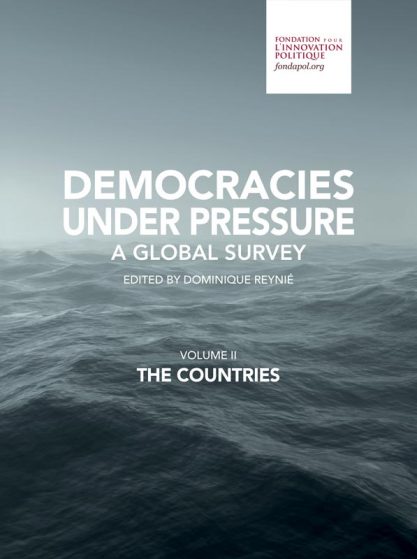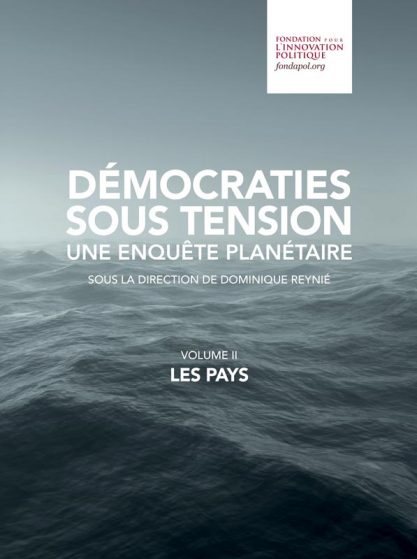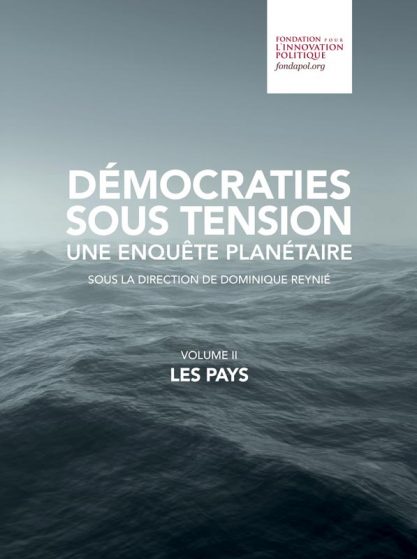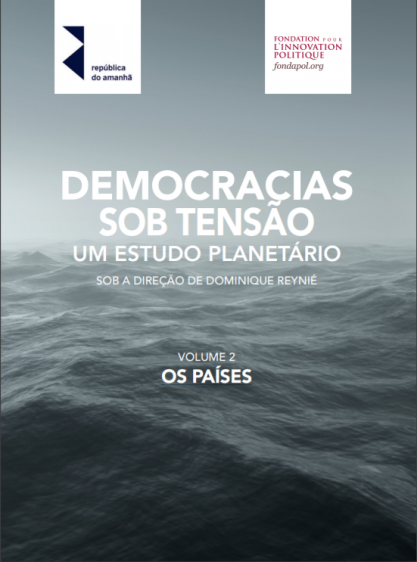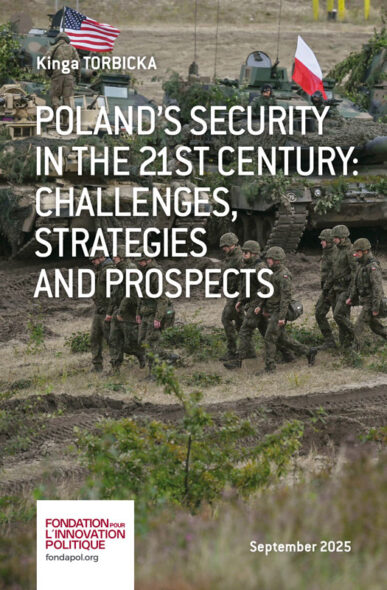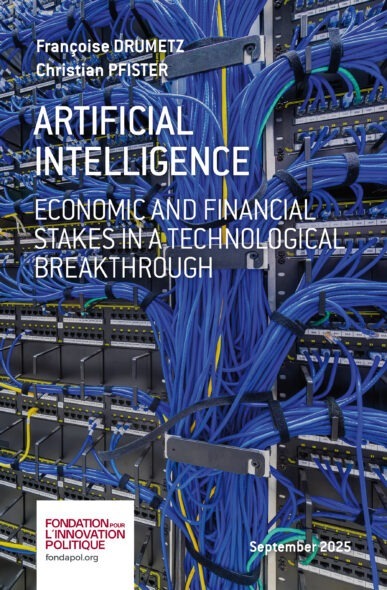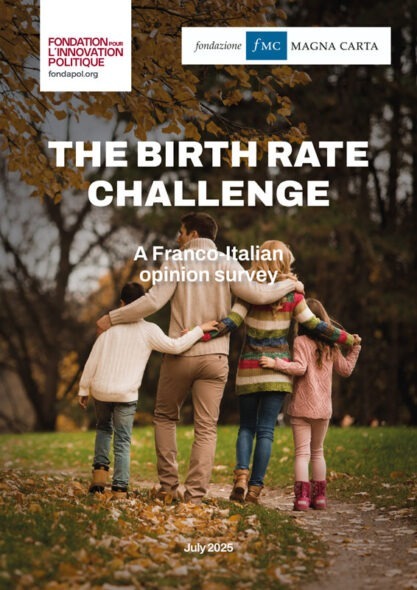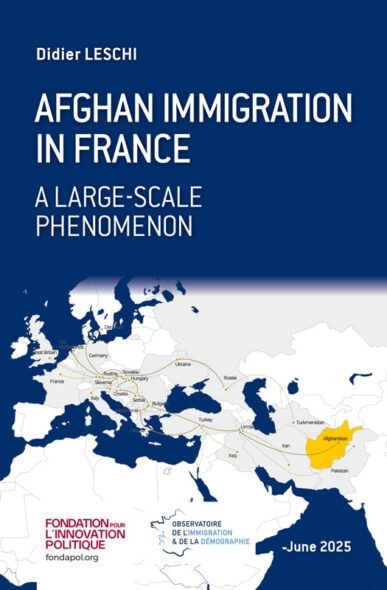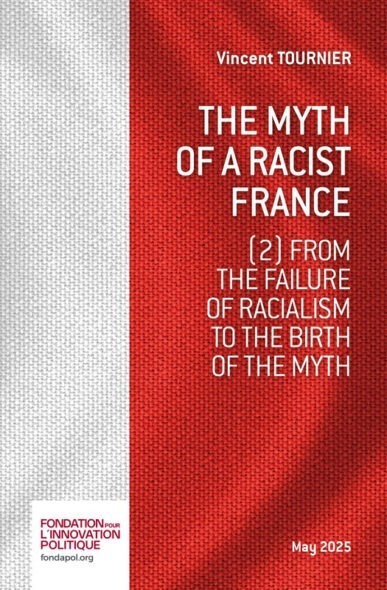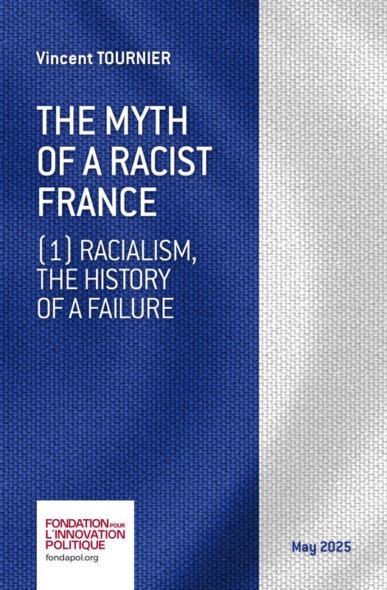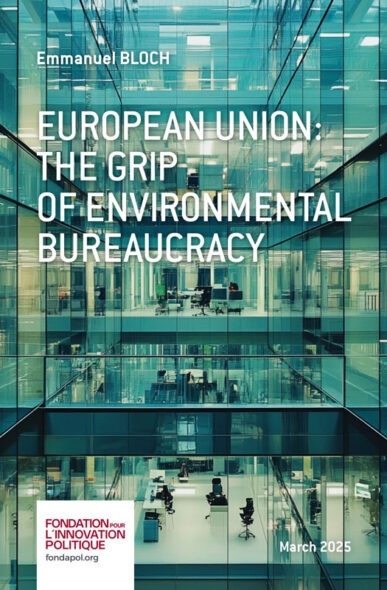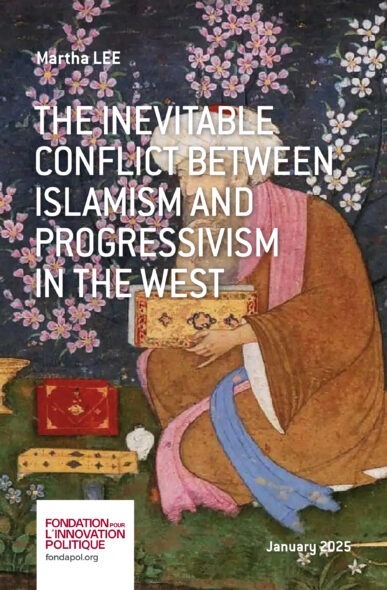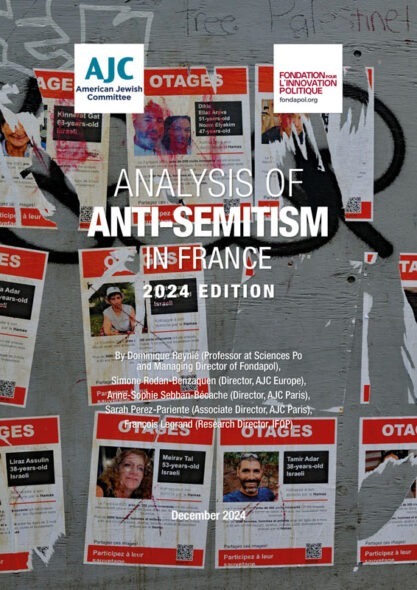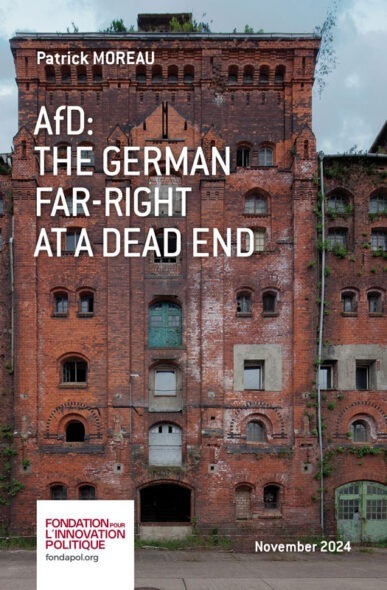Democracies under pressure - a global survey - volume II. the countries
A global survey on the state of democracy by the fondation pour l’innovation politique and the international republican institute
42 countries, 33 languages, 36,395 interviewees
A 35-question survey
What is the index of democratic culture?
Albania (AL)
Australia (AU)
Austria (AT)
Belgium (BE)
Bosnia and Herzegovina (BA)
Brazil (BR)
Bulgaria (BG)
Canada (CA)
Croatia (HR)
Cyprus (CY)
Czech Republic (CZ)
Danemark (DK)
Estonia (EE)
Finland (FI)
France (FR)
Germany (DE)
Greece (GR)
Hungary (HU)
Ireland (IE)
Israel (IL)
Italy (IT)
Japan (JP)
Latvia (LV)
Lithuania (LT)
Luxembourg (LU)
Malta (MT)
Netherlands (NL)
New Zealand (NZ)
North Macedonia (MK)
Norway (NO)
Poland (PL)
Portugal (PT)
Romania (RO)
Serbia (RS)
Slovakia (SK)
Slovenia (SI)
Spain (ES)
Sweden (SE)
Switzerland (CH)
Ukraine (UA)
United Kingdom (GB)
United States (US)
Questionnaire
Governing bodies of the Fondation pour l’innovation politique
FONDATION POUR L’INNOVATION POLITIQUE
A FRENCH THINK TANK SUPPORTING EUROPEAN INTEGRATION AND THE FREE MARKET
The Fondation pour l’innovation politique provides an independent forum for expertise, reflection and exchange aimed at producing and disseminating ideas and proposals. It contributes to pluralism of thought and the renewal of public discussion from a free-market, forward-thinking and European perspective. Four main priorities guide the Foundation’s work: economic growth, the environment, values and digital technology.
The website fondapol.org provides public access to all the Foundation’s work. Anyone can access and use all the data gathered for the various surveys via the ‘data fondapol’ platform and data relating to international surveys are available in several languages.
Furthermore, reflecting the Foundation’s editorial policy, our blog ‘Anthropotechnie’ aims to explore new avenues prompted by human enhancement, reproductive cloning, human/machine hybridization, genetic engineering and germline manipulation. It contributes to thinking and debate on transhumanism. ‘Anthropotechnie’ offers articles tackling ethical, philosophical and political issues associated with the expansion of technological innovations relating to the enhancement of human bodies and abilities.
In addition, our blog ‘Trop Libre’ casts a critical eye over the news and the world of ideas. ‘Trop Libre’ also extensively monitors the effects of the digital revolution on political, economic and social practices in its ‘Renaissance numérique’ section.
The Fondation pour l’innovation politique is a state-recognized organization. It is independent and receives no financial support from any political party. Its funding comes from both public and private sources. Support both from companies and individuals contributes to the expansion of its activities.
For more information: fondapol.org
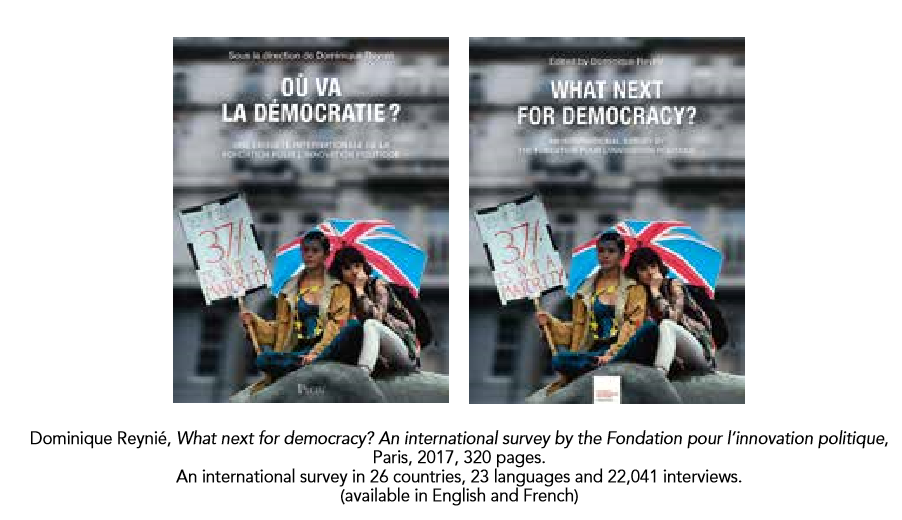
Governing bodies of the International Republican Institute
Sen. Dan SULLIVAN - Chairman,
Randy SCHEUNEMANN - Vice Chairman, Kelly AYOTTE, Judy A. BLACK, Gahl Hodges BURT, J. Scott CARPENTER, Sen. Tom COTTON, Sen. Joni ERNST, Frank J. FAHRENKOPF, Alison B. FORTIER, Christopher J. FUSSNER, Sen. Lindsey GRAHAM, Rep. Kay GRANGER, Janet Mullins GRISSOM, Cheryl F. HALPERN, William J. HYBL, Mark KIRK, James T. KOLBE, David KRAMER, Tami LONGABERGER, Peter T. MADIGAN, Général H.R. MCMASTER, Constance Berry NEWMAN, Sen. Mitt ROMNEY, Sen. Marco RUBIO, Joseph R. SCHMUCKLER, Amb. Kristen SILVERBERG, Frances TOWNSEND, Amb. Gaddi VASQUEZ, Olin L. WETHINGTON
Dr. Daniel TWINING - President
Judy Van REST - Executive Vice President
Kimber SHEARER - Counsel - Vice President for Strategy and Development
Daniel W. FISK - Chief Operations Officer
Scott MASTIC - Vice President for Programs
Diane ZELENY - Vice President for External Affairs & Global Engagement
INTERNATIONAL REPUBLICAN INSTITUTE
ADVANCING DEMOCRACY WORLDWIDE
The International Republican Institute advances democracy and freedom. We link people with their governments, guide politicians to be responsive to citizens, and motivate people to engage in the political process.
IRI works with organizations and individuals across the globe to help citizens build democratic societies that are open and responsible, accountable and resilient. Collaboration is essential to fulfilling our mission in rapidly changing international landscapes. As an organization, we are agile. That allows us to quickly respond to critical, frequently dangerous situations.
For more than 30 years, we have been helping to strengthen democracy through workshops by volunteer experts from all over the world on multi-party political systems, democratic governance practices, women’s empowerment, civil society development, youth leadership, strengthening electoral processes and public opinion research. Research and qualitative and quantitative public opinion data is a cornerstone of IRI’s approach to programming. Our data ensures citizens’ needs are at the center of the political debate and guide our projects’ goals. To date, IRI has polled more than 1.3 million citizens in 70 countries.
To learn more about IRI’s work around the world, get involved, or contact us, visit our website www.iri.org, listen to our podcast Global, or join the conversation on IRI’s blog Democracy Speaks about advancing democracy worldwide.
IRI is a nonpartisan, nongovernmental institute and receives funding through grants from the U.S. State Department, U.S. Agency for International Department, the National Endowment for Democracy, a number of European foundations and aid agencies and other Western countries. Less than one percent of IRI’s funding comes from private donations. We do not receive any money from the Republican Party or any other U.S. partisan entity.
Understanding

The authors
Mantas Adomėnas
Cambridge educated Ph.D. researcher and former President of the Lithuanian Conservative think tank (Institute of Democratic Politics). He was in charge of the Homeland Union–Lithuanian Christian Democrats’ electoral strategy in the successful 2008 parliamentary election and of the Lithuanian higher education reform (2009).
Yoko Alender
Architect, city planner and politician. Member of the Estonian Parliament (the Riigikogu) since 2015 and reelected in 2019, member of the city council of Tallinn from 2013 to 2017.
Violeta Alexandru
Adviser on good governance to the Romanian president’s party (National Liberal Party – PNL) and Founding Member of the think tank Institute for Public Policy (IPP). She has contributed to, among others, several studies conducted at the Institute for Public Policy, the most recent of which are: Cost – efficiency report in public procurement (2015), Sustainable Public Procurement to make efficient investments in Romania (2013) and Transparency and Competitiveness in the Romanian Public Procurement System (2012).
Loraine Amic
Intern at the Fondation pour l’innovation politique, Master’s Student in public administration at Science Po, Paris.
Octavio de Barros
Economist, President of República do Amanhã (“Republic of tomorrow”), a Brazilian think tank in partnership with the Fondation pour l’innovation politique and the International Republican Institute in the conception of the survey Democracies under pressure. He is also the Vice-President of the Chamber of Commerce France-Brazil in São Paulo.
Oriol Bartomeus
Associate Professor in the Department of Political Science and Public Law at the Autonomous University of Barcelona (UAB). Doctor in Political Science at UAB, author of a thesis studying the effects of generational replacement on electoral behavior in Catalonia. He contributed to the book What next for democracy? An international survey by the Fondation pour l’innovation politique (2017).
Pierre Bréchon
Professor Emeritus of Political Science at Science Po Grenoble (PACTE research unit), and president of ARVAL, a research association focusing on value systems which administrates the survey on the European values in France. He edited, with Frédéric Gonthier and Sandrine Asror, the book La France des valeurs. Quarante ans d’évolution (Presses universitaires de Grenoble, 2019). Also author of a recent article entitled “Le mouvement des “gilets jaunes” ou le retour des valeurs matérialistes ?” (Revue politique et parlementaire, No. 1090, January-March 2019, p. 113-120).
Lolita Cigane
International consultant in good governance, campaign finance, elections and EU politics and policies. Former director of the Latvia branch of Transparency International from 2008-2010, Parliamentary Secretary to the Ministry of Finance (2013-2014) and Chair of the European Affairs Committee (2014 -2018) in Latvia.
Julie Decroix
Assistant Director of the American Jewish Committee Europe since 2015 and Ph.D. researcher in Social Science, after working at the Ministry of Foreign Affairs (Quai d’Orsay) as Chief of Staff for France’s special representation for Middle East peace processes.
Victor Delage
Senior Research Fellow and Communications Officer at the Fondation pour l’innovation politique. He worked at the General Directorate of the Treasury at the French Ministry of Economy and Finance. Graduate of the Collège d’Europe and Science Po Grenoble. He also contributed to the book L’opinion européenne 2018 (Fondation pour l’innovation politique / Éditions Marie B, Lignes de Repères Collection, 2019).
Sophia Gaston
Researcher in Political and Social Sciences, visiting fellow at the London School of Economics and Political Science. She has authored numerous publications, including Behind Global Britain (British Foreign Policy Group, 2019), Out of the Shadows: Thinking the Immigration Plot (HJS, 2018), At Home in One’s Past (Demos, 2018), Mediating Populism (Demos 2018) and Nothing to Fear but Fear Itself? (Demos, 2017).
Yasen Georgiev
Executive Director of the Economic Policy Institute (EPI), a think tank based in Sofia (Bulgaria) dedicated in interdisciplinary socioeconomic trends in Bulgaria and in the countries of South-East Europe.
Raphaël Grelon
Intern at the Fondation pour l’innovation politique and Master’s student in geopolitics and prospective analysis at the Institute of International and Strategic Relations (Iris).
Madeleine Hamel
Project Manager at the Fondation pour l’innovation politique. Graduated with a Master’s degree in political science from the University of Geneva (Switzerland), specializing in international relations. She contributed to the book L’Opinion européenne 2018 (Fondation pour l’Innovation Politique / Éditions Marie B, Lignes de Repères Collection, 2019).
Katherine Hamilton
Project Manager at the Fondation pour l’innovation politique in charge of the survey Democracies under pressure. Graduated with a Bachelor’s degree in political science and international affairs from Skidmore College, New York (U.S.).
Paul-Adrien Hyppolite
Corps des Mines engineer, graduate from the École Normale Supérieure and the École Polytechnique, and visiting scholar at Harvard University. He previously worked for a merchant bank advising governments, for an investment fund, and for a space sector company. Coauthor, with Antoine Michon, of the two-part study entitled Big Tech Dominance (1. The new financial tycoons 2. A barrier to technological innovation?), Fondation pour l’innovation politique, 2018, available at fondapol.org).
Samuel Johannes
Transatlantic Strategy Officer at the International Republican Institute (IRI) in Washington, DC, his work focuses on political parties and the media in the era of misinformation.
Aminata Kone
Master’s student in international security at Sciences Po Paris. Has completed her double Bachelor’s degree in international relations and French at the University of Sussex (United Kingdom). She contributed to the book What next for democracy? An international survey by the Fondation pour l’innovation politique (2017).
Guillemette Lano
Intern at the Fondation pour l’innovation politique, Master’s Student in geopolitics and international studies at the Catholic Institute of Paris, training course for a humanities’ preparatory class.
Julia Laureau
Intern at the Fondation pour l’innovation politique, Master’s student in political theory at the Doctoral School of Sciences Po, Member of the Young European association.
Marc Lazar
University Professor of History and Political Sociology, Director of the Sciences Po History Center and President of the Luiss School of Government (Rome). Alongside other activities, he is coauthor with Ilvo Diamanti, of Peuplecratie. La métamorphose de nos démocraties (Gallimard, 2019) and contributed to the book What next for democracy? An international survey by the Fondation pour l’innovation politique (2017).
Erwan Le Noan
Partner at Altermind, commentator for the newspapers L’Opinion and Les Échos, author of La France des opportunités (Les Belles Lettres, 2017). Member of the Scientific Council of the Fondation pour l’innovation politique. Coauthor of Gouverner pour reformer : éléments de méthode (Fondation pour l’innovation politique, 2016, available at fondapol.org) and, with Dominique Reynié, of Pour une complémentaire éducation : l’école des classes moyennes (Fondation pour l’innovation politique, 2014, available at fondapol.org).
Johan Martinsson
Associate Professor in the Department of Political Science and Research Director of Opinion Media Institute at the University of Gothenburg, Sweden. Author of the study “Sweden Democrats”: an anti-immigration vote (Fondation pour l’innovation politique, 2018 available at fondapol.org).
Antoine Michon
Corps des Mines engineer, graduated from the École Polytechnique, of which he was major of promotion. Worked for a financial data platform, for a company specialized in urban mobility solutions, as well as for a provider of data management and analysis software. Coauthor, with Paul-Adrien Hyppolite, of the two-part study entitled Big Tech Dominance (1. The new financial tycoons 2. A barrier to technological innovation?, Fondation pour l’innovation politique, 2018, available at fondapol.org).
Patrick Moreau
Ph.D. researcher in history and Doctor of State in political science (FNSP), and CNRS researcher in the European Dynamics laboratory at the University of Strasbourg. Author of the study Alternative für Deutschland: Établissement électoral (Fondation pour l’innovation politique, 2018, available on fondapol.org) and L’Autre Allemagne. Le réveil de l’extrême droite (Vendémiaire, 2017).
Anne Muxel
Research Director at Cevipof (CNRS-Sciences Po), specialist in the phenomena of political and democratic reconfiguration, electoral participation and the relationship of youth to politics. She is the author, among others, of Politiquement jeune (Editions de l’Aube, 2018) and contributed to the book What next democracy? An international survey by the Fondation pour l’innovation politique (2017). Alongside Olivier Galland, she also edited the survey La Tentation radicale. Enquête auprès des lycéens (PUF, 2018).
Thibault Muzergues
Director of the Europe Program at the International Republican Institute (IRI) and author of La Quadrature des classes. Comment de nouvelles classes sociales boulversent les systèmes de partis en Occident (Le Bord de l’Eau, 2018), with an updated English version in progress. His work focuses on public opinion and European political parties.
Julie Noyer
Project Manager at the Fondation pour l’innovation politique, Master’s student in political science at the University of Quebec in Montreal (Canada).
Eriko Oshima
Ph.D. researcher in political science, Associate Professor (Assistant Professor) at Kinjo Gakuin University (Nagoya, Japan). Her work has focused in particular on immigrant integration policy and the French colonial past. She also participated in the research group led by Yuji Nakano which was aimed at analyzing the reports of the High Council on Integration. From 2015 to 2016, she wrote a monthly column on European policies for the website of the European Union Institute in Japan at Waseda University (EUIJ Waseda). She published a book in Japan in 2018 on the Pieds Noirs and, more recently, an article on May 1968 and Maghreb immigrants.
Maude Paillard-Coyette
Intern at the Fondation pour l’innovation politique, degree in political science from London Metropolitan University (United Kingdom).
Pascal Perrineau
University Professor at Sciences Po. Coordinator of the books Le Désenchantement démocratique (Éditions de l’Aube, 2003), Le Vote disruptif, Les élections présidentielle et législatives de 2017 (Presses de Sciences Po, 2017) and, with Luc Rouban, of La Démocratie de l’entre-soi (Presses de Sciences Po, 2017) and author of Cette France de gauche qui vote FN (Seuil, 2017). He contributed to the book What next for democracy? An international survey by the Fondation pour l’innovation politique (2017).
Ožbej Peterle
Graduated with a bachelor’s degree in economics from the University of Ljubljana (Slovenia) and a master’s degree in politics, security and integration at the School of Slavonic and East European Studies (University College London). Assistant Professor at the School of Advanced Social Studies, Nova Gorica (Slovenia).
Paul Prososki
Program Director of the International Republican Institute in Belgrade (Serbia). Board member of the Americans for Tax Reform Foundation (Washington), a center-right think tank.
Bettina Rausch
President of the Austrian People’s Party Academy since March 2018. Former member of the Federal Council (2008-2013) and the National Parliament of Lower Austria (2013-2018). Coeditor and coauthor of Offen für Neues (Édition noir, 2018) and of Österreichisches Jahrbuch für Politik 2018 (Böhlau Verlag, 2019).
Dominique Reynié
University Professor at Sciences Po and Executive Director of the Fondation pour l’innovation politique. He has authored numerous publications, including: the Triomphe de l’opinion publique. L’espace public français du xvie au xxe siècle (Odile Jacob, 1998), Vertige social nationaliste. La gauche du Non (La Table ronde, 2005) and Nouveaux Populismes (Pluriel, 2013). He also edited the book What next for democracy? An international survey by the Fondation pour l’innovation politique (2017).
Nicolas Rigaudière
Intern at the Fondation pour l’innovation politique, 2nd year bachelor’s degree student majoring in politics and government at Sciences Po, Paris.
Jacques Rupnik
Research Director at Sciences Po (Ceri), Professor at the Collège d’Europe in Bruges and former Advisor to President Václav Havel. He edited the books 1989 as a Political World Event. Democracy, Europe and the New International System in the Age of Globalization (Routledge, 2014), Géopolitique de la démocratisation. L’Europe et ses voisinages (Presses de Sciences Po, 2014) and Europe at the Crossroads. Democracy, Neighborhoods, Migrations (Vaclav Havel Library, 2018). He also contributed to the book What next for democracy? An international survey by the Fondation pour l’innovation politique (2017).
Graham Scott
Europe Program Associate at the International Republican Institute (IRI), focused on North Macedonia. Graduated with a Bachelor of Science in political science from Shepherd University and a master’s degree in political science from George Mason University.
Anne-Sophie Sebban-Bécache
Director of the American Jewish Committee in Paris since December 2018, Doctor in geopolitics at the Institut français de géopolitique (Paris VIII University), specialist on Israel and the Horn of Africa. She contributed to the book Gaz naturel, la nouvelle donne ? (Presses Universitaires de France, 2016).
Neritan Sejamini
Strategy Consultant, Policy Analyst and Publisher based in Tirana (Albania), Policy Specialist on the United States and the Western Balkans region.
Corentin Sellin
Associate Professor in CPGE Lycée Carnot (Dijon), specialist on the United States. He coauthored, with Annick Foucrier and Nicolas Vaicbourdt, the book The United States and the world, from the Monroe doctrine to the creation of the UN (1823-1945) (Atlantic, 2018) and contributed to the book What next for democracy? An international survey by the Fondation pour l’innovation politique (2017).
Joshua Solomon
Program Officer at the International Republican Institute (IRI) for the Eurasia Program on the former Soviet countries. Worked at the National Endowment for Democracy on Ukraine, Moldova and Belarus. Master’s student in international affairs at George Washington University (U.S.).
Alex Tarascio
Program Manager at the International Republican Institute (IRI) and Bachelor of Political Science from the University of Oregon. His work focuses on regional support for political parties and measures against misinformation in Europe and Eurasia.
Christophe de Voogd
Ph.D. researcher in history, specialist on the Netherlands, Associate Professor at Sciences Po, President of the Scientific and Evaluation Council of the Fondation pour l’innovation politique. He is the author of the study Réformer : quel discours pour convaincre ? (Fondation pour l’innovation politique, 2017, available at fondapol. org) and contributed to the book What next for democracy? An international survey by the Fondation pour l’innovation politique (2017).
Mathieu Zagrodzki
Ph.D. researcher in Political Science at Sciences Po and Associate Researcher at the Center for Sociological Research on Criminal Law and Institutions (Cesdip), specializing in police and public security issues. He teaches at the University of Versailles-Saint-Quentin-en-Yvelines. He is the coauthor, with Romain Maneveau and Arthur Persais, of the study Commerce illicite de cigarettes : les cas de Barbès-La Chapelle, Saint-Denis and Aubervilliers-Quatre-Chemins (Fondation pour l’innovation politique, 2018, available at fondapol.org) and he contributed to the book What next for democracy? An international survey by the Fondation pour l’innovation politique (2017).
Survey methodology
A global survey on the state of democracy by the fondation pour l’innovation politique and the international republican institute
Albanian (Albania and North Macedonia), Bosnian, Bulgarian, Croatian, Czech, Danish, Dutch, English, Estonian, Finnish, French, German, Greek (Greece and Cyprus), Hebrew, Hungarian, Italian, Japanese, Latvian, Lithuanian, Luxembourg, Macedonian, Maltese, Norwegian, Polish, Portuguese (Brazil and Portugal), Romanian, Russian (Estonia and Latvia), Serbian, Slovak, Slovenian, Spanish, Swedish, and Ukrainian.
fondapol.org, iri.org and republicadoamanha.org.
The Fondation pour l’innovation politique is a French think tank that upholds the values of freedom, progress and European ideals. The International Republican Institute is an American organization that promotes democracy around the world. The two organizations, in partnership with the Brazilian think tank República do Amanhã, joined forces to create an extensive international survey conducted across 42 countries, the results of which are published below under the title: Democracies Under Pressure. All the results are available to the public in the thirty-three languages* the survey was administered in as open data on the respective websites of the three institutions**.
This project is based on a questionnaire written in French and in English by the teams of the partnered think tanks. It was administered by Ipsos across national samples selected from each of the 42 surveyed countries. The scale of the survey made it possible to integrate the twenty-seven Member States of the European Union, to make comparisons between these and the European countries that are not members of the European Union (Norway, Switzerland, Ukraine), those that seek to join it (Albania, Bosnia and Herzegovina, North Macedonia, Serbia) or even, in contrast, with the United Kingdom, which seems to have decided to leave it, although the situation in this latter country remains very unclear at the time of writing (April 25th 2019).
The goal of conducting a global survey on the state of democracy has led us to expand the group of surveyed countries by including Australia, Brazil, Canada, the United States, Israel, Japan and New Zealand in the scope of observation.
42 countries, 33 languages, 36,395 interviewees
In total, 36,395 people were surveyed. The study was conducted on the basis of representative national samples drawn from the population aged 18 years and older. Quotas for gender, age, profession, region and size of community were used to ensure the representativeness of the samples. The samples take into account the demographic weighting of each country: the size of the samples was 1,000 people in countries with more than 8 million inhabitants, 600 people for those with 5 to 8 million inhabitants and 500 people for countries with less than 5 million inhabitants. For some countries (Albania, Bulgaria, Croatia, Estonia, Latvia, Lithuania, North Macedonia, Serbia, Slovakia and Slovenia), the sample size was increased to 800 people despite a population of less than 8 million in order to solidify the analysis of the results.
The survey, which included 35 questions published at the end of this volume, was administered in each of the national languages, amounting to 33 languages across the 42 countries. In order to minimize the effect of situational factors, the data was collected over a five-week period (between September 6th and October 11th 2018). The interviews were conducted via a self-administered online questionnaire, with the exception of five countries where face-to-face interviews were preferred: Albania, Bosnia and Herzegovina, Cyprus, North Macedonia and Malta.
A 35-question survey
The opinions of the various authors who contributed to this international survey do not necessarily reflect those of the International Republican Institute.
For most of the questions, we asked respondents to answer by choosing a level on a four-point scale, of the “yes, absolutely”/”yes, somewhat” and “not really”/”not at all” type, to assess, for example, levels of satisfaction, trust or optimism. In this document, for the sake of convenience and legibility, we usually present and comment on the results by adding up, on the one hand, the “yes, absolutely”/”yes, somewhat” answers and, on the other hand, the “not really”/”not at all” answers.
In some cases, respondents were asked to choose between two options. Thus, for example, to the question “which of the following two statements is closest to your opinion”, the options offered to the respondent were “globalization is an opportunity” or “globalization is a threat”. Some of the questions had three possible answers. For example, when asked about the benefits to their country of NATO membership, respondents could answer that the latter is “a good thing,” “a bad thing,” or “neither a good thing nor a bad thing.”
For each question, respondents received a notification if they did not respond to a certain question with the following message: “Please try to answer the question. However, if you have no opinion on this question, you can move on to the next one by clicking on the “next question” button (between 0 and 2% non-responses both online and face-to-face).
Lastly, the results are presented either by country or by sub-category, such as “European Union” (EU). For a given question, the EU average corresponds to the result across the Member States of the European Union,
i.e. twenty-seven countries, with values weighted according to their respective demographic weights. The decision was made not to include the United Kingdom in the “EU” calculations as the British have expressed a desire to leave the European Union.
The overall results are presented in the “GLOBAL” category. For a given question, the “GLOBAL” average therefore corresponds to the result across the 42 surveyed democracies, the value of each country having been weighted taking into account their demographic weight within the overall sample.
The reader will see that we have often grouped categories together to make the data clearer and easier to present. This never alters the value of these data, the details of which cannot be presented in full in such a volume, and which are freely accessible in full on the websites of the three institutions***.
A survey by
the Fondation pour l’innovation politique and the International Republican Institute
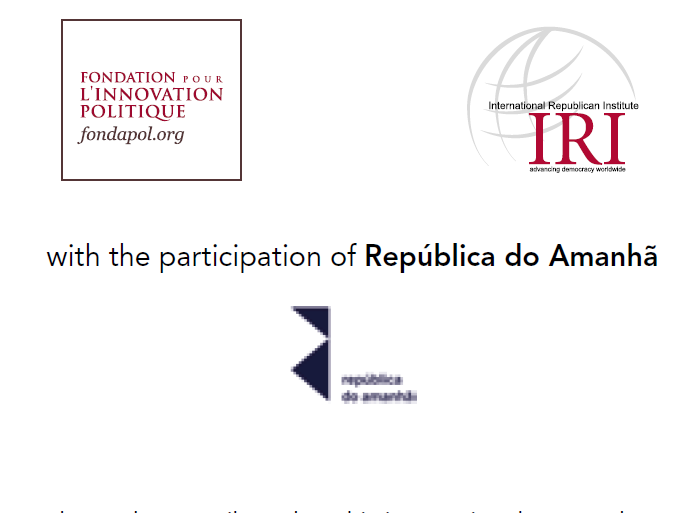
What is the index of democratic culture?
Designed and developed by the Fondation pour l’innovation politique and the International Republican Institute
The democratic culture index, designed and developed exclusively within the context of this international survey by the Fondation pour l’innovation politique and the International Republican Institute, is based on a series of questions relating to the fundamental characteristics of a democracy: a democratically elected Parliament that controls the government, the existence of free, transparent and independent elections, etc. The index ranges from 0 to 10: the closer a score is to 10, the stronger the democratic culture in the country is; the closer it is to 0, the weaker the democratic culture is. As it is based on an opinion survey, the index thus measures perceptions.
The closer the index score is to 10, the stronger the democratic culture in the country is
To do this, from all the results gathered across the 42 countries in our survey, certain responses to nine questions were selected:
- “There is no substitute for the democratic system, it is the best possible system”
- “Regarding each institution, please tell me whether you entirely trust it, somewhat trust it, distrust it, or entirely distrust Parliament” (total of responses: “entirely trust” and “somewhat trust”)
- “Regarding each institution, please tell me whether you entirely trust it, somewhat trust it, distrust, or entirely Political parties” (total of responses: “entirely trust” and “somewhat trust”)
- “Voting is worthwhile because elections can make a difference”
- “For each one, please tell me if this way of governing the country is/would be very good, good, bad or very Being led by a strong man who does not have to worry about Parliament or elections” (total of responses: “very bad” and “bad”)
- “For each one, please tell me if this way of governing the country is/would be very good, good, bad or very bad. Having the armed forces govern the country (total of responses: “very bad” and “bad”)
- “For each one, please tell me if this way of governing the country is/would be very good, good, bad or very bad. Having a democratic political system with an elected Parliament that controls the government” (total of responses: “very good” and “good”)
- The average, in each country, of the importance given to the following four major public freedoms:
- “The ability to protest, march in the streets and dissent”
- “The ability to take part in the decision-making process”
- “The ability to vote for the candidate of your choosing”
- “Having the right to say what you think”
- Are you bothered by political opinions that are different from your own? (total of responses: “no, not at all” and “no, not really”)
For each group of responses to these nine questions, thresholds have been established:
- When the result obtained for a given question was at least 5 points higher than the overall average, the country was assigned a score of 1.
- When the result obtained for a given question was between 5 points above and 5 points below, the country was assigned a score of 5.
- When the result obtained for a given question was at least 5 points lower than the overall average, the country was assigned a score of 0.
For each country, we then summed up all the scores (0, 0.5 and 1) obtained across the nine questions and gave a final result out of 10.
Comprehension Guide
The survey shows that 73% of Austrians believe that “there is no substitute for the democratic system, it is the best possible system”, versus an overall average of 67%. Thus, for this question, if the democracies obtained more than 72% (i.e. 5 points more than the overall average), the score assigned was 1 (this is the case for Austrians for this particular question). If the democracies scored between 72% and 62%, the score assigned was 0.5. And, following this logic, if the democracies scored less than 62%, the score was 0.
Index of democratic culture
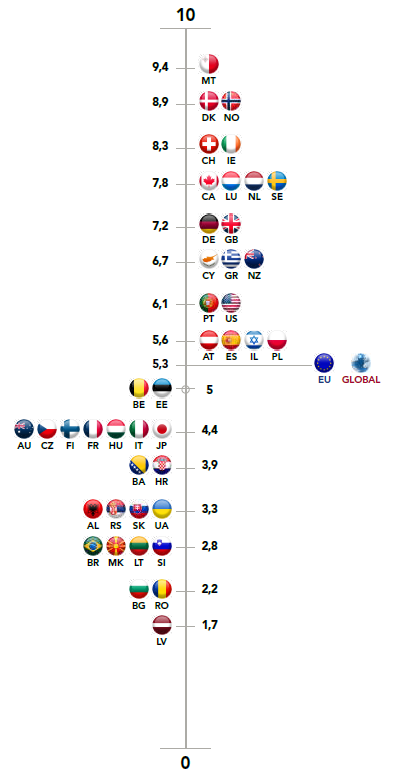
The closer the index is to 10, the stronger the democratic culture is
Synthesis of responses to the following questions: There is no substitute for the democratic system; it is the best possible system / Trust in Parliament / Trust in political parties / Voting is worthwhile because elections can make a difference / Being led by a strongman who does not have to worry about Parliament or elections is bad / Having the armed forces govern the country is bad / Having a democratic political system with an elected Parliament than controls the government is good / The importance given to public liberties (the ability to vote, to say what you think, to protest, to take part in the decision- making process) / Tolerance towards political opinions that are different from yours.
Albania (AL)
Index of democratic culture
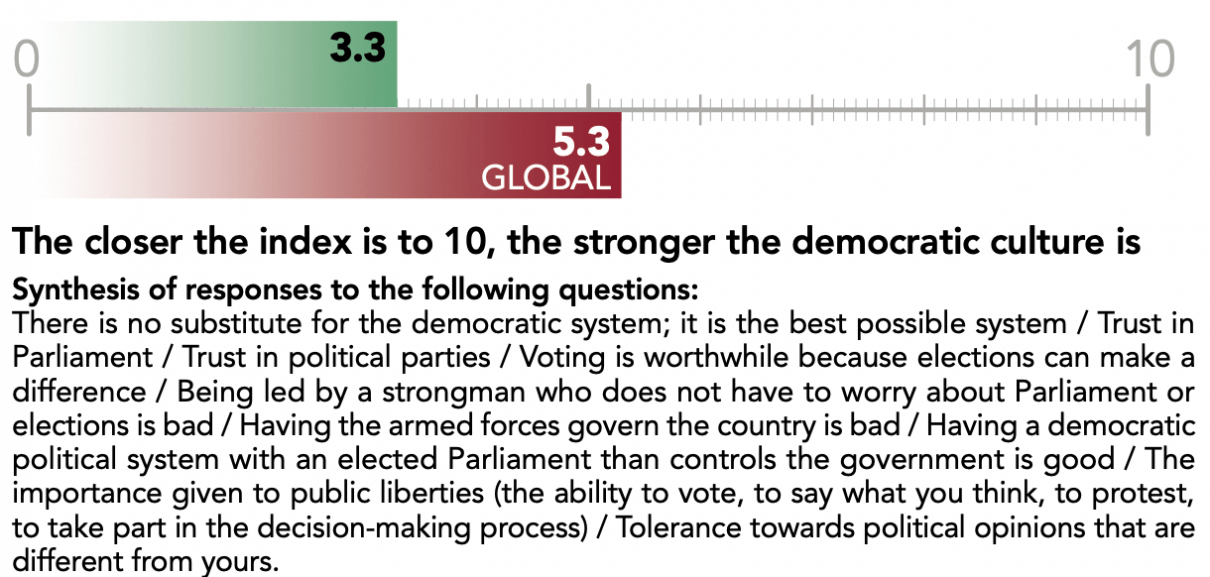
Copyright :
Fondation pour l’innovation politique/International Republican Institute – 2019
Democracy works well in my country
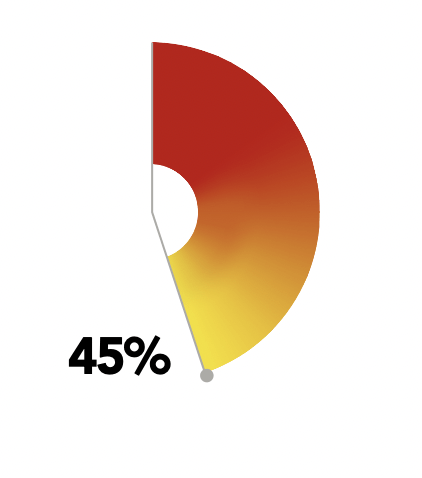

Trust in institutions
Total responses: “entirely trust” and “somewhat trust”
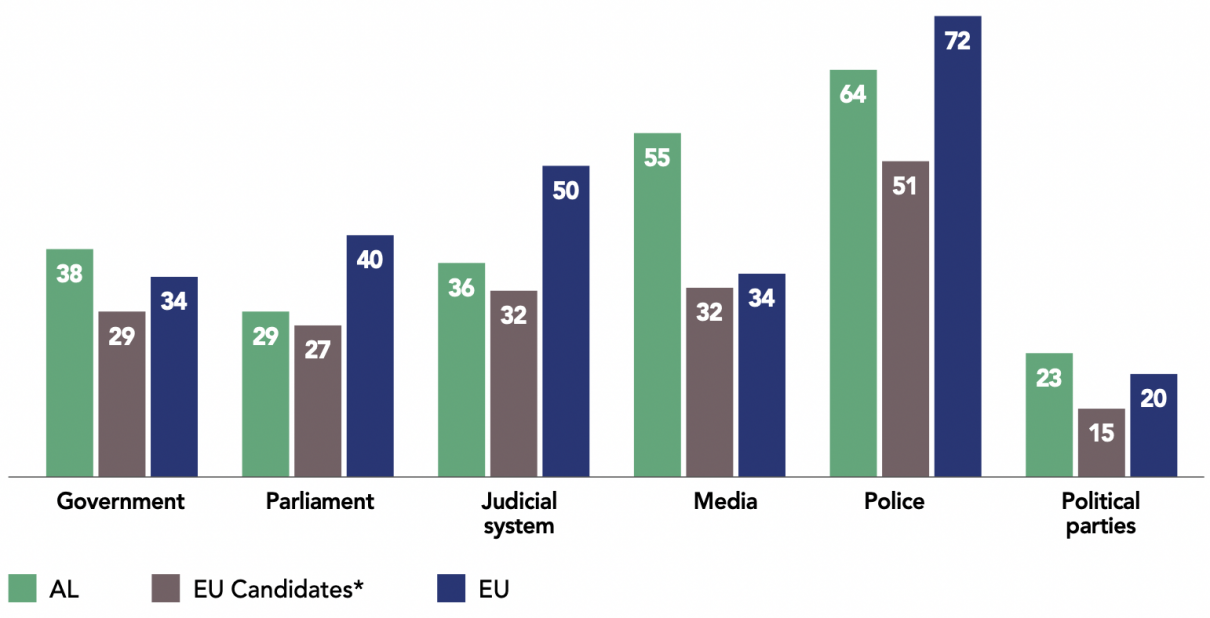
Copyright :
Fondation pour l’innovation politique/International Republican Institute – 2019

Copyright :
Fondation pour l’innovation politique/International Republican Institute – 2019
* The following countries fall into this category: Albania, Bosnia and Herzegovina, North Macedonia and Serbia.
Among the European Union candidate countries*, Albania is the most pro-European, with 88% of respondents saying that potentially joining the European Union would be a good thing, in a region where only one-third of Serbs (33%), half of Bosnians (52%) and less than two-thirds of Macedonians (60%) agree with this statement. Albanians are convinced that joining the EU would strengthen democracy in their country (86%), a figure well above the EU candidate countries average (50%). They are also in favor of the euro (61%) and the creation of a European army (76%). Albanians are by far the most likely to support the North Atlantic Treaty Organization (86%), compared to 50% on average across NATO countries excluding the U.S.
More than three-quarters of Albanians (81%) feel they can express themselves freely, and almost all agree that the following elements are important for the proper functioning of democracy: the ability to protest, march in the streets and dissent (91%), the ability to take part in the decision-making process (95%), voting (95%), and having the right to say what you think (98%). However, they overwhelmingly support two opposing notions of the democratic system: a system based on “an elected Parliament that controls the government” (82%) and a system in which “citizens decide what is best for the country, rather than the government” (83%).
Do you support or oppose the death penalty?

Copyright :
© Fondation pour l’innovation politique/International Republican Institute – 2019
The following countries fall into this category: Albania, Bosnia and Herzegovina, North Macedonia and Serbia.
Furthermore, Albanians feel powerless: only 1% believe that “the people” are the group holding the most power in their society. Nearly half (48%) believe that power is mainly in the hands of politicians and nearly a quarter believe it is in the hands of criminal organizations (24%).
Despite the value they attach to democratic ideals, more than half of Albanians believe that democracy works poorly in their country (55%). Most think that elections are not transparent (57%) and 46% think that they are “pointless because politicians do not care about the will of the people”.
Albanians, on the whole, show great tolerance for difference. Nine out of ten Albanians claim that differences in religious beliefs (90%), ethnicity (90%), and political opinions (84%) do not bother them. However, while a majority (64%) believe that hosting refugees is a duty, a large part of the population also believes that letting in more refugees would increase the risk of crime (65%), terrorism (63%), damage the economy (61%) and lead to problems with coexistence (50%).
Neritan Sejamini
- 88% think their country’s potential accession to the European Union is a good thing.
- 41% favor the idea of only granting the right to vote to citizens with a sufficient level of knowledge.
- 55% think being led by a strongman who does not have to worry about Parliament or elections would be a good idea.
Focus : Seven out of ten Albanians (70%) would prefer more order even if it means less freedom. This may be linked to their tumultuous experience of post-communist democratic transition and their disenchantment with the current functioning of the state.
Australia (AU)
Index of democratic culture
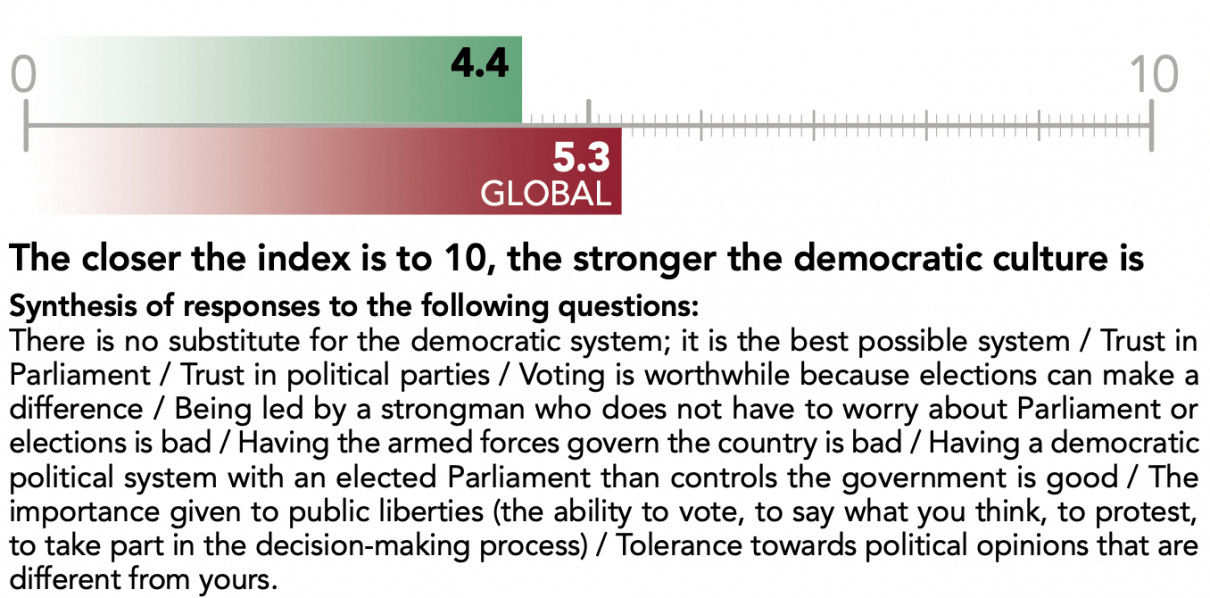
Copyright :
Fondation pour l’innovation politique/International Republican Institute – 2019
Democracy works well in my country
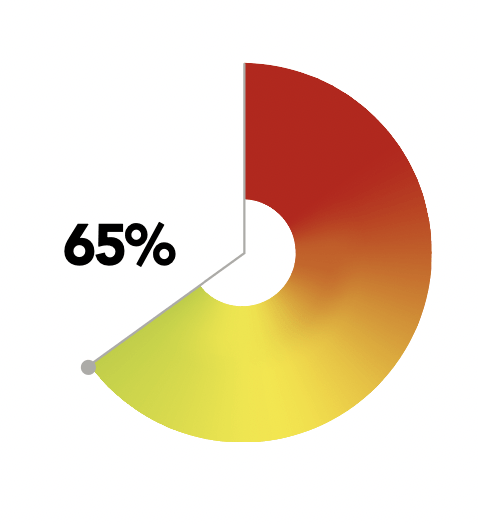
Trust in businesses
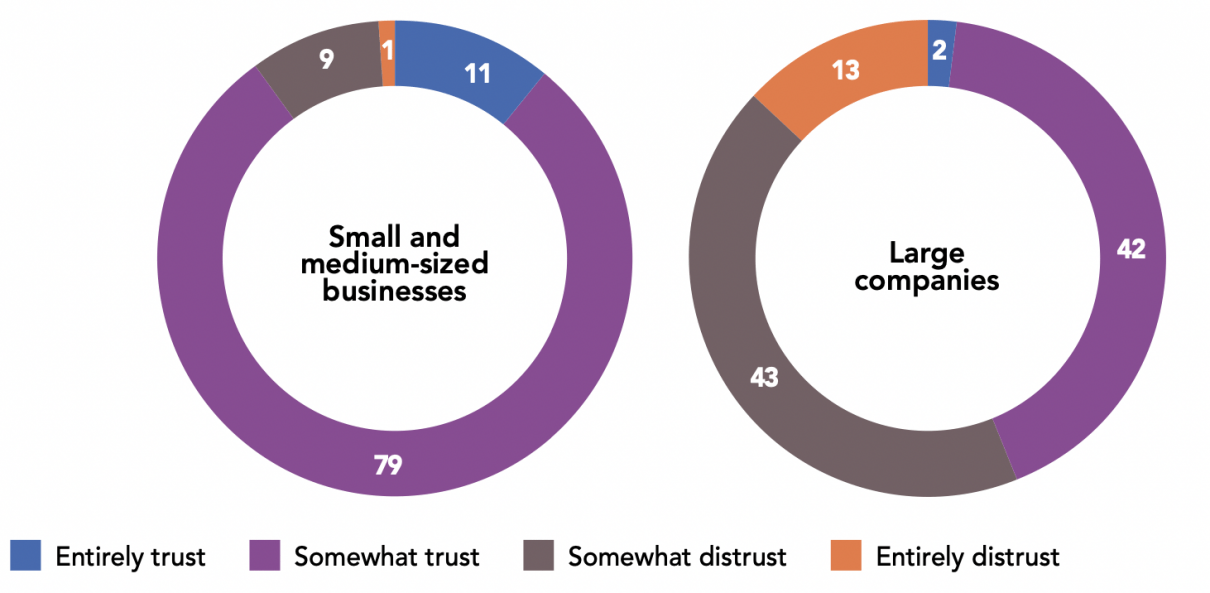
Copyright :
Fondation pour l’innovation politique/International Republican Institute – 2019
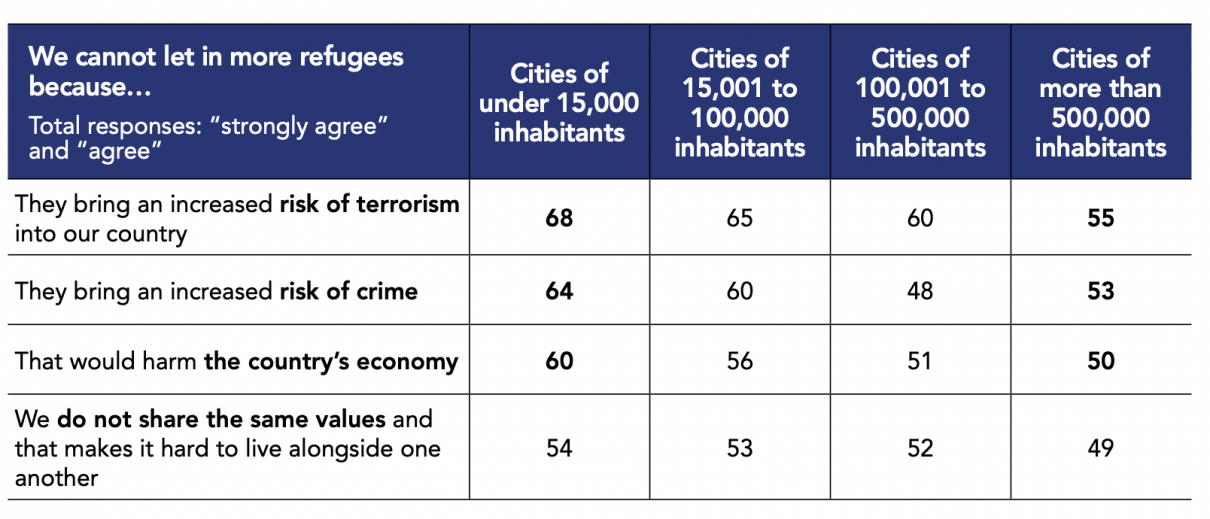
Copyright :
Fondation pour l’innovation politique/International Republican Institute – 2019
Australia is one of the oldest constitutional democracies in the world, based both on the U.S.-style model of federalism and on the English-style parliamentary and monarchic sovereignty. The island-continent is also one of the first countries to have introduced the modern form of universal suffrage and to have given women the right to vote and the right to stand in Parliament.
However, as this study shows, more than one-third of Australia’s population (35%) believes that democracy is working poorly in their country, a higher figure than other Commonwealth countries, such as New Zealand (21%) and Canada (20%). Similarly, 39% of Australians believe that other political systems could be as satisfactory as democracy. A significant majority of Australians do not trust the federal government (55%) or the Parliament (58%). Furthermore, their mistrust of political parties is significant (74% say they do not trust them). These results are partly explained by the series of political crises that Australia has been experiencing for many years. Long seen as a model of government stability, the country has had five Prime Ministers in just five years. However, the public seems to be very attached to parliamentarianism: most Australians (90%) consider it a good thing to have “a democratic political system with an elected Parliament that controls the government”.
Nearly half (48%) of the respondents expressed their disagreement with the statement “it is our duty to welcome refugees fleeing war and poverty into our country”. In addition, a large majority agree with the idea that letting in refugees increases risks of terrorism (61%) and crime (56%). It should be noted that the Australian government has taken a hard line on this issue and, since 2013, has been conducting a program called Operation Sovereign Borders, which consists of discouraging illegal refugees from trying to reach Australian land by sea.
The role of the government in the economy should be strengthened and the freedom of enterprises should be limited
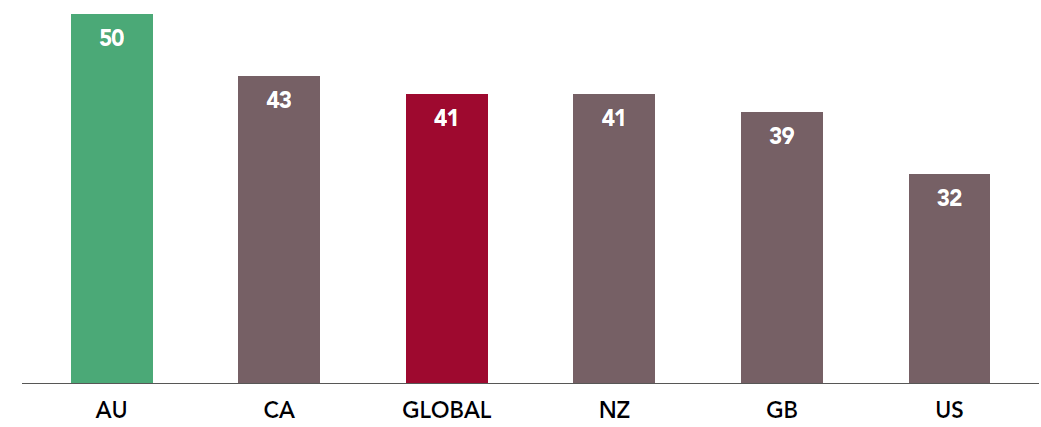
Copyright :
© Fondation pour l’innovation politique/International Republican Institute – 2019
Australia is the thirteenth largest global economic power and is first and foremost a country of natural resources: it is the world’s leading exporter of coal, iron, mineral sands and aluminum. Benefiting from a policy of economic and labor market deregulation, Australian companies attract foreign investors and, according to our study, are supported by Australians. A large majority of Australians (58%) even believe that large companies hold power in their country, compared to only 41% across all 42 surveyed democracies.
Julie Noyer
- 60% are worried about immigration.
- 64% believe that voting is worthwhile because elections can make a difference.
- 68% affirm that their electoral process is transparent.
Focus : Although Australia is particularly affected by global warming, pollution is less of a concern to Australians (73%) than it is to citizens in the other 42 countries surveyed (85%).
Austria (AT)
Index of democratic culture
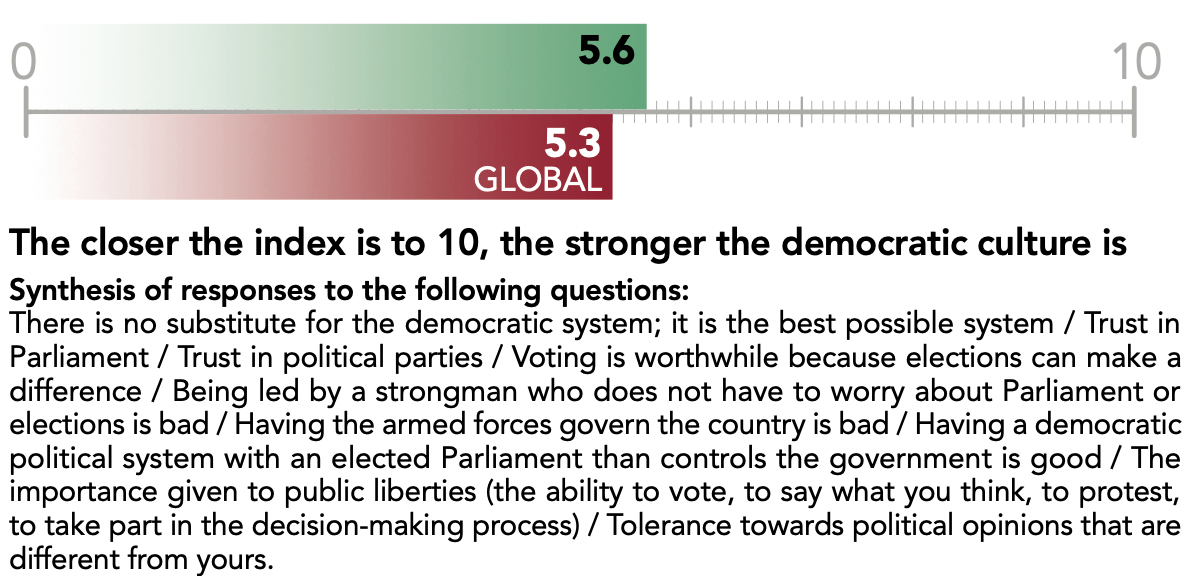
Copyright :
Fondation pour l’innovation politique/International Republican Institute – 2019
Democracy works well in my country
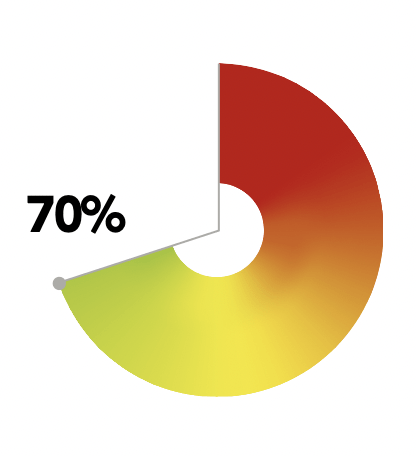

For each of the following powers, indicate if you think their posture on the international stage is worrying, reassuring or neither
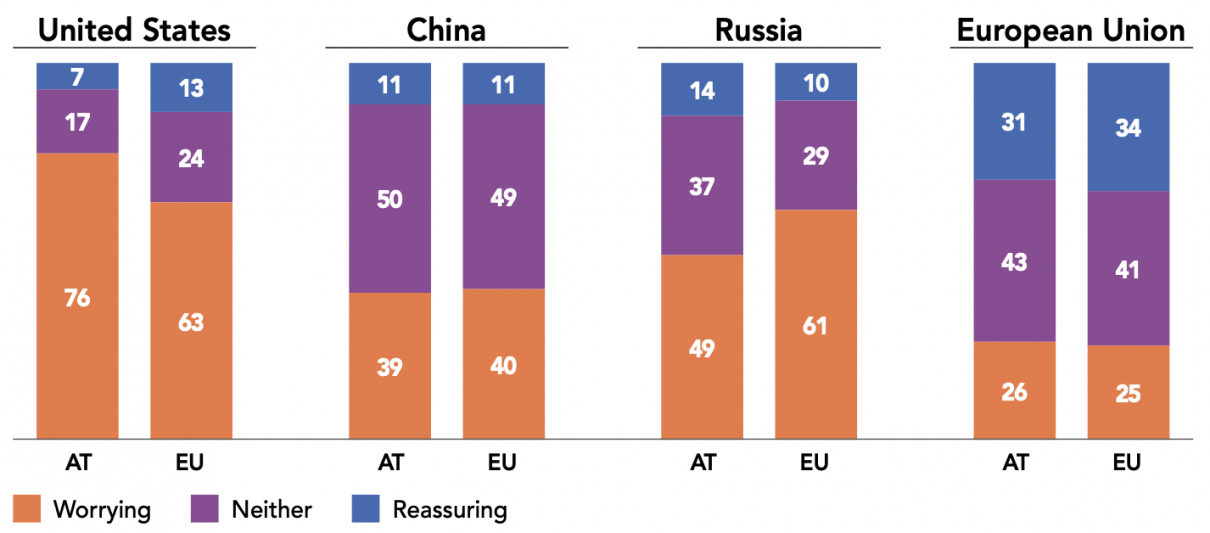
Copyright :
Fondation pour l’innovation politique/International Republican Institute – 2019
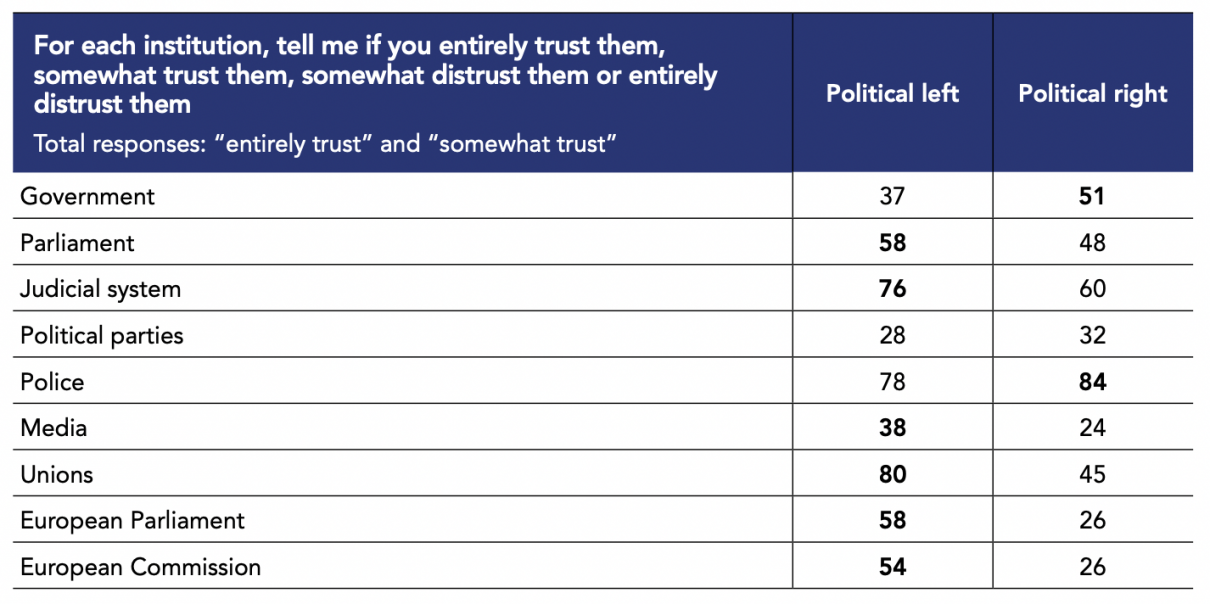
Copyright :
Fondation pour l’innovation politique/International Republican Institute – 2019
Austrians’ perception of the evolution of their standard of living has been positive in recent years, but skepticism about the coming years is quite strong: only 10% of Austrians foresee an improvement, while 55% believe that the future situation of the country will deteriorate compared to today. This is undeniably a major challenge for politicians in a country that just voted a new government into power, the result of a coalition between Sebastian Kurz’s Austrian People’s Party (ÖVP) and the far-right (Austrian Freedom Party, FPÖ).
Austria’s membership of the European Union is perceived favorably by 42% of the population, but this figure is nonetheless lower than the average for other Member States (49%). A more detailed analysis shows that one of their main concerns is the risk that EU membership weakens Austrian democracy (44% believe EU membership weakens their democracy, while only 25% believe it strengthens it).
A debate that has fueled discussions over the past few years is whether citizens prefer to have “a strongman who does not have to worry about Parliament or elections” rather than a democratic parliamentary system. In this study, 47% prefer a strongman, which is well above the average in the European Union (34%) and 6 points above the result from the previous study in 2017 (41%)1.
Nevertheless, Austrians believe that democracy works well in their country (70%) and nearly three-quarters (71%) feel they can express themselves freely. A large majority (90%) support a democratic political system consisting of an elected Parliament that controls the government. Austrians remain attached to democratic ideals such as the ability to protest, march in the streets and dissent (78%), to vote for the candidate of their choosing (96%), to take part in the decision-making process (97%) and having the right to say what they think (99%).
Trust in big tech companies
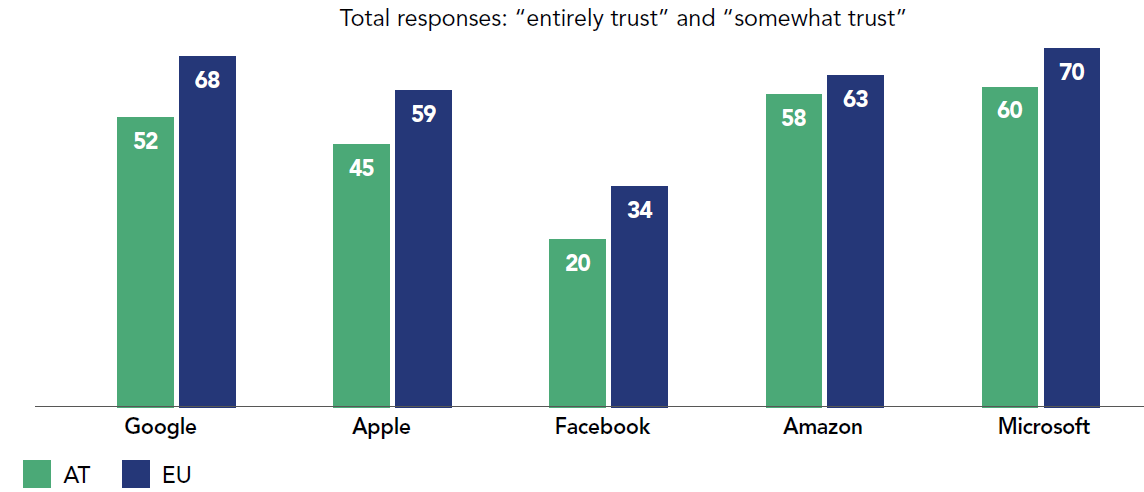
Copyright :
© Fondation pour l’innovation politique/International Republican Institute – 2019
Dominique Reynié (ed.), What next for democracy? An international survey by the Fondation pour l’innovation politique, Paris, 2017, 320 pages.
However, there is concern regarding the media, as only 28% of Austrians trust it (compared to an average of 34% in the EU). Austrians are very much in favor of the Internet and social media which, according to them, offer people the possibility to get informed by themselves (84%), help you meet new people (78%) and allow everyone to express themselves more freely (61%).
Bettina Rausch
- 42% think their country’s membership of the European Union is a good thing.
- 65% wish to keep the euro as their currency.
- 48% prefer more order even if it means less freedom.
Focus : On a scale of 1 to 10 reflecting the political spectrum from left to right, most Austrians position themselves at number 5 (41%), corresponding to the center. This shows that this one-dimensional characterization is increasingly obsolete and that the political center indeed exists, in spite of media coverage that emphasizes the polarization of political life in Austria and other European democracies.
Belgium (BE)
Index of democratic culture
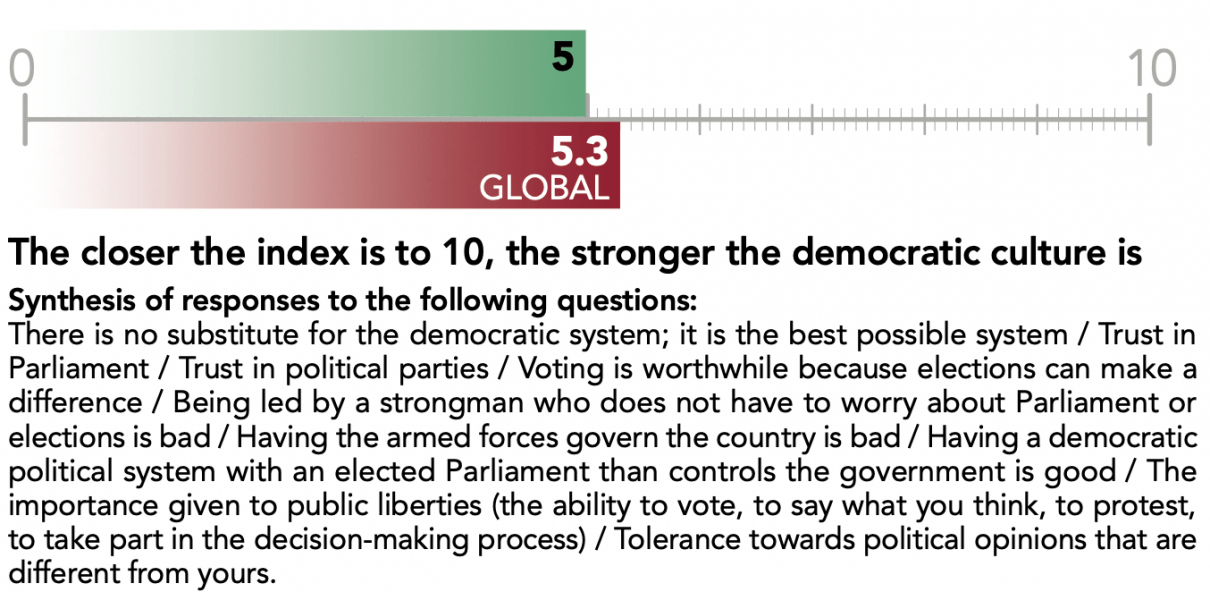
Copyright :
Fondation pour l’innovation politique/International Republican Institute – 2019
Democracy works well in my country
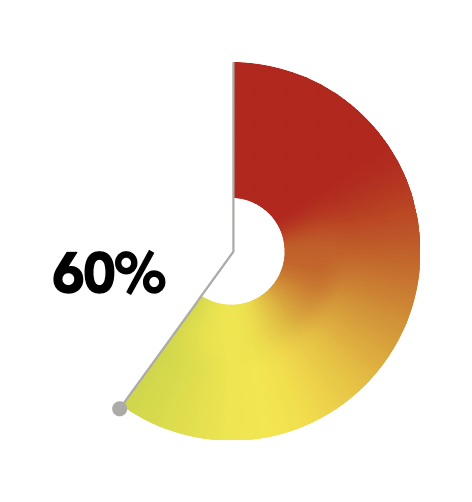

Concerning immigration, the best solution is to…
Response: “treat the problem at the European level”
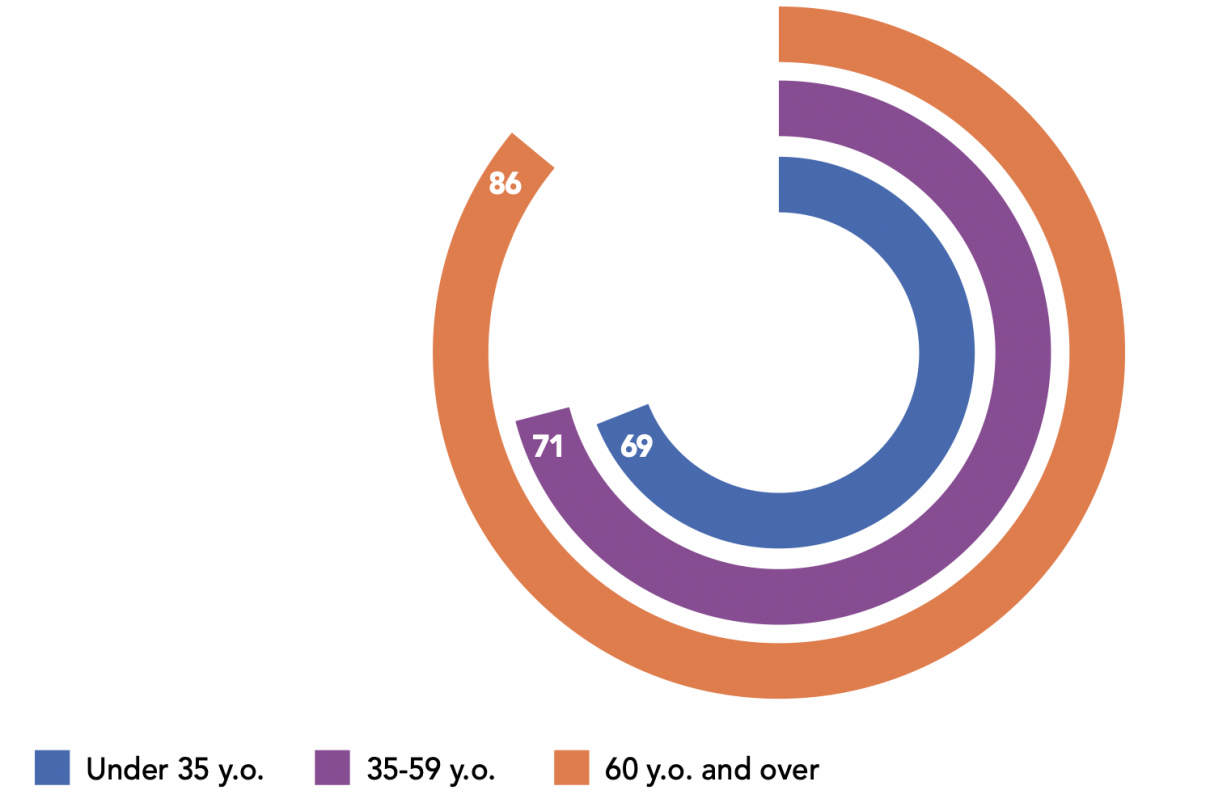
Copyright :
Fondation pour l’innovation politique/International Republican Institute – 2019

Copyright :
Fondation pour l’innovation politique/International Republican Institute – 2019
The survey portrays a Belgian society that is pessimistic about its future: 63% of citizens believe that their country will not be as good as it is now in the future. This result is in sharp contrast with the average across the 42 democracies studied (43%) and even more so within Member States of the European Union (50%). Similarly, two-thirds (66%) of Belgian respondents believe that their lifestyle is threatened (compared to 54% for the European Union average).
Although six Belgians out of ten (60%) believe that democracy works well in their country, compared to 50% on average in the European Union, a majority of them (56%) nevertheless believe that “voting is pointless because politicians do not care about the will of the people”, a result that is significantly higher than the European average (34%). There is, moreover, great skepticism with regard to the transparency of the electoral system: almost half (43%) of the Belgians surveyed believe that their electoral system is not really or not at all transparent.
Trust in institutions
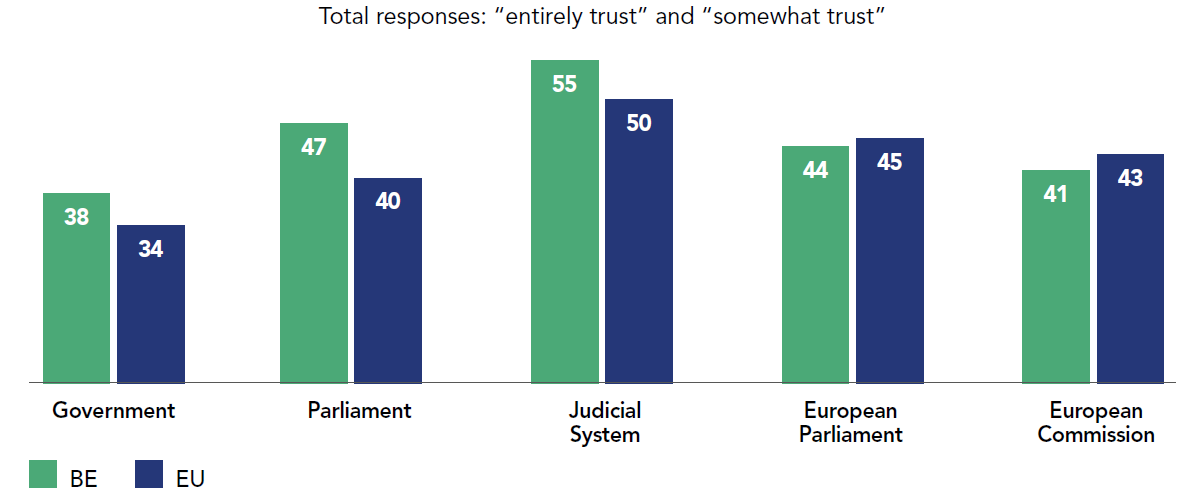
Copyright :
© Fondation pour l’innovation politique/International Republican Institute – 2019
The crisis of multiculturalism profoundly affects Belgium’s democracy, its values and its principles. Immigration is a concern (77%) at a rate well above the European average, which is itself very high (69%). Belgian respondents are also more likely (63%) than their European neighbors (53%) to justify not taking in more refugees on the grounds that they do not share the same values, making coexistence difficult. Belgian opinion is similarly more inclined (64%) to believe that more refugees cannot be taken in because this would increase the risk of terrorism in their country, again representing a number well above the average of other Member States (57%).
These tensions can also be found in the proportion of respondents (28%) claiming to be bothered by people with a different ethnicity than from their own, 9 points higher than in the European Union (19%). This sentiment is more common among men (35%) than among women (21%), and more common among citizens who position themselves on the political right (39%) than among those who position themselves on the political left (16%). More specifically, Islam is a source of concern for Belgians, since 48% of them say they are “very concerned” about it, compared to an average of 38% for the European Union.
Madeleine Hamel
- 45% think their country’s membership of the European Union is a good thing.
- 67% wish to keep the euro as their currency.
- 57% support death penalty.
Focus : More than half of Belgians (58%) say they are in favor of military intervention by democratic countries in order to defend democratic values, in contrast with 45% in European Union countries and 47% in the democracies studied. Two-thirds of Belgians (65%) support the creation of a European army in addition to national armies, a rate well above the average for European Union countries (59%).
Bosnia and Herzegovina (BA)
Index of democratic culture
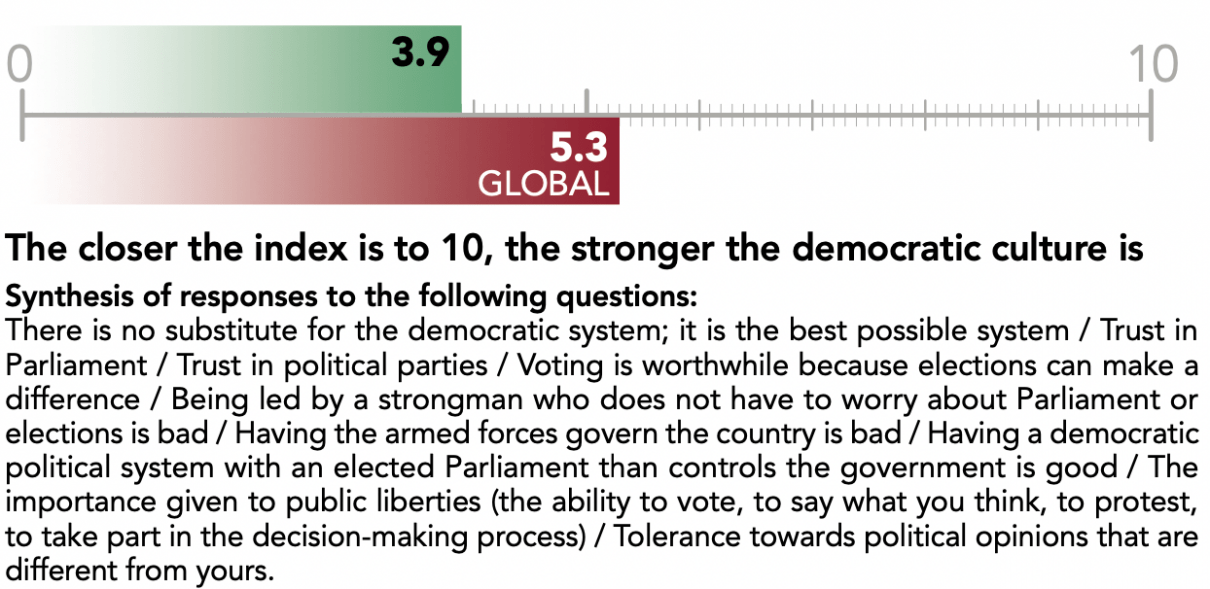
Copyright :
Fondation pour l’innovation politique/International Republican Institute – 2019
Democracy works well in my country
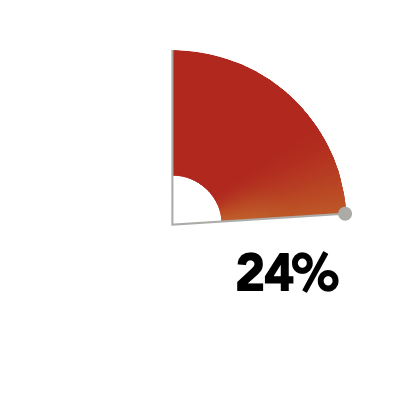

Trust in institutions
Total responses: “entirely trust” and “somewhat trust”
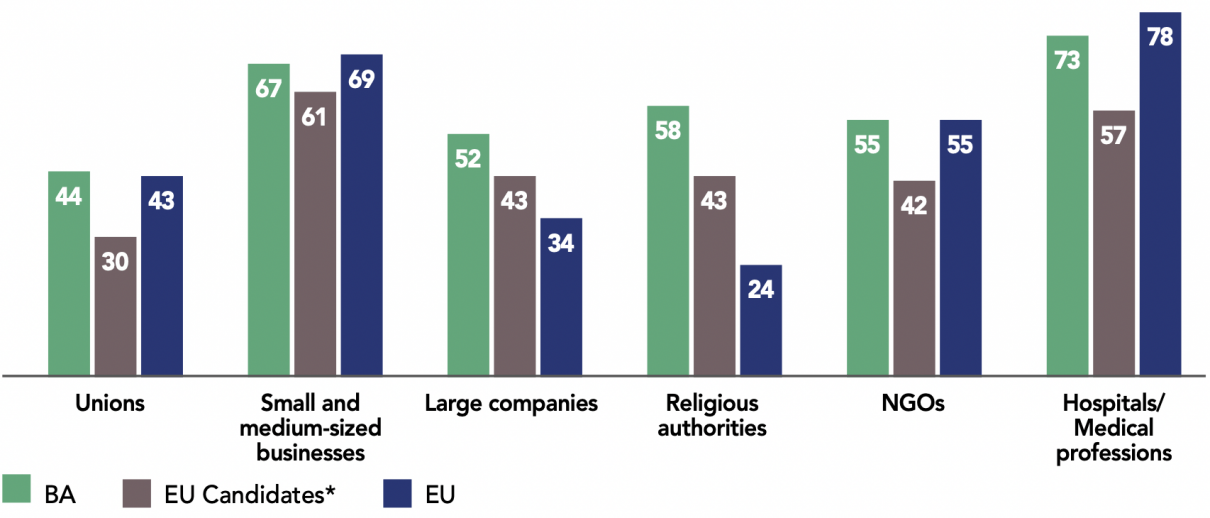
Copyright :
Fondation pour l’innovation politique/International Republican Institute – 2019
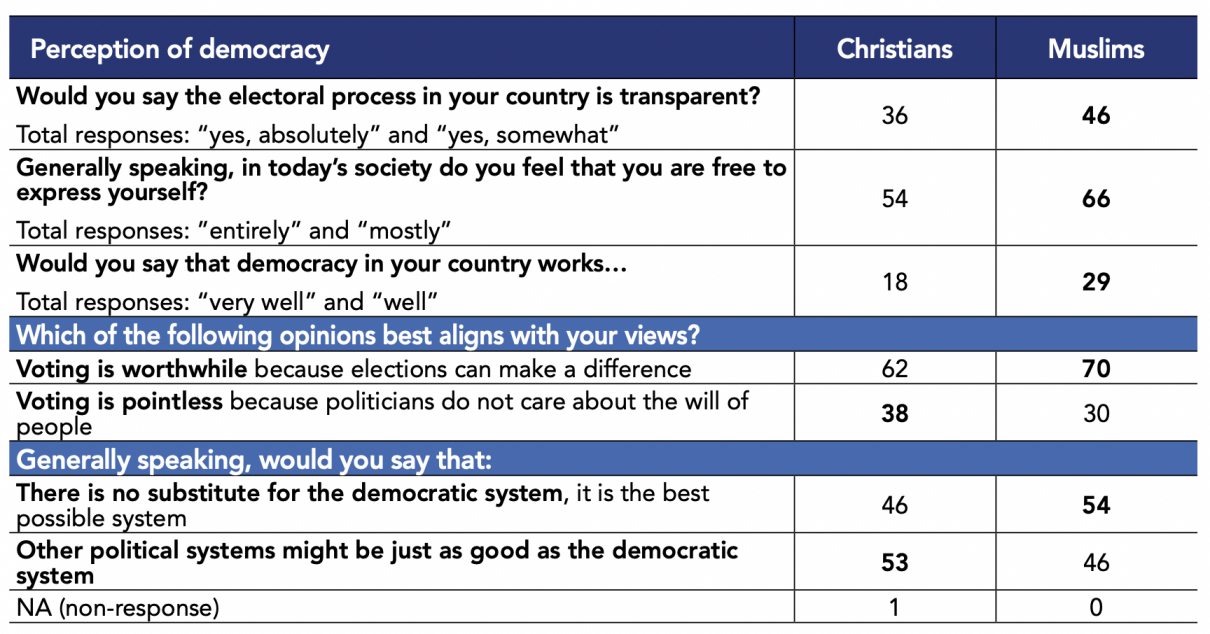
Copyright :
Fondation pour l’innovation politique/International Republican Institute – 2019
* The following countries fall into this category: Albania, Bosnia and Herzegovina, North Macedonia and Serbia.
In Bosnia and Herzegovina, the majority of respondents (56%) feel that their standard of living has neither improved nor deteriorated in recent years. It is worth noting the low percentage of people who believe that their country’s situation will be worse tomorrow than it is today (14%), compared to neighboring Serbia (52%), North Macedonia (30%) and Albania (30%). In fact, the number of people who believe that their country’s future will not change is higher in Bosnia and Herzegovina (65%) than in all the other countries in this survey.
For each one, tell me if this way of governing a country is/would be very good, good, bad, or very bad
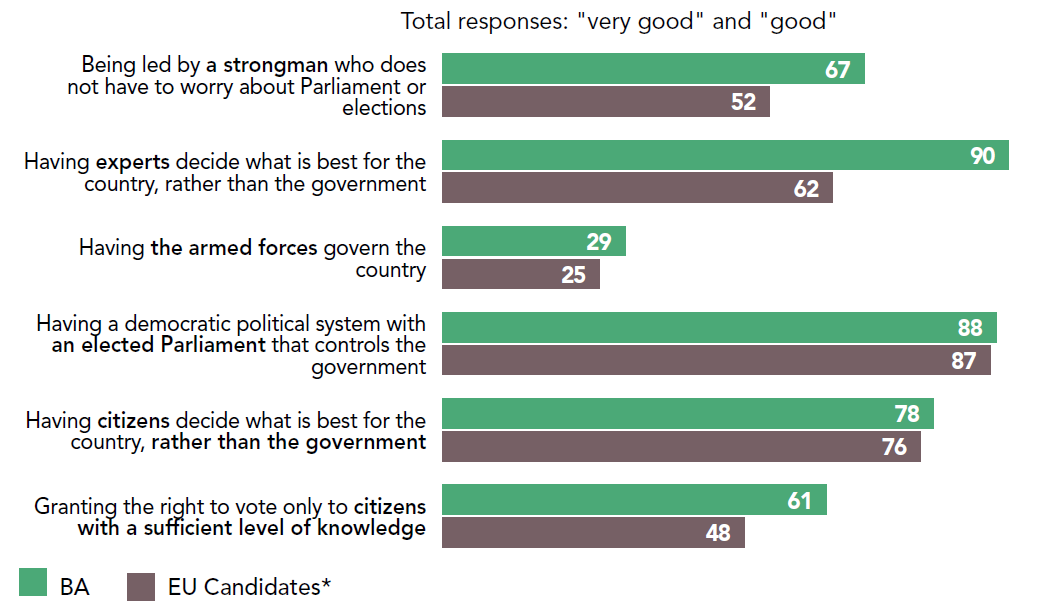
Copyright :
© Fondation pour l’innovation politique/International Republican Institute – 2019
Part of the reason why the people of Bosnia and Herzegovina feel stuck in an unchanging situation is that they doubt that democracy is a vehicle for change. Most believe that democracy works poorly in their country (76%). This opinion is equally clear in the responses regarding trust in national institutions. Most express distrust of both the political class and governing bodies. Among institutions, political parties are those that inspire the least amount of trust among citizens (only 21% trust them), followed by the government (30%) and Parliament (33%). The most trusted institutions are the police (59%), the armed forces (61%), small and medium-sized businesses (67%), hospitals/ medical professions (73%), and schools (78%).
Despite this pessimistic view of democratic contributions to the country, citizens do not shy away from political life itself. A large majority of them (66%) say that “voting is worthwhile because elections can make a difference”, and this is a higher proportion than in all their neighboring nations. It may seem curious and contradictory that two out of every three people want to participate in a system they do not trust and do not think works well, but this can be explained by the particular tripartite governance system created by the Dayton Agreement, which obliges candidates for elections to specify the ethnic community to which they belong, exacerbating these divisions beyond purely political issues. The data suggest that elections are still seen as a way for voters to be represented, although few are happy with the outcome.
Alex Tarascio
- 52% think their country’s potential accession to the European Union is a good thing.
- 66% think that once a member of the European Union, their country should adopt the euro.
- 50% of men affirm being bothered by people with different sexual orientations than their own.
Focus : Opinions on EU membership are divided along ethnic lines: 64% of Muslims and 39% of Christians believe that it would strengthen democracy in their country.
Brazil (BR)
Index of democratic culture
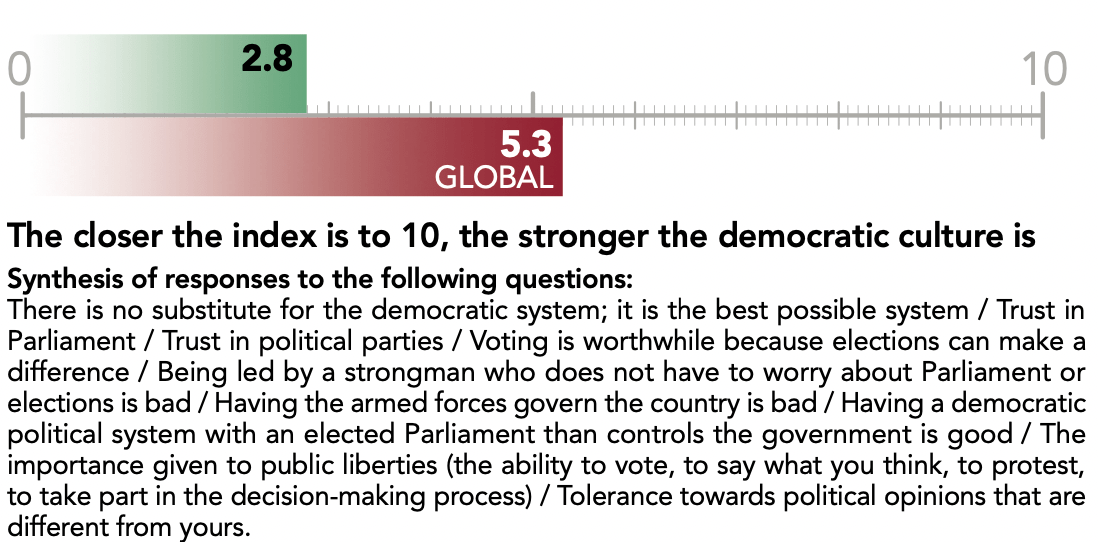
Copyright :
Fondation pour l’innovation politique/International Republican Institute – 2019
Democracy works well in my country
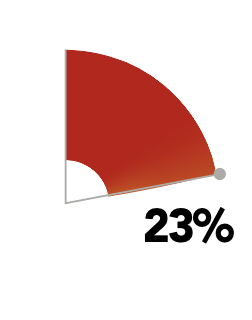
Which regime to fight corruption?*
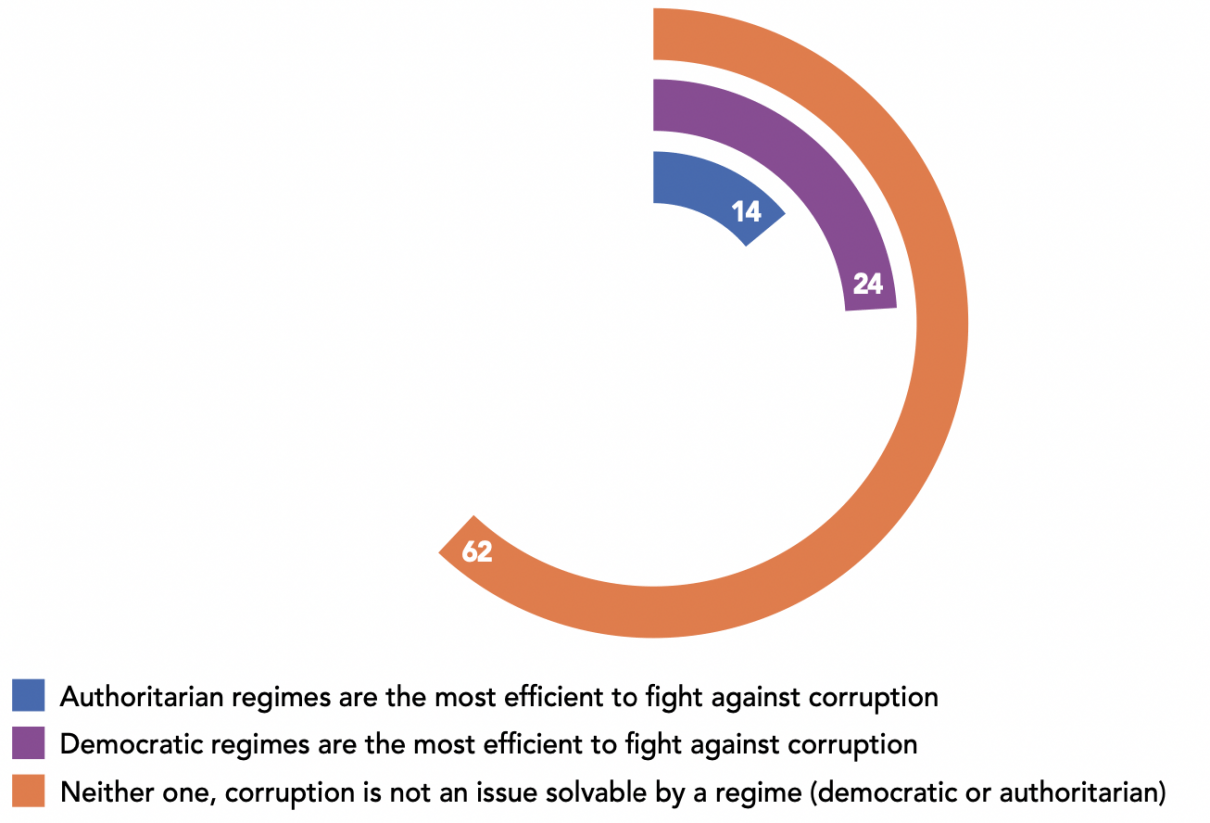
Copyright :
Fondation pour l’innovation politique/International Republican Institute – 2019
* Question asked in Brazil only.
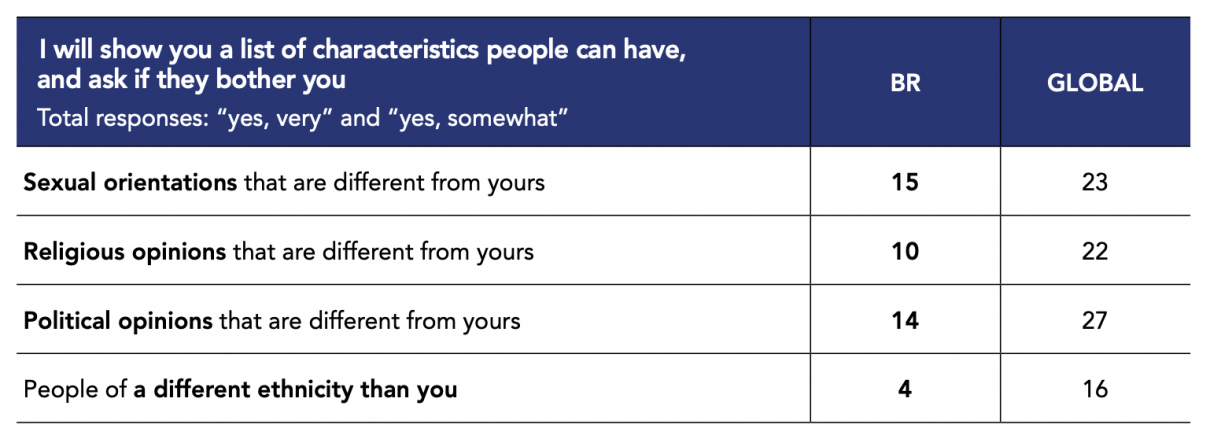
Copyright :
Fondation pour l’innovation politique/International Republican Institute – 2019
This study analyzing the state of democracy in the world, jointly carried out by the Fondation pour l’innovation politique (France), the International Republican Institute (United States) and República do Amanhã (Brazil), was conducted in the weeks before the general elections in October 2018, which ended up giving power to ex-military leader Jair Bolsonaro, elected in the second round of the presidential election with 55.1% of the vote. The results of this project reveal trends for Brazil that can be found more or less in the same proportions regardless of respondents’ ages, gender, region of origin or their socio-professional category.
The assessment of the functioning of Brazilian democracy is very harsh: 77% of the population believes it functions poorly or very poorly, which is 28 points higher than the average of the 42 democracies studied (49%). Brazil’s distrust of the political class and institutions – whether governmental or non-governmental – is probably the most striking feature. The vast majority of Brazilians are suspicious of all institutions. Only the armed forces stand out, with 70% of Brazilians claiming to trust them. It should be noted that Brazil, led by a military dictatorship between 1964 and 1985, is the only country in the survey where nearly one in two citizens (45%) believe that being governed by a military regime is a good thing (average of 21% for the 42 countries studied).
Distrust in institutions
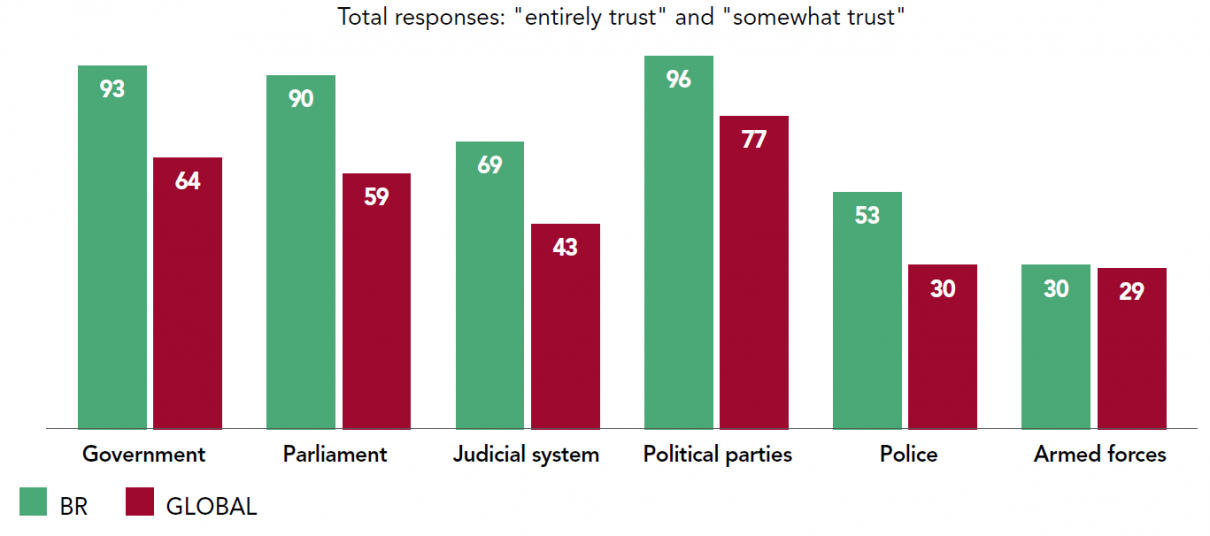
Copyright :
© Fondation pour l’innovation politique/International Republican Institute – 2019
Question asked in Brazil only.
In a deeply unequal state, a second important trend is related to a sense of fear and insecurity. Virtually all Brazilians surveyed (96%) expressed their concern about unemployment (compared to 71% in all 42 countries), social inequalities (94% versus 80%), crime (94% versus 85%) and diminished purchasing power (90% versus 73%).
Against the backdrop of the economic and political crisis, the state of Brazil’s democracy can partly be explained by the loss of confidence in the ability of its institutions and political class to improve its people’s standard of living and thus protect them. To the question: “Generally speaking, do you feel that your standard of living has gotten better or worse over the past few years?” 29% of Brazilians reply that it has gotten worse and 40% that it has remained the same. It remains to be seen whether the country’s new political configuration will provide answers to these concerns or instead be a source of further disillusionment.
Octavio de Barros
- 45% are in favor of having the armed forces govern the country.
- 50% believe that having the armed forces govern the country is the best solution to solve country’s problems*.
- 73% prefer more order even if it means less freedom.
Focus : Although Brazil has been hit by an economic and political crisis since 2015, 81% of its citizens see globalization as an opportunity. This rate, which is 15 points above the average of the democracies studied, is the highest of the 42 countries in this survey.
Bulgaria (BG)
Index of democratic culture
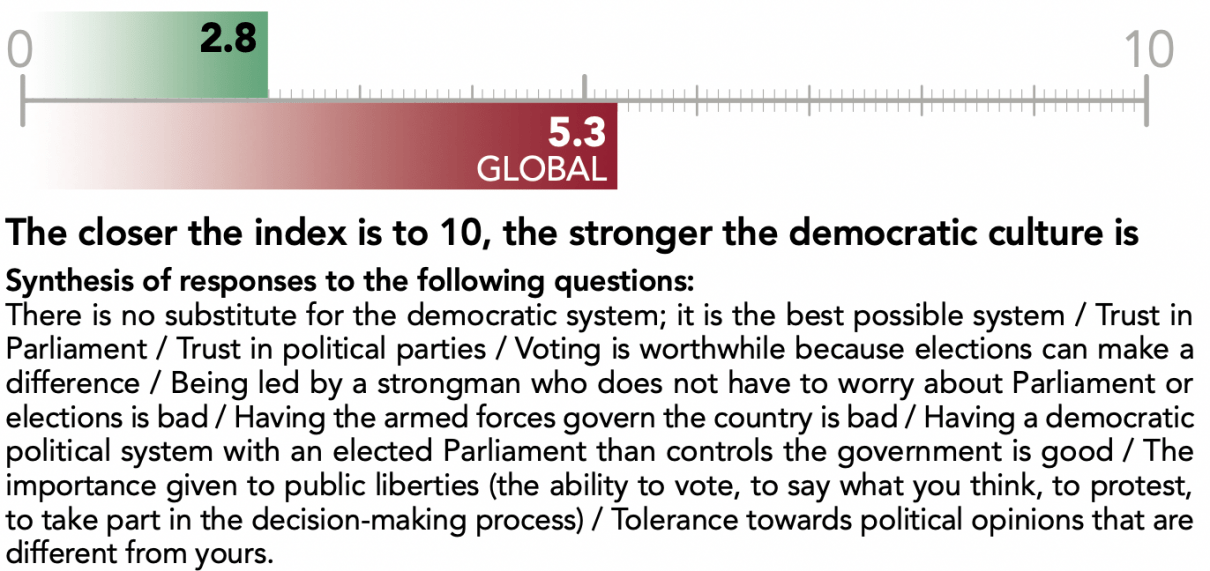
Copyright :
Fondation pour l’innovation politique/International Republican Institute – 2019
Democracy works well in my country
24%
Democracy works well in my country
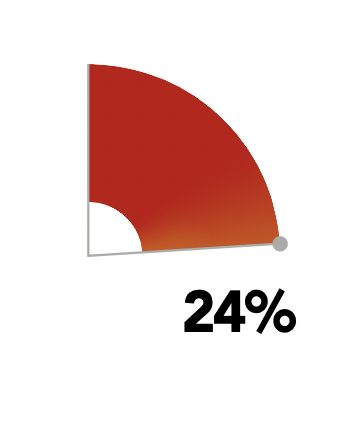

We cannot let in more refugees because…
Total responses: “strongly agree” and “agree”
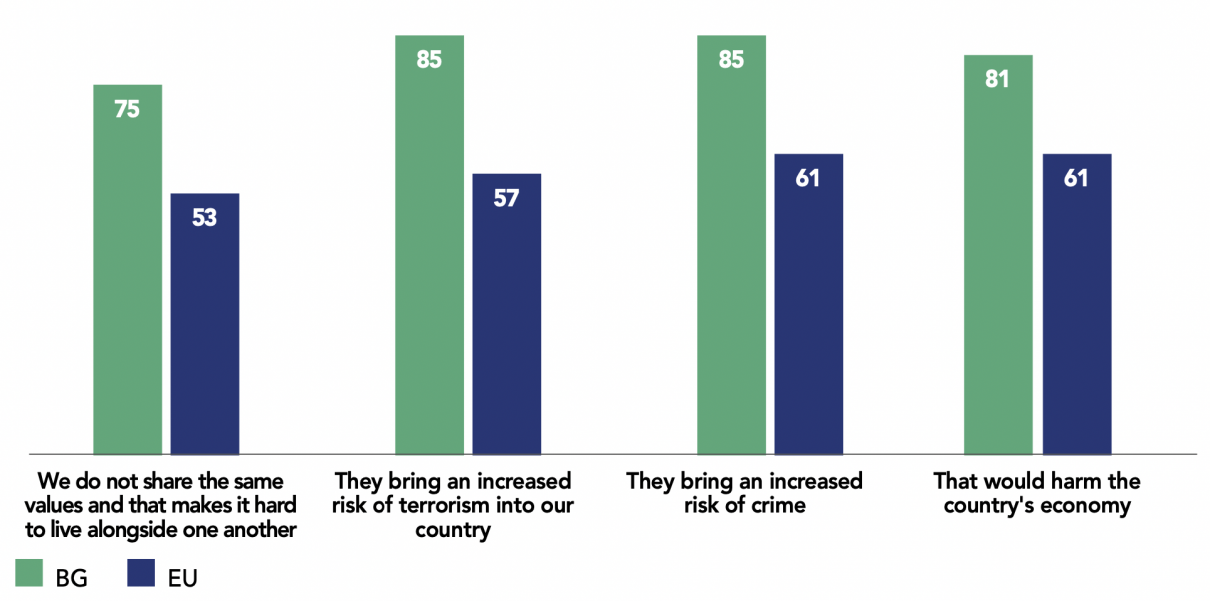
Copyright :
Fondation pour l’innovation politique/International Republican Institute – 2019
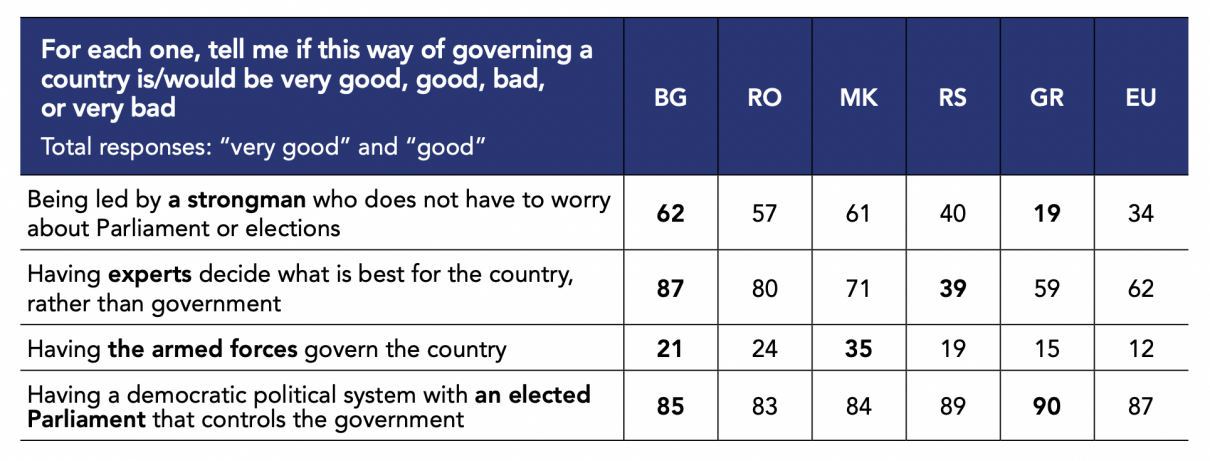
Copyright :
Fondation pour l’innovation politique/International Republican Institute – 2019
In Bulgaria, three-quarters of citizens (76%) believe that their democracy is working poorly. The electoral process is considered transparent by only one-third of respondents (35%) and more than half (56%) of citizens think that voting is pointless because politicians do not care about the will of the people. Moreover, the level of trust in institutions is low, whether it be in the government (19%), the judicial system (17%), Parliament (10%) or political parties (9%). A very high number of Bulgarians prefer “more order even if it means less freedom” (81%), which is much higher than the average of the 42 surveyed countries (57%). This is consistent with the preference stated for having a “strongman who does not have to worry about Parliament or elections” as head of state, seen as a good way to govern by 62% of citizens.
The level of trust in European institutions, particularly in the Commission and Parliament (43% and 45% respectively for the EU average), is much higher among Bulgarians (50% for both). Furthermore, 38% believe that EU membership strengthens democracy in Bulgaria while 35% believe this has no effect on their democracy. For 68% of the citizens surveyed, immigration should be dealt with at the European level, which is on par with the European average.
Are you in favor or against the military intervention of democratic countries in other countries in order to defend democratic values?
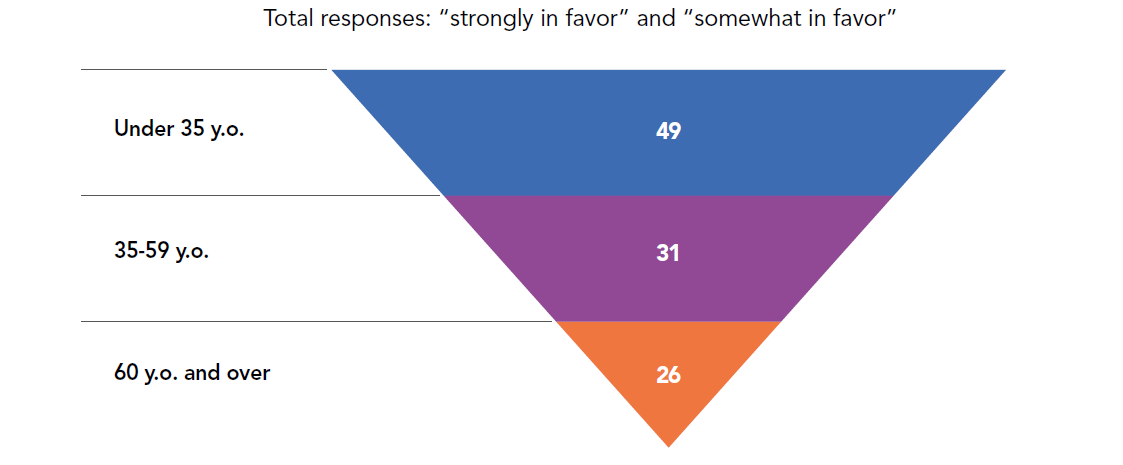
Copyright :
© Fondation pour l’innovation politique/International Republican Institute – 2019
Concerning foreign and security policy, the majority of Bulgarians (71%) support the creation of an army shared by all EU Member States in addition to that of each country. This figure should be compared to Bulgarians’ perception of its military alliance with the United States (NATO), considered by 36% to be a good thing and by 26% to be a bad thing. Most respondents consider the alliance to be neither good nor bad (38%). The countries perceived as most influential in the world are the United States (61%) and Russia (26%), though the United States is also the country that causes the most concern regarding its posture on the international stage (61%) while China elicits the least concern (19%). The most trusted powers are Russia (45%) and the EU (38%).
Yasen Georgiev
- 45% think their country’s membership of the European Union is a good thing.
- 43% say they are interested in politics.
- 50% think that the role of the government in the economy should be strengthened and the freedom of enterprises should be limited.
Focus : The Bulgarians surveyed in this study have a higher regard for social media and the Internet than the EU average: they see them as a good thing because they help people to express themselves more freely (89% compared to 70%) and offer people the possibility to get informed by themselves (95% compared to 83%). They are less inclined than the rest of EU citizens to say that they are a bad thing because they facilitate the spread of false information (64% versus 73%).
Canada (CA)
Index of democratic culture
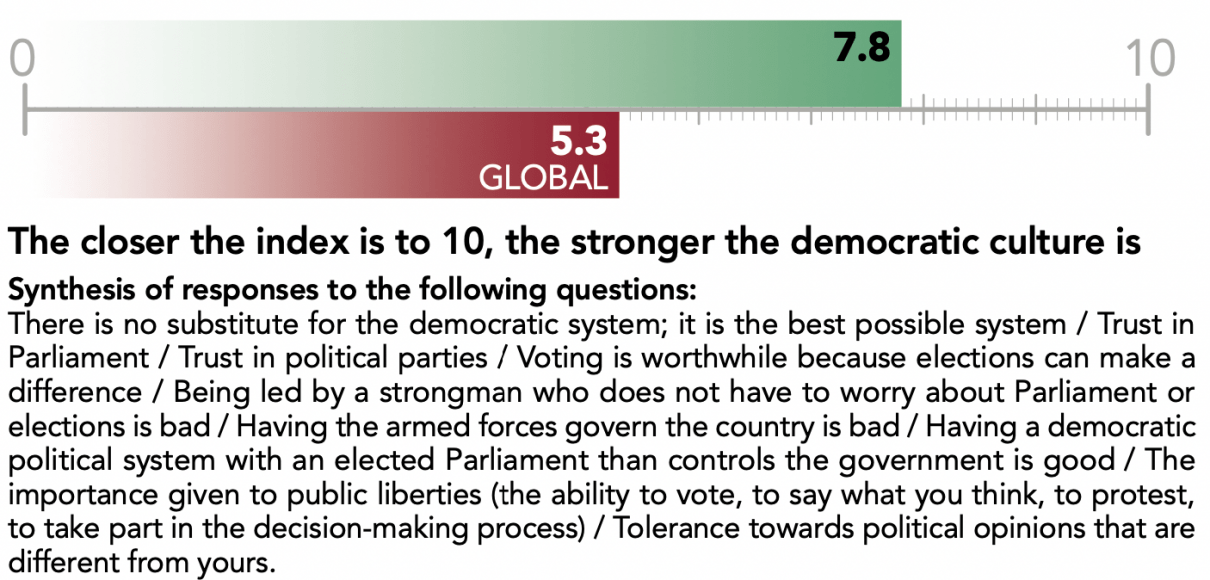
Copyright :
Fondation pour l’innovation politique/International Republican Institute – 2019
Democracy works well in my country
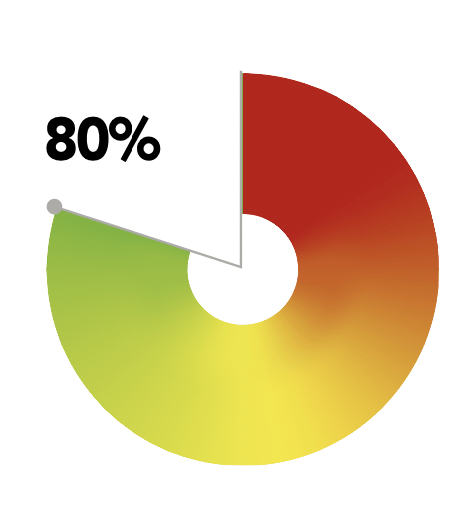

Trust in institutions
Total responses: “entirely trust” and “somewhat trust”
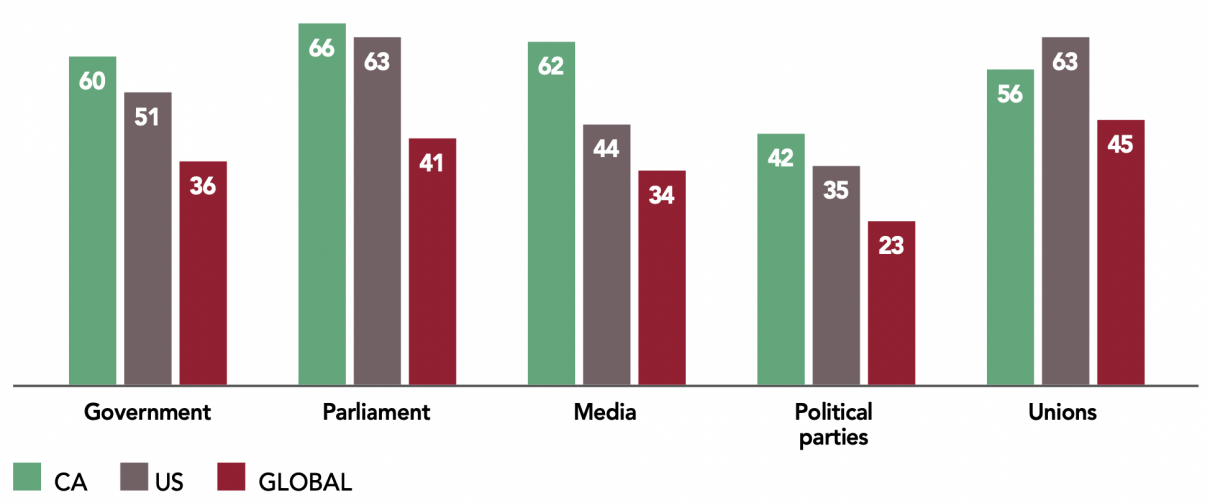
Copyright :
Fondation pour l’innovation politique/International Republican Institute – 2019
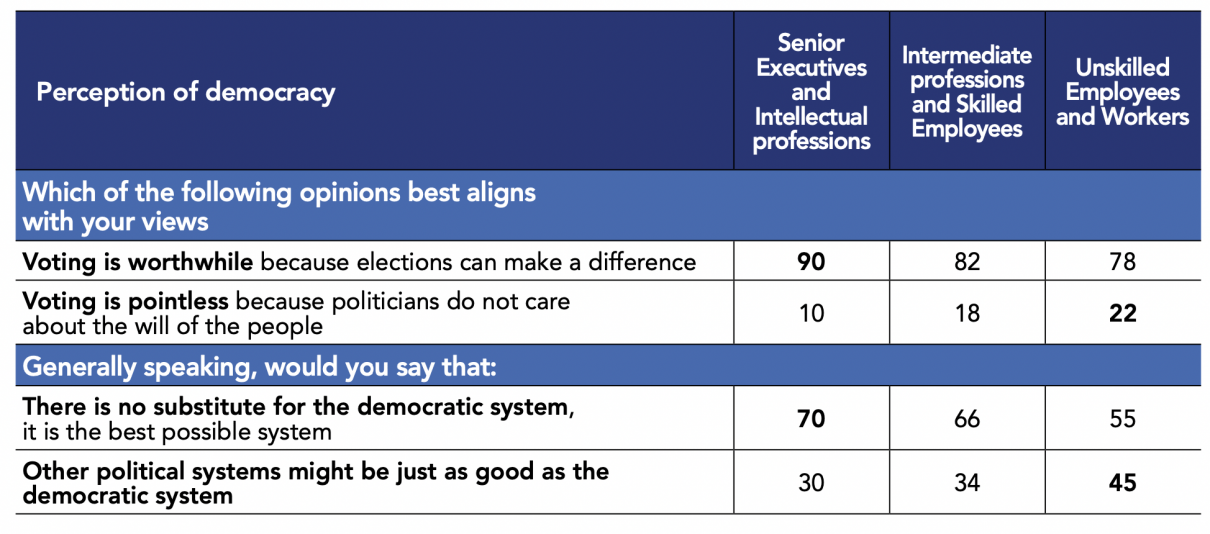
Copyright :
Fondation pour l’innovation politique/International Republican Institute – 2019
Canada is a parliamentary democracy which uses the UK-style Westminster system, one which its citizens largely support: 92% of Canadians claim that having “a democratic political system with an elected Parliament that controls the government” is a good thing, 10 points higher than the average of the 42 democracies surveyed (82%). This support for parliamentary democracy is reflected in the recognition of the usefulness of voting (84% believe it is worthwhile compared to 70% on average for the democratic world) and the importance of freedom of expression (85% believe they can express themselves freely compared to 68% on average for all 42 countries).
Canada’s largest trading partner since the 1988 Free Trade Agreement, replaced six years later by the North American Free Trade Agreement (NAFTA), is the United States. Yet, the country remains a cause for concern for its Canadian neighbors: three-quarters of Canadians (76%) consider the U.S.’ posture on the international stage to be worrying, a level of concern well above the average of the rest of the 42 surveyed democracies (56%). However, their alliance is not to be completely called into question. While Canada has increased its military spending (from 23.9 billion Canadian dollars in 2015-2016 to 27.6 billion in 2019), most Canadians (58%) believe that “being part of a military alliance with the United States (NATO)” is a good thing.
Which of the following powers is the most influential in the world?
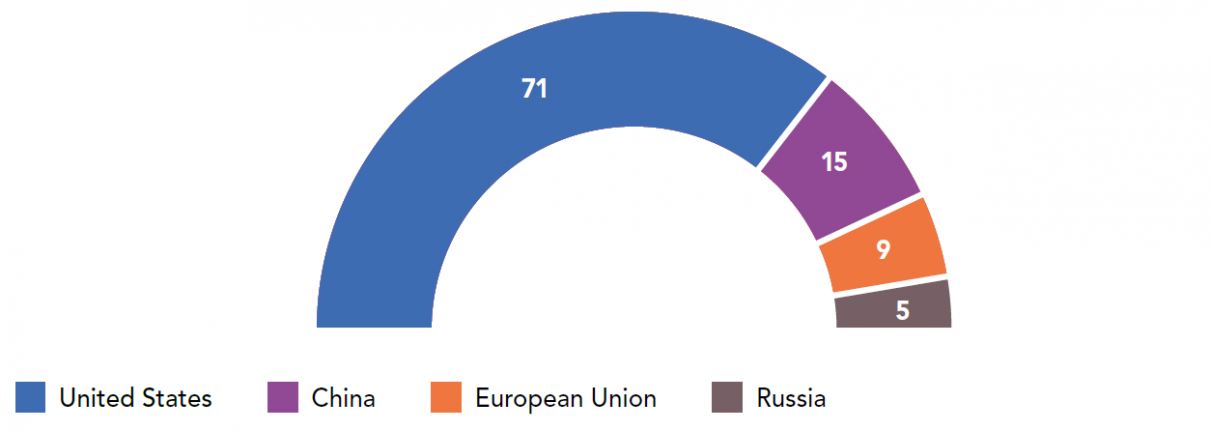
Copyright :
© Fondation pour l’innovation politique/International Republican Institute – 2019
While the issue of immigration remains very important within their society, Canadians are less likely (47%) than Americans (58%), Australians (60%) or even citizens across all the democracies covered by our study (61%) to worry about it. Furthermore, 42% of Canadians believe that letting in more refugees would harm the country’s economy (versus 52% in all 42 democracies), increase the risk of terrorism (41% versus 52%) and the risk of crime (37% versus 52%).
However, the survey shows that young people are less tolerant than the rest of the Canadian population. More than a quarter of those aged under 35 (26%) say they are bothered by people of different ethnicity (compared to 17% of respondents aged 35 to 59) and nearly one-third (32%) say they are bothered by those with different religious opinions than their own (compared to 25% of 35-59 year-olds). Above all, 38% of those under 35 say they are bothered by people with different political views, compared to 22% of those aged 60 and over.
Julie Noyer
- 56% support the death penalty.
- 65% consider that their lifestyle or the way of life in their country is not threatened.
- 74% globalization as an opportunity.
Focus : In the 42 democracies covered by our survey, Canadians are among the most enthusiastic about globalization: almost three-quarters (74%) believe that globalization is an opportunity. Only the Brazilians (81%), Portuguese (78%), Japanese (76%), Swedes (76%) and Israelis (75%) show more enthusiasm, with the average of all 42 democracies standing at 66%.
Croatia (HR)
Index of democratic culture
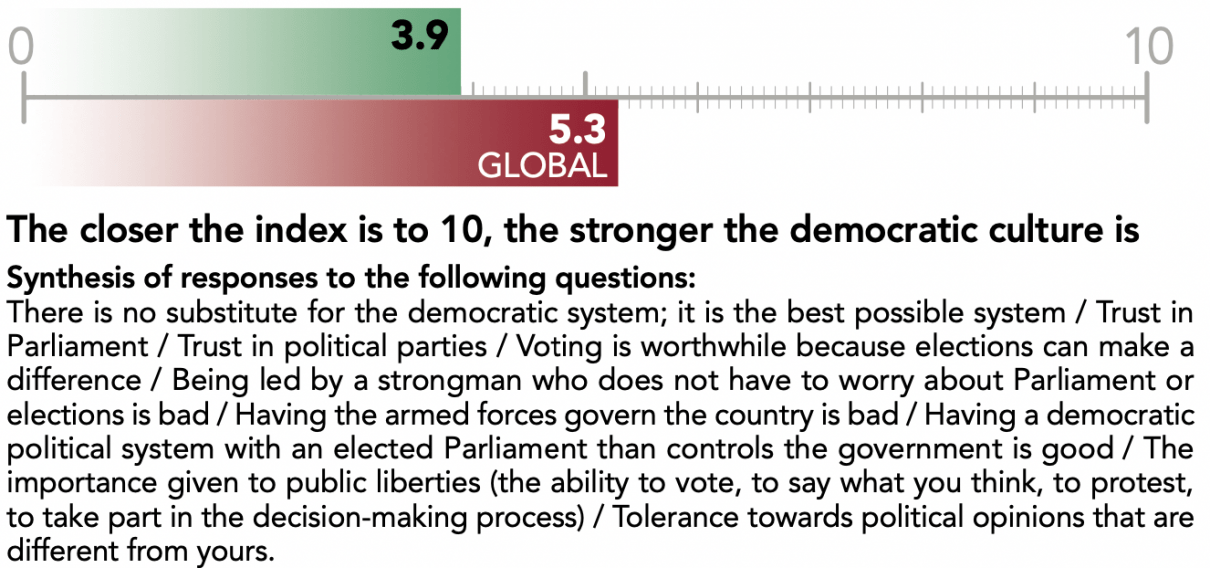
Copyright :
Fondation pour l’innovation politique/International Republican Institute – 2019
Democracy works well in my country
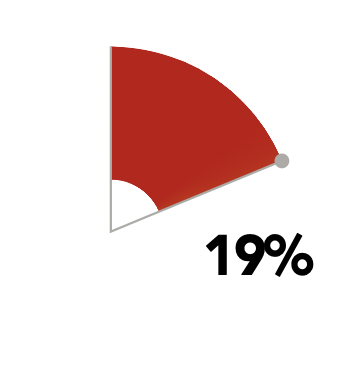

Indicate whether you are worried or not about each of the following topics
Total responses: “very worried” and “worried”
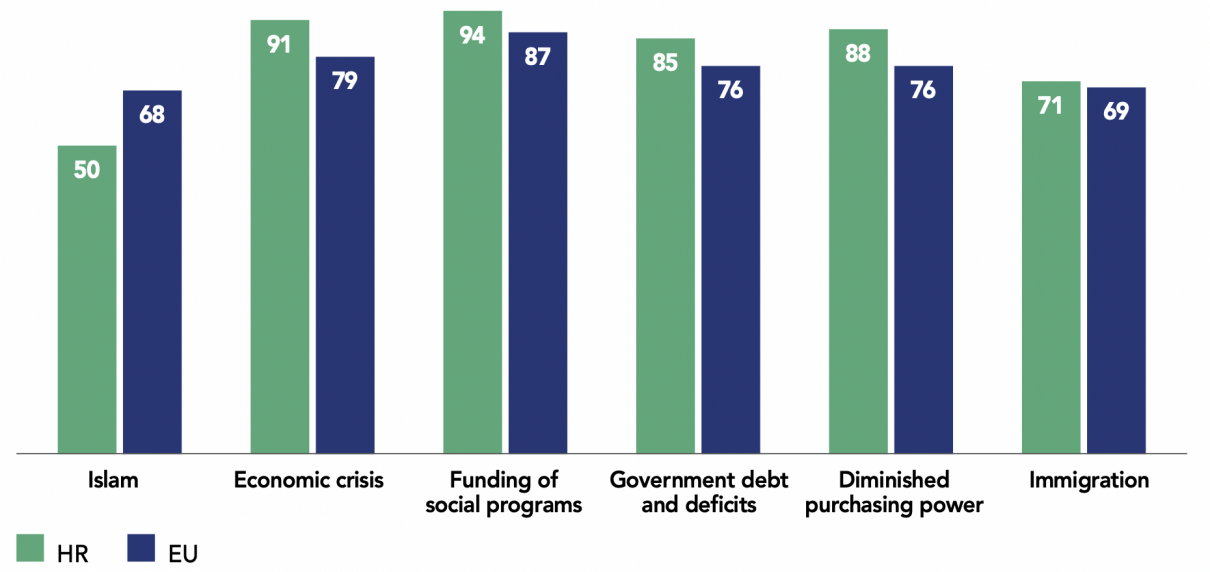
Copyright :
Fondation pour l’innovation politique/International Republican Institute – 2019

Copyright :
Fondation pour l’innovation politique/International Republican Institute – 2019
The most recent state to have joined the European Union, the citizens of Croatia have a generally negative perspective on its current situation and its future. Only a quarter (25%) of the population believe that the standard of living has improved in recent years and 37% of Croatians feel that it has deteriorated. A large majority believe that their lifestyle is under threat (70%) and 57% believe that the country’s situation will be worse in the future. In the eyes of more than three-quarters (81%) of the population, their democracy is not working well; two-thirds think that elections are not transparent (65%) and that voting is useless since politicians ignore the will of the people (64%) and almost half (46%) believe that the number of democracies in the world is in decline.
Croatians express a deep mistrust of a large number of institutions. An overwhelming majority of Croatians do not trust political institutions such as political parties (93%), the government (84%), the judicial system (78%) and Parliament (76%). Croatian citizens feel the same way about big businesses (77%), religious authorities (72%), trade unions (60%), the media (58%) and NGOs (57%). The only institutions that have the trust of the majority of the population are schools (81%) the armed forces (65%), the police (58%), and hospitals/medical professions (53%).
I will show you a list of characteristics people can have, and ask if they bother you
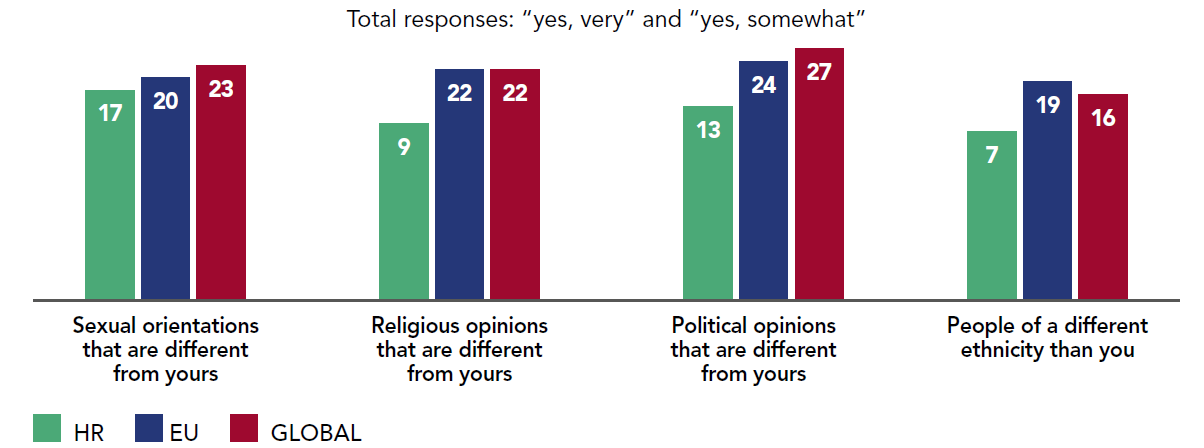
Copyright :
© Fondation pour l’innovation politique/International Republican Institute – 2019
Overall, the picture painted is very pessimistic, but the most worrying data are found among the Croatian youth. Although no age group seems convinced by the current system, older people are often those with the highest rate of satisfaction. The under-35s, on the other hand, are the most skeptical towards the European Union and the most inclined to consider alternatives to democracy. With regard to Croatians’ perception of their recent joining of the European Union, almost half of people aged 60 and over view it positively (46%). Only one-third of Croatians aged 18-35 (35%) and 35-59 (34%) share this opinion. Similarly, while more than one-third (35%) of older voters believe that the European Union strengthens democracy in Croatia, only 19% of young Croatians subscribe to this idea. If these positions are maintained in the future, the image of the European Union will gradually decline as the younger age groups join the governing bodies of political parties.
The same is true of internal affairs. The percentage of people who think that other political systems could be just as valid as the democratic system is 20 points higher among young people than their elders (65% versus 45%). Only one-third (35%) of the oldest age group would welcome a strongman-led state, compared to over half of young people (52%).
Paul Prososki
- 37% think their country’s membership of the European Union is a good thing.
- 28% consider that their country’s membership of the European Union strengthens their democracy.
- 64% think that the problem of immigration should be treated at the European level.
Focus : While in most Central and Eastern European countries a majority favors the creation of a European army, largely because of their geographic proximity to Russia, 56% of Croatians are opposed to this idea.
Cyprus (CY)
Index of democratic culture
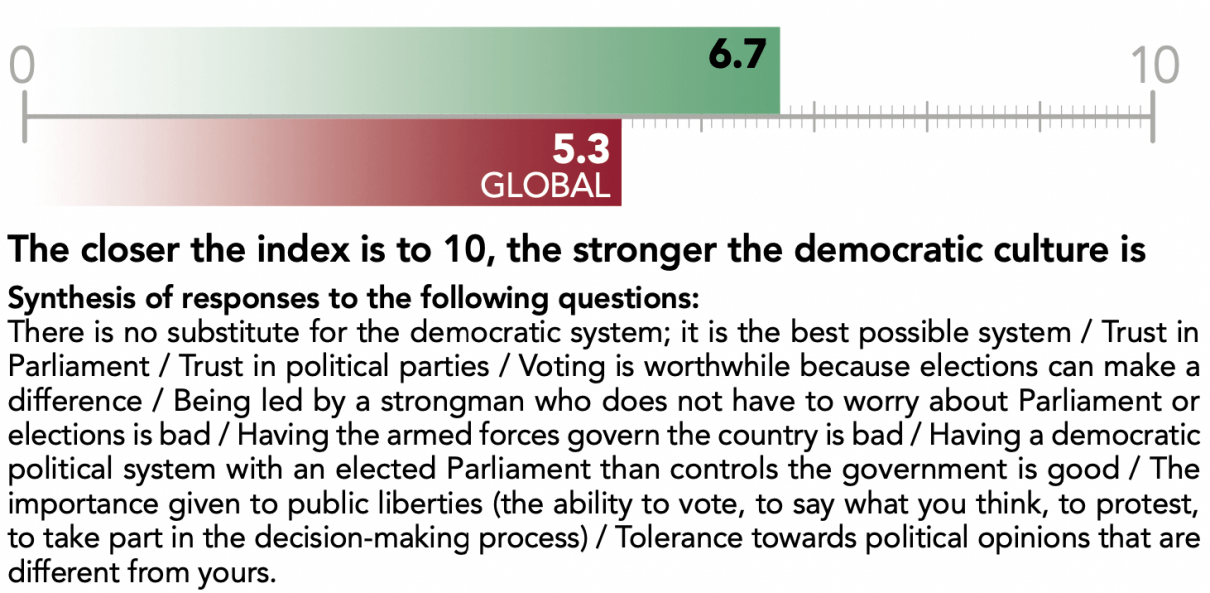
Copyright :
Fondation pour l’innovation politique/International Republican Institute – 2019
Democracy works well in my country
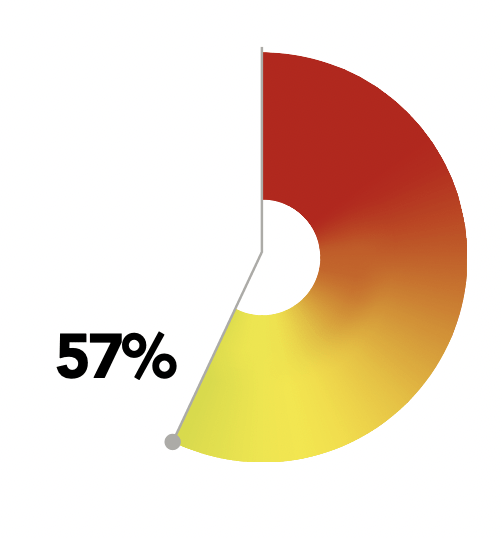

Would you say the number of democratic countries in the world is…
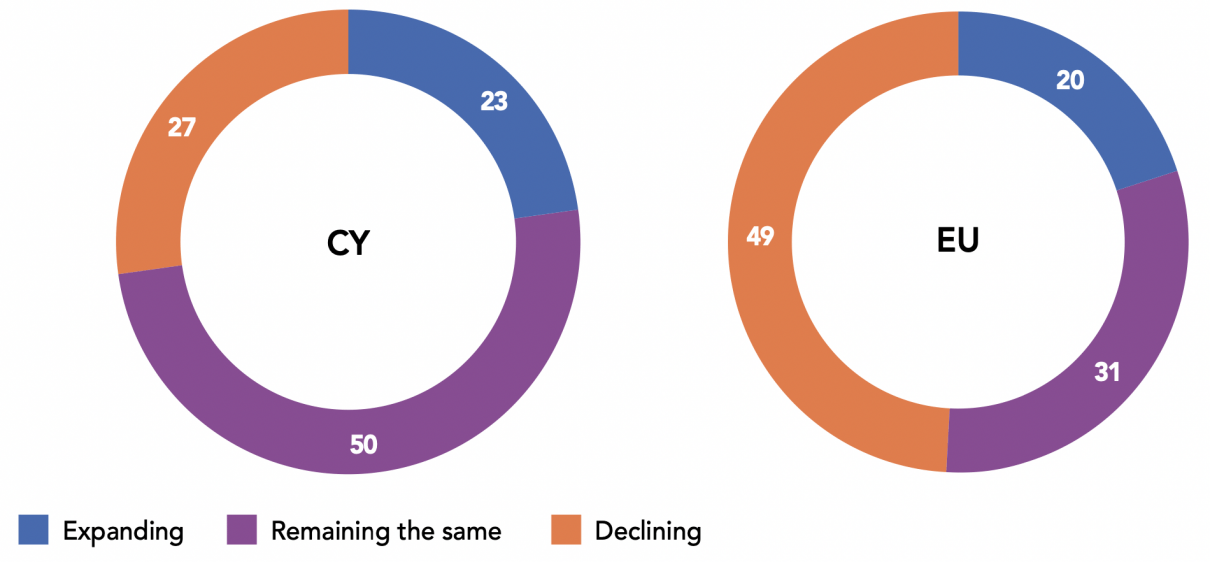
Copyright :
Fondation pour l’innovation politique/International Republican Institute – 2019
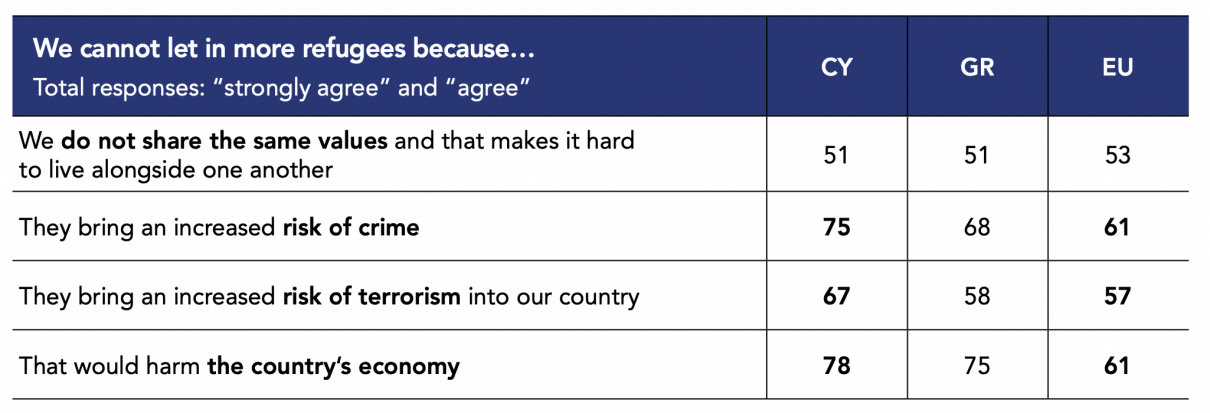
Copyright :
Fondation pour l’innovation politique/International Republican Institute – 2019
In this study, more than one in two Cypriots (56%) say they are not interested in politics, and scarcely half (49%) say that voting is worthwhile because elections can make a difference. Despite mandatory voter participation on the island, the turnout for the second round of the February 4th 2018 presidential election was 73.9%, lower than turnout in 2013.
Cypriots harshly judge social media. Almost all of them (92%) believe that these new forms of media increase the circulation of false information (compared to 73% of EU citizens) and almost as many (86%) believe that they allow the disclosure of personal data to third parties (compared to 71% on average in the EU). Cypriots respond negatively on this topic even when compared to other countries in the region: 45% of Maltese and 35% of Greeks consider social media “a bad thing because they encourage us to communicate exclusively with those who share our views”, while this percentage is 68% for Cypriots.
For each of the following countries, indicate if you think their posture on the international stage is worrying, reassuring or neither
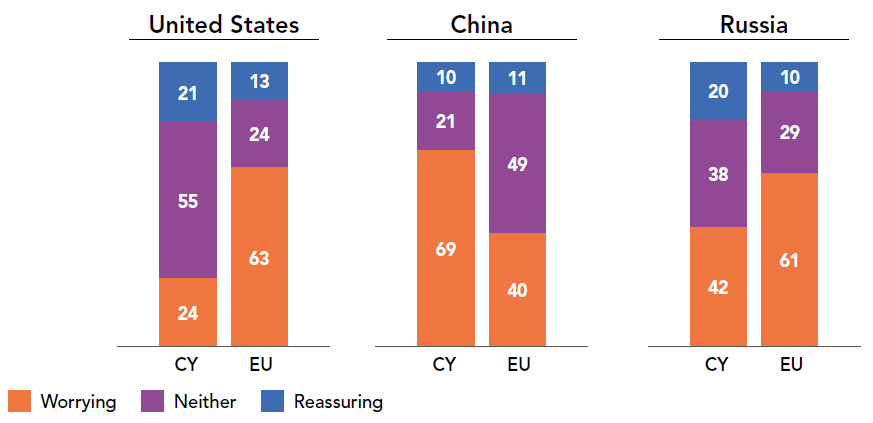
Copyright :
Fondation pour l’innovation politique/International Republican Institute – 2019
More than one-third of Cypriots (36% versus 16% in the European Union) say that they “strongly oppose” the idea of democratic countries intervening militarily in other countries in order to defend democratic values, and a quarter (26% versus 13% in the EU) “strongly oppose” the creation of a European army in addition to national armies. These results can partly be explained by the low level of interest in the European Union among many Cypriots: 37% believe that being a member of the European Union is “neither good nor bad” and 43% believe that the United Kingdom will be neither better nor worse off without the European Union.
As can be seen from the graph above, the views of Cypriots on the posture of the major powers on the international stage are very different than those across the European Union.
Madeleine Hamel
- 36% think their country’s membership of the European Union is a good thing.
- 46% wish to keep the euro as their currency.
- 66% oppose abortion rights.
Focus : Three out of four Cypriots (75%) believe that letting in more refugees increases the risk of crime in their country (versus 61% for the European Union) and 48% say they “strongly agree” that this would harm the country’s economy (versus 29% in the European Union).
Czech Republic (CZ)
Index of democratic culture
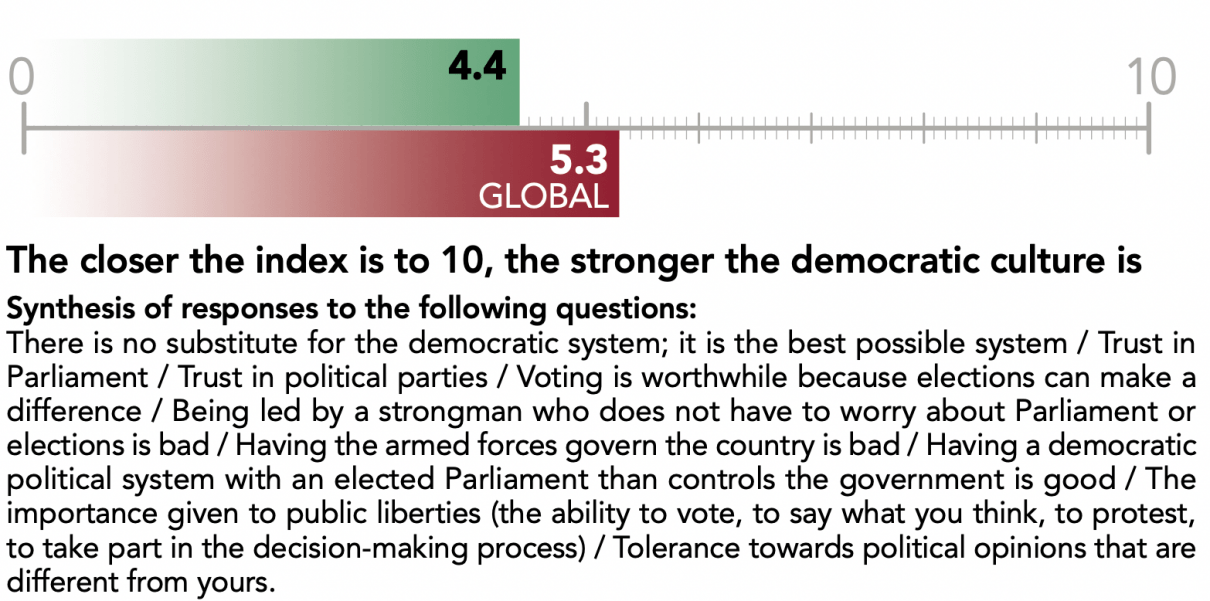
Copyright :
Fondation pour l’innovation politique/International Republican Institute – 2019
Democracy works well in my country
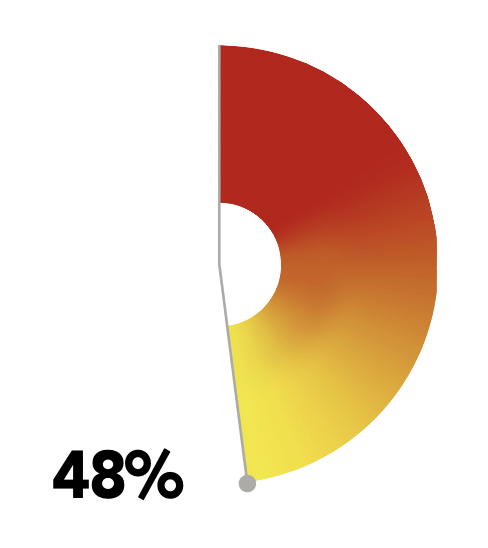

Do you feel your country’s European Union membership…
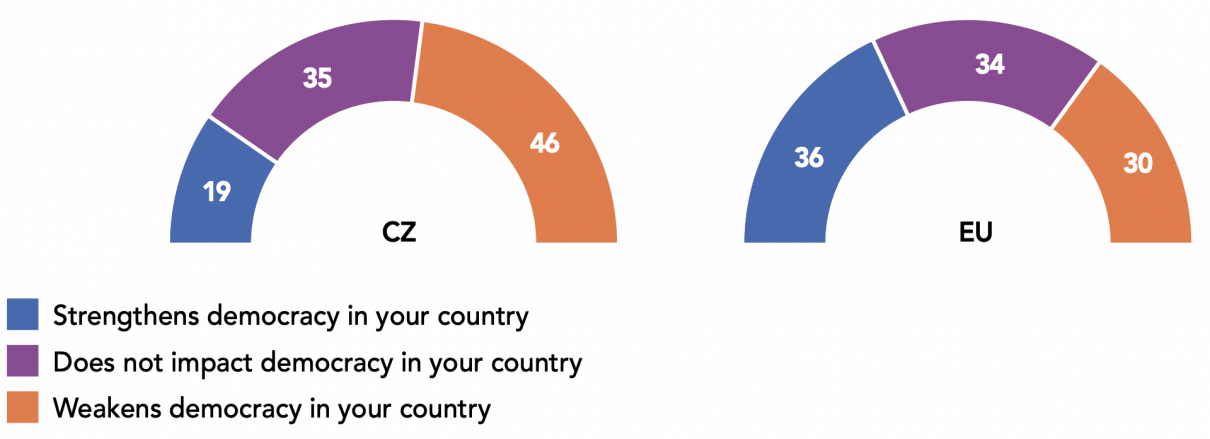
Copyright :
Fondation pour l’innovation politique/International Republican Institute – 2019
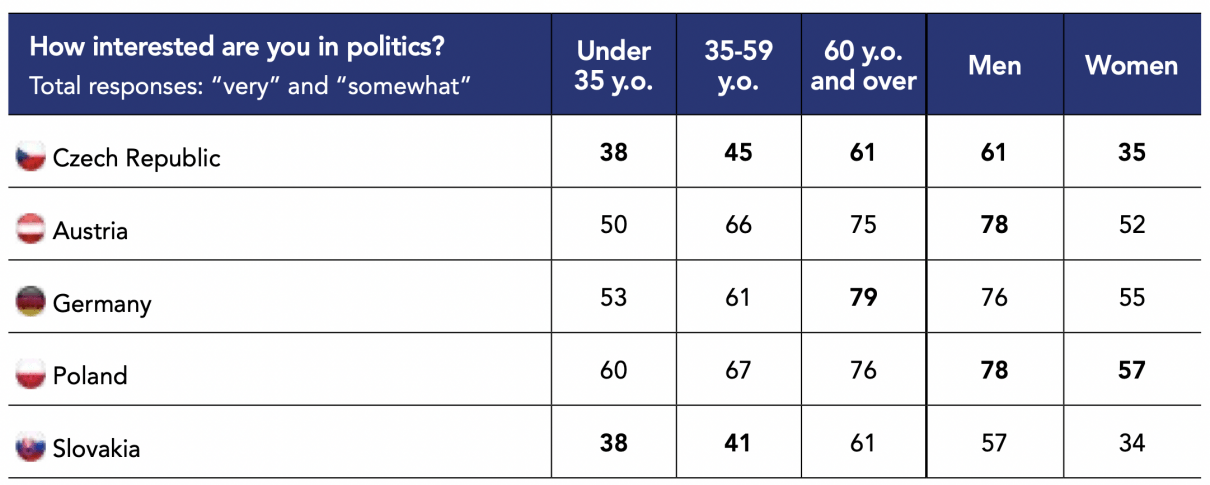
Copyright :
Fondation pour l’innovation politique/International Republican Institute – 2019
According to our survey, democracy in the Czech Republic seems to be met with mistrust or even total distrust: just over one-third (36%) of Czechs trust the government, 30% trust Parliament and only a quarter (25%) trust the media. Political parties inspire trust in only 19% of respondents, though this is not unique to the Czechs as the same figure stands at 23% across all 42 countries surveyed.
In contrast, Czechs put their trust in institutions such as the armed forces (73%) and the police (72%), but do not want them to take over the political sphere (87% of the citizens surveyed felt that being governed by the armed forces would be a bad idea). Furthermore, six out of ten respondents (60%) prefer order over freedom, which corresponds to the average in the European Union (60%). A government led by a strongman who does not have to worry about elections or Parliament is rejected by the majority, but to a lesser extent than the European average (54% versus 66%).
Which of the following statements is the closest to your personal opinion?

Copyright :
© Fondation pour l’innovation politique/International Republican Institute – 2019
The Czechs preferred form of government in this study is a government led by experts (86%). This is nothing new, since the two governments that, in the last quarter-century, were viewed most favorably by the Czech public were “apolitical” expert governments. Moreover, one of the things which appeals to part of the electorate about the current Czech Prime Minister Andrej Babiš is his image as an efficient entrepreneur, difficult to place on the political spectrum, who often denounces Parliament as “all talk”.
However, this study shows a certain attachment to representative democracy among Czechs. Voting is widely seen as “worthwhile because elections can make a difference” (65%) and the electoral system is seen as transparent (78% versus 63% for the European average). Additionally, a majority (76%) believes that decision- making should be in the hands of citizens rather than the government. The far-right Czech party Svoboda a přímá demokracie (SPD, “Freedom and Direct Democracy”) led by Tomio Okamura advocates for referendums – starting with the referendum on membership of the European Union – as a method of government.
The issue of immigration is perceived as needing to be dealt with at the national level (63%). With regards to refugees, it is interesting to note that only 22% of Czechs feel it is their duty to welcome refugees fleeing war and poverty in their country, which is 40 points lower than the European average (62%).
Jacques Rupnik
- 34% think their country’s membership of the European Union is a good thing.
- 52% consider democracy works poorly in their country.
- 86% are worried about Islam.
Focus : In a country that is doing rather well economically, fewer Czechs than the European average believe that their standard of living is deteriorating (18% versus 29%) and express less concern about unemployment (58% versus 74%).
Danemark (DK)
Index of democratic culture
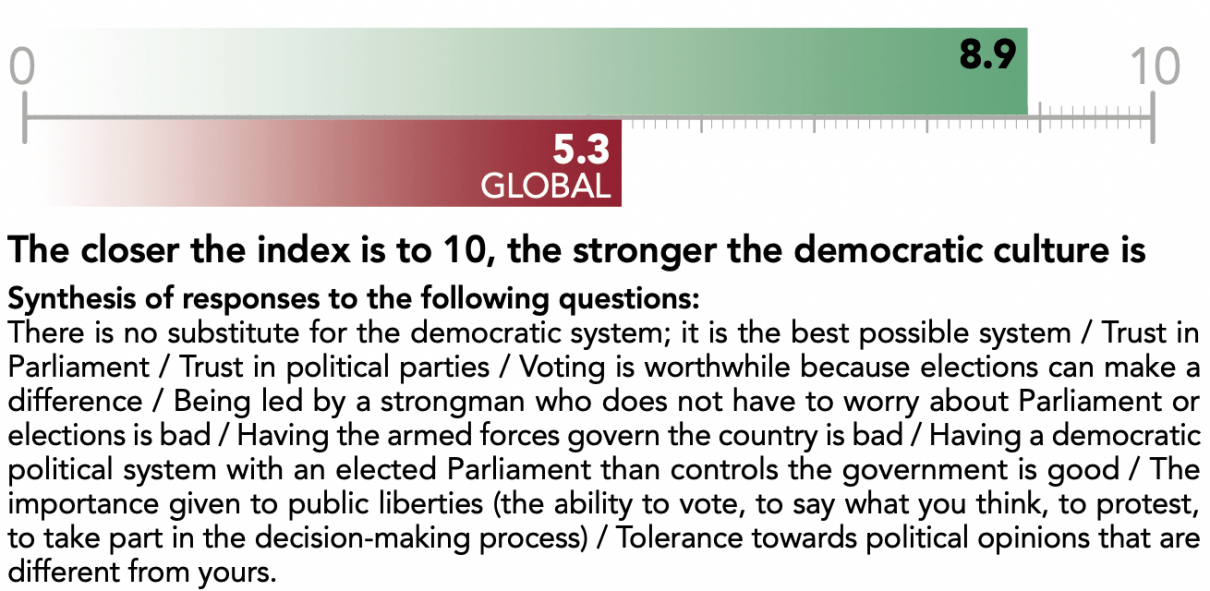
Copyright :
Fondation pour l’innovation politique/International Republican Institute – 2019
Democracy works well in my country
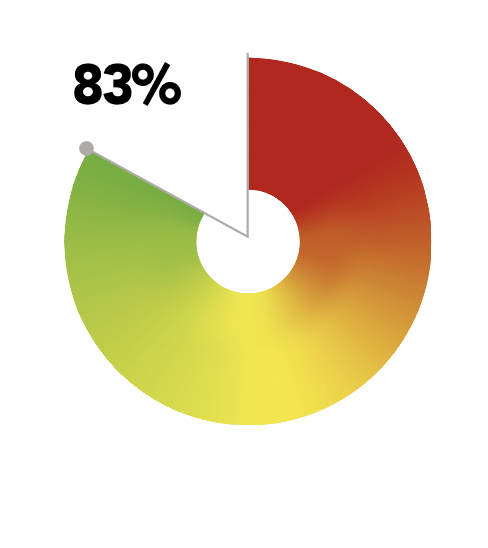

I will show you a list of characteristics people can have, and ask you if they bother you
Total responses: “yes, very” and “yes, somewhat”
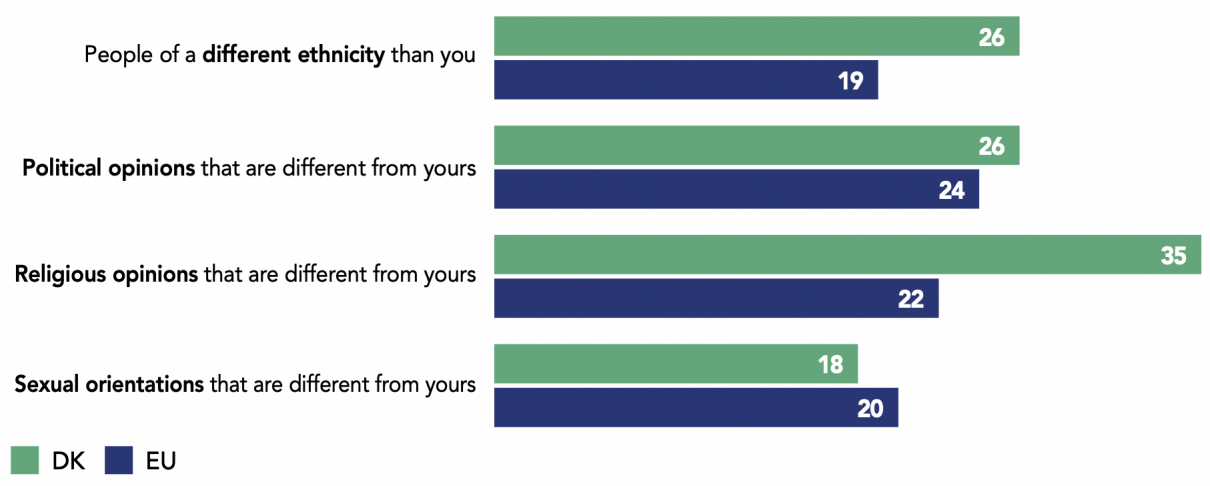
Copyright :
Fondation pour l’innovation politique/International Republican Institute – 2019
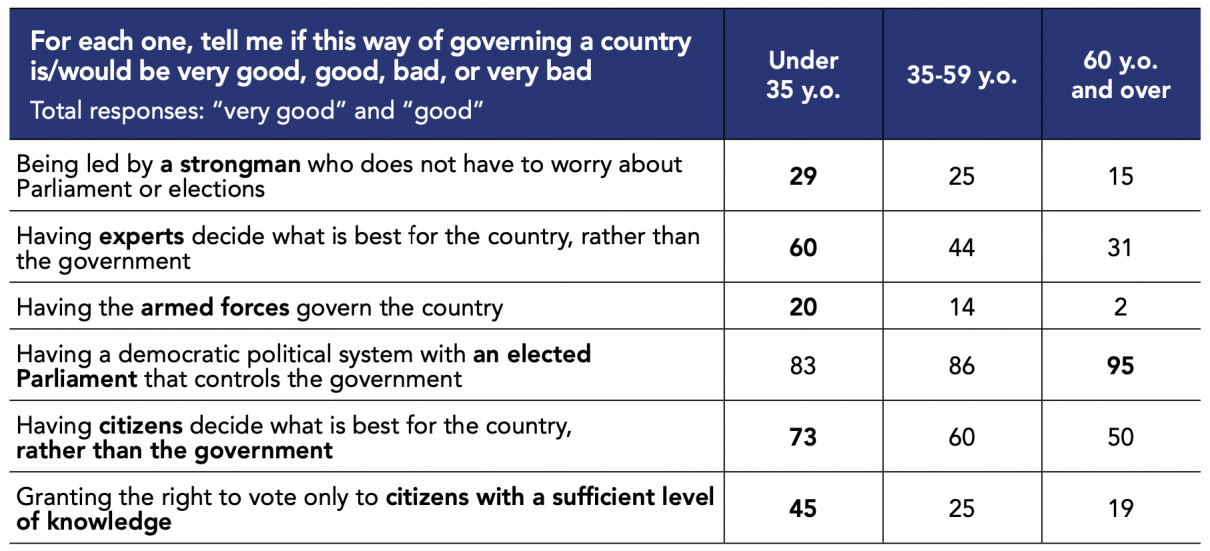
Copyright :
Fondation pour l’innovation politique/International Republican Institute – 2019
here is widespread support for democratic values among the Danish people. An overwhelming majority of citizens believe that their democracy works well (83% compared to 75% in 2017 and 50% across the European Union). An equally large majority state that their electoral process is transparent (86%) and that “voting is worthwhile because elections can make a difference” (86%). Of the 42 democracies in which this study was conducted, Denmark is the country with the second-lowest proportion of citizens who say they do not feel they can express themselves freely (11%), behind Norway (9%). Danes feel well-represented in their society as 27% of them mention “the people” in their choice of the three most powerful categories in the country, compared to 15% across the EU.
Nearly a quarter of the population (23%) believe that it would be a good idea to have “a strongman who does not have to worry about Parliament or elections” as head of state. Although this appears surprisingly high, it is 11 points below the European average (34%).
It is interesting to note that the Danes have more trust in European institutions than the European average. 52% of them express their trust in the European Parliament, versus 45% in the rest of the EU, and 49% in the European Commission versus 43% in the EU. However, over one-third of respondents (38%) believe that the European Union is undermining democracy in their country and 20% of Danes believe that the United Kingdom will be better off without the European Union.
While they feel that the posture of the United States on the international stage is worrying (68%), Danes seem rather attached to the protection that NATO provides them with, since 66% of them view their country’s participation in the military alliance positively (compared to 50% on average in NATO countries, not including the U.S.), and 57% are against the idea of a common European army, versus 41% in the EU.
Would you say that your lifestyle or the way of life in your country is now threatened?

Copyright :
© Fondation pour l’innovation politique/International Republican Institute – 2019
See John F. Helliwell, Richard Layard and Jeffrey D. Sachs (dir.), World Happiness Report 2018, Sustainable Development Solutions Network
After the Parliament adopted immigration-limiting measures in 2016, the far-right Dansk Folkeparti (DF) party and the center-right government agreed to transform an isolated island into a detention center for undocumented immigrants being deported. The DF has been able to exploit the concerns expressed by the Danes regarding immigration (64%) and Islam (61%) as well as the fact that more than half of the population thinks that the country cannot let in more refugees because they do not share the same values (54%). Furthermore, although only 55% of Danes have stated that they are concerned about the prospect of a future economic crisis, 64% state that their country cannot let in more refugees as this would damage the economy.
Maude Paillard-Coyette
- 53% think their country’s membership of the European Union is a good thing.
- 56% distrust small and medium-sized businesses.
- 24% think that their lifestyle or the way of life in their country is now threatened.
Focus : Regularly cited as one of the happiest countries in the world1, the southernmost country in Scandinavia, however, reveals a certain pessimism in this survey, as only 13% of Danes foresee a better future for their country. This figure is surprisingly low compared to Greece (23%) or the Baltic countries (Lithuania 28%, Estonia 34%, Latvia 39%), and below the European average (15%).
Estonia (EE)
Index of democratic culture
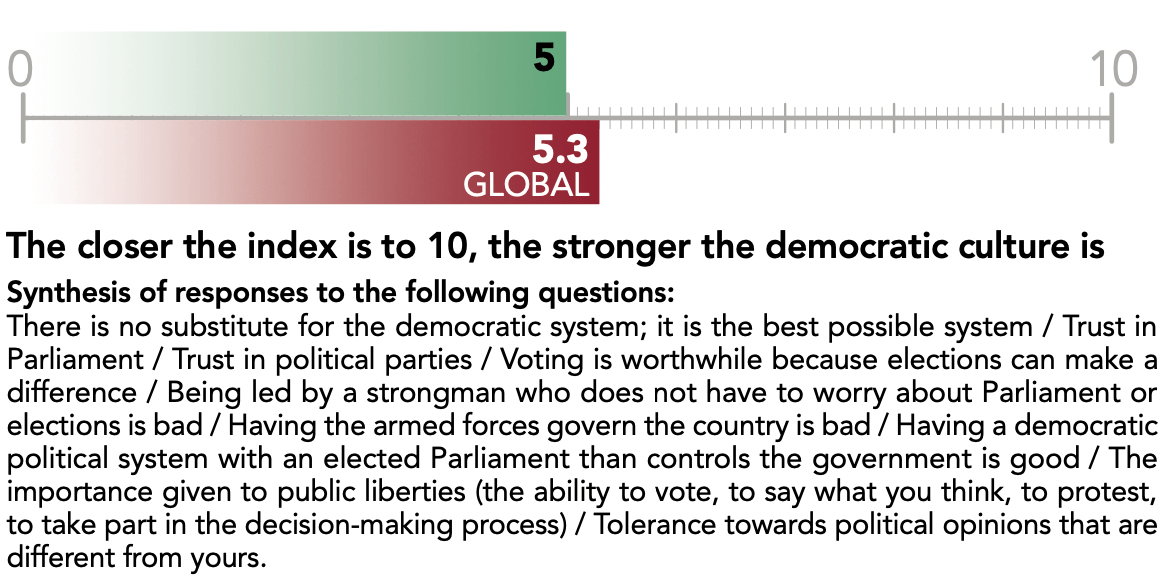
Copyright :
Fondation pour l’innovation politique/International Republican Institute – 2019
Democracy works well in my country
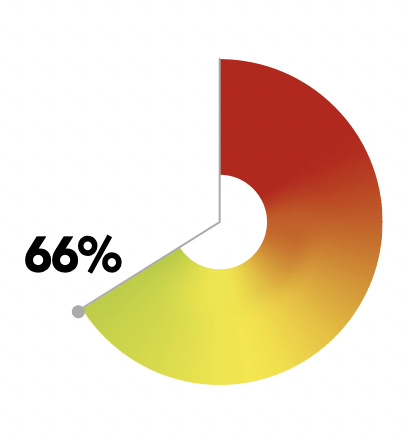

For each one, tell me if this way of governing a country is/would be very good, good, bad, or very bad
Total responses: “very good” and “good”
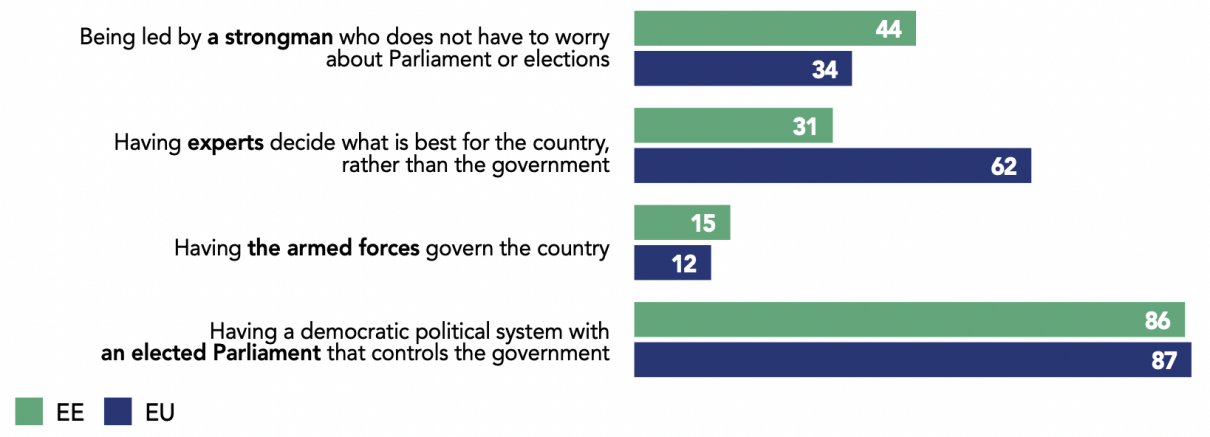
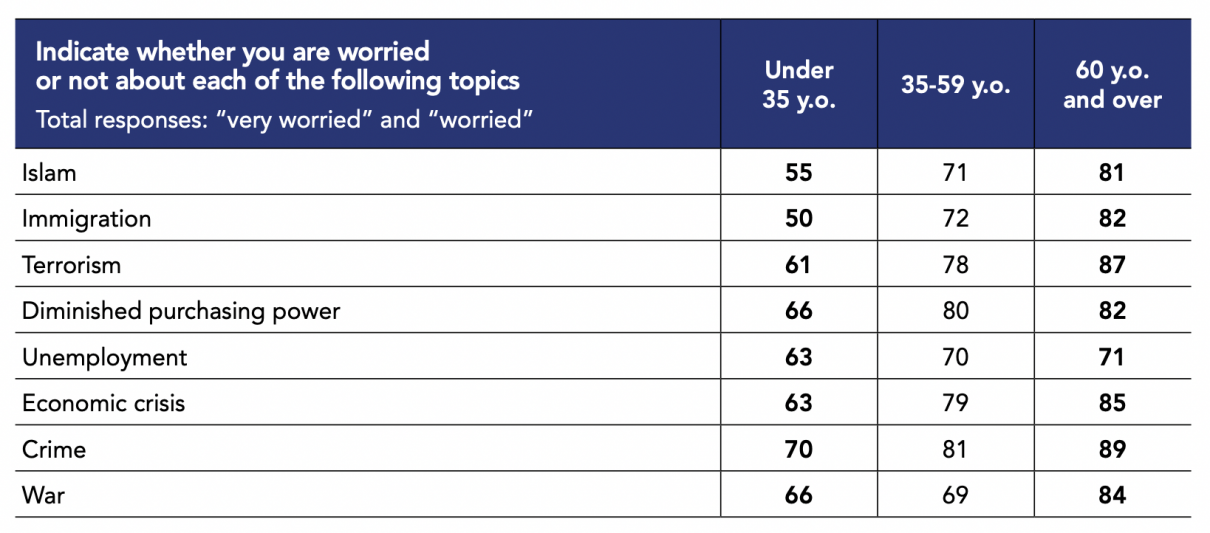
Copyright :
Fondation pour l’innovation politique/International Republican Institute – 2019
Estonians are optimistic about their standard of living. Three-quarters believe that the country’s future will be as good (41%) or better (34%) than it is today. They are in favor of the market economy and believe that role of the government in the economy should be limited and the freedom of enterprises should be strengthened (67%).
The Estonians are, it seems, attached to most democratic ideals. Being able to vote for the candidate of their choice (96%), participate in the decision-making process (95%) and say what they think (97%) are seen as fundamental rights. However, the right to protest, march in the streets and dissent is not considered as important (80%). In addition, a majority of Estonians prefer more order even if it means less freedom (56%).
As far as their own democracy is concerned, almost two-thirds (65%) of the population say that their electoral process is transparent. According to Estonians, worldwide democracy is not under threat as 30% of them believe the number of democracies is expanding and 41% believe it is stable. However, almost half (48%) of the population supports military intervention in other countries in order to defend democratic values.
Indicate if you think Russia’s posture on the international stage is worrying, reassuring or neither

Copyright :
© Fondation pour l’innovation politique/International Republican Institute – 2019
The European Parliament (55%), the national Parliament (53%), and the government (52%) are the institutions least trusted by Estonians, though they are still trusted by a majority of citizens. Half of the population (50%) expresses trust in large companies. Moreover, most Estonians distrust both the media (59%) and political parties (79%).
While equal rights between men and women are supported by the vast majority of the population (93%), more than one-third of Estonians are bothered by people with a different sexual orientation (37%), different political opinions (32%) or different religious opinions than their own (24%), while only 13% are bothered by people of a different ethnicity. The death penalty notably has the support of 62% of the population and abortion is rejected by only 14%.
Regarding immigration, most Estonians support the idea of dealing with the issue at the national level (52%), highlighting the importance of national sovereignty but also the fact that the country is not a destination commonly chosen by immigrants. Letting in refugees is viewed as a problem for the majority of Estonians due to their difference in values (66% vs 53% across the EU), risk of terrorism (73% vs 57% across the EU), risk of crime (75% vs 61%) and negative impact on the country’s economy (74% vs 61%).
Yoko Alender
- 59% think their country’s membership of the European Union is a good thing.
- 76% wish to keep the euro as their currency.
- 60% consider that voting is worthwhile because elections can make a difference.
Focus : For Estonians, neighboring Russia’s posture on the international stage gives rise to serious concerns (80%), but their support for a European army (67%) and NATO (75%) remain strong. Comparing these results to our previous survey from 2017, Estonia is the country where the share of citizens who favor the formation of a common army increased the most (25 additional points).
Finland (FI)
Index of democratic culture
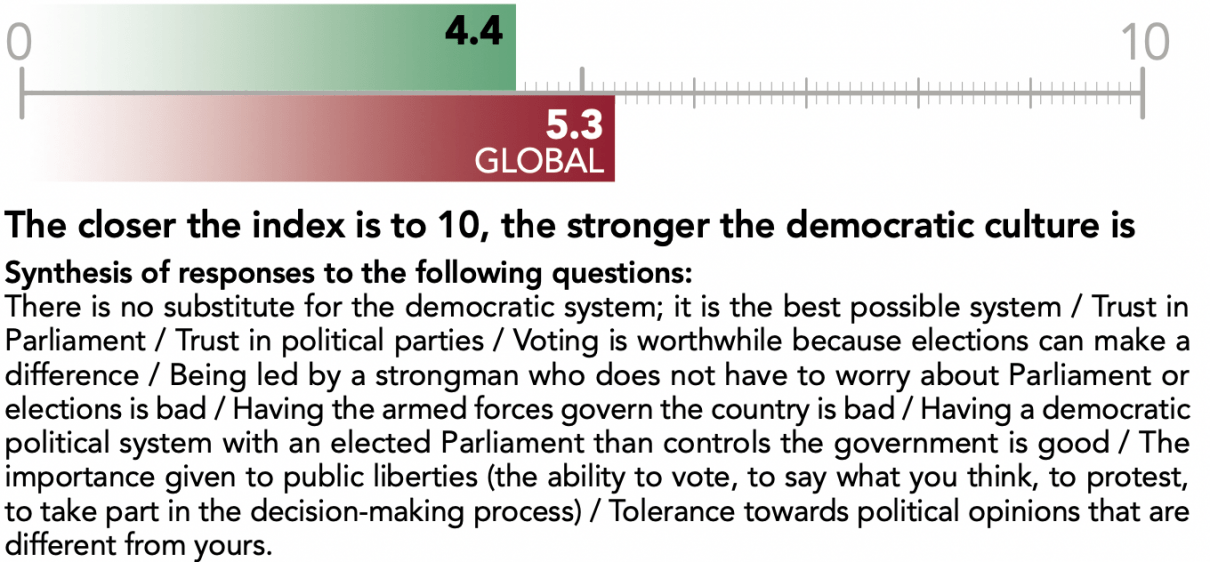
Copyright :
Fondation pour l’innovation politique/International Republican Institute – 2019
Democracy works well in my country
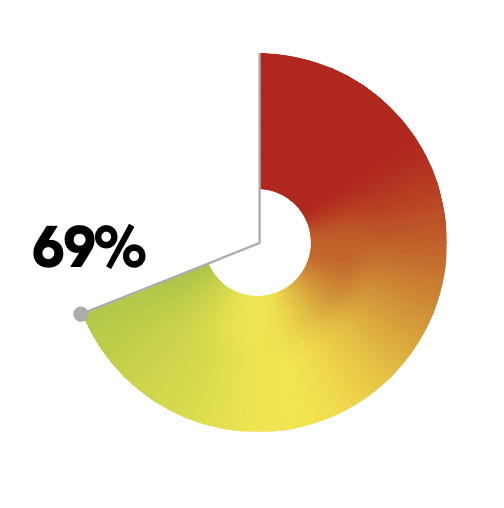

Trust in big tech companies
Total responses: “entirely trust” and “somewhat trust”
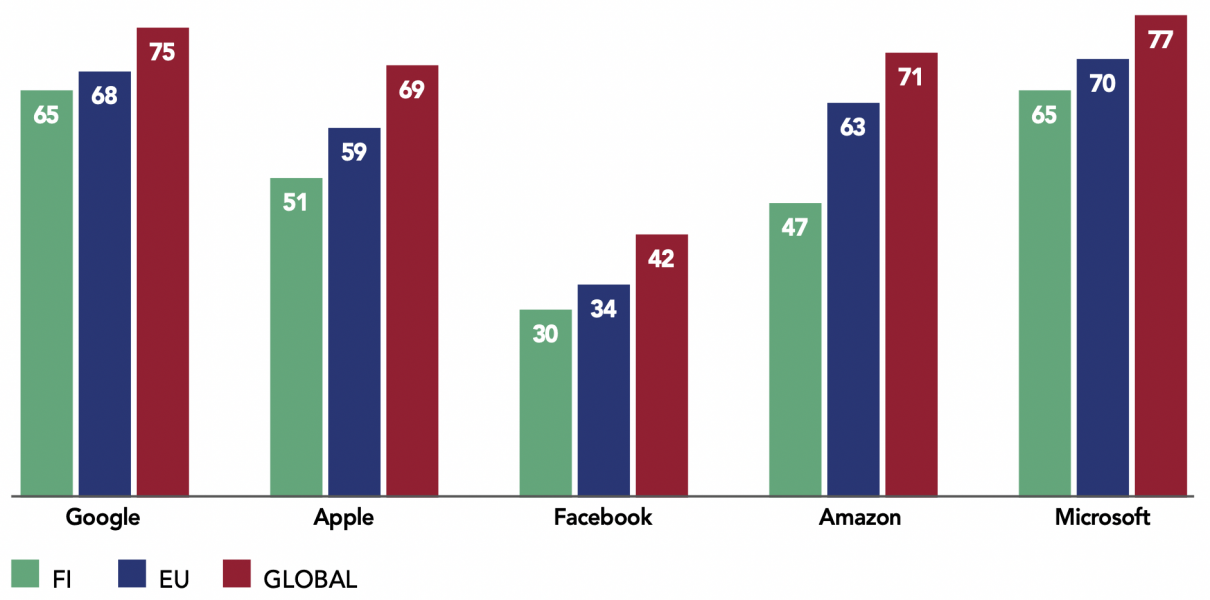
Copyright :
Fondation pour l’innovation politique/International Republican Institute – 2019
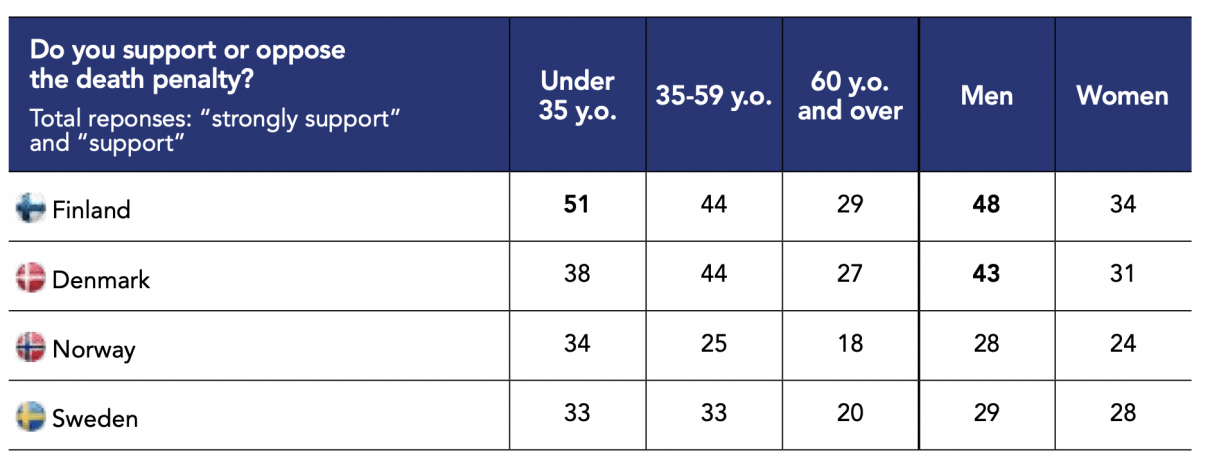
Copyright :
Fondation pour l’innovation politique/International Republican Institute – 2019
Only 37% of Finns surveyed believe that their country will be worse tomorrow than it is today (compared to 50% on average across the European Union). A large majority (69%) also believes that their lifestyle is not threatened (compared to 46% for the European Union). However, the study reveals that more than three- quarters of Finns are concerned about unemployment (76%), social inequalities (78%) and the funding of social programs (80%).
There is a similar ambiguity when it comes to democracy. While 69% of Finns believe that their democracy works well, 42% of respondents would consider it a good thing to be led by a “strongman who does not have to worry about Parliament or elections”. By way of comparison, this figure is only 12% in Sweden and 23% in Denmark. The Finns surveyed also prefer more order even if it means less freedom (59%), but most (71%) consider it important to be able to protest, march in the streets and dissent, which is 11 points lower than the global average (82%). Furthermore, there is broad support for a technocracy (70%), in other words having experts decide what is best for the country rather than the government, although they believe that “there is no substitute for the democratic system, it is the best possible system” (71%). Finland once again stands out from other Scandinavian democracies where public opinion is overwhelmingly opposed to this idea (Denmark, 56%; Norway, 61%; Sweden, 63%).
Trust in institutions
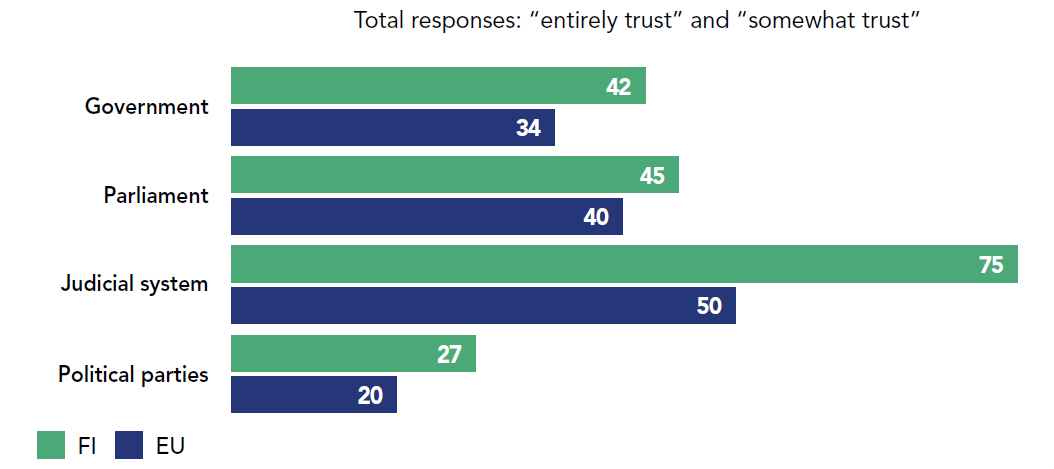
Copyright :
© Fondation pour l’innovation politique/International Republican Institute – 2019
Dominique Reynié (ed.), What next for democracy? An international survey by the Fondation pour l’innovation politique, Paris, 2017, 320 pages.
The Finns are known for being open-minded and pro-European. But here again, the figures show contradictory trends: 38% of Finns believe that being a member of the European Union weakens democracy and 60% that the migration problem should be resolved at the national level. A narrow majority also rejects the idea of a European army (51%). On the subject of refugees, while 60% of the Finns surveyed acknowledge that their country has a duty to welcome them, more than half believe that this is no longer possible because it poses problems of cohabitation due to differences in values (51%), brings an increased risk of terrorism in the country (62%) and impacts the economy (66%). Similarly, while they are not bothered by people with different religious views (69%) or ethnic origins (78%), 45% say they have a negative reaction when they learn that someone is Muslim. This opinion is higher than the European average (31%) and the results in the other Scandinavian countries (Denmark, 34%; Norway, 33%; Sweden, 30%).
Julia Laureau
- 52% think their country’s membership of the European Union is a good thing.
- 66% wish to keep the euro as their currency.
- 59% are worried about immigration.
Focus : Trust in democracy has weakened in Finland since 2017. In 2017, 78% of the Finns surveyed considered democracy to be the best system, compared to 71% in 2018. In one year, their satisfaction with democracy fell by 5 points (69% versus 74%). Public opinion has also become more wary of political parties (73% vs 66%) and mistrust of Parliament has become a majority position (55% vs 33%)1.
France (FR)
Index of democratic culture
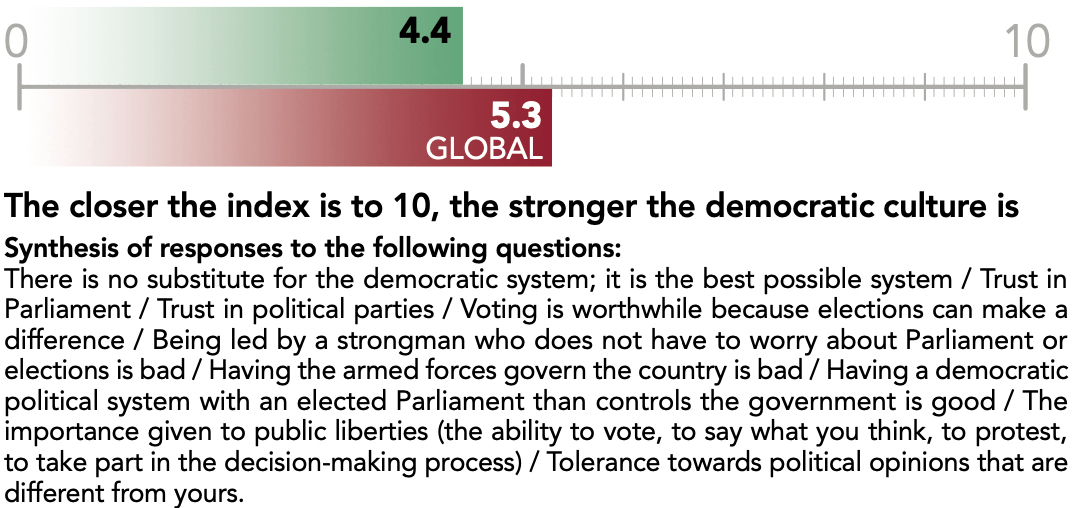
Copyright :
Fondation pour l’innovation politique/International Republican Institute – 2019
Democracy works well in my country
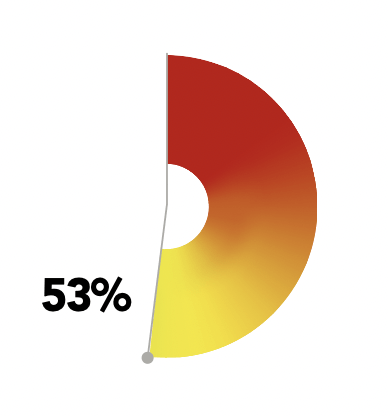

Indicate if you think the United States’ posture on the international stage is worrying, reassuring or neither
Response: “worrying”
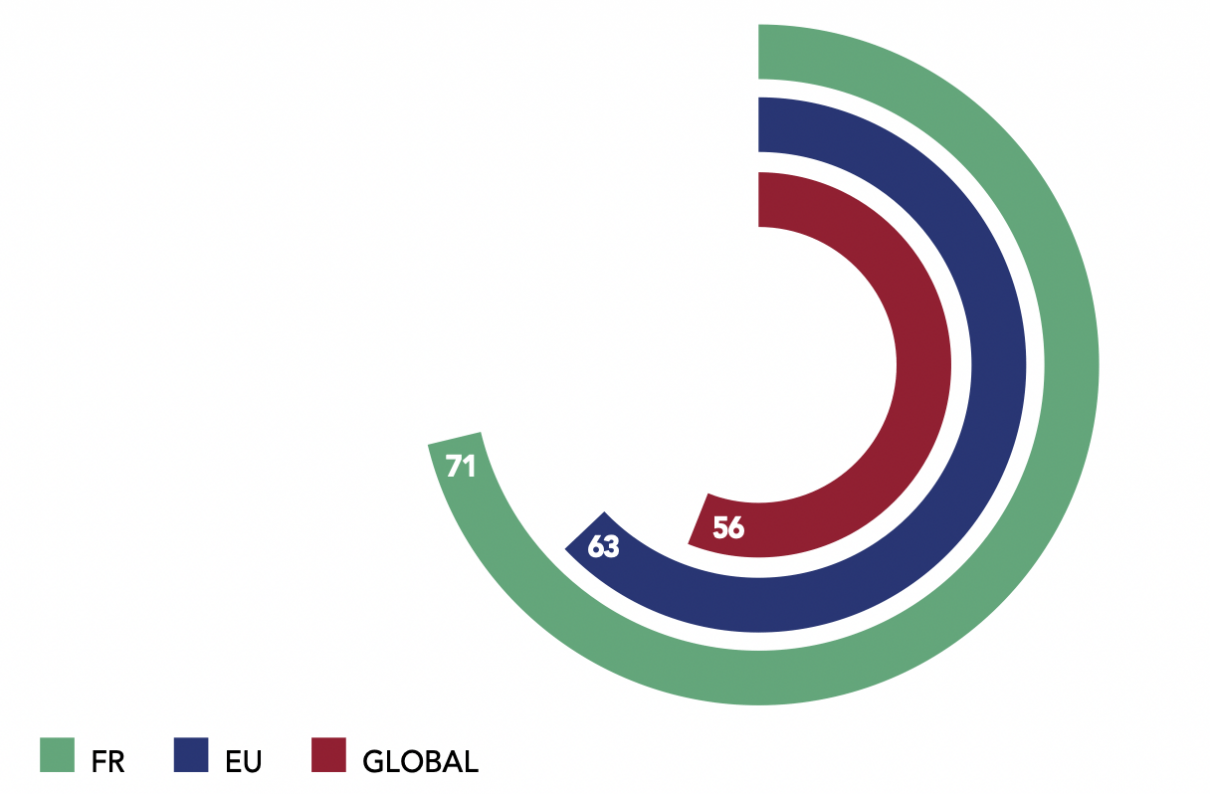
Copyright :
Fondation pour l’innovation politique/International Republican Institute – 2019

Copyright :
Fondation pour l’innovation politique/International Republican Institute – 2019
When asked whether “voting is worthwhile because elections can make a difference”, 62% of the French respond affirmatively. This opinion is shared by 66% of respondents across the European Union and 70% across all the 42 democracies studied. This rallying around the electoral process does not indicate an end to France’s clear protest culture, which is reflected in a belief in the importance of extra-electoral means of making themselves heard and in the strength of protest parties (France Insoumise, Rassemblement National). The weight of the alternative political parties in the first round of the 2017 presidential election (receiving 48% of the votes cast) proves this point.
This space for forces of protest is a symptom of discontent with democracy. Nearly one in two French citizens (47%) feel that democracy does not work well in their country. This dissatisfaction is a majority opinion among unskilled workers (57%), small business-owners (60%) and those who see globalization as a threat (61%). Social crises and concerns about globalization are fueling democratic uncertainty.
Democracy is perceived as having failed to seize power from “moneyed interests”. This debate is much more significant in France than in many of its European neighbors. This feeling of power being in the hands of the economically powerful is even more widespread when one asks about the power of “financial markets”.
Which of the following categories holds the most power in your country?
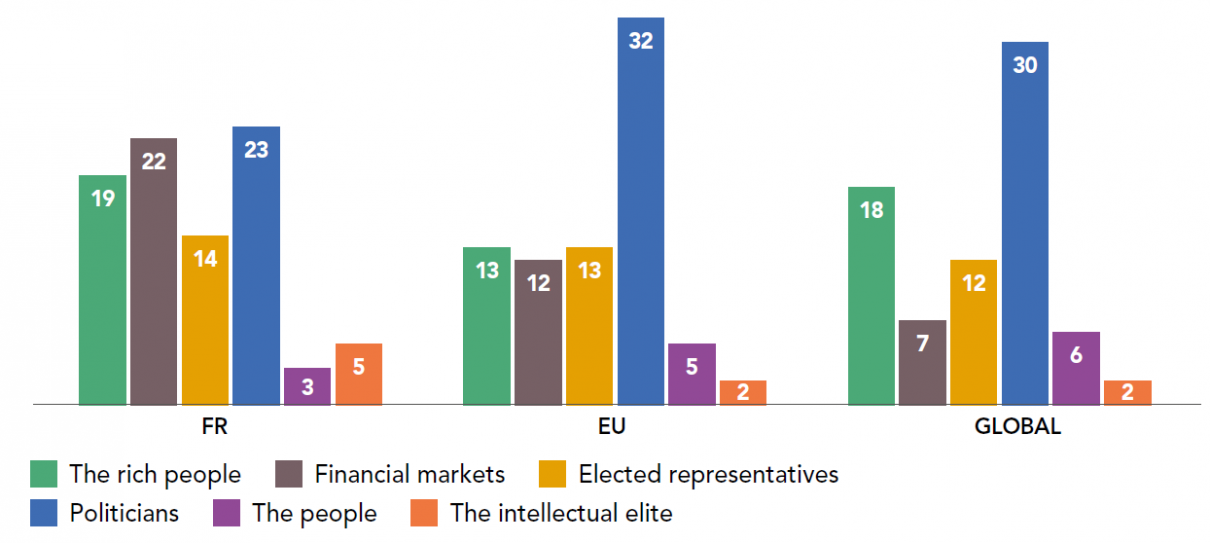
Copyright :
© Fondation pour l’innovation politique/International Republican Institute – 2019
Democracy is much more fragile than one would like to believe, even in a democracy as old as France. In France, 39% of citizens believe that “other political systems might be just as good as the democratic system”. This opinion is shared by 32% of interviewees across the European Union and 33% across all 42 democracies studied. The disappointment observed in France’s democracy feeds both demands for the renewal of participatory democracy and direct democracy as well as the return of this grim passion for “voluntary servitude”.
Pascal Perrineau
- 42% think their country’s membership of the European Union is a good thing.
- 66% wish to keep the euro as their currency.
- 31% consider that a political system led by a strongman who does not have to worry about Parliament or elections would be a good thing.
Focus : France is one of the surveyed countries where the ability to protest, march in the streets and dissent is the most valued: 87% of French people consider it important, across all social groups and generations. This rate is 79% in the United States, 80% in Great Britain and 82% across all 42 democracies studied. The consistently high public support for the Yellow Vest protests that have lasted several months is entirely symptomatic of a France that believes in the value of a “protest democracy” to fill the gaps in classic representative democracy.
Germany (DE)
Index of democratic culture
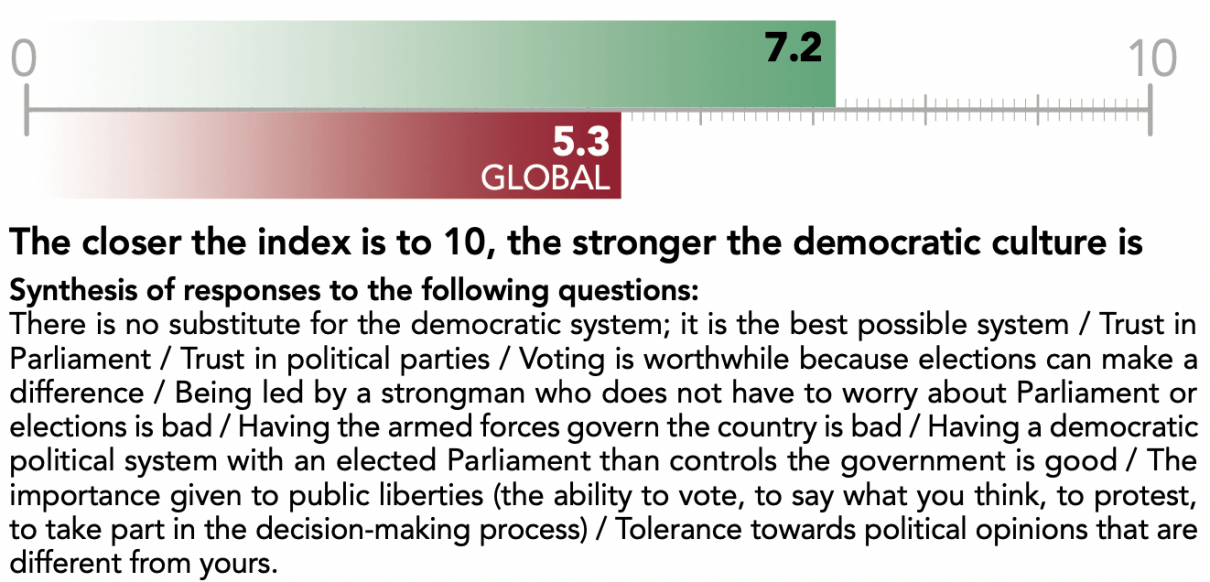
Copyright :
Fondation pour l’innovation politique/International Republican Institute – 2019
Democracy works well in my country
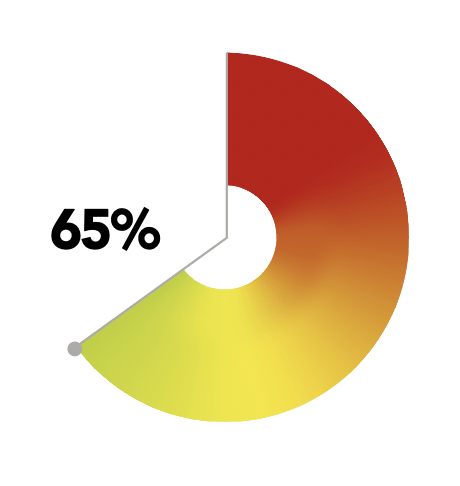

Would you say that your lifestyle or the way of life in your country is now threatened?
Total responses: “very threatened” and “threatened”
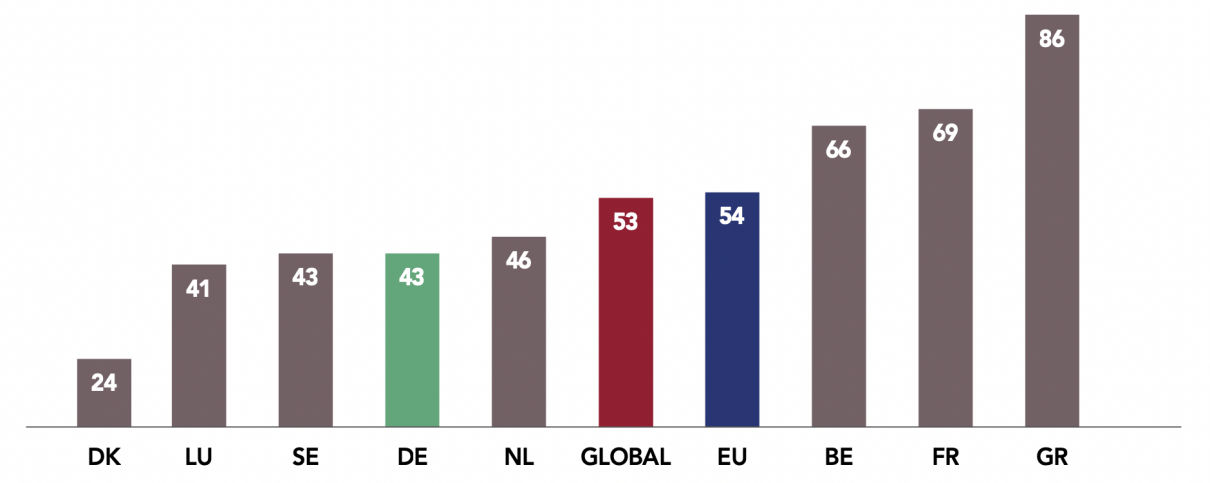
Copyright :
Fondation pour l’innovation politique/International Republican Institute – 2019

Copyright :
Fondation pour l’innovation politique/International Republican Institute – 2019
Our survey depicts a German society in which respondents are quite satisfied with their democratic system. Two-thirds (65%) of the Germans surveyed believe that democracy is working well in their country (compared to 50% on average in the European Union) and three-quarters (76%) believe that their electoral system is transparent (compared to 63% across the European Union). However, it should be noted that the level of trust in institutions, though systematically higher than the European average, is lower than the results of our previous survey from 2017.
Trust in institutions
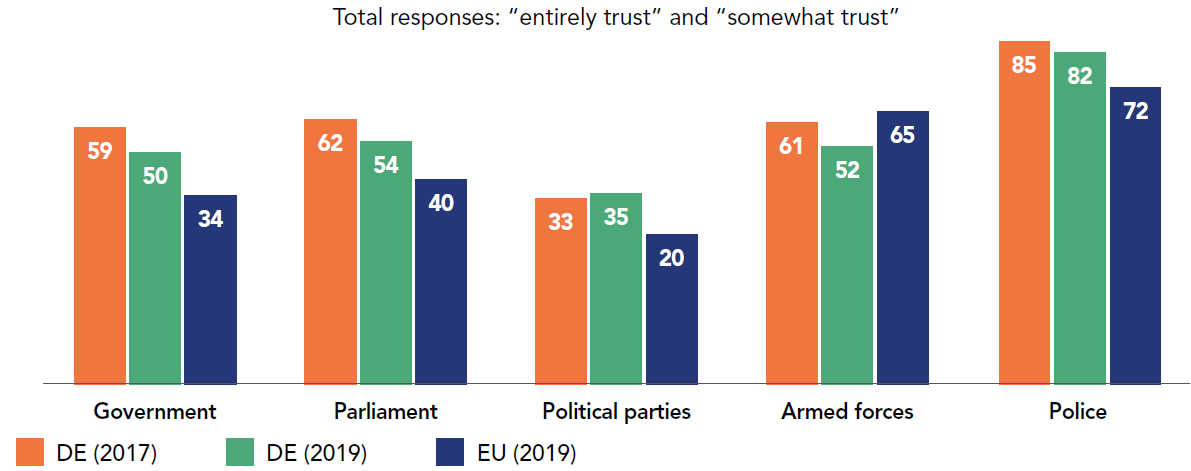
Copyright :
© Fondation pour l’innovation politique/International Republican Institute – 2019
The results also reveal a demand for order and authority, in line with the European trend: 61% of Germans interviewed say they prefer “more order even if it means less freedom” (compared to 60% on average in the European Union) and, above all, 38% think it would be good to be governed by “a strongman who does not have to worry about Parliament or elections” (compared to 34% for the European Union).
When it comes to immigration, Germans express less concern (60%) for the topic than the European average (69%). More than two-thirds (71%) consider it a duty to welcome refugees, compared to 62% across the European Union. However, like other Europeans, Germans believe that their country cannot let in more refugees: 58% fear an increase in crime (compared to 61% for the European Union), 57% fear an increase in the risk of terrorism (average level in the European Union is 57%), and a majority (52%) worry about problems in terms of cohabitating with refugees who do not share their values (compared to 53% for the European Union). However, a minority of respondents (44%) believe that letting in refugees would affect the country’s economic situation (compared to 61% for the European Union).
Although only a slight majority (52%) view Germany’s membership of the European Union positively, the survey shows the importance that German public opinion attaches to it. A majority believe that the United Kingdom will be worse off outside the European Union (66% compared to 49% across the EU), wish to keep the euro as its currency (62%) and believe that the issue of migration should be dealt with at the European rather than at the national level (67%). However, only one-third of the population (35%) believes that their country’s membership of the European Union strengthens their democracy.
Patrick Moreau
- 52% think their country’s membership of the European Union is a good thing.
- 62% wish to keep the euro as their currency.
- 71% are worried about war.
Focus : While the issue of creating a European army divides German opinion equally (50% in favor and 50% against), support for NATO is in freefall. In fact, Germany’s membership of the military alliance is considered positive by only 40% of the Germans surveyed, a decline of 18 points (from 58%) compared to our 2017 survey. At least part of the picture is the result of the tensions between Berlin and Washington: 75% of Germans surveyed claim that the posture of the United States on the international stage is “worrying”.
Greece (GR)
Index of democratic culture
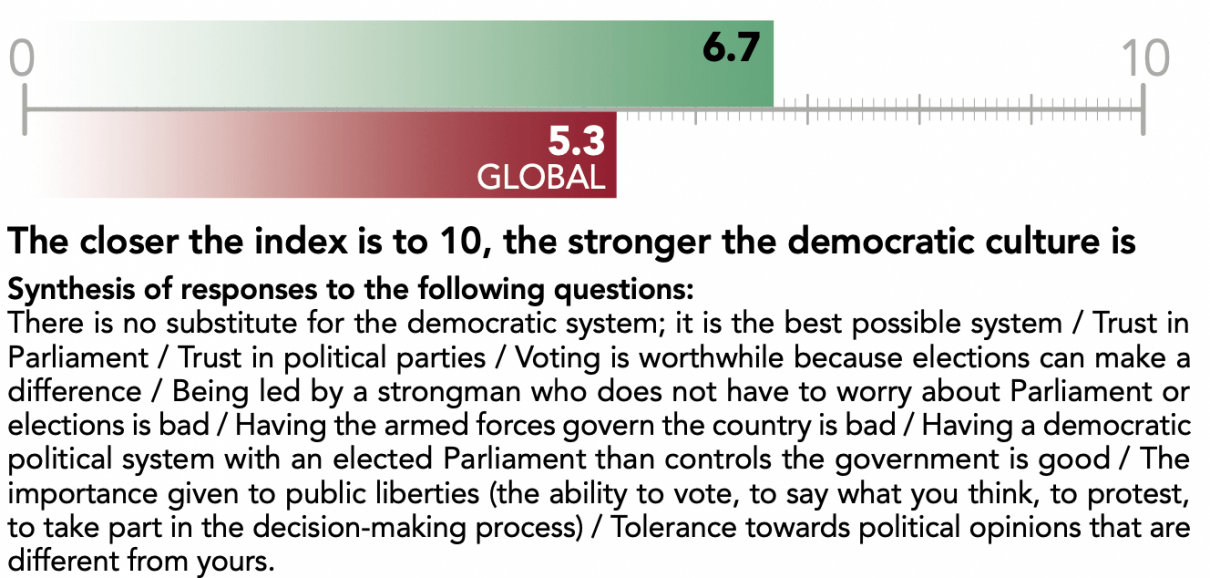
Copyright :
Fondation pour l’innovation politique/International Republican Institute – 2019
Democracy works well in my country
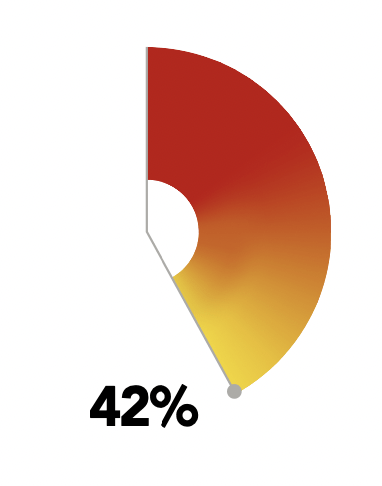

It is our duty to welcome refugees fleeing war and poverty into our country
Total responses: “strongly agree” and “agree”
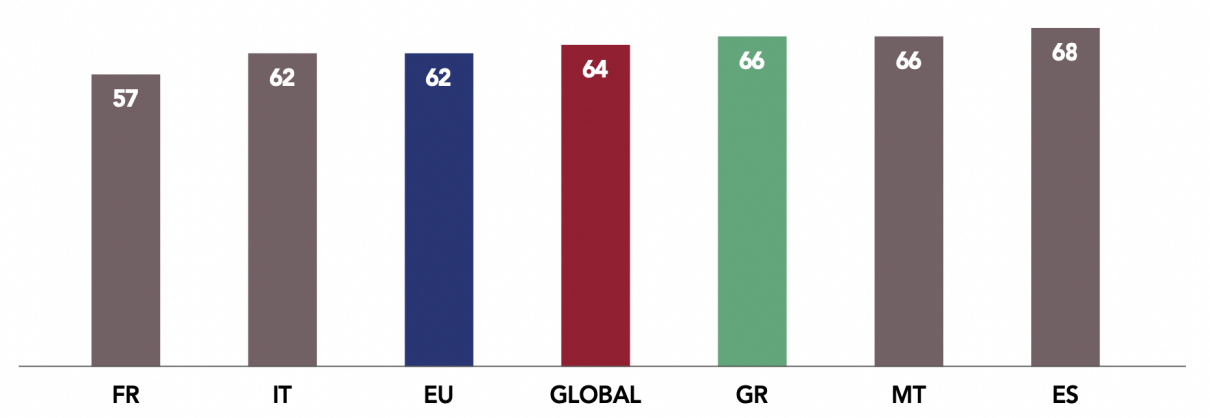
Copyright :
Fondation pour l’innovation politique/International Republican Institute – 2019
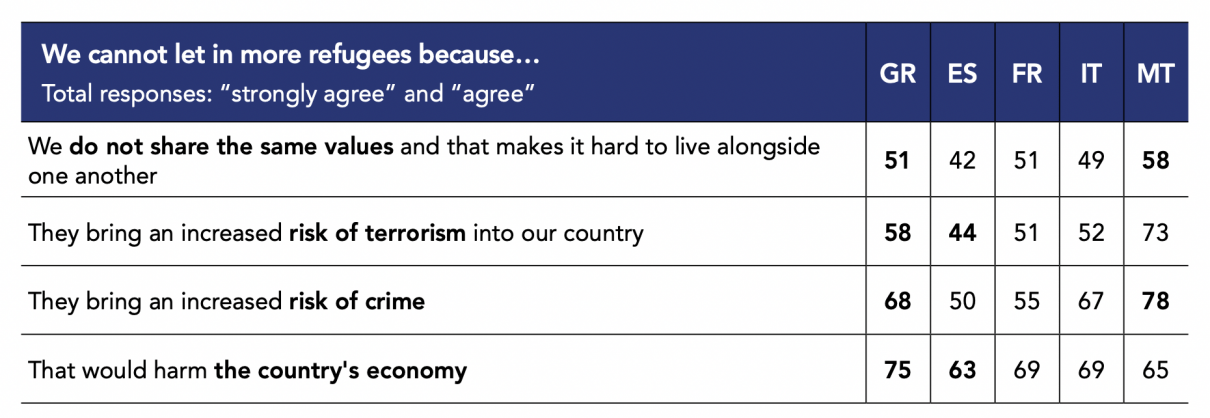
Copyright :
Fondation pour l’innovation politique/International Republican Institute – 2019
After many years of deep recession, Greece seems to be recovering, albeit very slowly. Since August 20th 2018, eight years after its first request for assistance, the country is finally free from the supervision of European institutions and the International Monetary Fund (IMF). However, the majority of Greeks continue to see globalization as a threat (59%), contrary to European opinion which sees globalization as an opportunity (59%), an opinion shared even more widely at the global level (66%).
The Greeks, the only citizens of the European Union to have seen their minimum wage fall since 2008, are also very concerned about their standard of living: a majority (59%) feel that it has deteriorated in recent years, the highest level among the 27 Member States. Nevertheless, if we compare this result with that of the 2017 survey, it should be noted that it has fallen by 17 points, in favor of the responses “it has remained the same” (29%, up 14 points compared to 2017) and “it has improved” (12%, up 3 points compared to 2017).
Although the unemployment rate has fallen below 20% of the working population for the first time since 2011 and growth has returned (up 2% in 2018), almost all Greeks (96%) express concern about unemployment, the economic crisis (96%), the funding of social programs (95%), diminished purchasing power (93%) and social inequalities (91%). Greeks are aware of their level of public debt (close to 176% of GDP in 2017) and most of them (91%) say they fear the consequences.
Which of the following statements is the closest to your personal opinion?

Copyright :
© Fondation pour l’innovation politique/International Republican Institute – 2019
Greeks’ concern over the future of their intangible heritage (or lifestyle1) is equally spectacular: most (86%) believe their lifestyle is threatened, which is 32 points above the European average (54%). However, we note a 9-point decline in this Greek concern compared to our 2017 survey (95%). As in many countries, various fears are expressed: crime (93%), terrorist risks (85%) and war (82%). However, Greek citizens rank highest in terms of their concerns over the issue of immigration (88%, the highest proportion in the democratic world surveyed). Nevertheless, a quarter of Greeks (23%) believe that the country will do better tomorrow than it is doing today, 8 points higher than the European average. This score also represents the most significant improvement (up 11 points) seen in any of the European Union countries compared to the 2017 survey.
Victor Delage
- 44% think their country’s membership of the European Union is a good thing.
- 50% wish to keep the euro as their currency.
- 63% consider that the role of the government in the economy should be limited and the freedom of enterprises should be strengthened.
Focus : Standing as they do at the crossroads of many European geostrategic challenges, more than two-thirds of Greeks (68%) support the creation of a European army, 9 points higher than the European average (59%). This is in contrast with their reluctance regarding their membership of NATO: only 45% think it is a good thing.
Hungary (HU)
Index of democratic culture
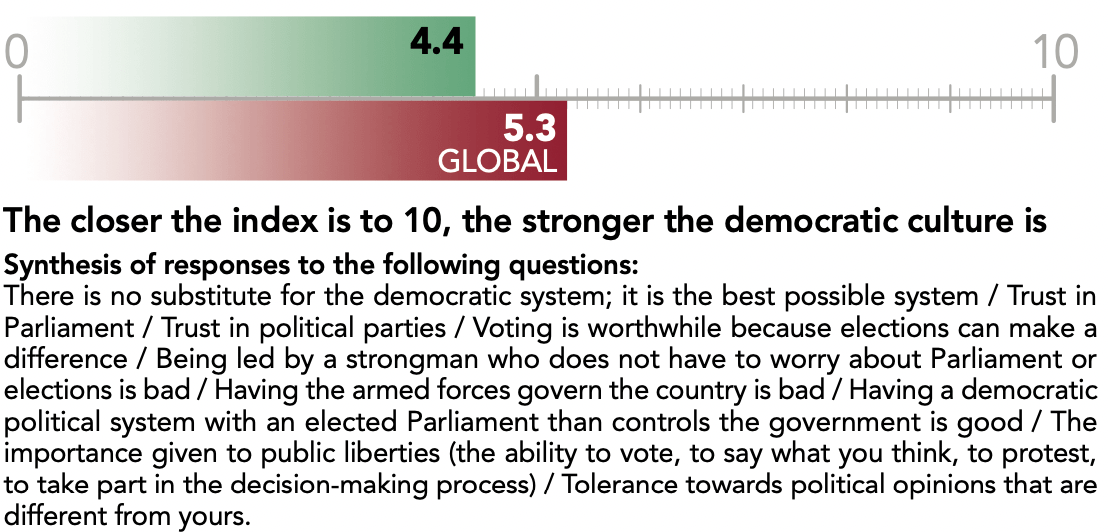
Copyright :
Fondation pour l’innovation politique/International Republican Institute – 2019
Democracy works well in my country
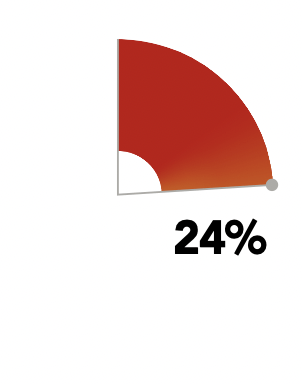

Generally speaking, in today’s society do you feel that you are free to express yourself?

Copyright :
Fondation pour l’innovation politique/International Republican Institute – 2019
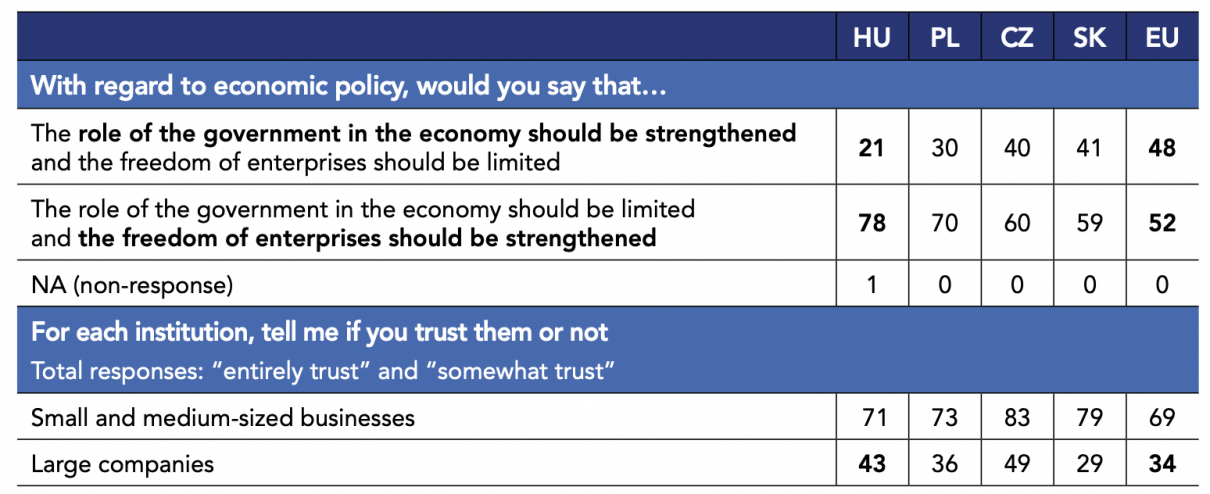
Copyright :
Fondation pour l’innovation politique/International Republican Institute – 2019
“We needed to state that a democracy is not necessarily liberal. Just because something is not liberal, it still can be a democracy” (“Full text from Viktor Orbán’s speech at Băile Tuşnad (Tusnádfürdő) on July 26th 2014”, budapestbeacon.com, July 29th 2014,
Since Fidesz, the party of Viktor Orbán, came to power in 2010, Hungary has been presented in the Western European media as at the forefront of “illiberal democracy”. The Hungarian Prime Minister himself proclaimed this concept in a speech in July 2014: “We must state that democracy is not necessarily liberal. Just because something is not liberal does not mean it is undemocratic”1.
The survey does not reflect “popular” support for an authoritarian regime: while three-quarters (75%) of Hungarians believe that democracy works poorly in their country, only one-third (34%) would like to be led by a “strongman who does not have to worry about elections or Parliament”, and only 8% are in favor of being governed by the armed forces. Furthermore, Hungarians are less likely to “prefer more order even if it means less freedom” (45%) than the average for EU citizens (60%). In addition, Hungarians also see voting as “worthwhile because elections can make a difference” (62%) and, more generally, support public freedoms (including freedom of expression, which is considered important for 99% of the population). However, a large majority (85%) would support a government by experts.
As elsewhere in Central Europe, this attachment to the values of democracy is not incompatible with a lack of trust in its institutions. The more pronounced mistrust of the media is very likely linked to the influence of political powers in this area.
Trust in institutions
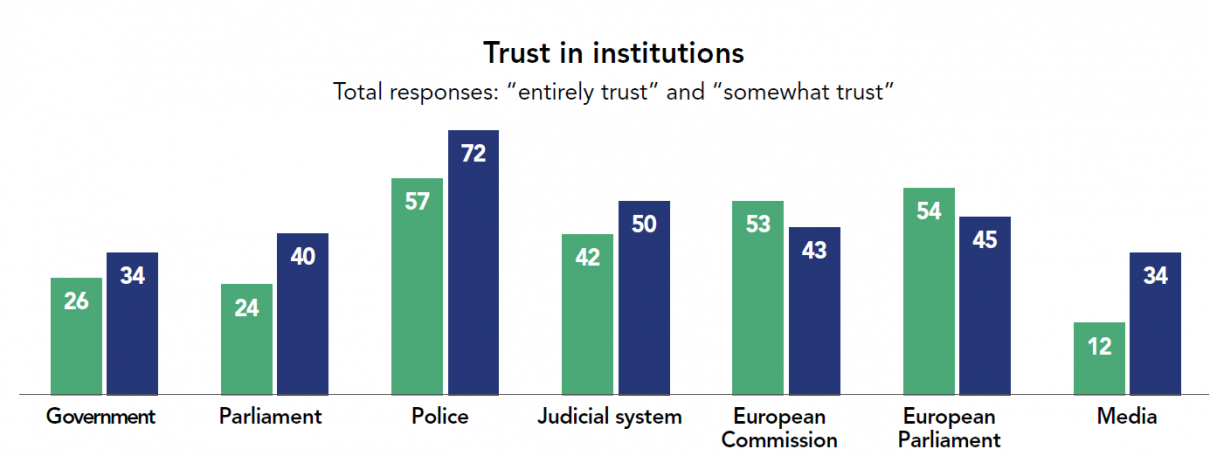
Copyright :
© Fondation pour l’innovation politique/International Republican Institute – 2019
The study may provide an explanation for the Orbán regime’s success, particularly with regard to the impact of its discourse around the protection of a national identity threatened by the wave of migration. Indeed, only 48% of Hungarians consider it their duty to welcome refugees fleeing war and poverty in their country (compared to 62% on average across the European Union) and more than two-thirds of the population express concern about immigration (66%) and Islam (68%). It was on this exact theme that the government’s campaign was conducted both during the 2016 referendum (for which the required 50% voter turnout was not achieved) and during the electoral campaign that led Fidesz to victory in April 2018.
Jacques Rupnik
- 57% think their country’s membership of the European Union is a good thing.
- 62% think that their lifestyle or the way of life in their country is now threatened. 62
- 62% consider the electoral process nontransparent.
Focus :Viktor Orbán decided to oppose the European Union and its policy of relocating migrants using a quota system. Yet 64% of Hungarians would be in favor of a European (rather than national) solution to the issue of immigration and 42% believe that the European Union helps strengthen democracy in their country. This attachment to Europe, including on the issue of democracy, suggests that a large proportion of Hungarians view the European Union, so highly criticized in the nation’s official discourse, as a useful safeguard against “illiberal” abuses of power.
Ireland (IE)
Index of democratic culture
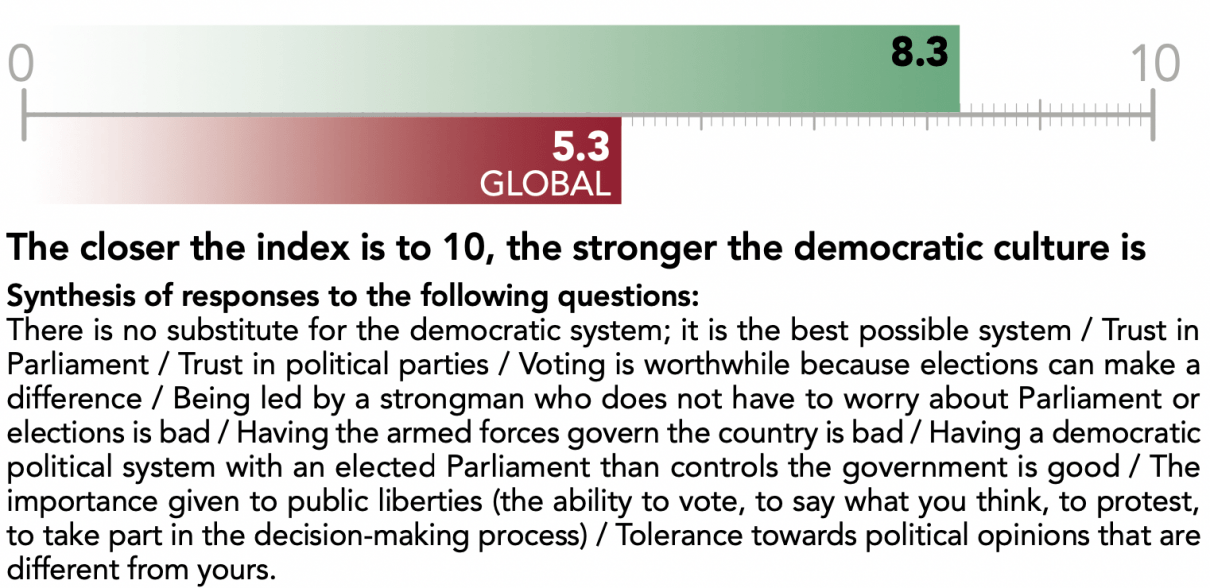
Copyright :
Fondation pour l’innovation politique/International Republican Institute – 2019
Democracy works well in my country
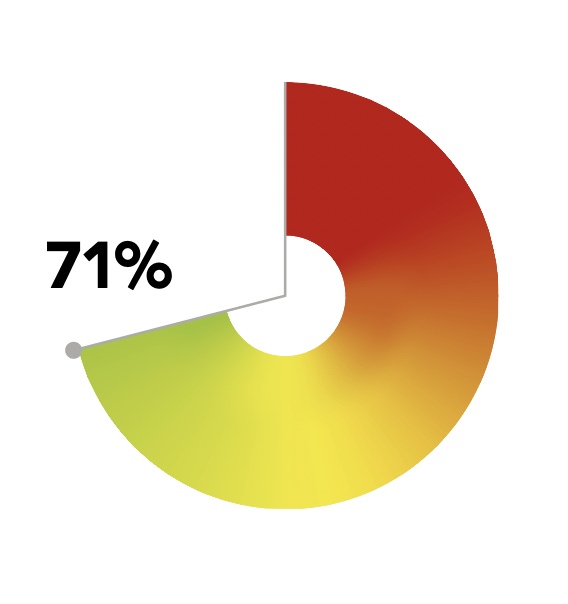

Our country’s European Union membership is a good thing
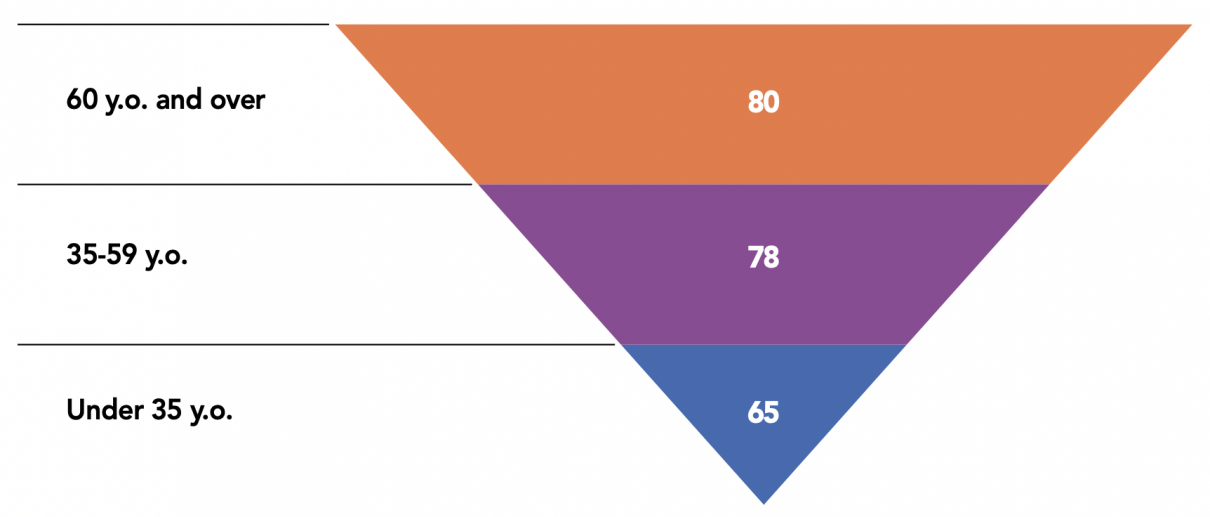
Copyright :
Fondation pour l’innovation politique/International Republican Institute – 2019
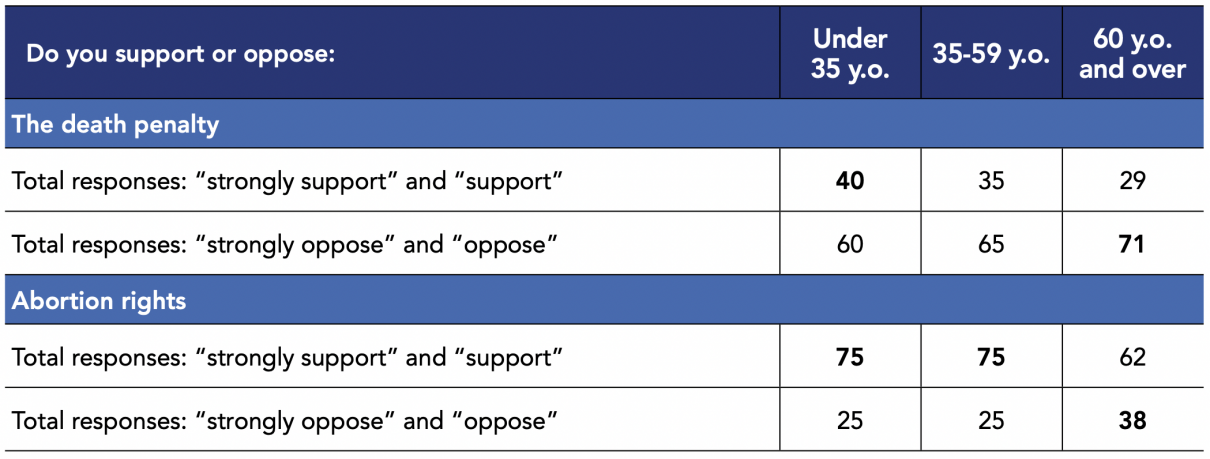
Copyright :
Fondation pour l’innovation politique/International Republican Institute – 2019
The Irish are quite optimistic about the future of their democracy, with almost three-quarters of the population claiming that democracy works well in their country (71%). Overall, they believe they can express themselves freely (82%), that the electoral process is transparent (81%), that “voting is worthwhile because elections can make a difference” (78%), and that their lifestyle is not threatened (62%), unlike the near-majority of European Union citizens who believe the contrary (46%).
Regarding immigration, the Irish feel very much inclined to let refugees in because “it is their duty to welcome those fleeing war and poverty” (69%). Of all the countries surveyed, Ireland is the least concerned about this issue (42%), on an equal footing with New Zealand. The Irish are one of the only populations from this survey wherein a majority indicated that they are not worried about Islam (53%), apart from countries with large indigenous Muslim populations such as Albania (73%) and Bosnia and Herzegovina (67%).
Overall, respondents are not bothered by people with different political (73%) or religious opinions (78%), sexual orientations (85%) or ethnic origins (87%) than their own. In May 2018, in a landmark referendum, two-thirds (66.4%) of Irish voters voted to repeal the eighth amendment of the Constitution and thus to legalize abortion. This was a major turning point that put an end to an issue which has dominated their domestic politics and the relationship between Ireland and the Catholic Church for centuries1. Though the percentage of the Irish in favor of the right to accessible abortions is 9 points lower than the European Union average (72% versus 81%), the figure remains high.
Trust in big tech companies
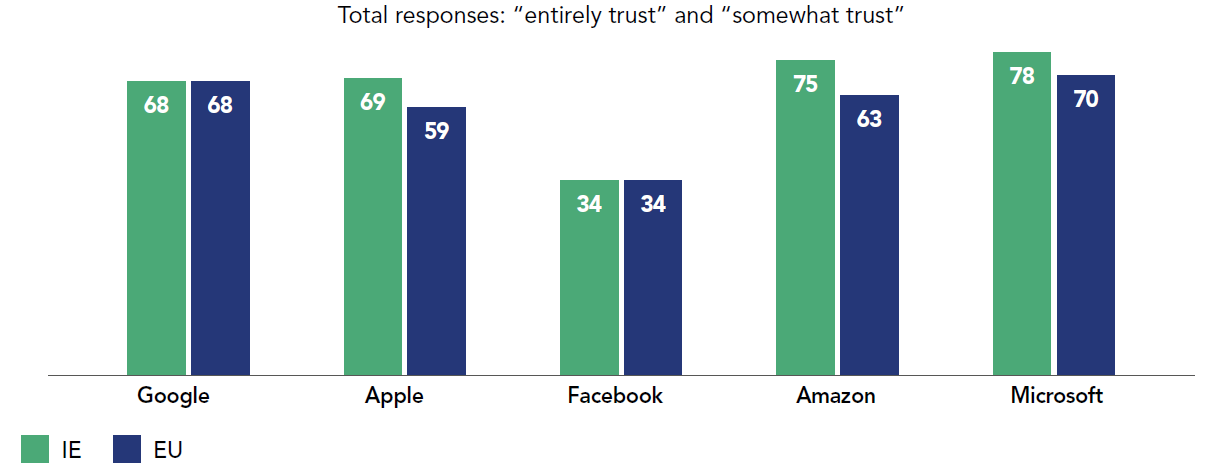
Copyright :
© Fondation pour l’innovation politique/International Republican Institute – 2019
As Ireland is seen as a tax haven for large American technology companies, the Irish have more trust in Google, Amazon, Apple and Microsoft than citizens of other countries in the European Union. With the exception of Amazon, these companies have headquarters in the country, often in the “Silicon Docks” of Dublin, equivalent to the Silicon Valley in San Francisco. In addition, in 2018, Amazon opened a new building in the capital and promised to create 1,000 new jobs over the next two years. According to our results, half (50%) of the Irish trust large companies, 16 points higher than the European average (34%). Lastly, it should be noted that more Irish respondents (67%) than European respondents (59%) stated that scientific and technological discoveries are positive for employment.
Katherine Hamilton
- 74% think their country’s membership of the European Union is a good thing.
- 82% wish to keep the euro as their currency.
- 76% think the United Kingdom will be worse off without the European Union.
Focus : While three-quarters (74%) of the Irish believe that being part of the European Union is a good thing, part of this strong support can be explained by the advantageous position they gain from EU membership, particularly in terms of tax attractiveness.
Israel (IL)
Index of democratic culture
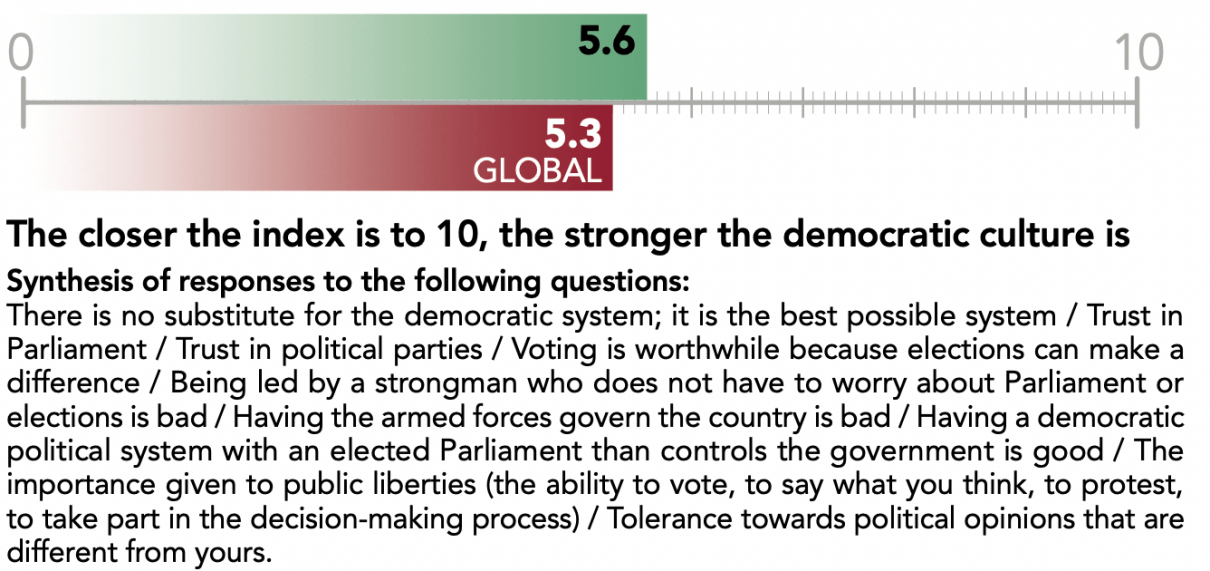
Copyright :
Fondation pour l’innovation politique/International Republican Institute – 2019
Democracy works well in my country
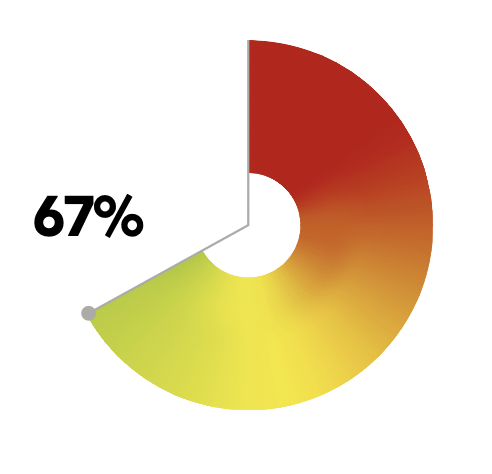

For each of the following powers, indicate if you think their posture on the international stage is worrying, reassuring or neither
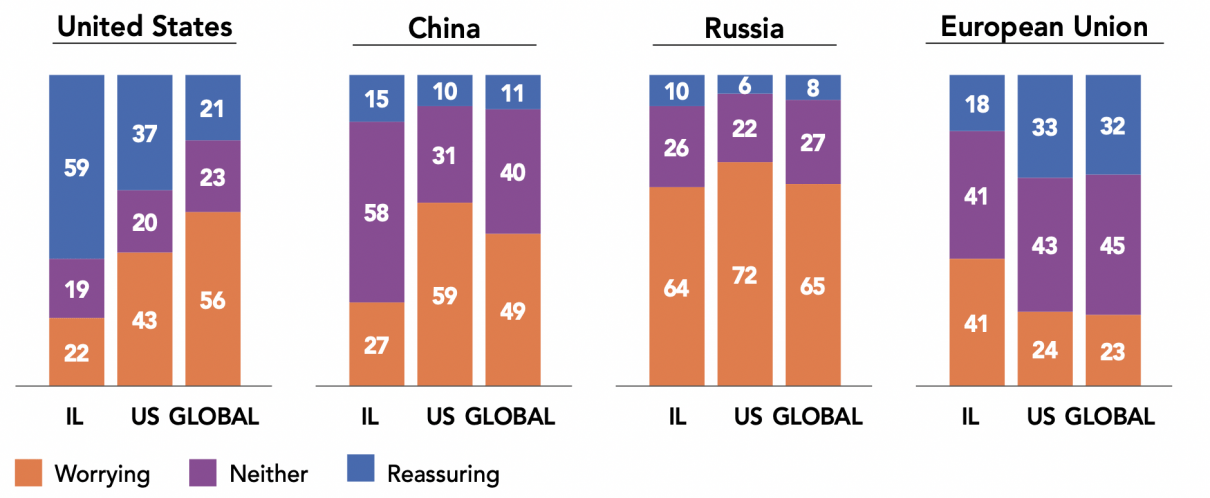
Copyright :
Fondation pour l’innovation politique/International Republican Institute – 2019
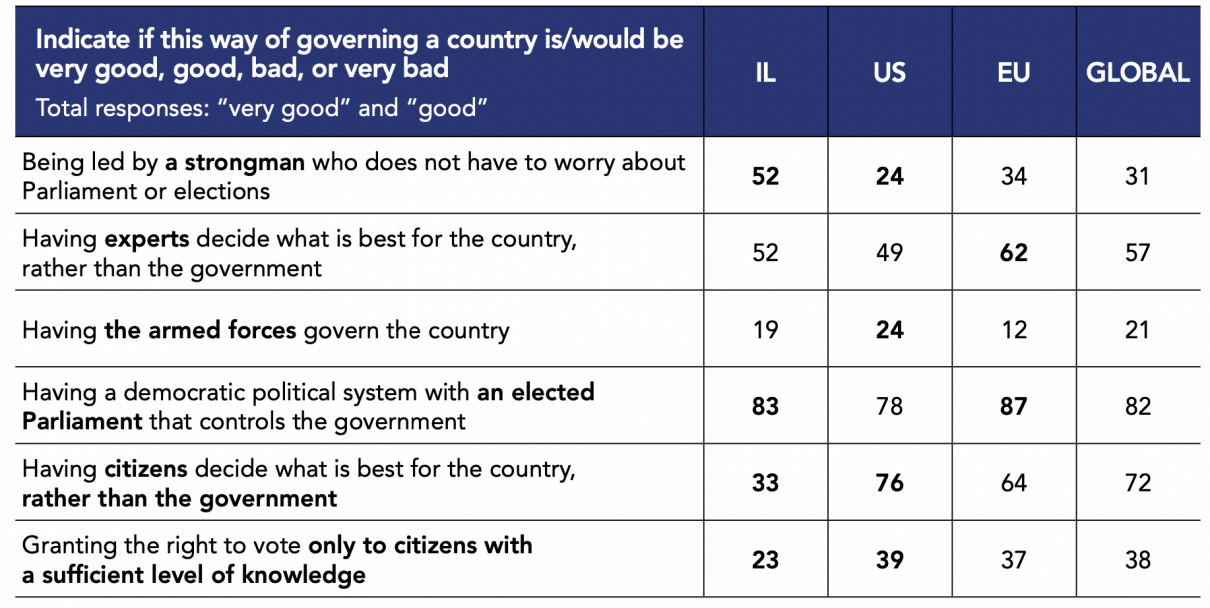
Copyright :
Fondation pour l’innovation politique/International Republican Institute – 2019
In Israel, the level of public contentedness with the democratic system is very high: 67% believe it works well in their country and 83% support a system in which the Parliament controls the government.
The Israeli political landscape is fragmented, relying on an electoral system based on fully proportional representation. Even in the majority, a party can only govern if it has a broad coalition, hence the frequent and occasionally murky negotiations held the next day, which likely explains the relative mistrust of the electoral process that one in four Israelis (26%) regards as not transparent, while two-thirds (65%) say they do not trust the political parties in Israel.
Despite this, support for Israeli institutions is strong. The deeply ingrained level of trust in the armed forces (90%) is explained by the almost permanent state of war that Israel has experienced since its creation. The armed forces have not only played a major security role but also a social one, since military service, which is compulsory for both men and women, has become the main vector for social integration. The majority of Israelis mistrust religious authorities (66%), though they are cited among the country’s three most powerful actors by more than one-third of the population (35%). This reflects a unique feature of Israel: it is at once a secular, Jewish and democratic state – religious authorities thus have unique power since they are represented politically and the Chief Rabbinate oversees the institution of marriage, causing divisions between the secular and the religious populations. Furthermore, while most Israelis trust NGOs (57%) (volunteering is part of Israeli culture), only a minority trust the media (43%), although this remains above the global average (34%).
Indicate whether you are worried or not about each of the following topics
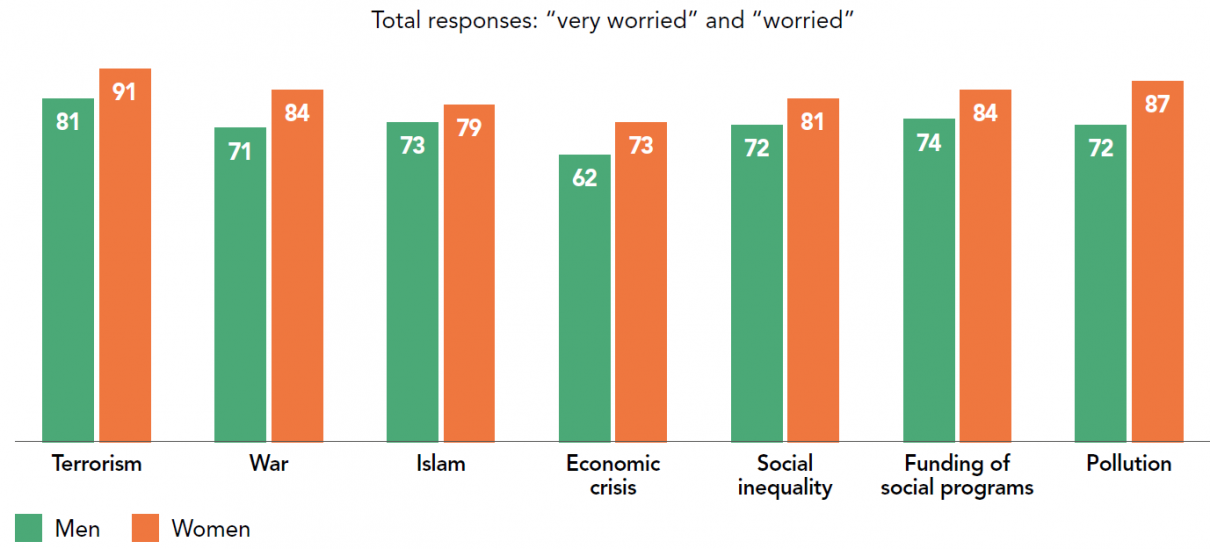
Copyright :
© Fondation pour l’innovation politique/International Republican Institute – 2019
Israeli society is particularly committed to the values of openness: three-quarters (72%) of Israelis state they are tolerant of different sexual orientations and people of different ethnicities (77%), most (79%) feel free to express themselves, and almost all (90%) support gender equality. By contrast, one-third of the Israelis surveyed (35%) say they have a negative reaction when they learn that a person is Muslim, i.e. 9 points above the overall average (26%) and more than three-quarters (76%) see Islam as a cause for concern, well above the average (60%) recorded in the 42 democracies.
Julie Decroix and Anne-Sophie Sebban-Bécache
- 56% think that their lifestyle or the way of life in their country is now threatened.
- 58% support the death penalty.
- 62% are in favor of democratic countries intervening militarily in order to defend democratic values.
Focus : Half of Israelis (52%) believe that being governed by “a strongman who does not have to worry about Parliament or elections” would be a good thing. This is 21 points higher than the average across the 42 surveyed democracies (31%).
Italy (IT)
Index of democratic culture
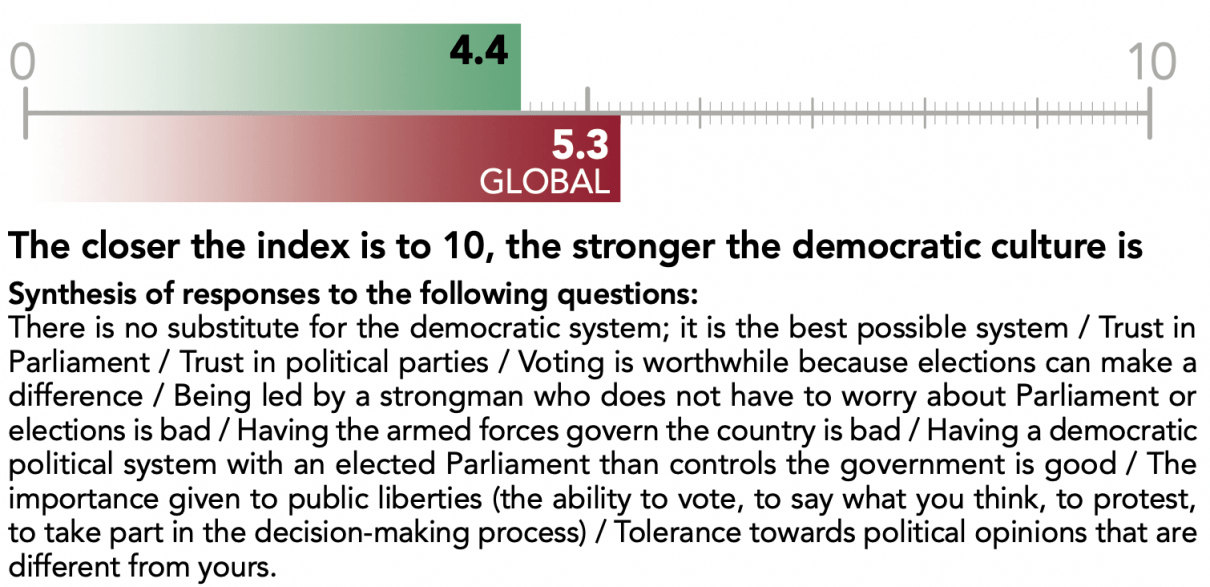
Copyright :
Fondation pour l’innovation politique/International Republican Institute – 2019
Democracy works well in my country
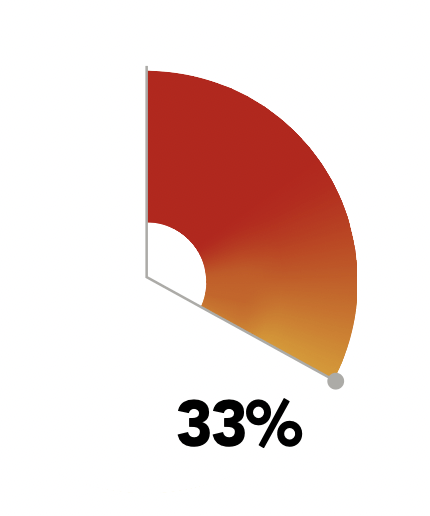

It is our duty to welcome refugees fleeing war and poverty into our country
Total responses: “strongly agree” and “agree”
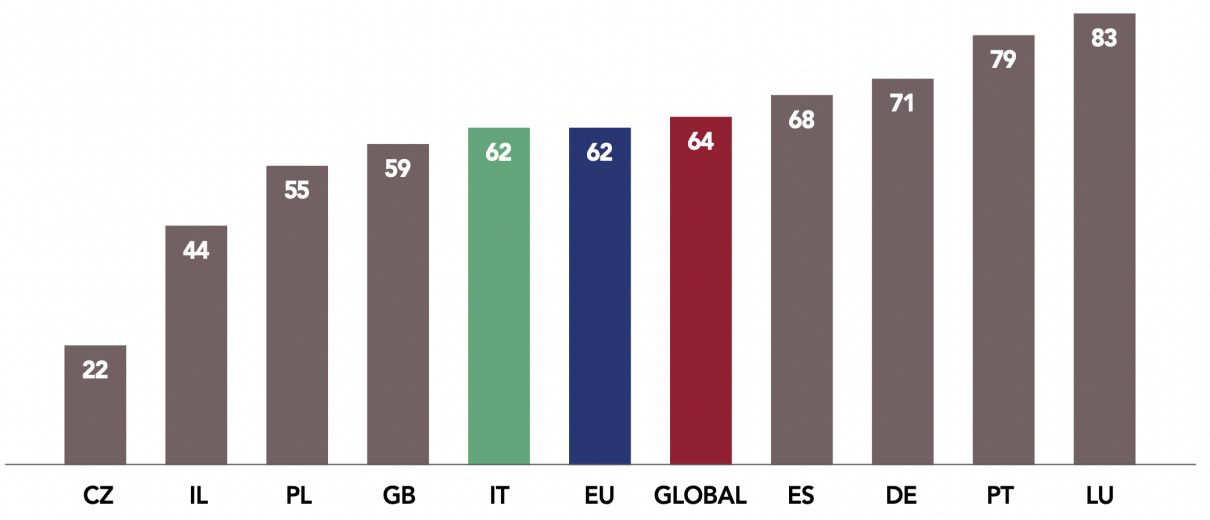
Copyright :
Fondation pour l’innovation politique/International Republican Institute – 2019

Copyright :
Fondation pour l’innovation politique/International Republican Institute – 2019
The elections of March 4th 2018 caused a political earthquake in Italy. The center-left and center-right traditional parties experienced setbacks, while two populist groups, Matteo Salvini’s Lega and Luigi Di Maio’s 5-Star Movement, won the elections and then signed, despite their deep disagreements, a government contract which, on June 1st 2018, led to the formation of an executive body. Our inquiry into the state of democracy was carried out three months after the Italian government’s first days. By referring to the previous survey by the Fondation pour l’innovation politique in 2017, we can determine whether these events have changed Italians’ perceptions of their personal situation, immigration, national policy or even the European Union.
Indicate whether you are worried or not about each of the following topics
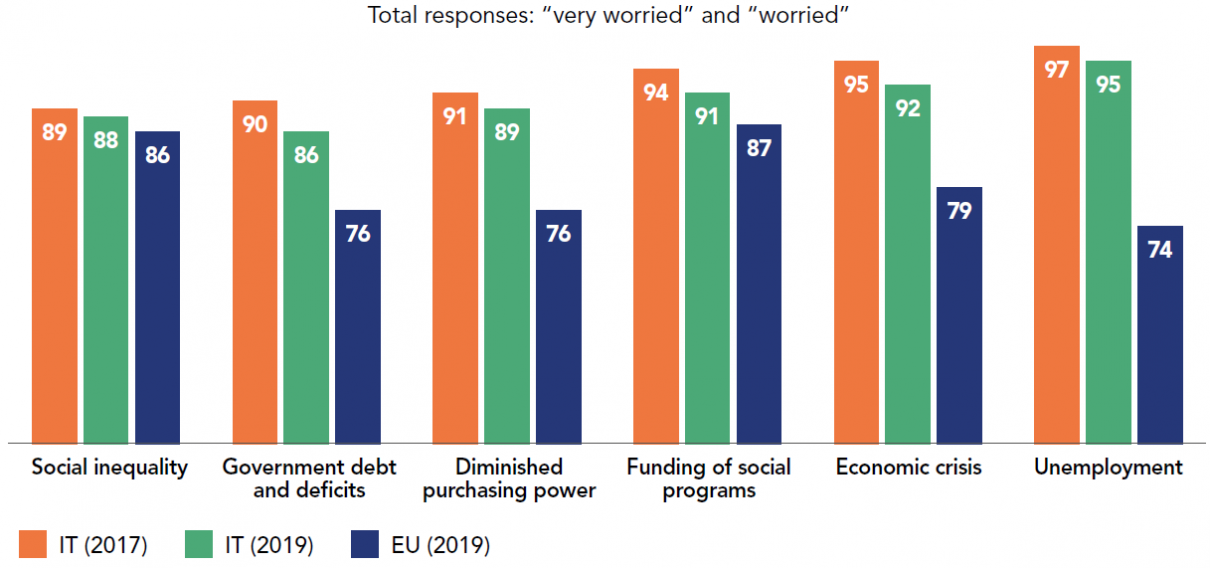
Copyright :
Fondation pour l’innovation politique/International Republican Institute – 2019
Concerns about terrorism (80% vs. 87%), Islam (65% vs. 67%) and public finances (86% vs. 90%) have also decreased slightly compared to 2017.
Although Italians remain very wary of politics, with 67% of them feeling that their democracy is not working well, this has still dropped 12 points in one year (79%). Likewise, 88% of Italians do not trust political parties, 67% do not trust Parliament and 66% do not trust the government, compared to 93%, 78% and 80% in 2017, respectively. The Italians are moving in a slightly positive direction regarding the European Union. Although they approve of the power struggle instigated by Rome against Brussels, they fear the potential of their country leaving the European Union. 54% of them now wish to remain in the eurozone, 10 points higher than in 2017 (45%).
It appears as if Italian populists, critics of their country’s political institutions and believers in direct democracy, have inspired some hope of a renewed democracy, and their promises to act for the people have sown the seeds of a better future. It remains to be seen whether this state of grace will last. If this is indeed the case, the populists could triumph in the long term. Otherwise, they will pay a high price to commensurate with the hopes they have raised.
Marc Lazar
- 36% think their country’s membership of the European Union is a good thing.
- 54% wish to keep the euro as their currency.
- 41% consider being led by a strongman who does not have to worry about Parliament or elections a good thing.
Focus : Italians’ pessimism in regard to their heritage has nevertheless declined without turning to optimism: more than half of Italians (52%) believe that their standard of living has remained stable (compared to 36% in 2017), and only one-third (33%) believe it has worsened (47% in 2017). Two out of ten Italians (21%) even think their lives will be better in the future (13% in 2017).
Japan (JP)
Index of democratic culture
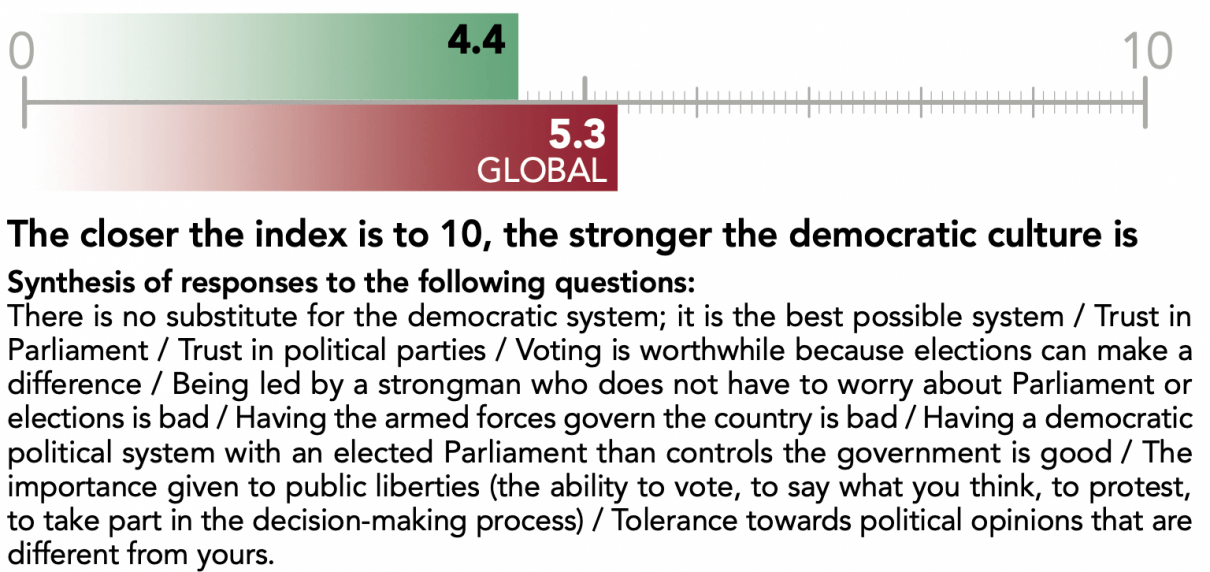
Copyright :
Fondation pour l’innovation politique/International Republican Institute – 2019
Democracy works well in my country
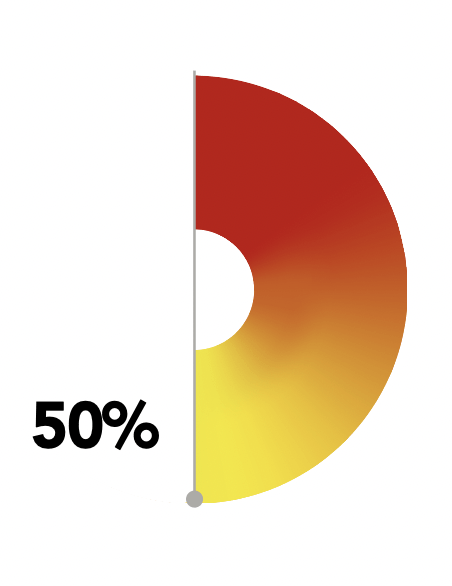
Tell me if you think China’s posture on the international stage is worrying, reassuring or neither
Response: “worrying”
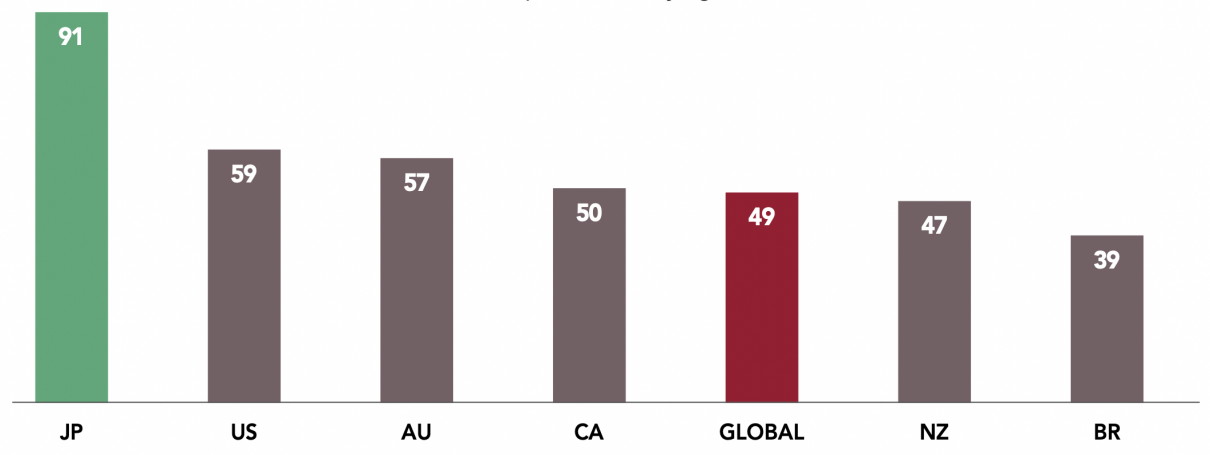
Copyright :
Fondation pour l’innovation politique/International Republican Institute – 2019
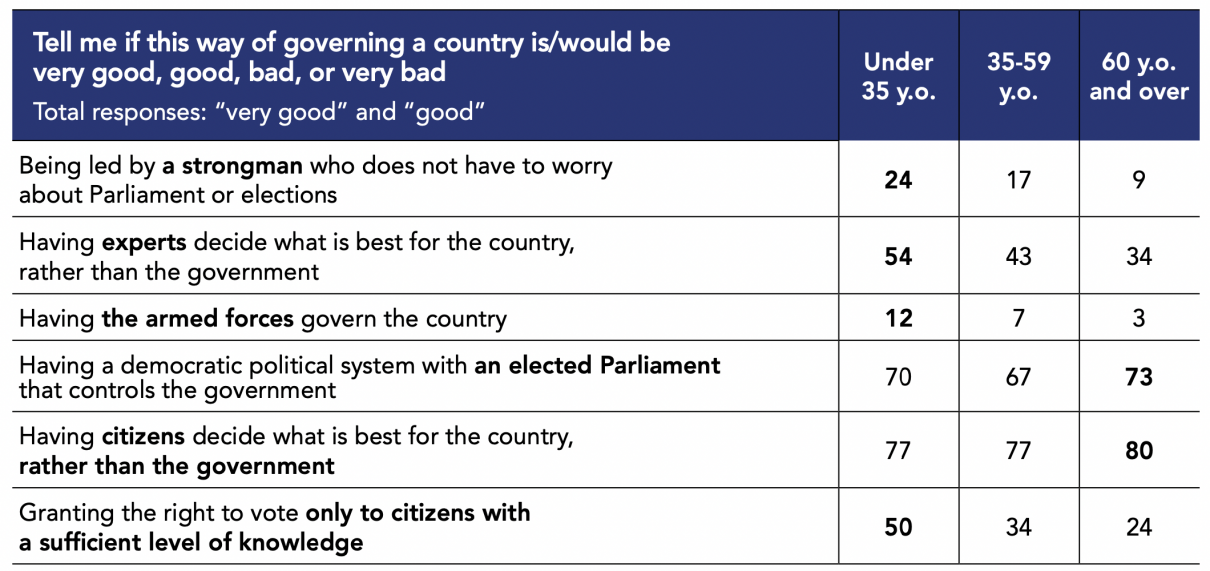
Copyright :
Fondation pour l’innovation politique/International Republican Institute – 2019
Since 2012, Japan has been led by governments with the Liberal Democratic Party leader Shinzo Abe at the helm. Known for his conservative stance, the Prime Minister has put systems in place to strengthen government power, for example the National Security Council based on the American model; the 2013 Act on State Secrecy; and the 2015 Act on the Japanese Self-Defense Forces, which allows for collective self- defense operations.
When it comes to choosing between order and freedom, 64% of Japanese people favor order at the expense of freedom (57% across all 42 democracies studied). There is also a discrepancy between the responses of the Japanese and those of the citizens from the 42 countries surveyed when it comes to the right to protest: only 51% of the Japanese think that being able to protest is important for the proper functioning of democracy, compared to 82% for the global average. The attachment to this freedom is very low despite the fact that the Japanese consider it important to be able to vote for the candidates of their choice (94%) and to be able to express themselves freely (96%).
The Japanese say they are in favor (78%) of a political system where citizens, not a government, decide what they think is best for the country, and are against (84%) a political system led by “a strongman who does not have to worry about Parliament or elections”. Moreover, only 70% of the Japanese replied that having “a democratic political system with an elected Parliament that controls the government” is a good thing, compared to 82% for the global average. These results could call into question the Japanese parliamentary system.
Men and women are equal and must have the same rights
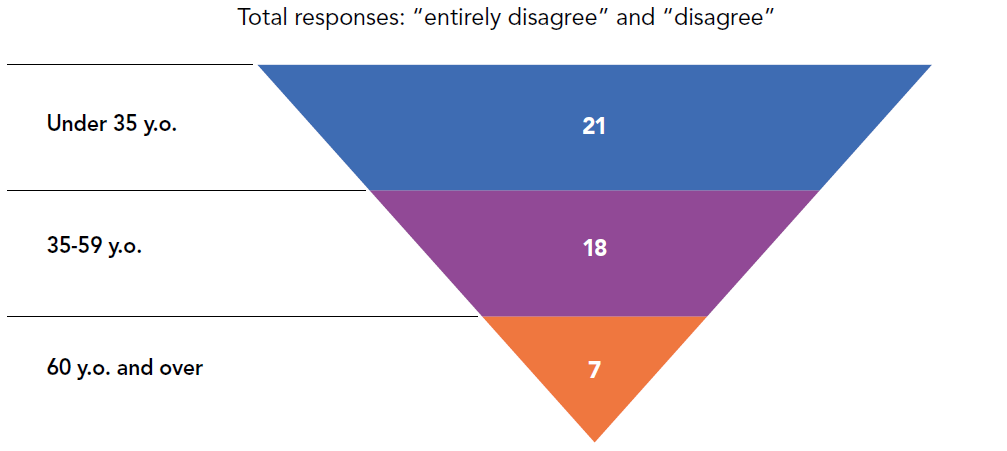
Copyright :
© Fondation pour l’innovation politique/International Republican Institute – 2019
Another particularity of Japanese society is its view of gender equality. Japan is the only country in our survey where less than half of citizens (44%) responded that they “entirely agree” with the statement “men and women are equal and must have the same rights”, 24 points below the average of the 42 democracies (68%). This figure is the same for women specifically (46%) but is higher for those on the political left (56%).
Eriko Oshima
- 37% think that voting is pointless because politicians do not care about the will of the people.
- 51% consider that their country will be not as good tomorrow as it is now.
- 64% declare not being interested in politics.
Focus : China’s posture on the international stage worries almost all Japanese people (91%), a level of concern well above that recorded in the 42 countries of the survey (49%). The concern about their neighboring country is evident, but most of the Japanese see the U.S. (86%) and not China (9%) as the most influential country in the world.
Latvia (LV)
Index of democratic culture
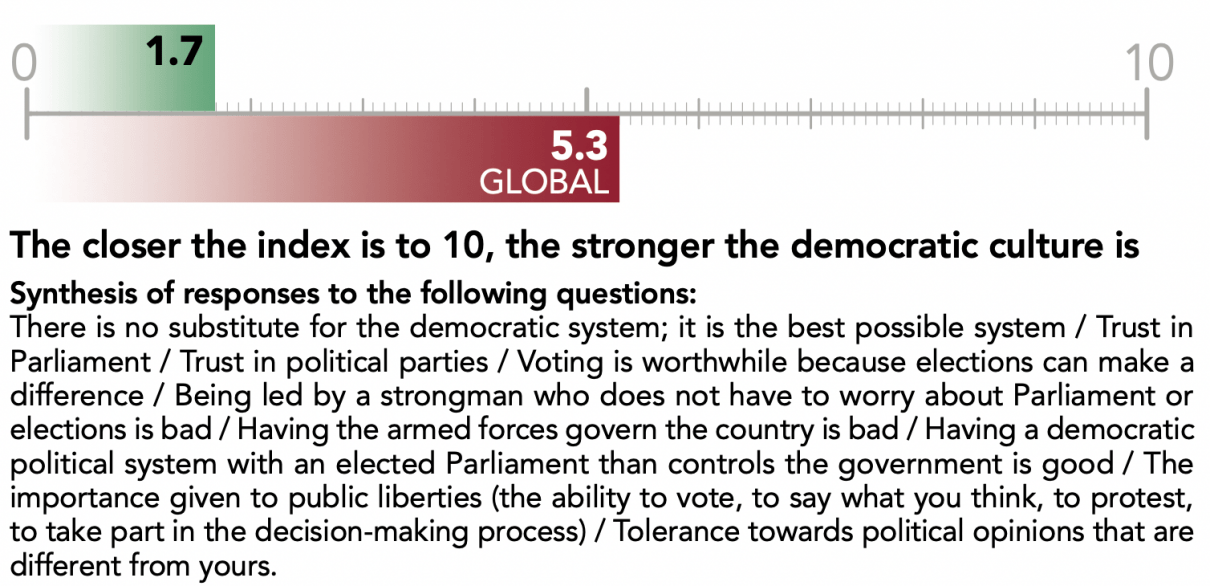
Copyright :
Fondation pour l’innovation politique/International Republican Institute – 2019
Democracy works well in my country
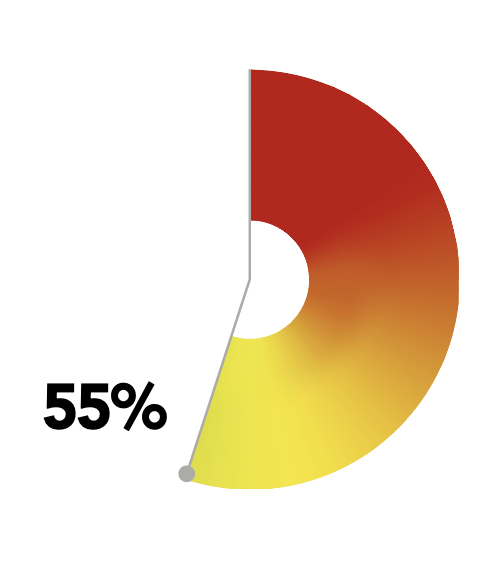

Voting is pointless because politicians do not care about the will of the people
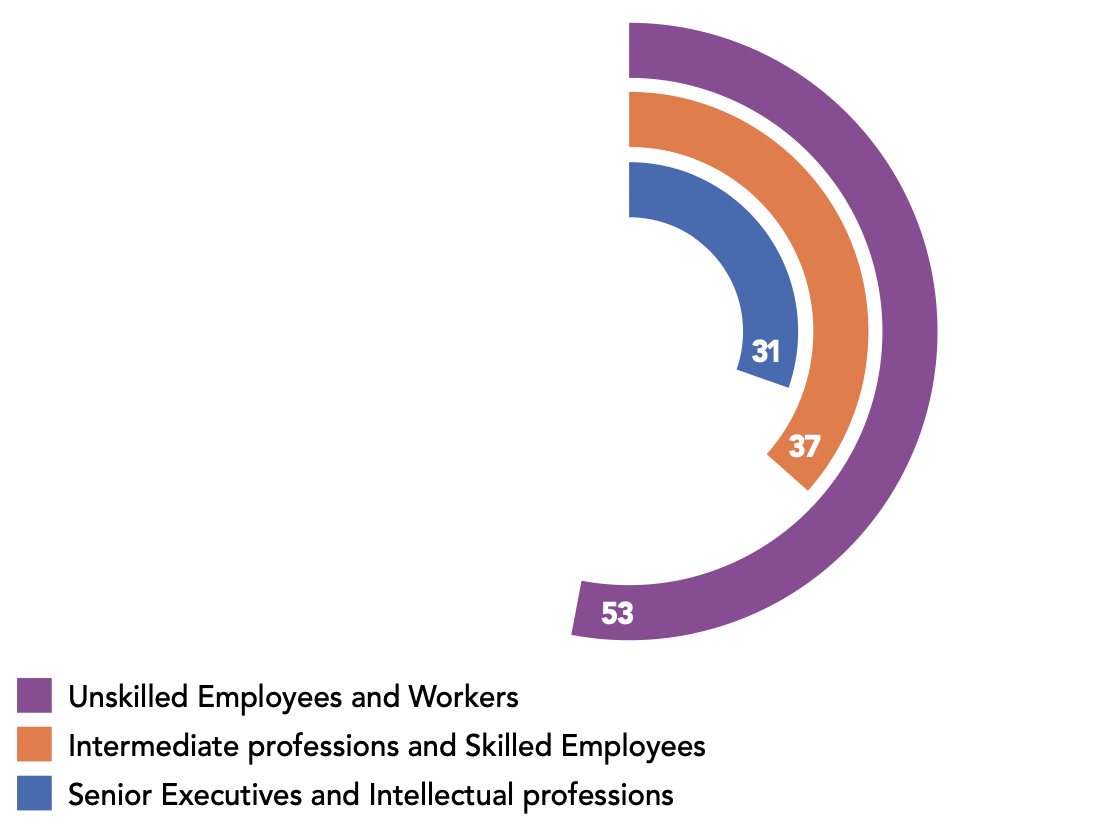
Copyright :
Fondation pour l’innovation politique/International Republican Institute – 2019
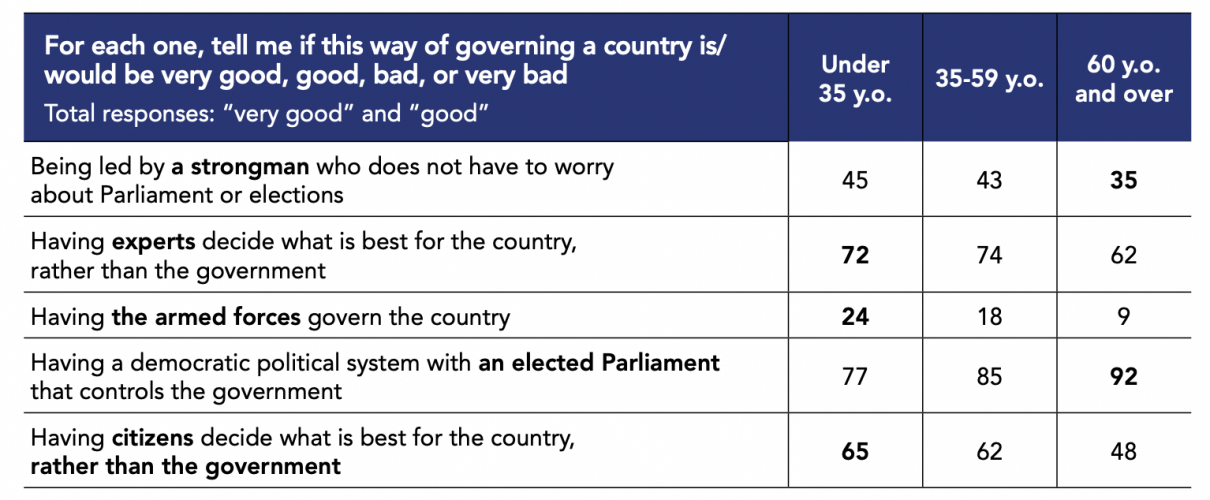
Copyright :
Fondation pour l’innovation politique/International Republican Institute – 2019
In Latvia, most of the issues addressed by our survey gave results close to 50%: 51% consider their membership of the European Union to be a good thing, 55% feel that democracy works well in their country, 58% consider voting to be worthwhile because elections can make a difference and 53% regard globalization as an opportunity. Regarding the issue of their standard of living, public opinion is divided across the three options: one-third state that their standard of living has improved (34%), nearly half state that it has remained stable (44%) and one-fifth state that it has deteriorated (22%).
Half of those surveyed (49%) believe that it is their duty to welcome refugees fleeing from war and poverty, but three-quarters of them say that their country cannot let in more refugees because they do not share the same values (73%), they increase the risk of terrorism (74%), crime (74%) or could harm the economy (68%). The tolerance of Latvians for different sexual orientations (60%) or political opinions (64%) is lower than their tolerance for differences of ethnic origin (77%) or religion (73%). The majority of respondents are in favor of the right to abortion (70%) but are also, more surprisingly, generally in favor of the death penalty (56%).
Distrust in institutions
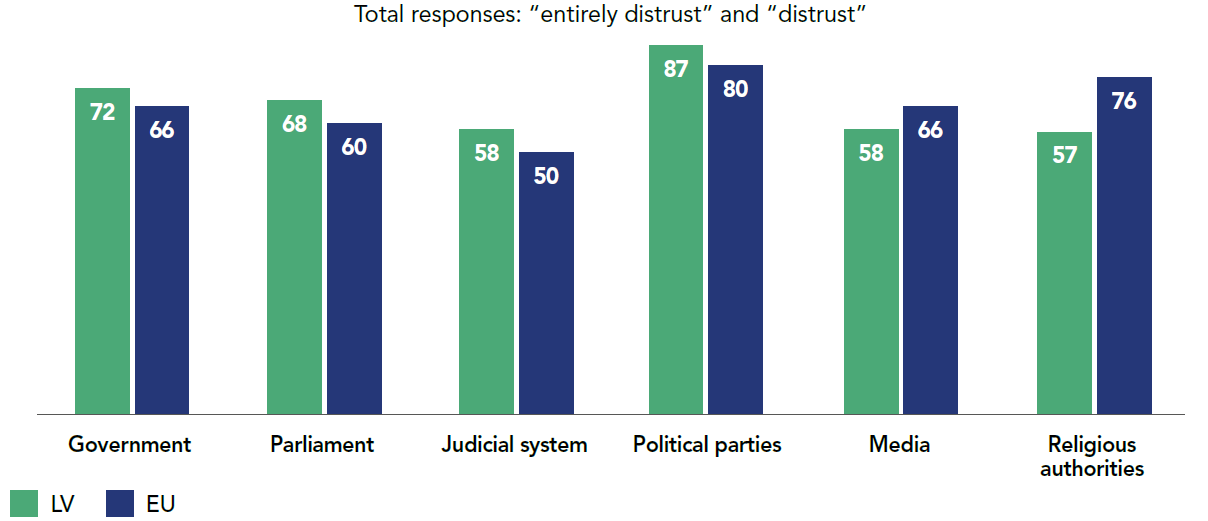
Copyright :
© Fondation pour l’innovation politique/International Republican Institute – 2019
The freedom to protest, march in the streets and dissent (81%), the possibility of participating in the decision- making process (96%), freedom of expression (97%) and the freedom to vote (95%) are widely supported. Yet, at the same time, respondents indicated that they prefer more order even if it means less freedom (64%).
On the whole, Latvians have a positive view of the European Union. While the United States is perceived as the most influential country (66%), the European Union has the most “reassuring” posture on the international stage (39%). More than one-third (37%) of Latvians believe that the European Union strengthens their democracy; they strongly support the idea of a common European army (59%) and believe that the issue of immigration should be dealt with at the European level (63%). Furthermore, the European Commission and European Parliament inspire greater trust than the Latvian Parliament and government (55% and 56% respectively, versus 32% and 28%). It is thus particularly worrying to see how low the level of trust is in Latvia’s political class and institutions.
Lolita Cigane
- 51% think their country’s membership of the European Union is a good thing.
- 58% wish to keep the euro as their currency.
- 61% consider that their lifestyle or the way of life in their country is not threatened.
Focus : A significant proportion of the population supports the idea of being led by a strongman who does not have to worry about Parliament or elections (41%) and the possibility of being led by “experts” is supported by nearly three-quarters of the population (70%). However, the proposal of a system based on an elected Parliament that controls the government still has the highest percentage of support (85%).
Lithuania (LT)
Index of democratic culture
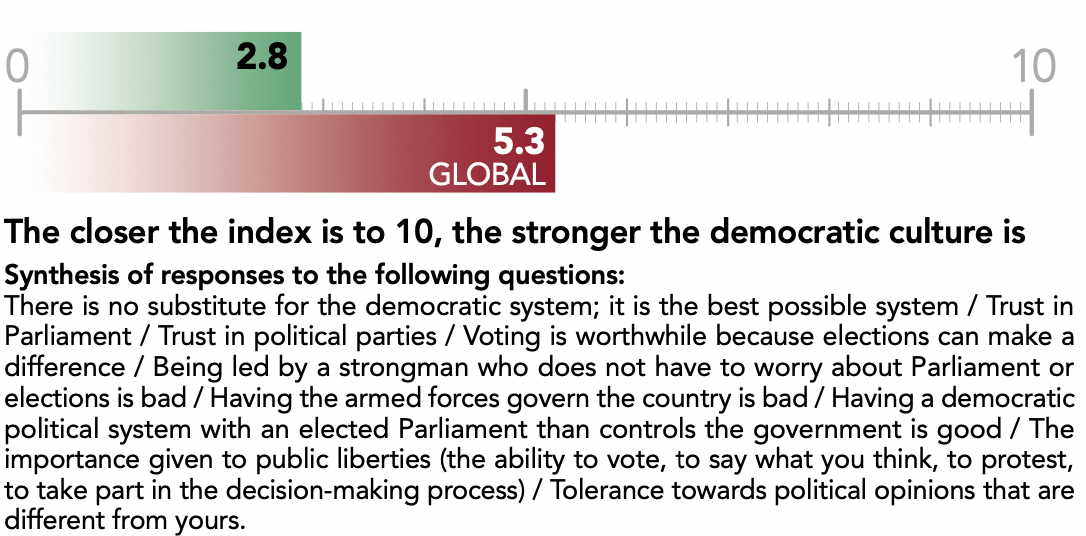
Democracy works well in my country
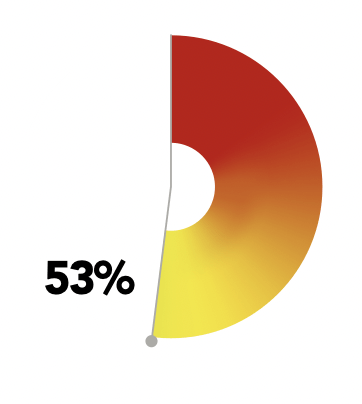

With regard to economic policy, would you say that…
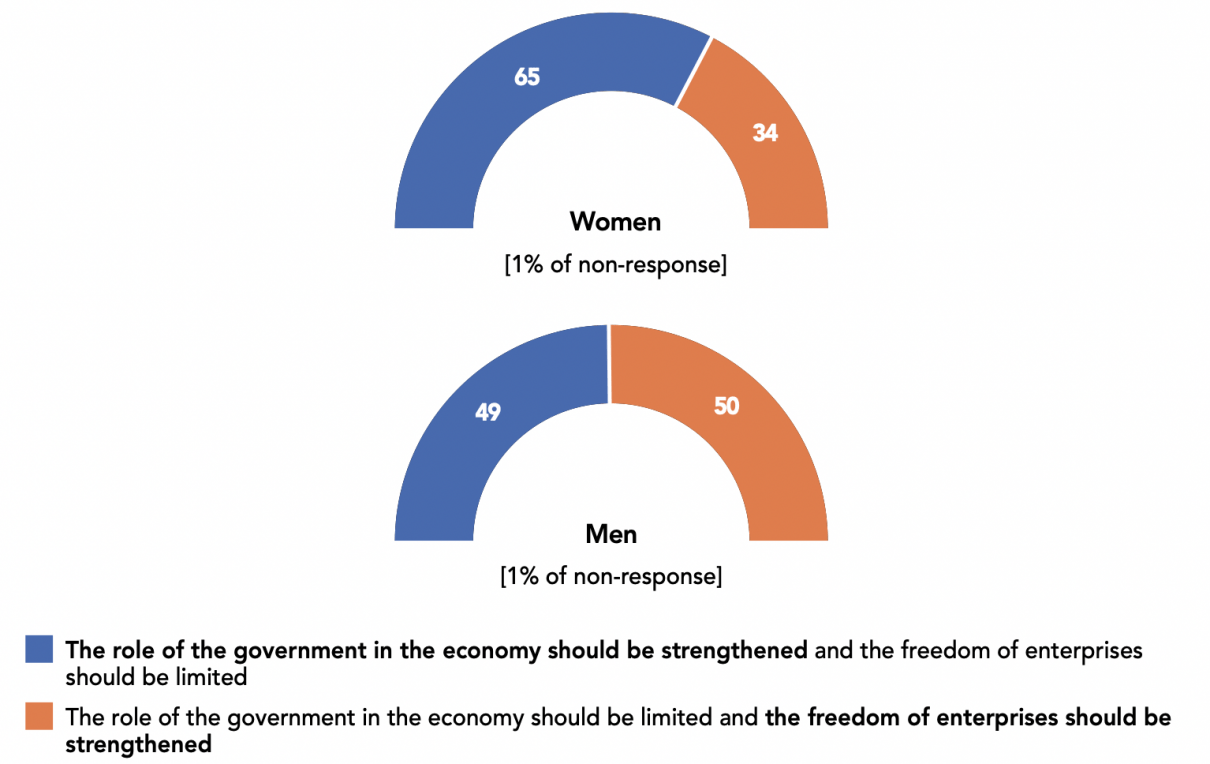
Copyright :
Fondation pour l’innovation politique/International Republican Institute – 2019

Copyright :
Fondation pour l’innovation politique/International Republican Institute – 2019
Once a leader in the democratization of post-Soviet Eastern Europe, Lithuania now seems to miss having an authoritarian leader at the head of the state. A large proportion of Lithuanians (70%) say that being led by “a strongman who does not have to worry about Parliament or elections” would be a good thing. This is the highest percentage among the 42 democracies surveyed, with Bosnia and Herzegovina at 67%, followed closely by Ukraine at 64%.
In Lithuania, the second fundamental lesson from our survey concerns the eternal question of the choice between freedom (to the detriment of order) and order (to the detriment of freedom). Here again, almost three-quarters of Lithuanians prefer order even if it means less freedom (72%). In this respect, Lithuania is similar to Romania (71%) and Brazil (73%), with Bulgaria leading as the most anti-freedom country (81%). Differences between generations can be observed: a large minority (48%) of young people aged under 35 prefer freedom to order (48%) while a large majority (85%) of those aged 60 and over are more in favor of order than of freedom. Lithuanians also appear to be a very pessimistic people: more (31%) think that the country will be worse tomorrow than it is today than those who believe the opposite (28%).
Which of the following statements is the closest to your personal opinion?

Copyright :
© Fondation pour l’innovation politique/International Republican Institute – 2019
Respect for the country’s political institutions is consistent with the previous figures: two-thirds (64%) of Lithuanians state that they do not trust the government, nearly three-quarters (71%) express mistrust of Parliament, more than half (54%) distrust the judicial system and a large majority (89%) do not trust political parties either. On the other hand, trust is much higher for European institutions, with 64% of citizens placing their trust in the European Parliament and in the European Commission.
Nevertheless, Lithuanians are attached to fundamental freedoms, particularly the right to protest (88%), to participate in the decision-making process (95%), to be able to vote for the candidate of their choosing (95%) and the right to say what one thinks (96%). Moreover, a large majority (90%) of Lithuanians believe that having a “democratic political system with an elected Parliament that controls the government” is a good thing. This fragile balance on which the current political system is based could easily evolve towards a democratic regression like Hungary’s “Orbanism”.
Lithuanians are staunch Atlanticists: 71% support NATO membership (behind Estonia at 75%, and Albania at 86%). More people think that the United States’ posture on the international stage is reassuring (42%) than that it is worrying (33%), a figure higher than that of the neighboring Baltic countries and Poland, which are also pro-NATO.
Mantas Adomėnas
- 61% think their country’s membership of the European Union is a good thing.
- 45% wish to keep the euro as their currency.
- 68% would like the European Union to form a joint army for all Member States.
Focus : Compared to the EU average, Lithuanians are particularly supportive of the Internet and social media. A large majority of Lithuanians see these as a good thing because “they help people to express themselves more freely” (88% versus 70% for the EU), “they offer people the possibility to get informed by themselves” (95% versus 83%) and “they help you meet new people” (90% versus 75%).
Luxembourg (LU)
Index of democratic culture
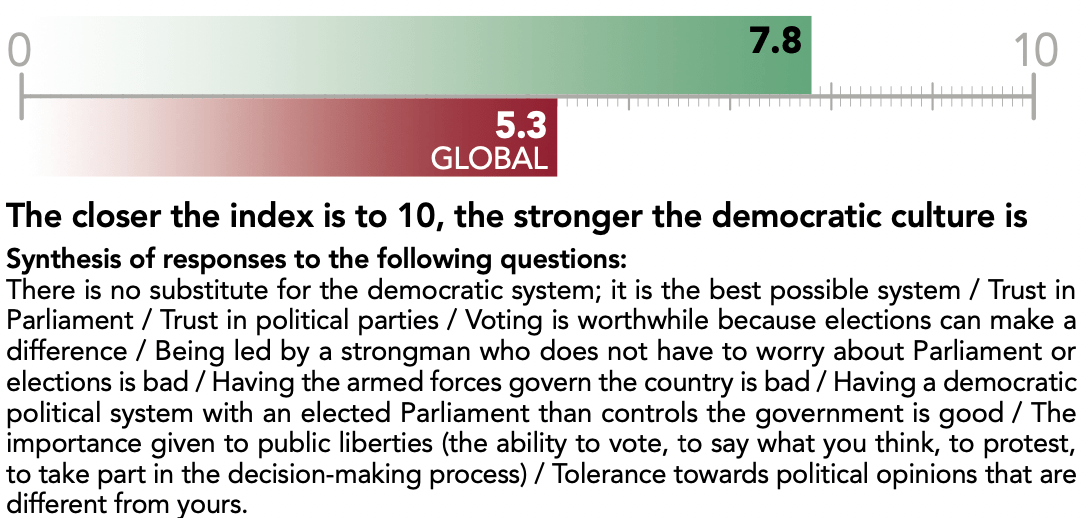
Democracy works well in my country
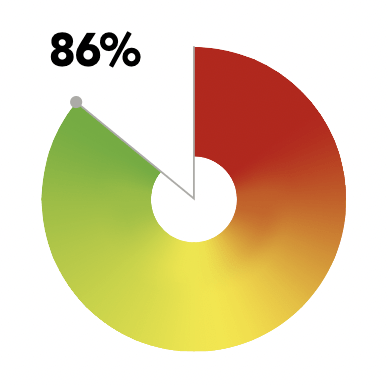

Trust in institutions
Total responses: “entirely trust” and “trust”
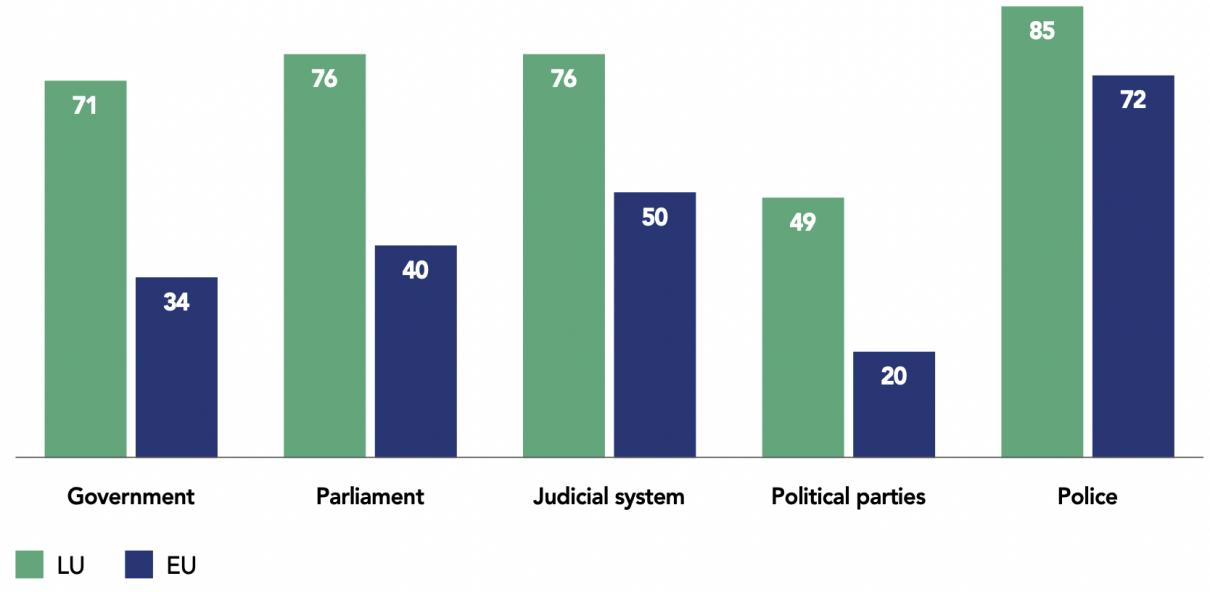
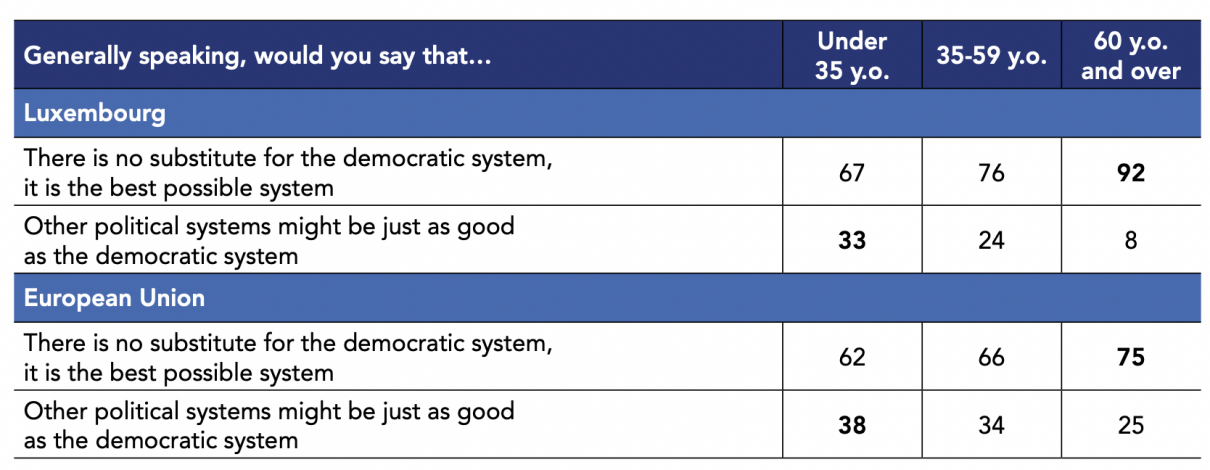
Copyright :
Fondation pour l’innovation politique/International Republican Institute – 2019
Among the citizens of the six founding countries of the European Union, Luxembourgers are the most satisfied to be part of it: three-quarters (77%) of the respondents believe that being part of the European Union is a good thing, ahead of the Germans (52%), Dutch (48%), Belgians (45%), French (42%) and Italians (36%). This is also 28 points higher than the European average (49%). This attachment to the European Union is reflected in the trust that the people of Luxembourg have in the European institutions. A large majority (65%) responded that they trust the European Parliament (compared to an average of 45% in the European Union) and the European Commission (64% compared to 43%).
The trust that Luxembourgers place in their national institutions is equally significant, whether regarding their government (71% versus 34% at the European Union level), their national Parliament (76% versus 40%) or their judicial system (76% versus 50%). In contrast, a majority of Luxembourgers (56%) express their mistrust of the media, which remains well below the European average (66%). These opinions characterize a country that is particularly attached to the representative system of democracy. For example, half of the Luxembourgers surveyed (49%) are opposed to the idea of having “citizens decide what is best for the country, rather than the government”. On average, in the European Union, one-third (36%) of Europeans are opposed to direct democracy.
Public opinion in Luxembourg still stands out in regard to immigration, with a majority (55%) not being worried about it, unlike Europeans as a whole, who are very concerned about this topic (69%). This unique attitude also manifests itself on the issue of refugees. The majority of Luxembourgers (83%) feel that it is their duty to welcome “refugees who are fleeing war and poverty” and reject the idea of not doing so for fear of economic consequences, the risk of terrorism, a difference in values or the risk of increased crime. The percentage of foreigners living in the Grand Duchy, which stood at 47.9% on January 1st 2018 (85% of whom are from another European country), may in part explain the rather positive view that Luxembourgers have of immigration.
We cannot let in more refugees because…

Copyright :
© Fondation pour l’innovation politique/International Republican Institute – 2019
Their economic preferences may, however, come as a surprise. While the country is considered an exceptionally dynamic economic and financial hub, the fact remains that 59% of Luxembourgers are in favor of strengthening the role of the state and limiting the freedom of enterprises (compared to 48% across the entire European Union and 41% on average in the 42 democracies surveyed). Lastly, it should be noted that three-quarters of Luxembourgers (77%) say they trust small and medium-sized businesses, which is more than double their trust in large businesses (32%).
Victor Delage
- 77% think their country’s membership of the European Union is a good thing.
- 84% wish to keep the euro as their currency.
- 54% consider that the number of democratic countries in the world is declining.
Focus : The U.S. company Amazon, whose European headquarters are in Luxembourg, is the Internet giant that inspires the most trust among Luxembourgers (68% trust it versus 61% for Microsoft, 56% for Apple, 55% for Google and 22% for Facebook).
Malta (MT)
Index of democratic culture
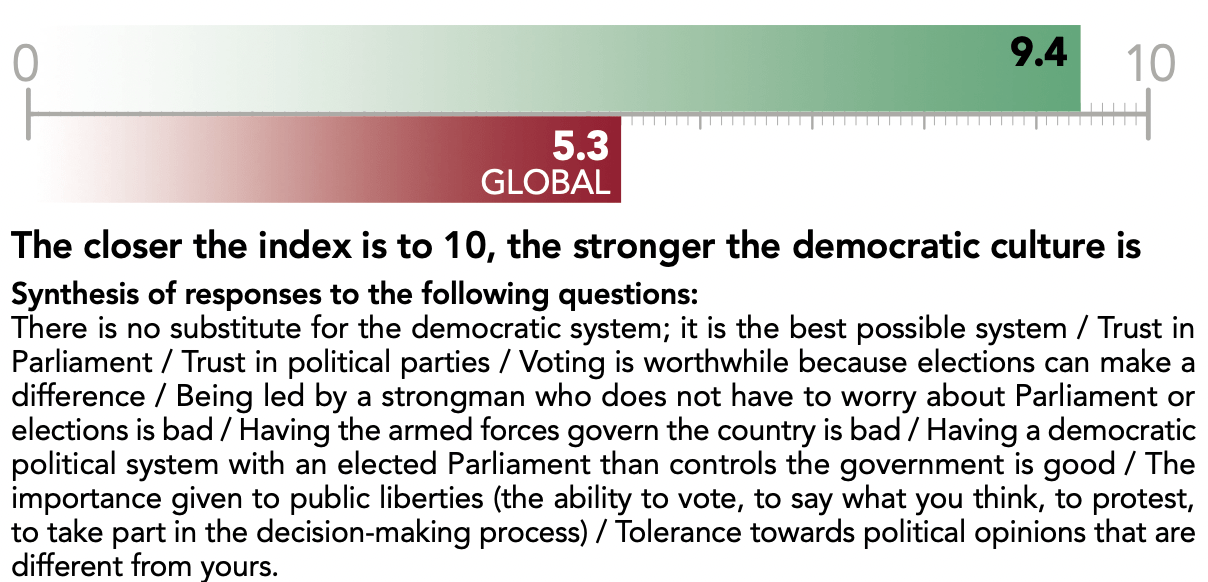
Copyright :
Fondation pour l’innovation politique/International Republican Institute – 2019
Democracy works well in my country
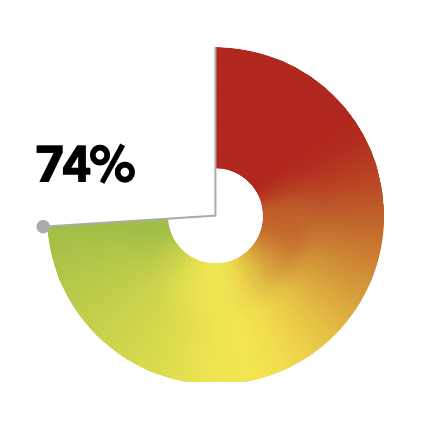

Trust in institutions
Total responses: “entirely trust” and “trust”Fondation pour l’innovation politique/International Republican Institute – 2019
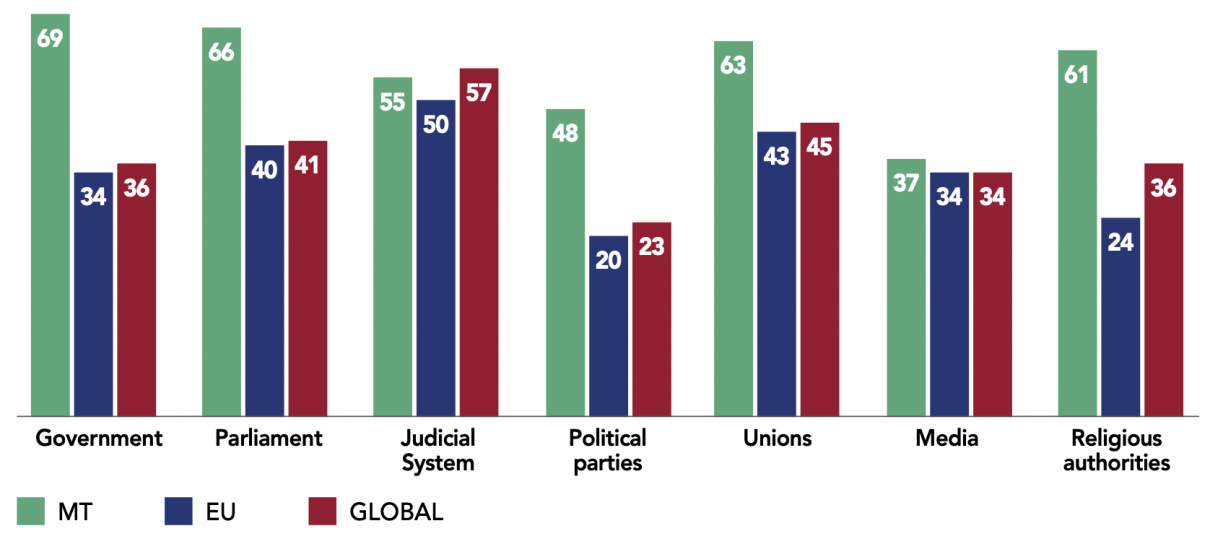
Copyright :
Fondation pour l’innovation politique/International Republican Institute – 2019
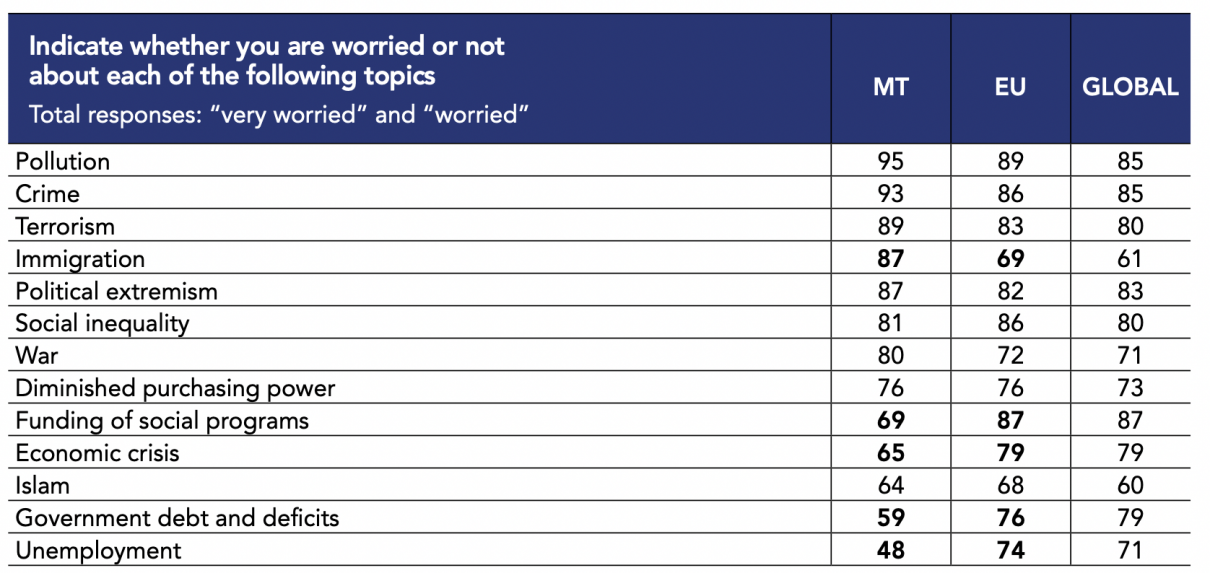
Copyright :
Fondation pour l’innovation politique/International Republican Institute – 2019
Since 1964, when Malta was granted independence from the British, this Mediterranean island has experienced sustained economic growth, which continues more than fifty years later. Some 53% of Maltese citizens believe that their standard of living has improved in recent years, compared to only 28% across all 42 countries in the survey. It should be noted that this bastion of Christian faith (90% of the population) is the only Member State of the European Union that prohibits abortion.
The Maltese are generally very satisfied with the democratic system in which they live. They think it works well (74%), that the electoral process is transparent (76%) and that voting is worthwhile because elections can make a difference (86%). More than a quarter even said that “the people” were one of the three most powerful groups in Maltese society (27%). Although a comfortable majority prefers order even it means less freedom (68%), it is surprising to note that the Maltese overwhelmingly reject the idea of being led by “a strongman who does not have to worry about Parliament or elections” (81%). By way of comparison, this sentiment is shared by 66% of European citizens. Despite the murder in October 2017 of a journalist investigating corruption, Maltese citizens feel they can express themselves freely (66%) at the same level as the European average (63%).
Generally speaking, in today’s society do you feel that you are free to express yourself?

Copyright :
© Fondation pour l’innovation politique/International Republican Institute – 2019
In the smallest of the Member States, the European Union elicits a rather positive opinion, both politically and economically. Indeed, two-thirds of the population consider their country’s membership of the European Union to be a good thing (61%), a figure well above the European Union average (49%). A large majority wants to keep the euro as their national currency (80%, compared to 62% in the eurozone) and almost half of the population (47%) believe that the United Kingdom will be worse off outside the European Union. Moreover, a higher percentage of citizens than in any other European country believe that membership of the European Union strengthens democracy in their country (57%, compared to an average of 36% in the European Union).
Malta’s southern position in relation to Europe has historically been an undeniable commercial advantage, but this strategic position has now made the country a gateway for refugees. Although two-thirds (66%) of those surveyed consider it their duty to welcome refugees (compared to 57% in France and 62% in Italy), the figures show that the island is experiencing major difficulties in managing the growing flux of migrants. As crime is the second-greatest source of concern for Maltese citizens (93%) after pollution (95%), a vast majority of respondents (78%) state that their country cannot let in more refugees since they increase the risk of crime. Crime is more of a concern for the Maltese than for European citizens from other countries with higher crime rates, such as Sweden (78%), Germany (80%) or France (84%).
Maude Paillard-Coyette
- 61% think their country’s membership of the European Union is a good thing.
- 80% wish to keep the euro as their currency.
- 88% are opposed to abortion rights.
Focus : Despite the difficulties related to the growing number of refugees who arrive on the island daily, the Maltese are quite tolerant. Some 74% say they are indifferent when they learn that a person is Muslim, in contrast with 45% of Finns, 49% of Belgians and 54% of the Swiss. Furthermore, 68% of Maltese people do not feel that their lifestyle is threatened (compared to 46% in the European Union), while in France, 69% of citizens believe the opposite.
Netherlands (NL)
Index of democratic culture
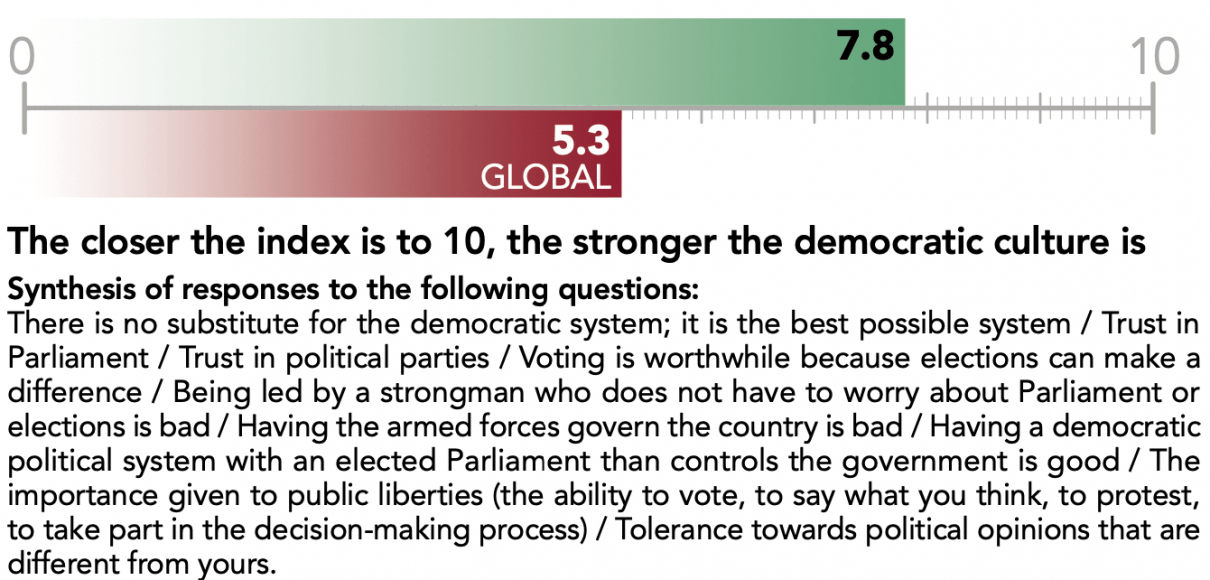
Copyright :
Fondation pour l’innovation politique/International Republican Institute – 2019
Democracy works well in my country
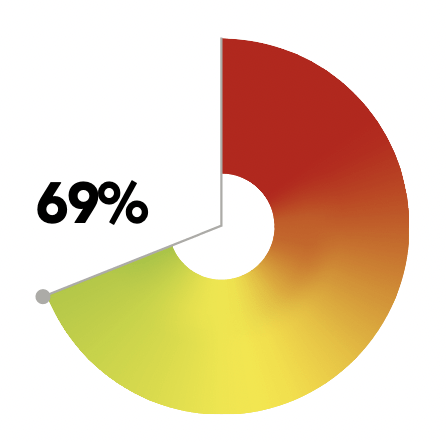

For each of the following powers, tell if you think their posture on the international stage is worrying, reassuring or neither
Response: “worrying”
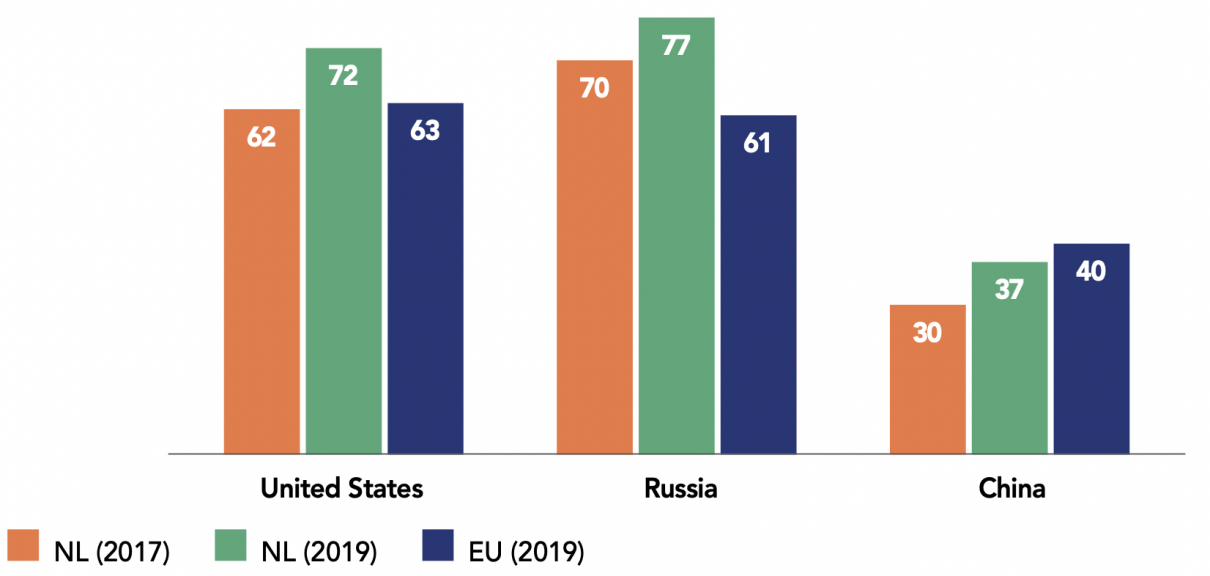
Copyright :
Fondation pour l’innovation politique/International Republican Institute – 2019
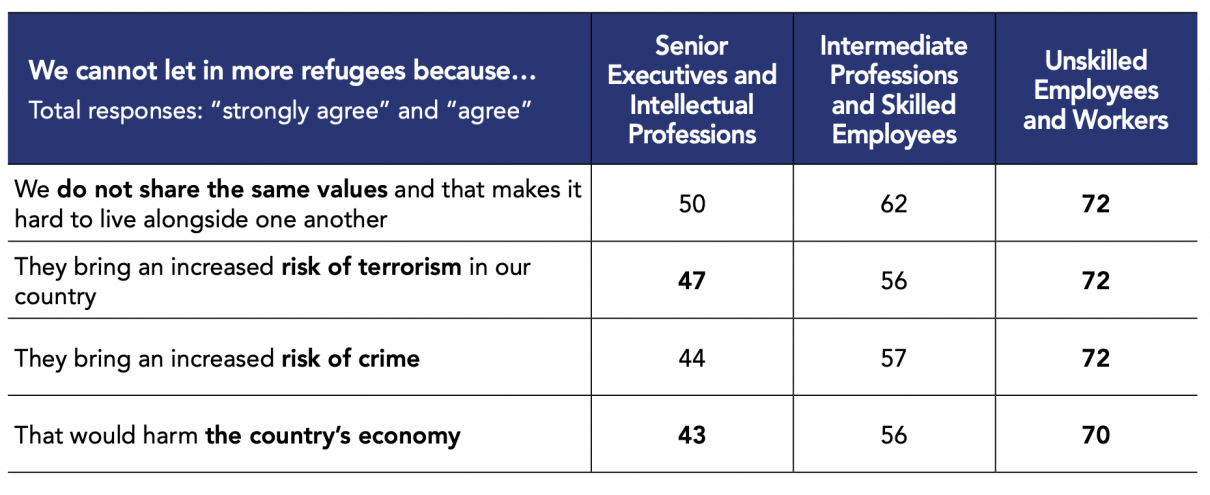
Copyright :
Fondation pour l’innovation politique/International Republican Institute – 2019
The renewed prosperity of the Netherlands (with growth up 2.5% and 3.5% unemployment in 2018) explains why, on all economic and social issues, their concerns here are 20 points or more below the European average. However, a majority still worries about several notable issues: unemployment (54%), public debt and deficit (54%), an economic crisis (62%), diminished purchasing power (67%), social inequalities (79%) and the funding of social programs (84%).
This ambivalence is further evident regarding the state of Dutch democracy. On the one hand, the feeling that democracy is working well (69%) and trust of all institutions (except the religious authorities) is between 10 and 30 points higher than in the rest of the European Union (50% on average believe that their democracy is working well). Even political parties, plagued elsewhere by deep mistrust, have regained the trust of exactly half of the population (50%). This is probably the effect of the country’s return to political stability under the leadership of the liberal Mark Rutte since 2010. Despite the very fragmented results of the 2017 elections, a four-party center-right coalition was established.
Trust in institutions
Total responses: “entirely trust” and “somewhat trust”
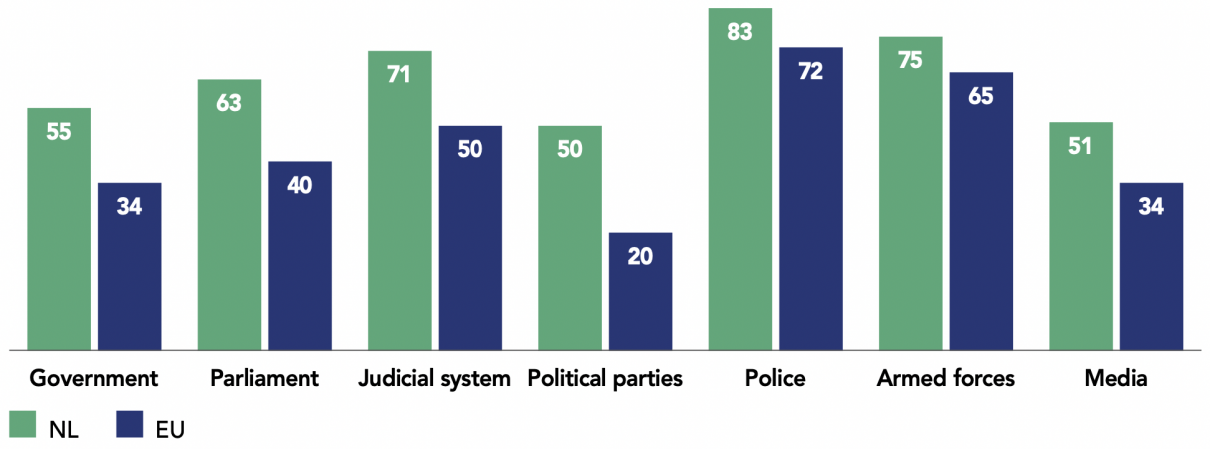
Copyright :
Fondation pour l’innovation politique/International Republican Institute – 2019
However, social concerns remain strong. Despite a decline of 7 points, terrorism remains a majority concern (76%). Two American tourists were stabbed at the end of August 2018 at the Amsterdam train station and a plan for a large-scale attack was foiled in September in the south of the country. Concern about Islam (67%) is above all based on the question of values and living together: a ban on burqas was passed in 2018 by the Dutch Parliament.
A consensus view also emerges with regard to the country’s relationship with Europe and the world. The
image of the European Union and its institutions is improving (49% trust the European Parliament and the
European Commission), as is commitment to the euro (62%). But, as a reminder of the “no” vote in the 2005
referendum, 34% of the Dutch still feel that Europe has a negative influence on the democratic functioning of
their country (compared to the 30% who believe that the European Union is strengthening their democracy). €
A sign of the times, the idea of a European army, long rejected, is gaining ground in public opinion (51% of favorable responses) despite a still strong but declining attachment to NATO (64%).
Christophe de Voogd
- 48% Christophe de Voogd think their country’s membership of the European Union is a good thing.
- 62% wish to keep the euro as their currency.
- 58% prefer more order even if it means less freedom.
Focus : Regarding immigration in the context of the refugee crisis, there is a clear ambivalence between solidarity in principle with welcoming refugees fleeing war and poverty (77%), reflecting the strong national humanitarian tradition, and a majority rejection of refugees for economic reasons (56%) and, above all, 61% of the Dutch oppose letting in more refugees because of the potential problems of cohabitation that their presence imposes.
New Zealand (NZ)
Index of democratic culture
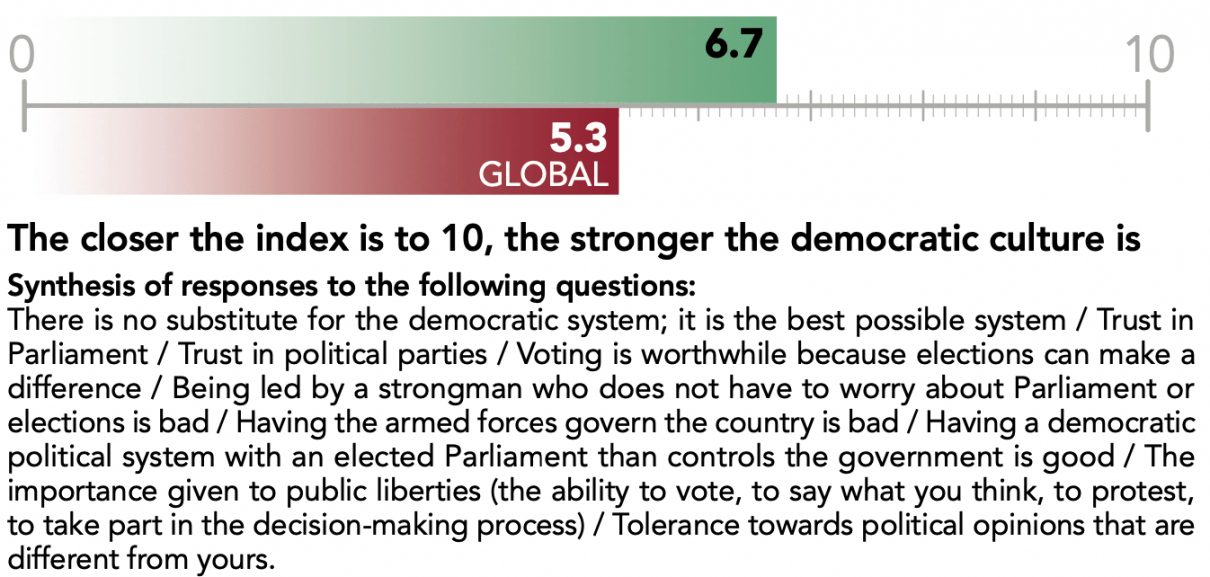
Copyright :
Fondation pour l’innovation politique/International Republican Institute – 2019
Democracy works well in my country
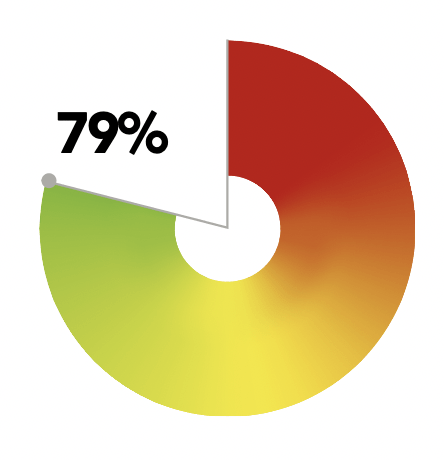

Voting is worthwhile because elections can make a difference
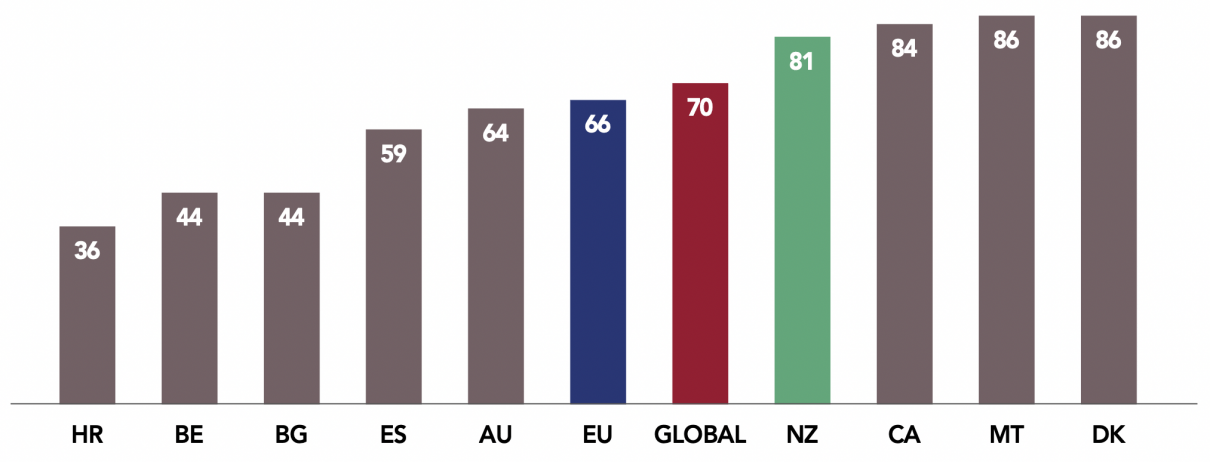
Copyright :
Fondation pour l’innovation politique/International Republican Institute – 2019
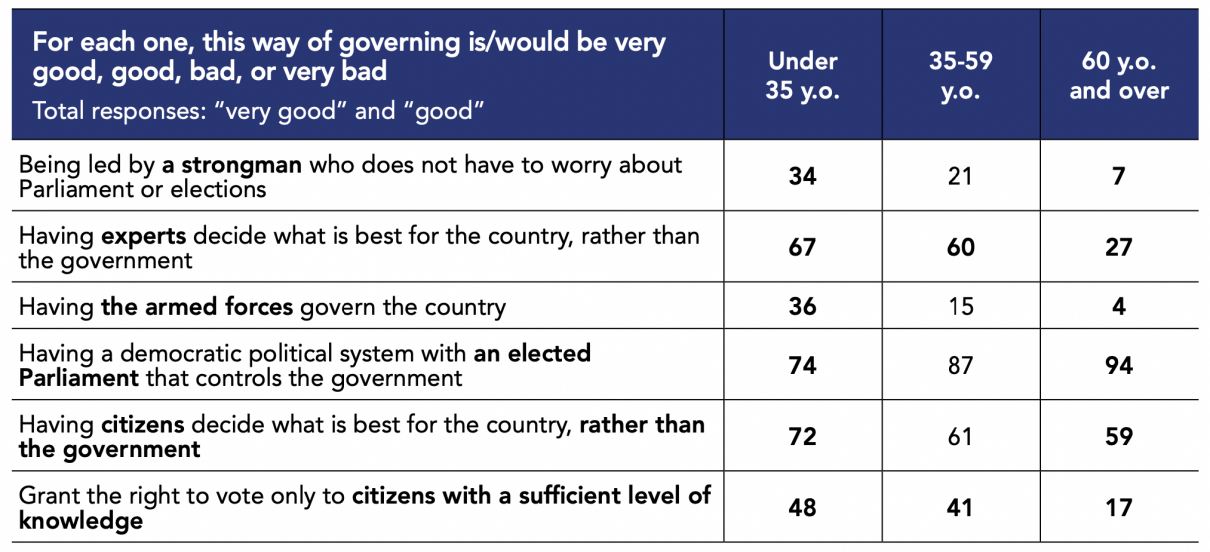
Copyright :
Fondation pour l’innovation politique/International Republican Institute – 2019
Independent since 1947 and a member of the Commonwealth, New Zealand1 is a parliamentary monarchy with one of the best democracy index rankings in the world2. Indeed, a large majority of citizens (79%) believe that democracy works well in their country. 72% of New Zealanders trust their government, which is double the average for the 42 countries surveyed (36%), and 70% trust their Parliament, which is 29 points above the average for the 42 countries (41%). Testament to a strong parliamentary culture, most New Zealanders (85%) consider it a good thing to have “a democratic political system with an elected Parliament that controls the government”.
Trust in businesses
Total responses: “entirely trust” and “trust”

Copyright :
Fondation pour l’innovation politique/International Republican Institute – 2019
Curiously, while New Zealand is historically known for one of the countries with the most women in government on the planet and has been led by Jacinda Ardern (age 37), the youngest woman in the world to take up the post of Prime Minister, since October 26th 2017, only one in ten women (10%) states that they are very interested in politics (as opposed to 22% of men).
On the issue of immigration, 58% of New Zealanders say they are not worried, a higher percentage than a country like Canada (53%), which is considered a welcoming country for immigrants, or Australia (40%). They also significantly support the principle of welcoming refugees, as 64% respond that it is their duty to welcome refugees fleeing war and poverty. Contrary to the opinions noted in most of the surveyed countries, New Zealanders reject the reasons offered for not letting in refugees, whether these be problems regarding their shared values (67% of New Zealanders disagree with the statement “we do not share the same values and that makes it hard to live alongside one another”), crime (62% of them do not agree that “they bring an increased risk of crime”), economic competition (60% of the interviewees disagree that “this would harm the country’s economy”) or terrorist risks (59% of New Zealanders do not believe that refugees “bring an increased risk of terrorism into our country”).
Julie Noyer
- 84% are worried about pollution.
- 68% see globalization as an opportunity.
- 52% support the death penalty.
Focus : New Zealanders are twice as likely (27%) as the average of the 42 countries in the study (13%) to identify China as the most influential country in the world, ahead of Russia, the United States and the European Union. China’s posture on the international stage is perceived as worrisome by 47% of respondents, 10 points lower than Australia (57%) but almost equal to the average of the 42 countries (49%).
North Macedonia (MK)
Index of democratic culture
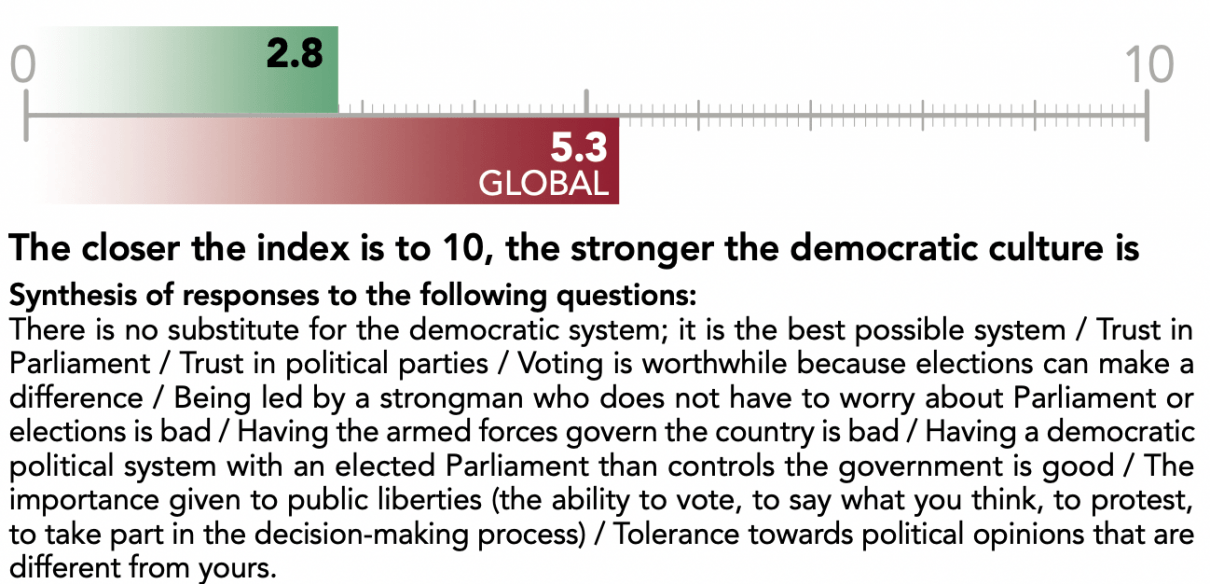
Copyright :
Fondation pour l’innovation politique/International Republican Institute – 2019
Democracy works well in my country
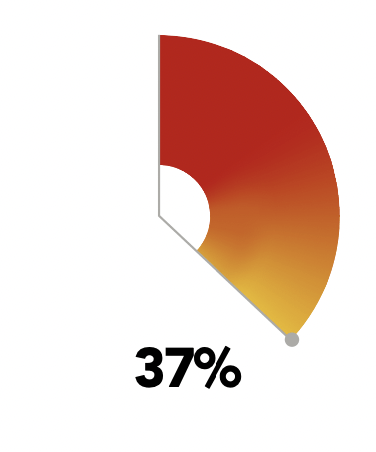

Indicate whether you are worried or not about each of the following topics
Total responses: “very worried” and “worried”
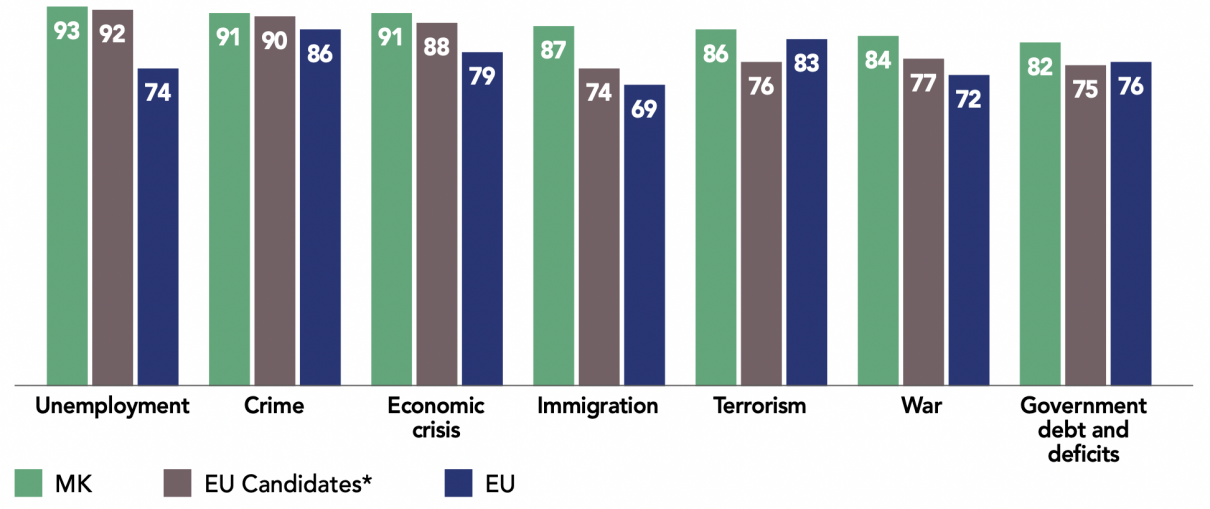
Copyright :
Fondation pour l’innovation politique/International Republican Institute – 2019
* The following countries fall into this category: Albania, Bosnia and Herzegovina, North Macedonia and Serbia.
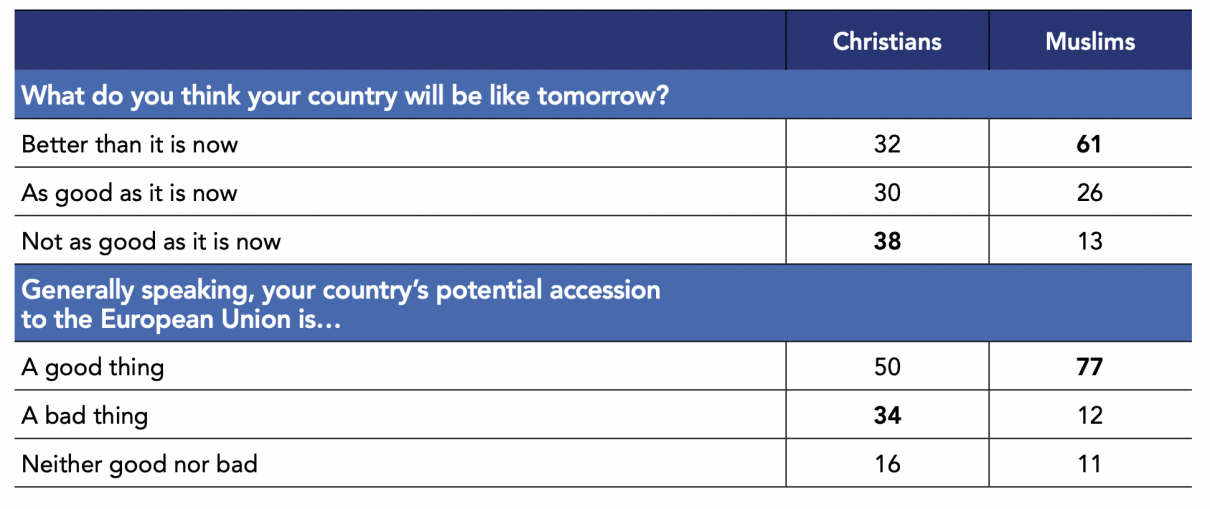
Copyright :
Fondation pour l’innovation politique/International Republican Institute – 2019
North Macedonia’s recent history has been marked by upheavals. The country found itself without a government after the December 2016 parliamentary elections and the crisis culminated in April when protestors at Parliament assaulted members of the Macedonian Social Democratic Union (SDSM) and the Democratic Union for Integration (UDI), who sought to form a new government. Following the establishment of a government led by the SDSM in May 2017, the country has regained political stability, and a series of legislative reforms have been passed.
According to the opinion of the respondents from our survey, the standard of living does not appear to have improved. According to most of them (53%), it has remained stable in recent years, while 22% believe that it has improved and 25% that it has deteriorated.
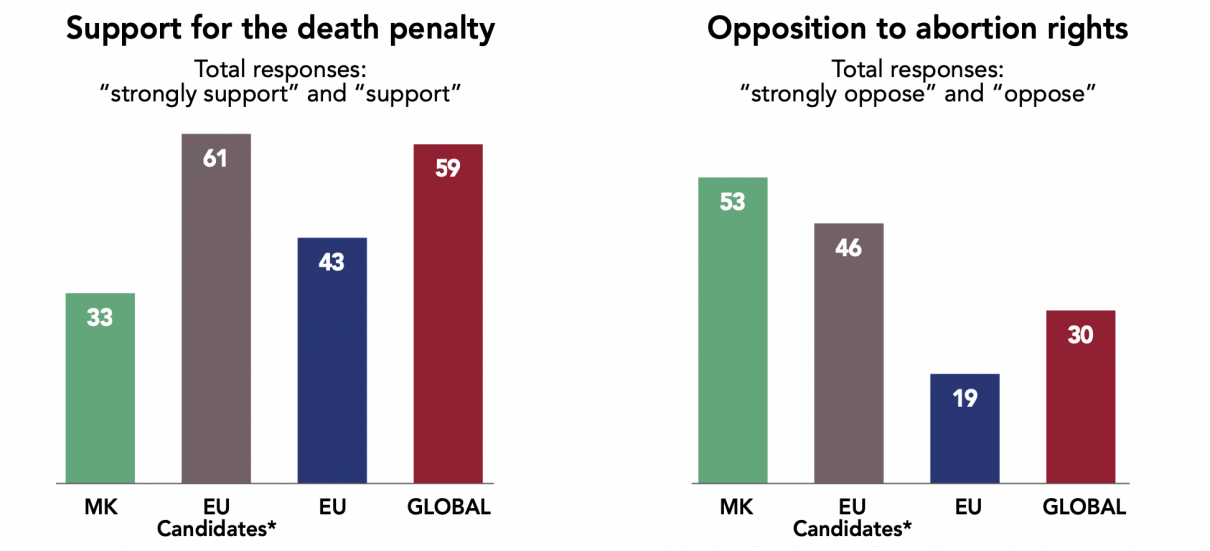
Copyright :
Fondation pour l’innovation politique/International Republican Institute – 2019
* The following countries fall into this category: Albania, Bosnia and Herzegovina, North Macedonia and Serbia.
Despite the perception of stagnating living standards, a significant share (42%) of the population believes that the country will be better than it is now in the future. This is well above the average of the 42 democracies surveyed (20%) and the average of the EU candidate countries (32%).
The results from questions related to democracy are mixed. Macedonians have more trust in democratic institutions such as the government (44%) and Parliament (42%) than the citizens of other EU candidate countries on average (29% and 27% respectively). Trust in political parties is well above the average in the EU candidate countries (31% vs 15%), but 46% say that “voting is pointless because politicians do not care about the will of the people”. The contradictions continue: while more Macedonians than the average of citizens from EU candidate countries prefer freedom even if it means less order (44% vs. 35%), more are also in favor of the armed forces (35% vs 25%) or “a strongman who does not have to worry about Parliament or elections” (61% vs 52%) leading the country.
Graham Scott
- 60% think their country’s potential accession to the European Union is a good thing.
- 37% consider that democracy works well in their country.
- 18% identify criminal organizations as the category holding most power their country.
Focus : Macedonians have a positive opinion of the European Union on the international stage because its posture is perceived as reassuring by most respondents (39%), compared to China (25%), Russia (28%) and the United States (31%). This is also higher than the global average of respondents to this survey (32%) and the average across EU candidate countries (38%). In addition, six out of ten Macedonians (64%) would like the European Union to have a common army.
Norway (NO)
Index of democratic culture
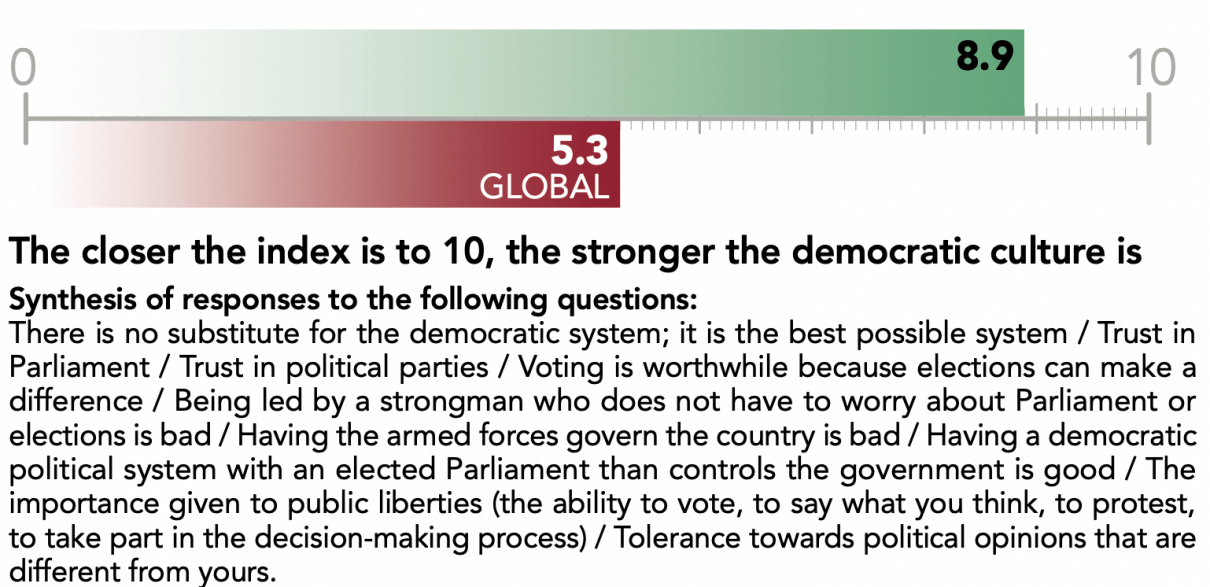
Copyright :
Fondation pour l’innovation politique/International Republican Institute – 2019
Democracy works well in my country
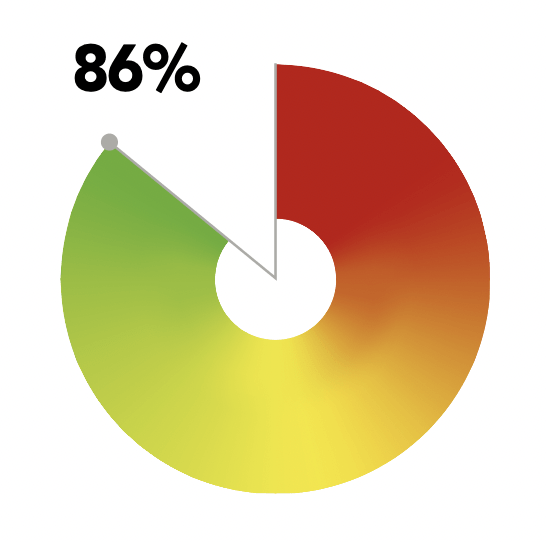

Indicate whether you are worried or not about each of the following topics
Total responses: “very worried” and “worried”
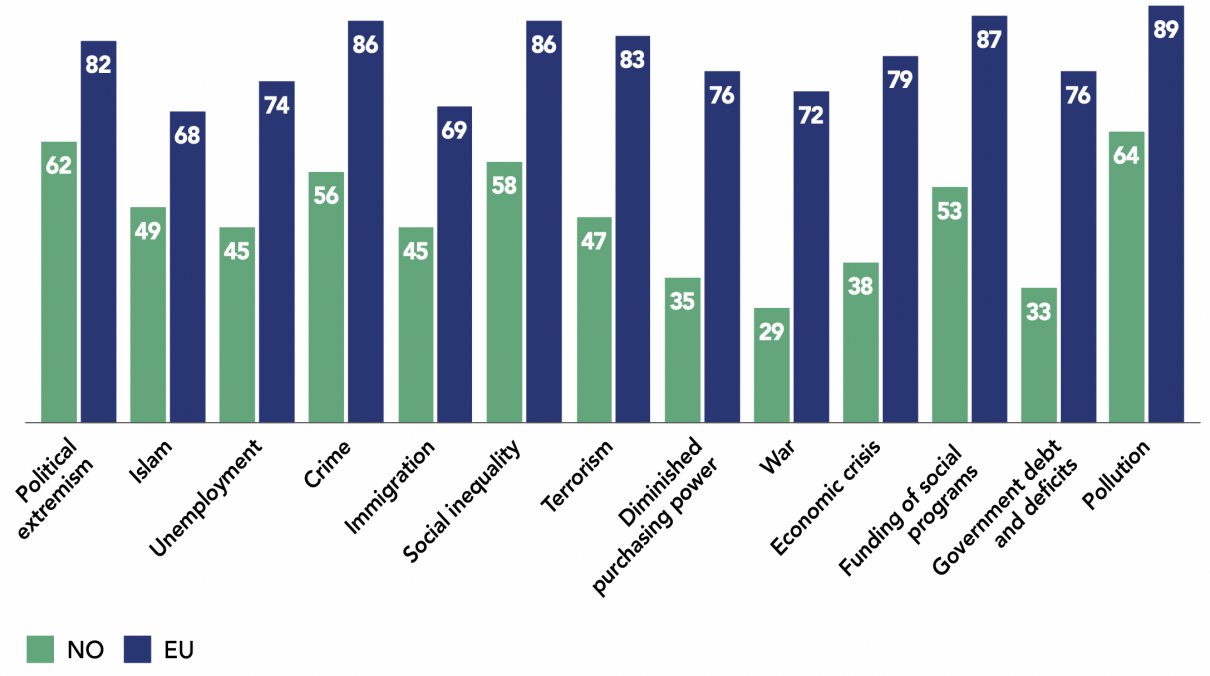
Copyright :
Fondation pour l’innovation politique/International Republican Institute – 2019
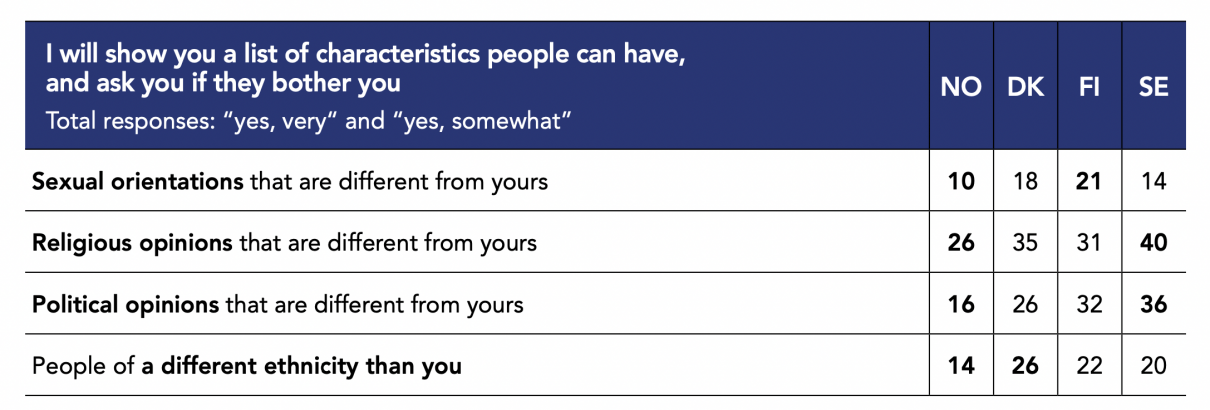
Copyright :
Fondation pour l’innovation politique/International Republican Institute – 2019
Norwegians are almost unanimously satisfied with the functioning of their democracy (86%). Such levels of contentedness can only be seen among the Swiss (88%) and the Luxembourgers (86%). This result is reflected in the trust that the Norwegians place in their democratic institutions, including their Parliament (73% versus 40% of respondents across the European Union) and their government (63% versus 34%). Similarly, most Norwegians (82%) say they trust their judicial system. This result is the highest of all the democratic countries in our survey.
Nevertheless, we note that young people seem less attached than their elders to the principles of democracy: 28% of respondents aged under 35 and, to a lesser extent, 21% of 35-59 year-olds believe that other political systems might be just as good as the democratic system, compared to only 7% of those aged 60 and older. More than one-third of young people (34%) and 22% of the 35-59 age group believe that it would be a good thing to be led by “a strongman who does not have to worry about Parliament or elections”. These figures are again higher than the percentage for older respondents (16%).
Generally speaking, would you say that:

Copyright :
Fondation pour l’innovation politique/International Republican Institute – 2019
See Glenn-Marie Lange, Quentin Wodon and Kevin Carey (ed.), The Changing Wealth of Nations 2018. Building a Sustainable Future, World Bank, 2018.
Identified as some of the richest citizens in the world by a World Bank report in 20181, only 12% of Norwegians believe their standard of living has gotten worse in recent years. This is the lowest rate among the 42 democracies in our survey. Boosted by a generous income from oil, Norway is an economically stable country, but this does not prevent a majority of Norwegians (53%) from expressing concern about the future financing of their social welfare system, though it should be noted that this concern is far more widespread among the citizens of the European Union (87%).
One of the most common areas of concern is Russia’s posture on the international stage. Three-quarters of the Norwegians surveyed (74%) expressed their concern about this topic. A natural result of the country’s geographical position and its role at the heart of the strategic struggle for oil reserves, this concern is reflected in Norwegians’ strong support for NATO (68%), of which the country is a founding member. Concerns about war, expressed by less than one-third (29%) of the population, are much less widespread in Norway than in the European Union on the whole (72%).
Raphaël Grelon
- 50% distrust the media.
- 74% oppose the death penalty.
- 81% consider that their lifestyle or way of life in their country is not threatened.
Focus: The migratory crisis affecting Europe has not spared Norway. Although a large majority of its population (71%) believe that it is their duty to welcome “refugees fleeing war and poverty” in their country, 45% of Norwegians are worried about immigration (compared to 55% of Swedes, 59% of Finns, 64% of Danes, and 69% of Europeans on average). Many Norwegians believe that they cannot let in more refugees because it poses problems of cohabitation due to a differences in values (40%), increased risk of terrorism (40%), impacts on the economy (48%) and increased risk of crime (51%).
Poland (PL)
Index of democratic culture
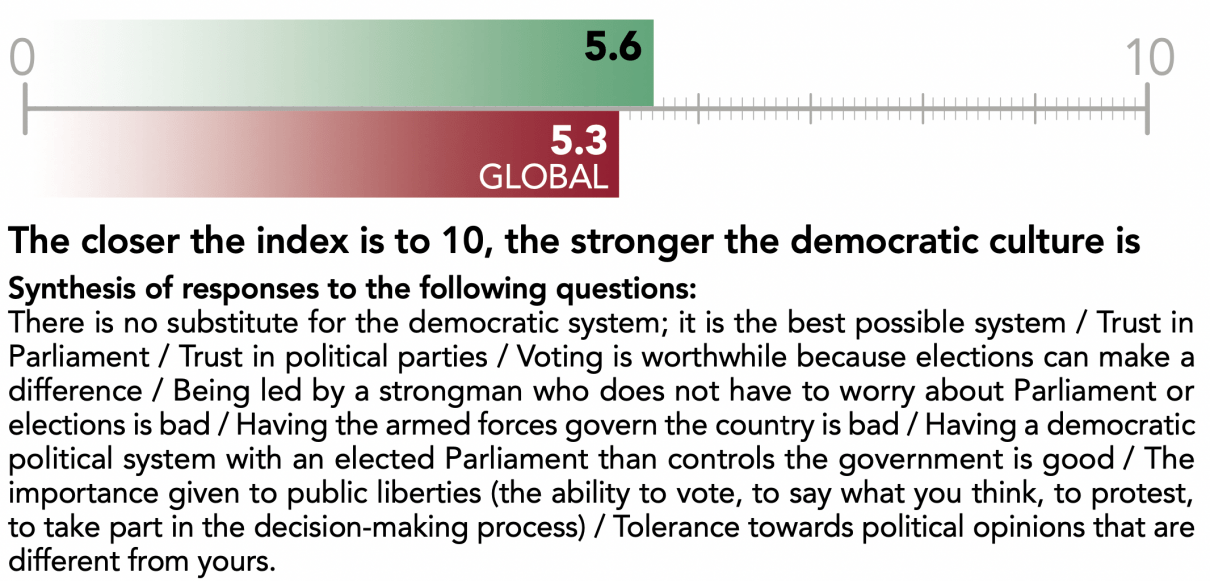
Copyright :
Fondation pour l’innovation politique/International Republican Institute – 2019
Democracy works well in my country
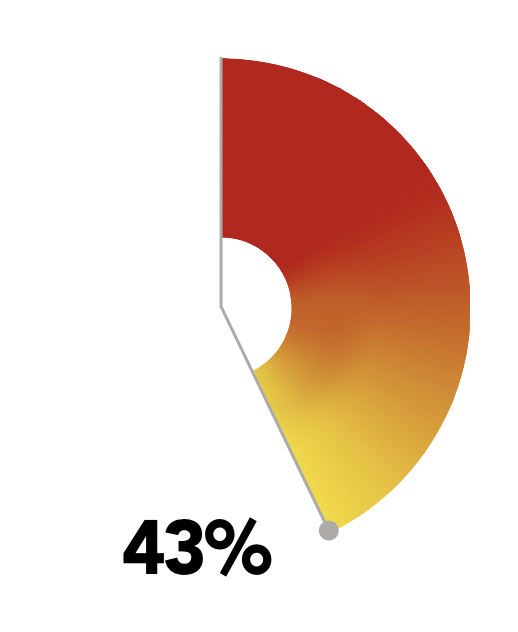

Do you support or oppose abortion rights?
Total responses: “strongly oppose” and “oppose”
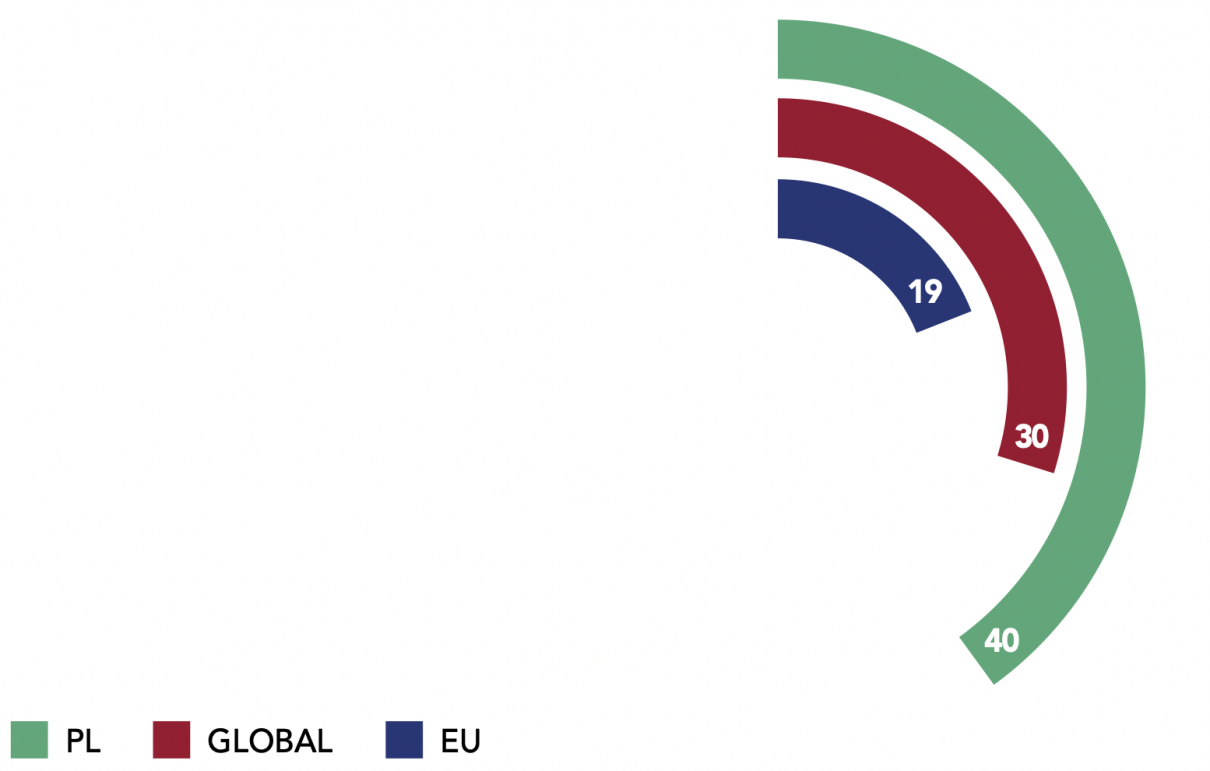
Copyright :
Fondation pour l’innovation politique/International Republican Institute – 2019

Copyright :
Fondation pour l’innovation politique/International Republican Institute – 2019
Since its victory in the 2015 elections, which gave president Jarosław Kaczyński’s Law and Justice Party (PiS) an absolute majority of seats in the Sejm (the lower house of the Polish Parliament), the government has been accused by its political opponents of breaking the law in the name of a particular idea of justice and pro-sovereignty democracy. A procedure under Article 7 of the Lisbon Treaty has been initiated against Poland. This action reflects the European institutions’ concern about a deviation which threatens the rule of law and democracy. In this context of a Poland which is extremely polarized on the eve of new elections, it is interesting to highlight a few salient trends that emerge from our survey.
Despite discussions about the authoritarian regression of the country, Poles are attached to voting because elections can make a difference (80%) and citizen participation in the decision-making process (98%). Similarly, only 23% of Poles feel it would be a good thing to be led by a strongman who does not have to worry about Parliament or elections (compared to 34% of Europeans on average) and only 15% are in favor of a military government (compared to an overall average of 21%). However, the survey revealed that the majority of Poles surveyed (57%) believe that democracy works poorly or very poorly in their country. This dissatisfaction with the functioning of democracy is accompanied by a lack of trust in its institutions.
Trust in institutions
Total responses: “entirely trust” and “somewhat trust”
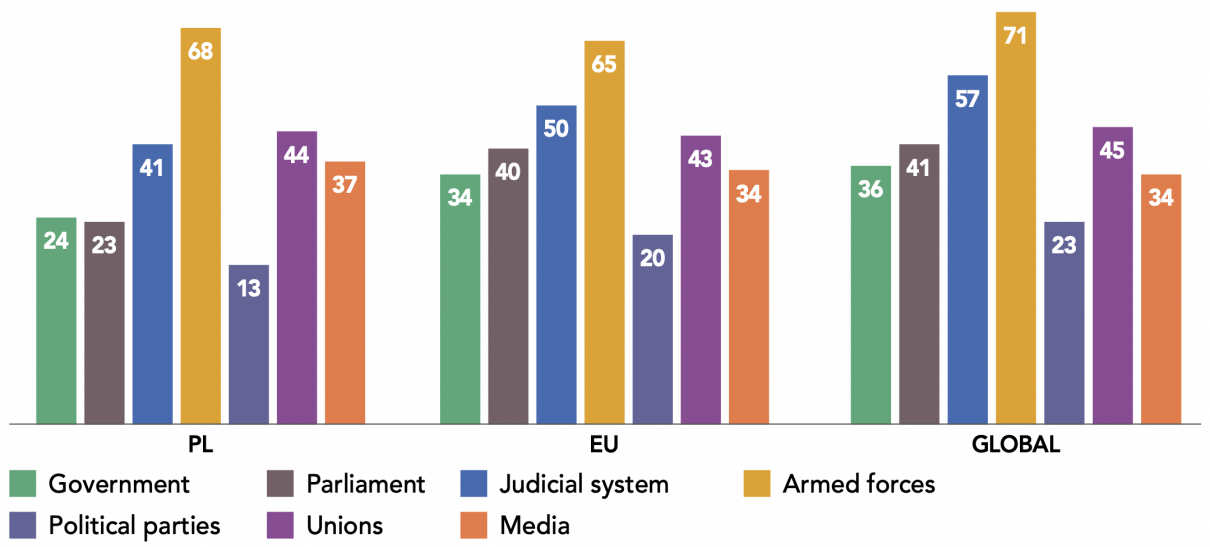
Copyright :
Fondation pour l’innovation politique/International Republican Institute – 2019
The following countries fall into this category: Bulgaria, Croatia, Czech Republic, Estonia, Hungary, Latvia, Lithuania, Poland, Romania, Slovakia and Slovenia.
One of the most interesting results of the survey is the confirmation of a pro-European sentiment which still prevails at a time when a struggle for power is underway between Brussels and Warsaw. Most Poles (54%) trust the European Parliament (versus 45% on average in the European Union) and the European Commission (versus 43% on average). Similarly, almost half of the Poles surveyed (48%) believe that the European Union strengthens their democracy. Moreover, older generations (60 and over) are more likely to see membership of the European Union as a good thing compared to those aged under 35 (75% versus 52%).
Jacques Rupnik
- 63% think their country’s membership of the European Union is a good thing.
- 78% are worried about Islam.
- 52% prefer more order even if it means less freedom.
Focus : In terms of foreign and security policy, Poles are more concerned about Russia’s international posture on the international stage vis-à-vis its neighbors (77% versus 63% across former communist Member States1) but less concerned about the posture of the United States than the European average (32% versus 63%). Moreover, 63% of Poles consider NATO membership to be a good thing, yet a significant gender gap emerges on this question: 72% of men agree compared to 55% of women.
Portugal (PT)
Index of democratic culture
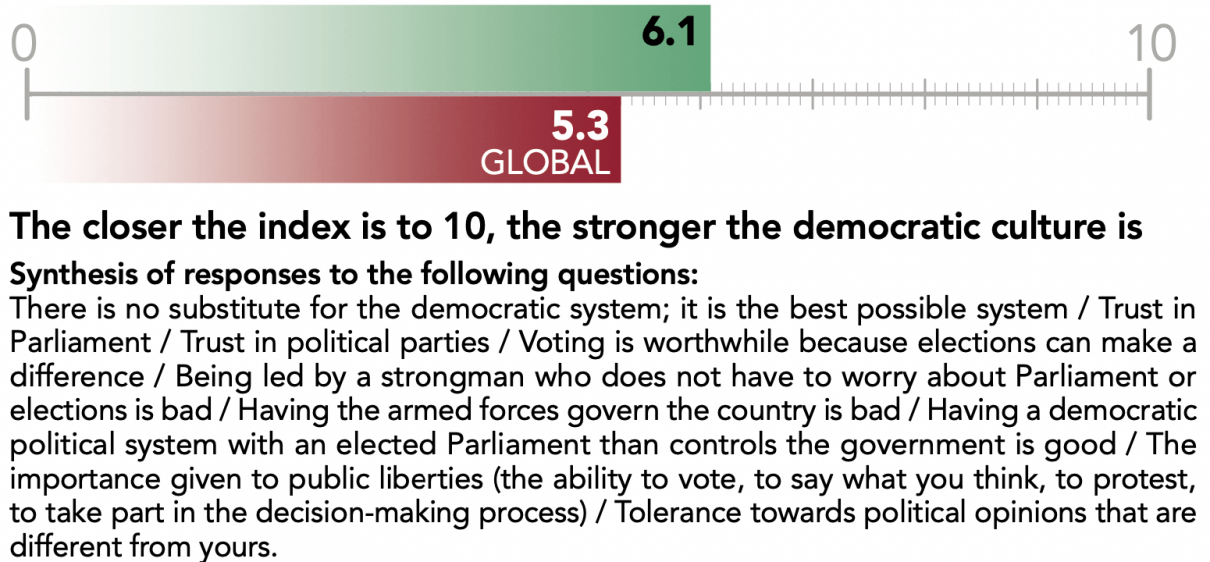
Copyright :
Fondation pour l’innovation politique/International Republican Institute – 2019
Democracy works well in my country
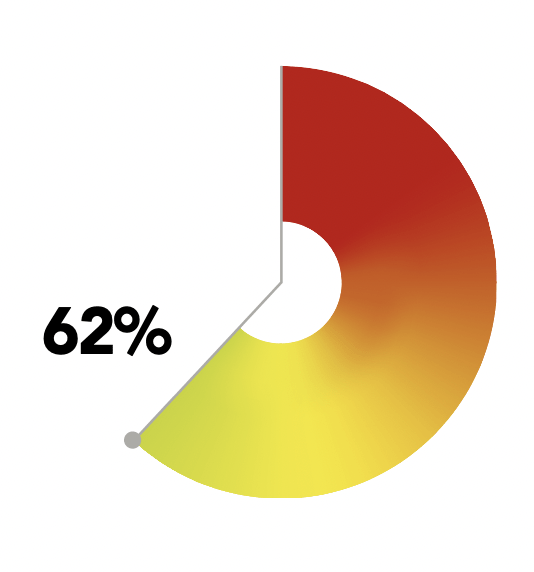

What do you think your country will be like tomorrow?
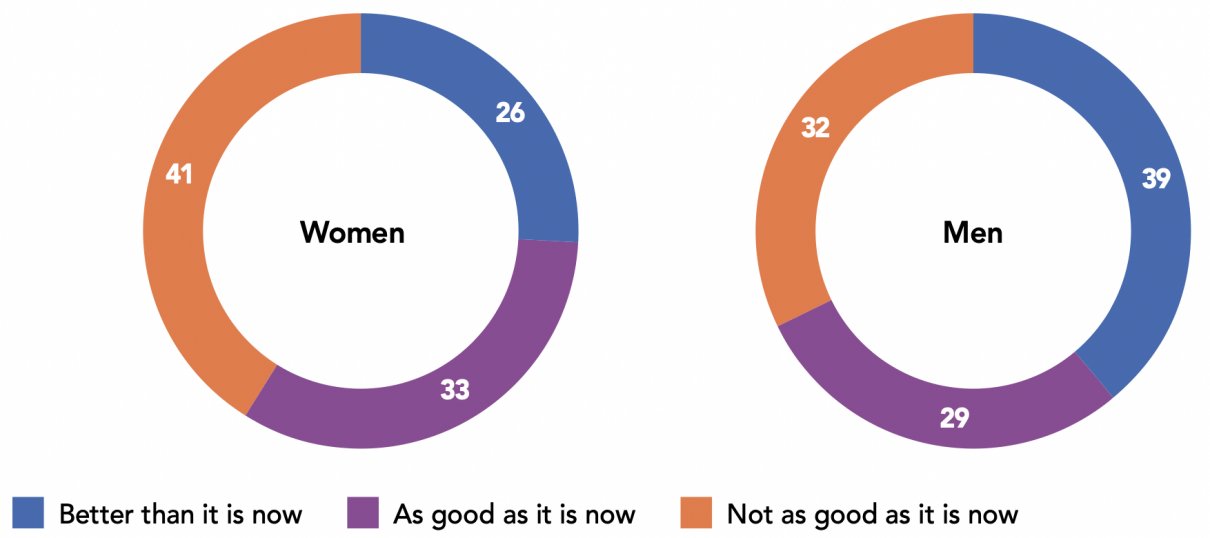
Copyright :
Fondation pour l’innovation politique/International Republican Institute – 2019
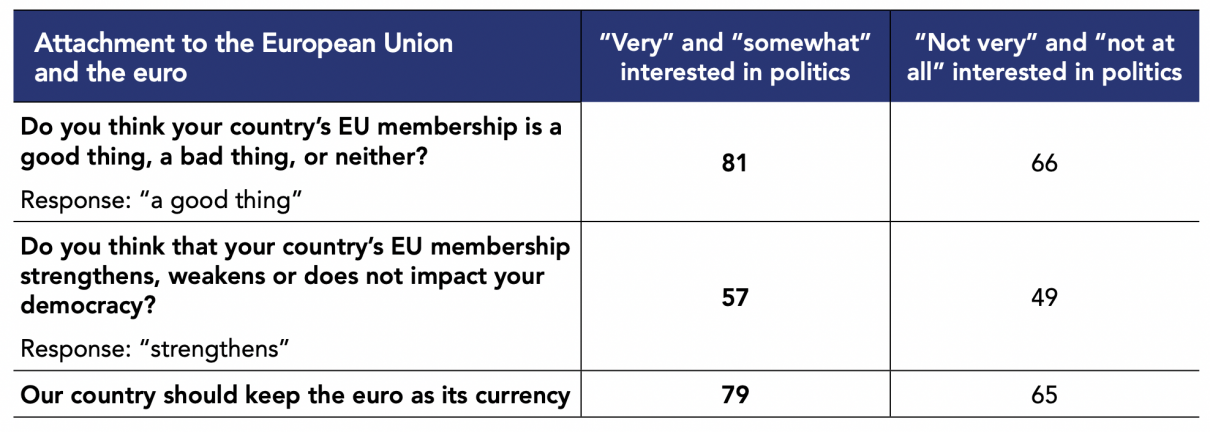
Copyright :
Fondation pour l’innovation politique/International Republican Institute – 2019
According to this study, 62% of the Portuguese believe that democracy is working well in their country, 12 points higher than the average for the countries of the European Union. The Portuguese also appear to be, in the European Union, among the populations most attached to the democratic values of openness: equality between men and women (97%), feeling free to express themselves (81%) and the usefulness of voting (80%).
We cannot let in more refugees because we do not share the same values and that makes it hard to live alongside one another
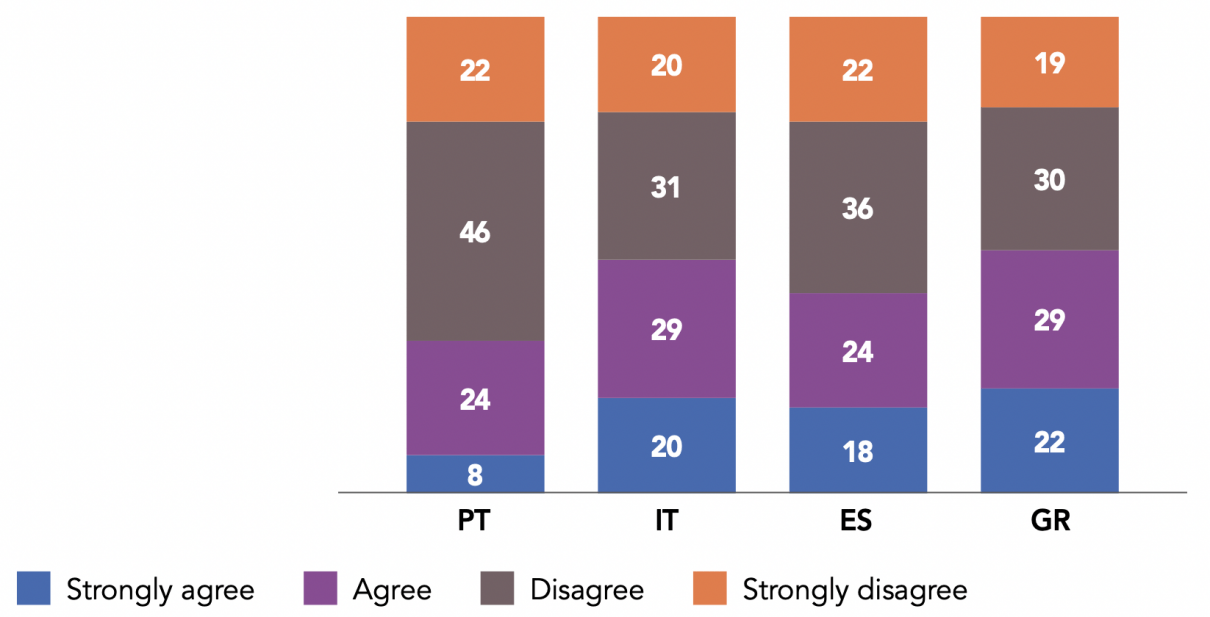
Copyright :
Fondation pour l’innovation politique/International Republican Institute – 2019
This survey also shows that three out of ten Portuguese people (31%) feel there has been an improvement to their standard of living, which is higher than that of their Spanish (16%) or French neighbors (13%). At an extreme low during the eurozone debt crisis in 2011, Portugal was forced to resort to a €78 billion bailout plan. The country is currently experiencing one of the best growth rates in the eurozone (+2.7% in 2017). The unemployment rate also fell below 7% in 2018, well below the 17% peak reached in 2013.
Nevertheless, only one-third of the Portuguese state that they trust their government (33%) and their Parliament
(36%), while far more say that they trust the European Parliament (50%) and the European Commission € (51%). The Portuguese are among those most in favor of European integration. A large majority believes
that their membership of the European Union is a good thing (72%); a smaller majority believes that their
EU membership strengthens democracy in their country (52%). Attachment to the euro is very strong (70%),
even more so when compared to other states that also benefited from a European aid plan during the crisis,
such as Italy (54%) and Greece (50%).
The country still has much work to do to heal the scars left behind by the economic crisis. The resurgence of an economic crisis (91%) or issues with the country’s deficit and debt (84%) are the focus of Portuguese respondents’ concerns. They are also more worried than the rest of Europeans about social inequalities (91% versus 86%), diminished purchasing power (88% versus 76%) and unemployment (88% versus 74%). Lastly, the situation of retirees remains worrisome, since 35% believe that their standard of living has gotten worse (compared to 29% in Spain and Italy).
Raphaël Grelon
- 72% think their country’s membership of the European Union is a good thing.
- 70% wish to keep the euro as their currency.
- 78% see globalization as an opportunity.
Focus : The optimism shown by the Portuguese is well above the average for other inhabitants of the European Union: more than two-thirds of the Portuguese (68%) feel that their lifestyle or the way of life in their country is not threatened (46% European Union average) and almost one-third (32%) believe that their country will be better than it is now in the future (15% European Union average).
Romania (RO)
Index of democratic culture
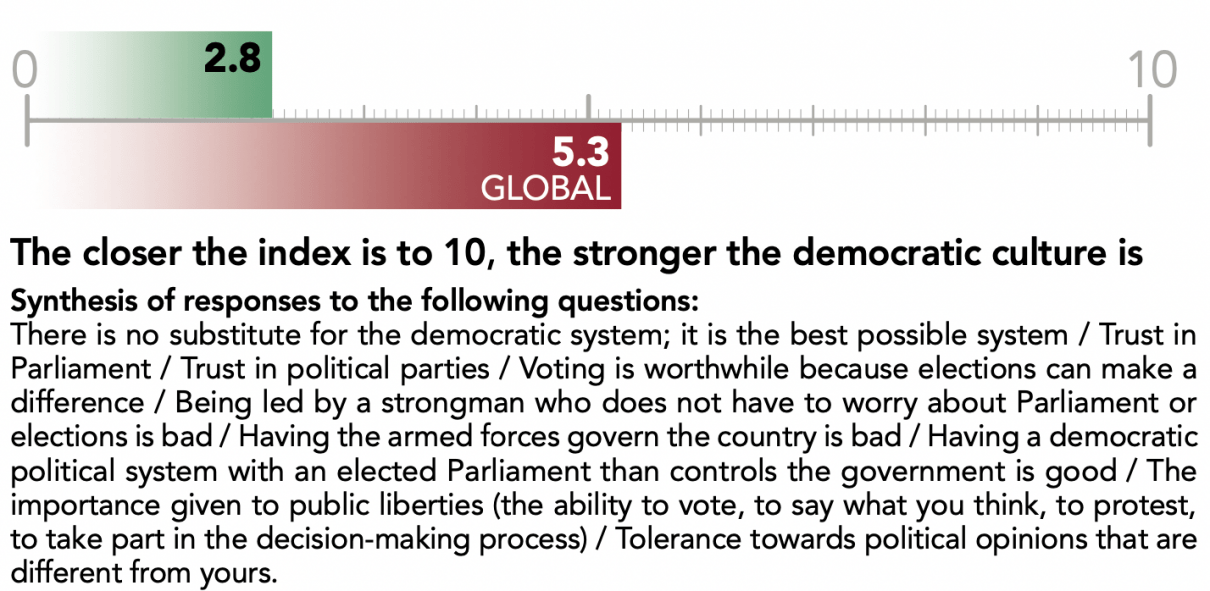
Copyright :
Fondation pour l’innovation politique/International Republican Institute – 2019
Democracy works well in my country
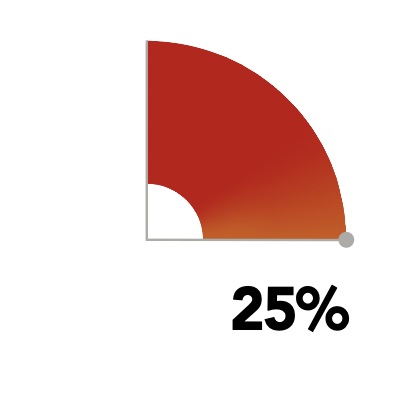

Your country’s membership in a military alliance with the United States (NATO) is…
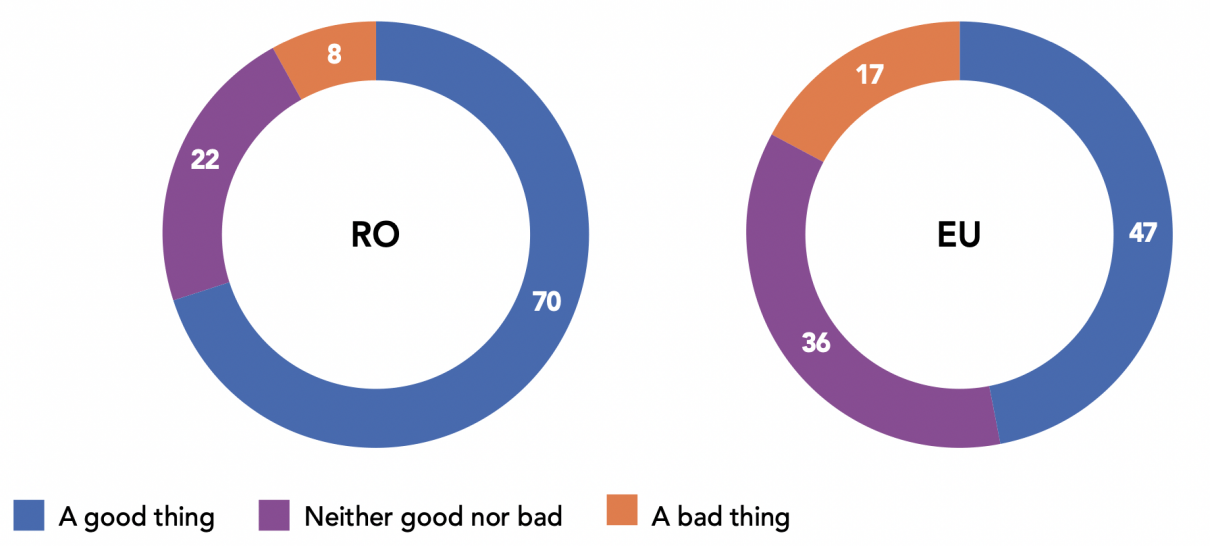
Copyright :
Fondation pour l’innovation politique/International Republican Institute – 2019
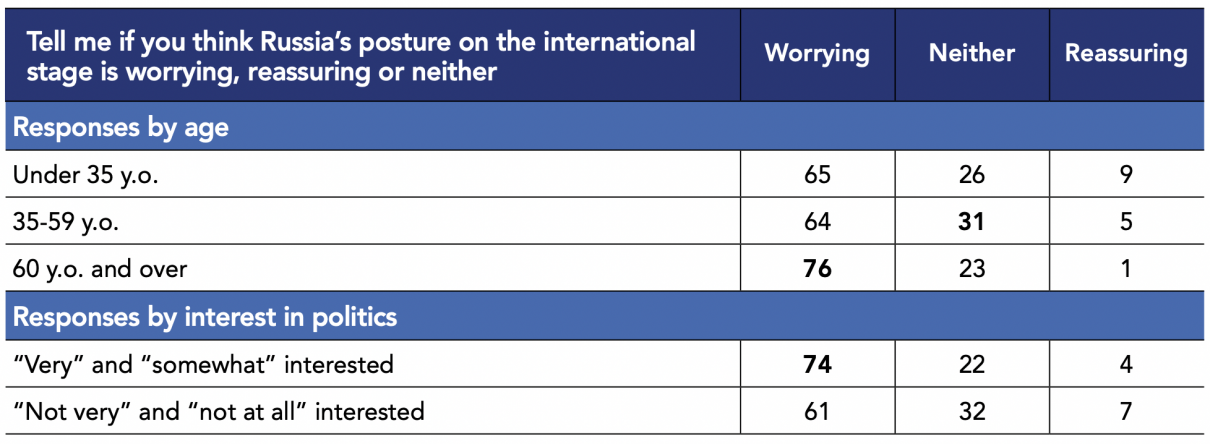
Copyright :
Fondation pour l’innovation politique/International Republican Institute – 2019
Romania has recently experienced anti-government demonstrations on a scale not seen since the fall of communism. The main reason for these is the adoption, with a serious lack of transparency, of an emergency decree to protect politicians from certain prosecutions. Our survey reveals a significant level of mistrust in the government: only a quarter (25%) of Romanians believe that democracy is working well in their country, compared to 50% across all European Union countries. Moreover, a very large majority (85%) of respondents do not trust the government.
The vote is perceived by almost half (45%) of the population to be pointless because “politicians do not care about the will of the people”. At the same time, many Romanians (42%) are convinced that it is the politicians, and not the elected representatives (14%) or the intellectual elite (2%), who hold the most power in their country. As shown in the graph below, the degree of distrust in the political institutions is very high.
Distrust in institutions
Total responses: “entirely distrust” and “distrust”
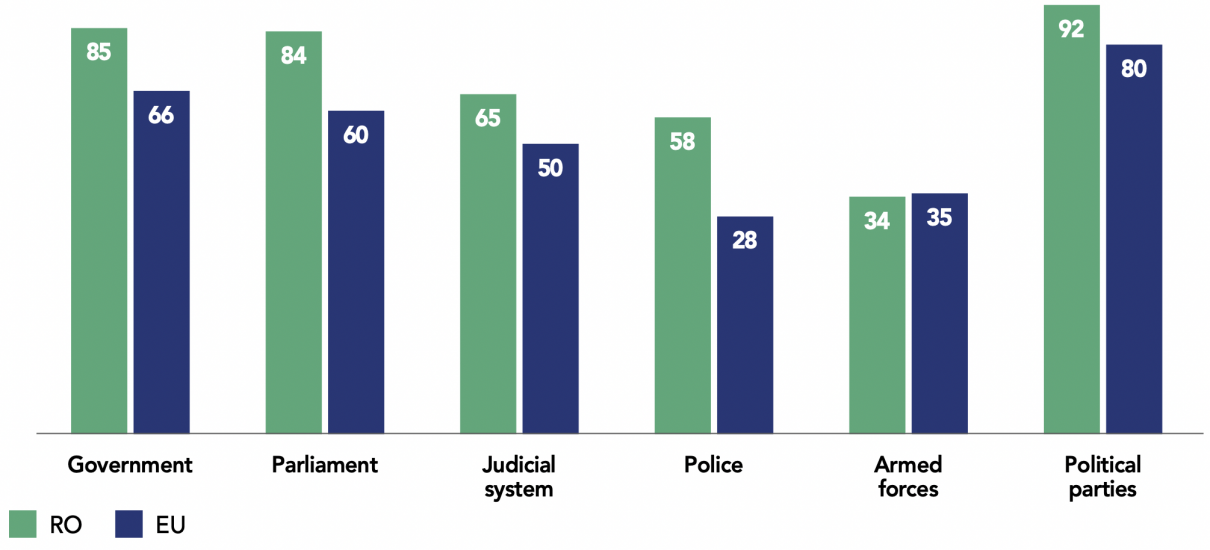
Copyright :
Fondation pour l’innovation politique/International Republican Institute – 2019
Romanians are open to alternative modes of governance: more than half (57%) of the citizens are in favor of the country being led by “a strongman who does not have to worry about Parliament or elections” and 80% consider that a government of experts is a good thing. The results of the survey nevertheless indicate that Romanians still believe in the role of an elected Parliament to control the government (83%). While respondents prefer order to freedom (71%), most (87%) feel it is important to be able to “protest, march in the streets and dissent”.
Membership of the European Union (58%) is seen positively by Romanians. In addition, almost half (49%) of respondents believe that membership of the European Union strengthens democracy in their country (compared to 36% across the European Union as a whole). A large majority (69%) of Romanians support the creation of a European army and 70% think that being a member of NATO is a good thing.
Violeta Alexandru
- 58% think their country’s membership of the European Union is a good thing.
- 59% think that the role of the government in the economy should be limited and the freedom of enterprises should be strengthened.
- 68% find Russia’s posture on the international stage worrying.
Focus : According to the results of our survey, Romanians are very pessimistic about their future. Nearly two- thirds (61%) state that their country’s situation will not be as good in the future as it is today, which is 11 points higher than the European average (50%).
Serbia (RS)
Index of democratic culture
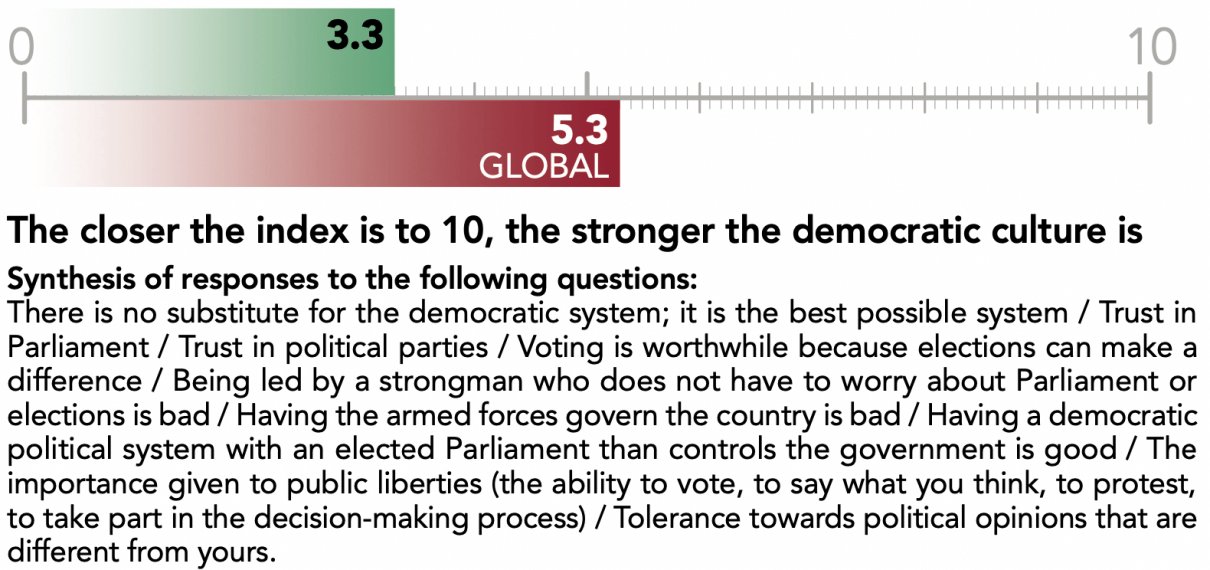
Copyright :
Fondation pour l’innovation politique/International Republican Institute – 2019
Democracy works well in my country
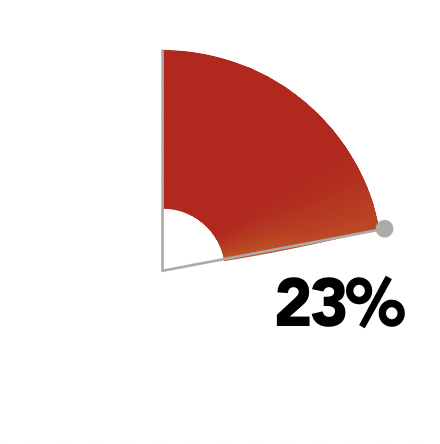

Trust in institutions
Total responses: “entirely trust” and “somewhat trust”
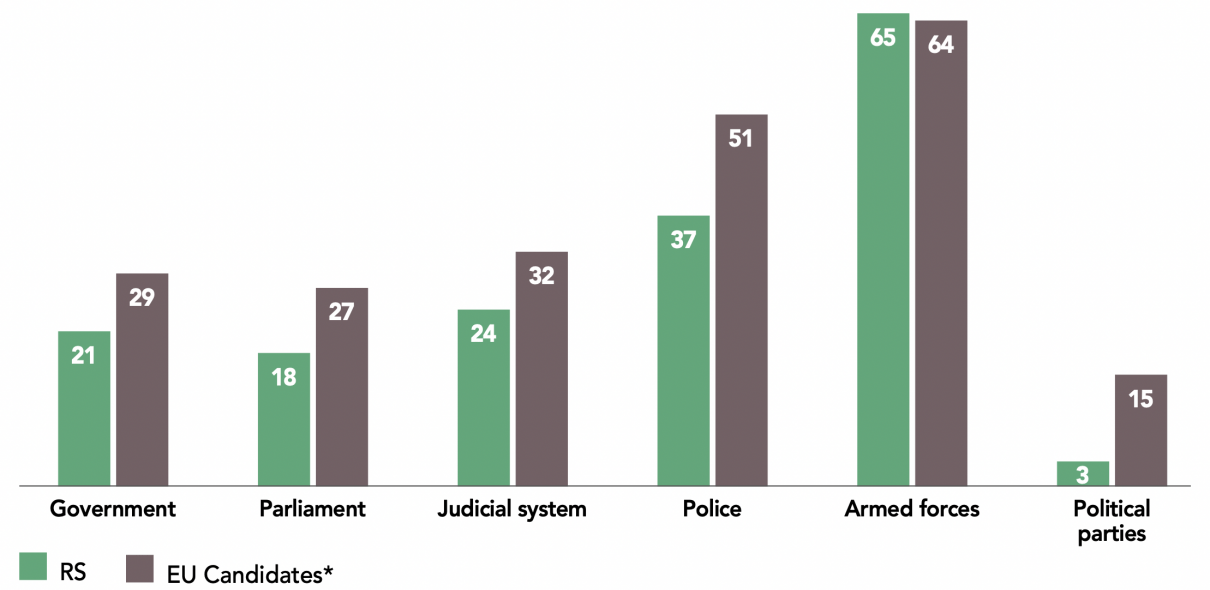
Copyright :
Fondation pour l’innovation politique/International Republican Institute – 2019

Copyright :
Fondation pour l’innovation politique/International Republican Institute – 2019
* The following countries fall into this category: Albania, Bosnia and Herzegovina, North Macedonia and Serbia.
The Serbs seem to be relatively attached to democratic ideals. The vast majority believe that the ability to protest, march in the streets and dissent (86%), to participate in decision-making (96%), to vote (97%), and the right to freedom of expression (98%) are essential for democracy. They are very much in favor of a parliamentary system (89%) compared to other options, such as having at their head “a strongman who does not have to worry about Parliament or elections” (60% are against it, compared to an average of 48% in the EU candidate countries) or living under a military regime (81% versus 75%).
However, the Serbs have little faith in the democratic system, since more than three quarters (77%) of them claim that democracy is working poorly in their country. Most (57%) do not consider their country’s electoral process transparent, more than half say that “voting is pointless because politicians do not care about the will of the people” (54%) and the same percentage believe that “other political systems might be just as good as the democratic system” (54%).
Do you support or oppose the death penalty?
Total responses: “strongly support” and “support”

Copyright :
Fondation pour l’innovation politique/International Republican Institute – 2019
* The following countries fall into this category: Albania, Bosnia and Herzegovina, North Macedonia and Serbia.
Why do Serbs have so little faith in their democracy? Either because the democratic system in force has not brought concrete results for the population, or because the voters expect specific political positions or choices that the politicians are not taking into account. More than half of Serbs feel that their standard of living has deteriorated in recent years (51%), nearly two thirds believe that their lifestyle is under threat (61%) and 52% believe that their country will be “not as good as it is now” in the future.
Furthermore, 45% of Serbs believe that being part of the European Union would be neither good nor bad, and 22% are opposed to it. On the question of who holds power in their country, the vast majority of them answer politicians (46%), criminal organizations (15%), rich people (14%) or elected representatives (9%). Out of this list, however, only elected representatives are democratically responsible, unlike political leaders or foreign interests that serve their own interests. Only 1% of respondents claim that “the people” hold power. The results of the survey suggest that while Serbs are pro-democracy in principle, they reject the idea of a democratic government because of a failure of governance and representation.
Paul Prososki
- 33% think that a potential accession in the European Union is a good thing.
- 70% would not like to see the European Union form a joint army for all Member States.
- 69% declare not being interested in politics.
Focus : In general, Serbs express a spirit of tolerance. A very large majority think that men and women are equal (87%), although this is 6 points lower than the general average for the 42 democracies surveyed (93%). Moreover, nine out of ten (93%) respondents declare not being bothered by people of different origins (versus 84% for the 42 democracies surveyed), and 90% do not care about religious opinions different from their own, 12 points higher than the general average (78%). Sexual orientations different from theirs are the difference that bothers Serbs the most (67%). By comparison, 77% of respondents of the 42 countries surveyed say they are not bothered by people with different sexual orientations.
Slovakia (SK)
Index of democratic culture
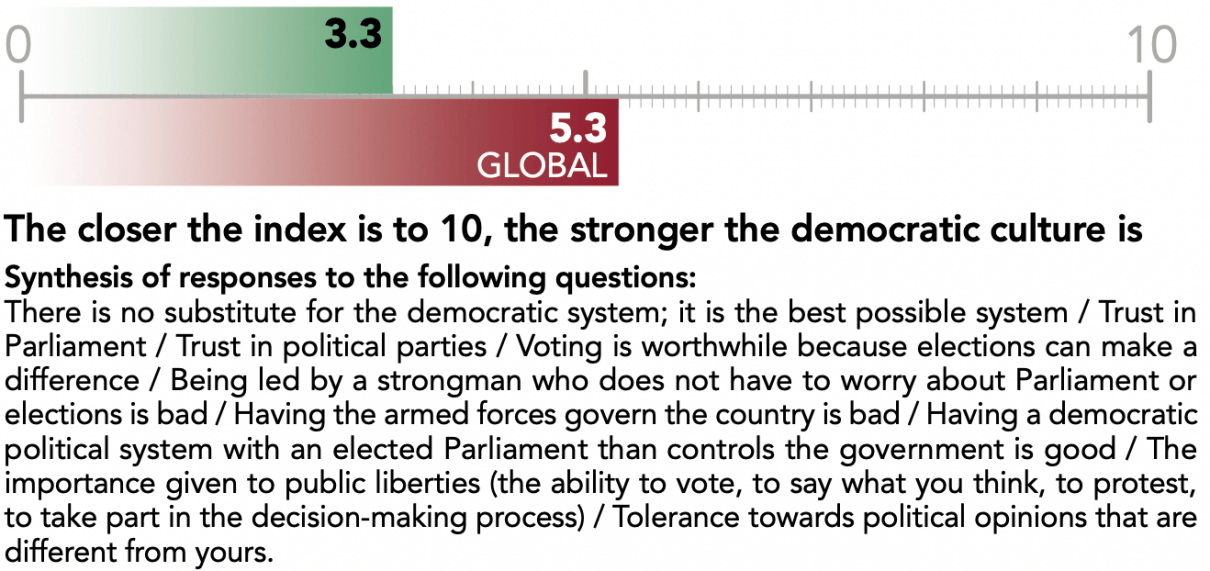
Copyright :
Fondation pour l’innovation politique/International Republican Institute – 2019
Democracy works well in my country
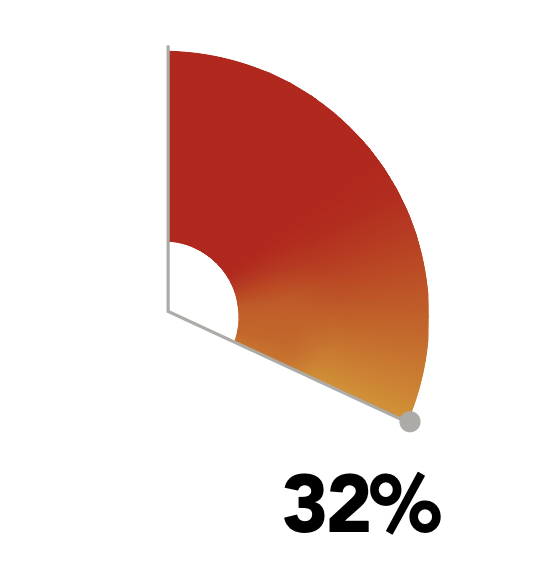

Indicate whether you are worried or not about each of the following topics
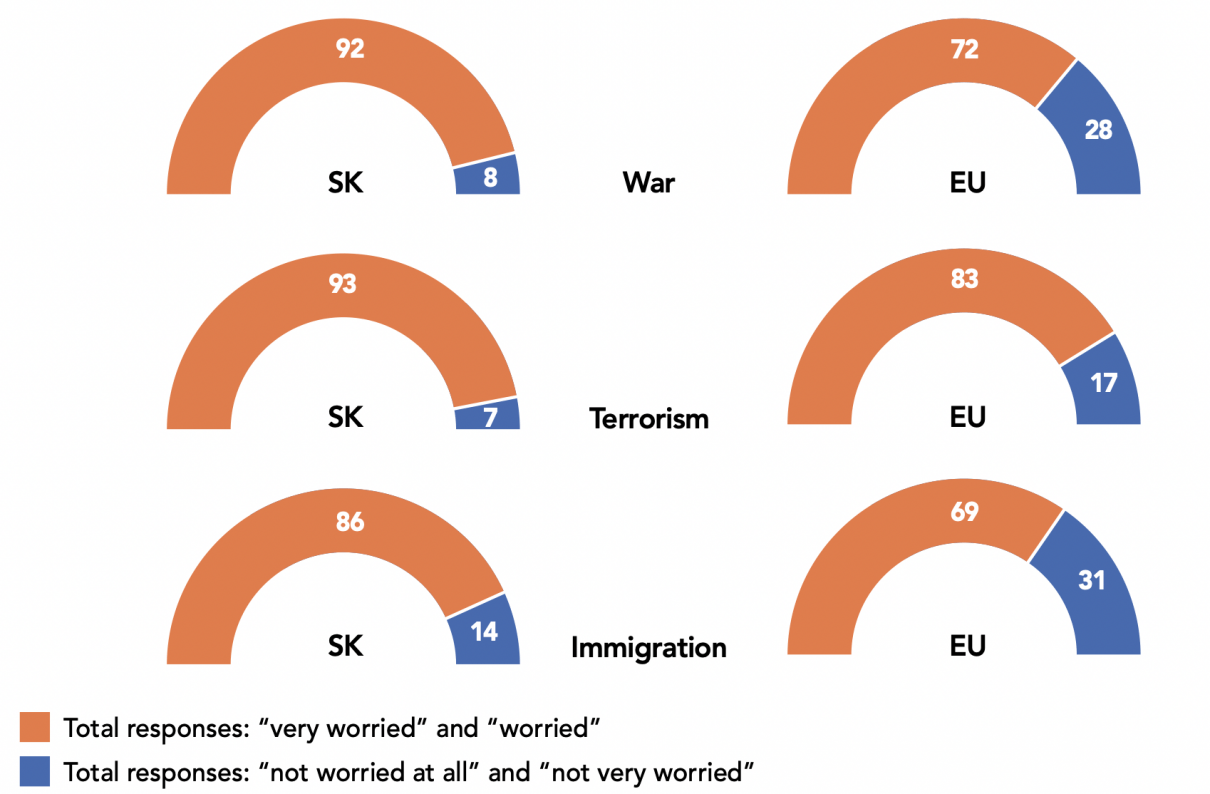
Copyright :
Fondation pour l’innovation politique/International Republican Institute – 2019

Copyright :
Fondation pour l’innovation politique/International Republican Institute – 2019
See “Ján Kuciak’s last story: Italian mafia’s tentacles reach into Slovak politics”, politico.eu, February 28th 2018.
To understand the results of our survey on Slovakia, it is important to understand the context. During 2018, the country experienced a major political crisis following the assassination of an investigative journalist, Ján Kuciak, who was too zealous in investigating the misuse of European funds by the leaders of a region with, it seems, the involvement of the Italian Mafia1. Peaceful protests in the capital of Bratislava forced the resignation of the Interior Minister and then the Prime Minister and leader of the populist SMER party Robert Fico. The police and the judicial system, deemed inefficient or corrupt, were among the targets of the protesters’ criticisms, hence the distrust they inspire.
Trust in institutions
Total responses: “entirely trust” and “somewhat trust”
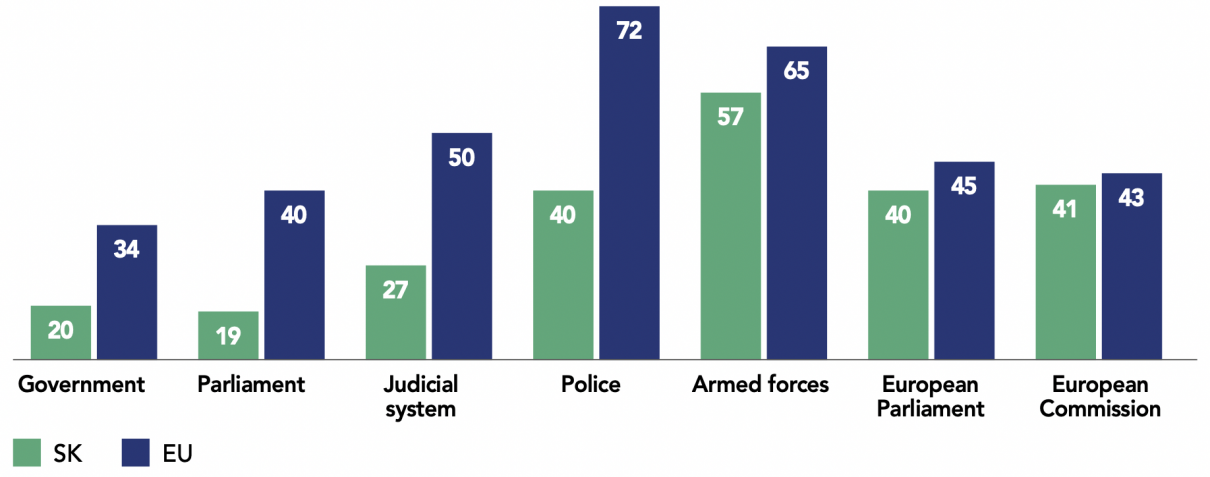
Copyright :
Fondation pour l’innovation politique/International Republican Institute – 2019
Slovakia shares with other Central European countries many traits related to the crisis of trust in certain institutions of representative democracy and a reluctance to accept migrants. Indeed, more than two-thirds (68%) of Slovaks believe that democracy is working poorly, data which correlates with the very low levels of trust in institutions essential to this political regime. Slovaks are open to alternative modes of governance: half would not be hostile to the power of a “strongman” (51%) and 86% think that a government of experts would be the right solution to the poor functioning of democracy.
It is on issues related to refugees that we find strong outliers, with 64% of Slovaks objecting to the “duty to welcome” refugees, the opposite proportion to the European Union average (38%). Following on from this question, 80% of them believe that the problem of possible cohabitation with newcomers is linked to the fact that they “do not share the same values”, compared to 53% for the European Union average. Likewise, societal pluralism and tolerance no longer apply when it comes to Islam. This religion is of concern to 84% of respondents, 16 points above the already very high EU average (68%).
In their perception of the international stage, Slovaks clearly differ from their neighbors in the Visegrád Group in their greater concern about the international posture of the United States: the world’s leading power worries 70% of Slovaks, versus 49% of Czechs, 44% of Hungarians, and 32% of Poles. Only one-third (36%) are concerned about Russia’s influence, compared to 77% of Poles, 56% of Hungarians and 51% of Czechs.
Jacques Rupnik
- 43% think their country’s membership of the European Union is a good thing.
- 62% wish to keep the euro as their currency.
- 31% think their country’s EU membership strengthens their democracy.
Focus : The Slovaks’ assessment of the European institutions seems more positive than their assessment of their national institutions: 41% trust the European Commission and 40% the European Parliament, compared to 20% for their government and 19% for their Parliament.
Slovenia (SI)
Index of democratic culture
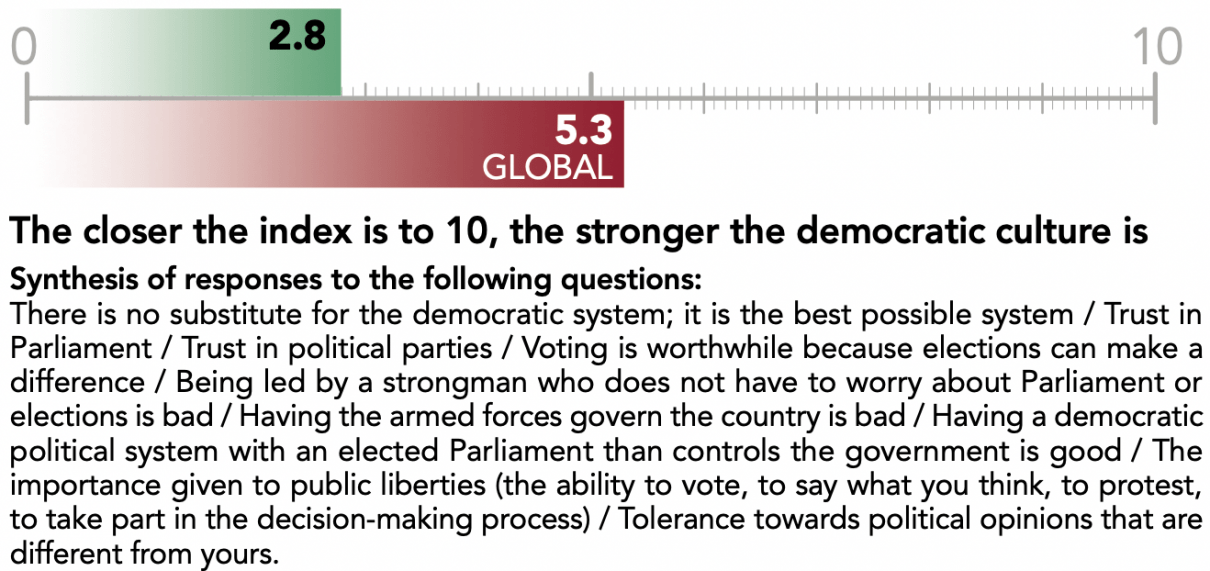
Copyright :
Fondation pour l’innovation politique/International Republican Institute – 2019
Democracy works well in my country
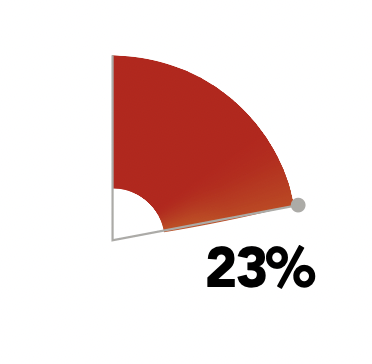

Which of the following powers is the most influential in the world?
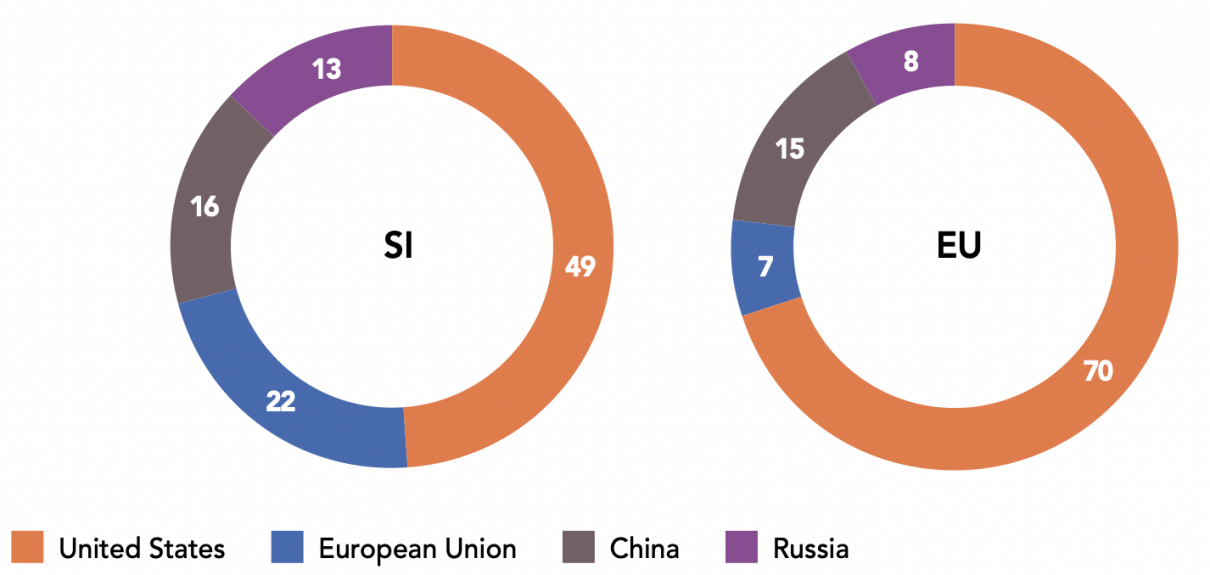
Copyright :
Fondation pour l’innovation politique/International Republican Institute – 2019
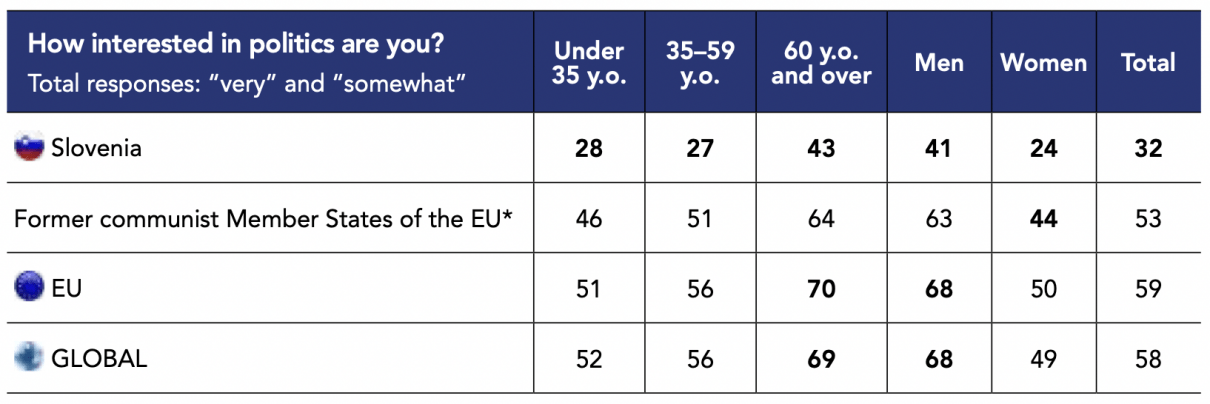
Copyright :
Fondation pour l’innovation politique/International Republican Institute – 2019
In the age of the rise of populism and “illiberal” democracies, Slovenia, known for its political moderation, is no longer an exception. After a campaign driven by anti-migrant nationalism, the Slovenian Democratic Party (SDS) gained the highest share of the vote in the 2018 general election.
With 77% of its citizens believing that democracy works poorly in their country, Slovenia ranks second, on par with Brazil and Serbia, and behind Croatia (81%), among the 42 democracies surveyed with regards to the dissatisfaction of the population with their democratic system. Another worrying indicator, up to 58% of Slovenians believe that “voting is pointless because politicians do not care about the will of the people”, just behind Croatia at 64% (34% across the European Union as a whole and 35% in the former communist countries that are now members of the European Union). Although 86% of Slovenians continue to believe that “having a democratic political system with an elected Parliament that controls the government” is a good thing, a majority (54%) consider that having “a strongman who does not have to worry about Parliament or elections” leading the country is a good way to govern (compared to 34% across the EU and 40% in the former communist countries that are now members of the EU).
We cannot let in more refugees because…
Total responses: “strongly agree” and “agree”
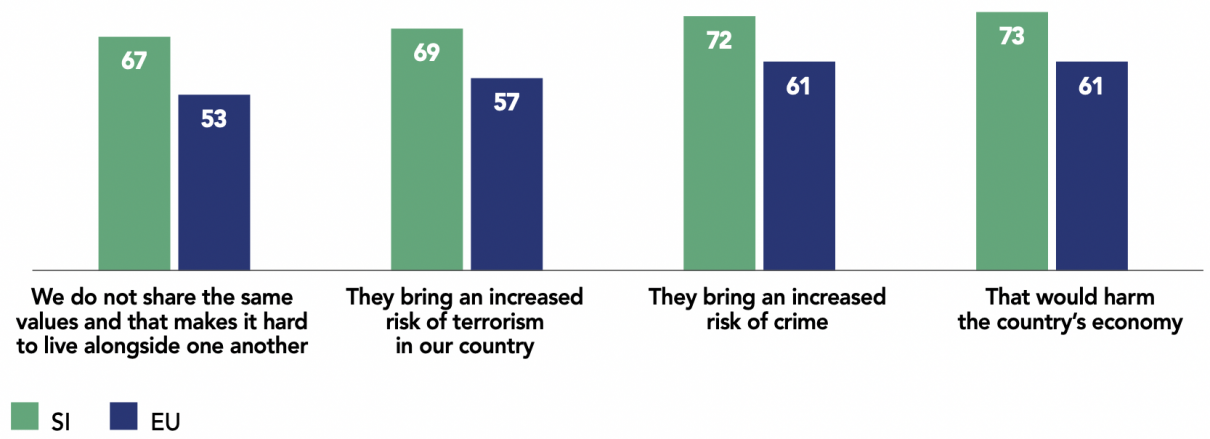
Copyright :
Fondation pour l’innovation politique/International Republican Institute – 2019
n Slovenia, the general disappointment with democracy is measured by the volatility of voters who, in the last three elections, preferred to support popular figures who had founded their party only a few months, if not a few weeks, before the elections. This is illustrated by the very low level of trust in political parties (9%) and national institutions in general, compared to the average in the European Union: more than three quarters of Slovenians are distrustful of their government (78% versus 66%), their Parliament (79% versus 60%), the religious authorities (87% versus 76%), and 71% do not trust the judicial system (versus 50% in the EU). Among the political institutions, only the police (65%) and the armed forces (54%) inspire relative trust.
Trust in the European institutions has also deteriorated. More than one-third (38%) of Slovenians believe that being a member of the European Union weakens democracy in their country and 31% believe that the United Kingdom will be better off without the European Union. At the same time, 70% do not trust the European Parliament and the European Commission. Moreover, only 34% of Slovenians feel that being part of NATO is “a good thing”, which is the lowest percentage from among the NATO members.
Ožbej Peterle
- 36% think their country’s membership of the European Union is a good thing.
- 63% wish to keep the euro as their currency.
- 55% would say that the number of democratic countries in the world is declining.
Focus : Slovenians’ distrust of Amazon is 20 points higher than the European Union average (58% versus 37%). Slovenia is one of the few countries where companies cannot use the online platform to sell their products because Amazon’s activities still do not comply with national legislation on the prevention of money laundering and financing of terrorism.
Spain (ES)
Index of democratic culture
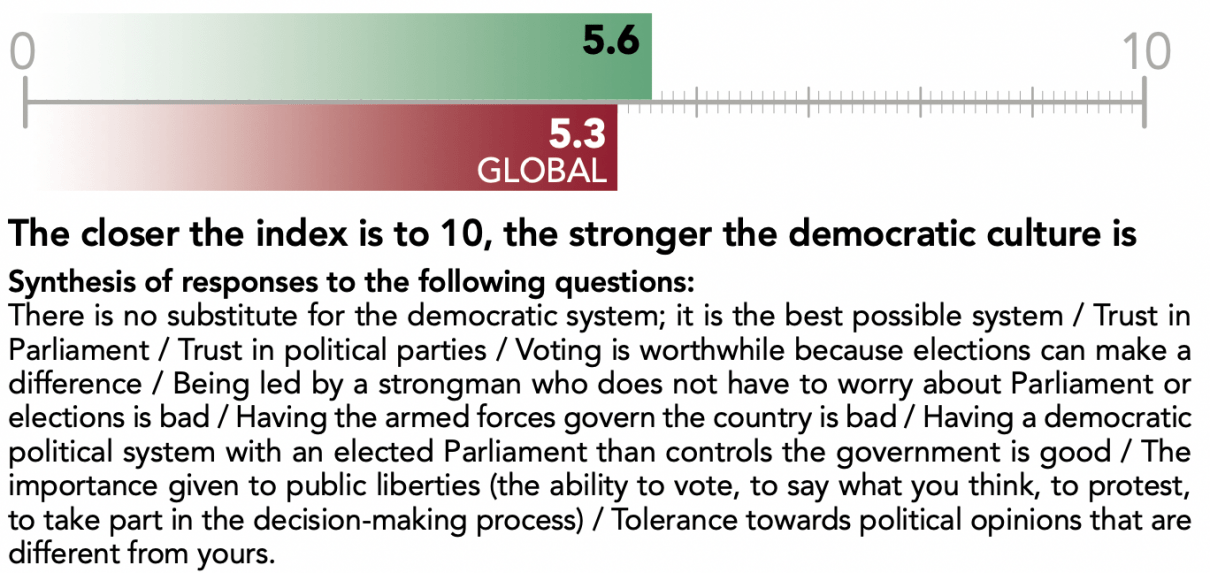
Copyright :
Fondation pour l’innovation politique/International Republican Institute – 2019
Democracy works well in my country
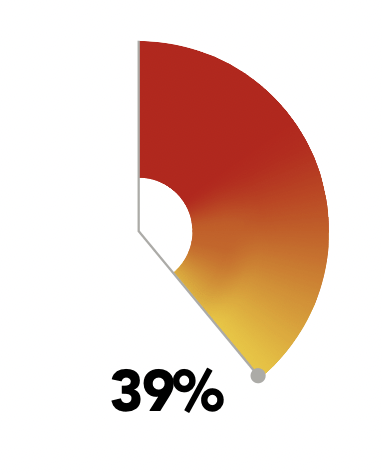

Concerning immigration, the best solution is to…
Response: “treat the problem at the European level”
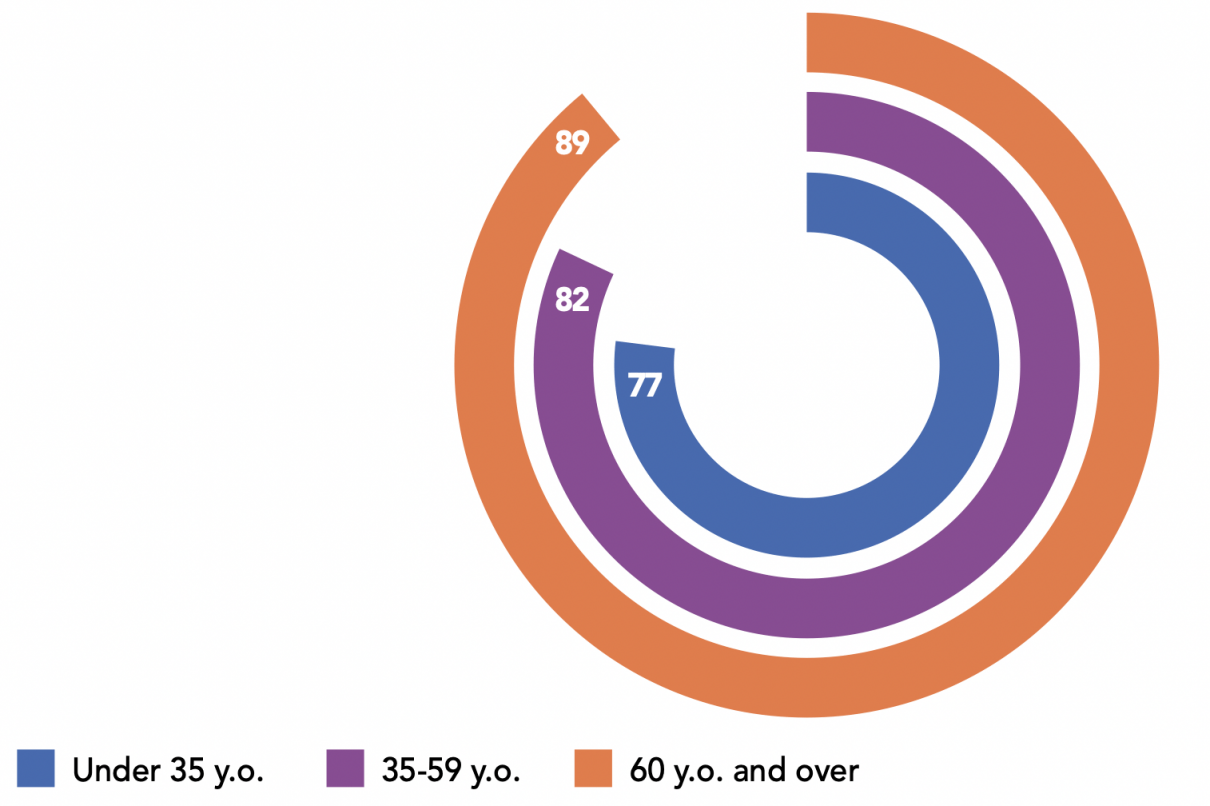
Copyright :
Fondation pour l’innovation politique/International Republican Institute – 2019
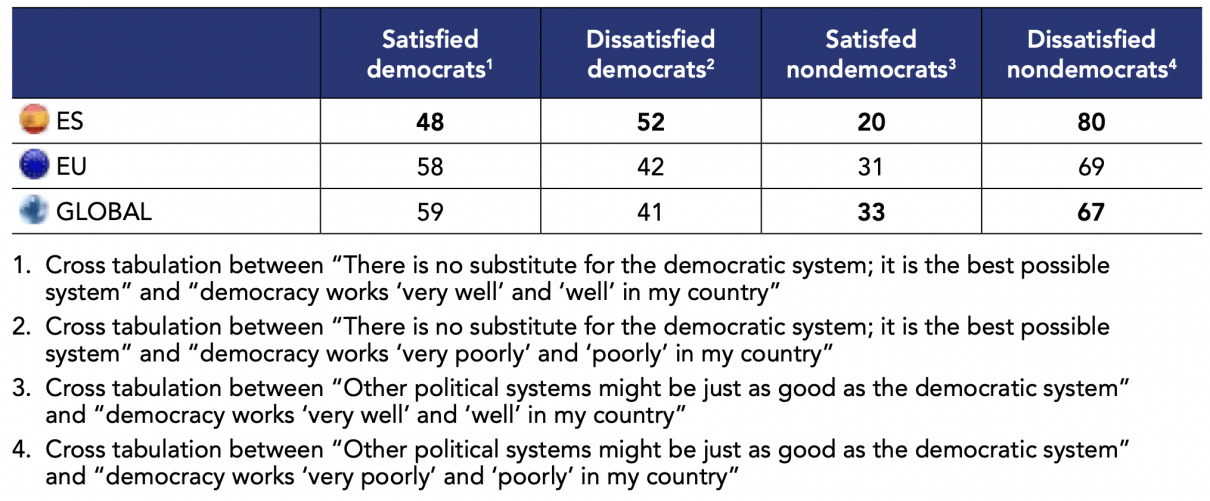
Copyright :
Fondation pour l’innovation politique/International Republican Institute – 2019
Spaniards’ relationship with democracy is historically complex. According to our results, a large majority (69%) of respondents state that “there is no substitute for the democratic system, it is the best possible system”. Nevertheless, the Spanish express strong criticism of the way in which democracy works in their country, with 61% saying that it works poorly. The majority of Spaniards from our survey (52%) could be described as “dissatisfied democrats” since they claim that the democratic system is irreplaceable, while believing that democracy works poorly in their country.
The Spanish democratic system seems fragile given the high level of mistrust in the main political institutions. For example, the Spanish do not trust political parties (89%), the government (80%), Parliament (65%), the judicial system (60%), the European Commission (50%) or European Parliament (49%). These are not the only institutions which prompt concern: the media (69%), trade unions (75%) and religious authorities (82%) are also deeply mistrusted. On the other hand, the Spanish do trust hospitals/medical professions (90%) as well as the police (72%) and schools (70%).
Nevertheless, democracy does not appear to be in danger in Spain, with preferences for a different political regime remaining in the minority. A large majority of the population still believes (59%) that “voting is worthwhile because elections can make a difference” and 60% see the electoral process as transparent. Even among those who believe that “other political systems might be just as good as the democratic system” (31%), most reject the idea of being led by “a strongman who does not have to worry about Parliament or elections” (66%) or the armed forces leading the country (80%).
Indicate whether you are worried or not about each of the following topics
Total responses: “very worried” and “worried”
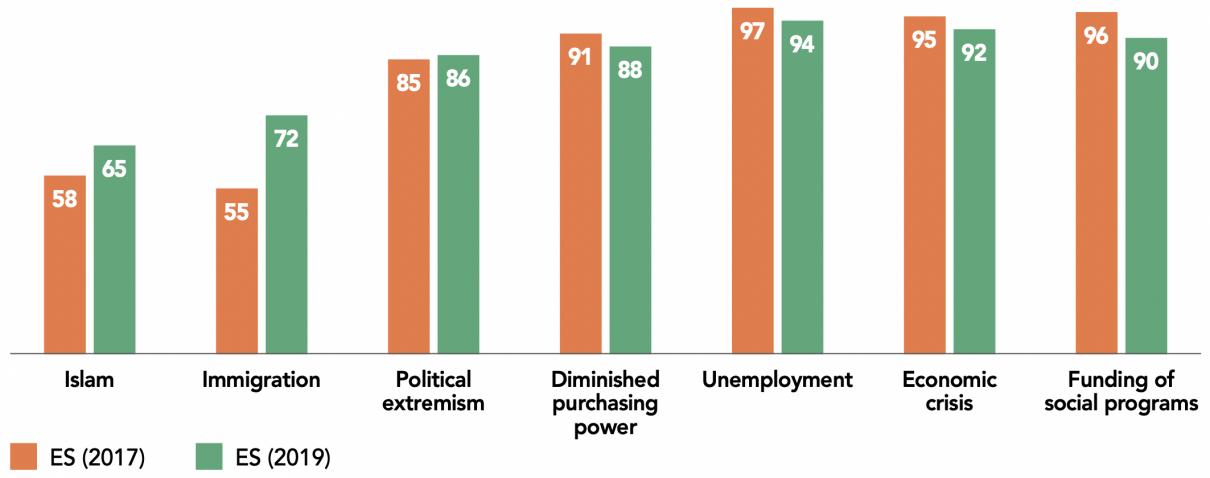
Copyright :
Fondation pour l’innovation politique/International Republican Institute – 2019
Dominique Reynié (ed.), What next for democracy? An international survey by the Fondation pour l’innovation politique, Paris, 2017, 320 pages.
While half (55%) of Spaniards in 20171 were concerned about immigration, this survey shows that nearly three quarters (72%) of them are now worried about it. This increase is significant in light of the emergence of the new far-right Vox party.
Oriol Bartomeus
- 56% think their country’s membership of the European Union is a good thing.
- 62% wish to keep the euro as their currency.
- 83% think that the problem of immigration should be treated at the European level.
Focus : It should be noted that the Spaniards overwhelmingly reject the claim that they cannot let in more refugees because of a difference in values (58%) or an increased risk of terrorism (56%). In contrast, nearly two-thirds (63%) say they cannot let in more refugees as this could harm the economy. According to our results, Spaniards are among the most worried populations regarding unemployment (94%), just behind Greece (96%), Brazil (96%), Albania (96%) and Italy (95%).
Sweden (SE)
Index of democratic culture
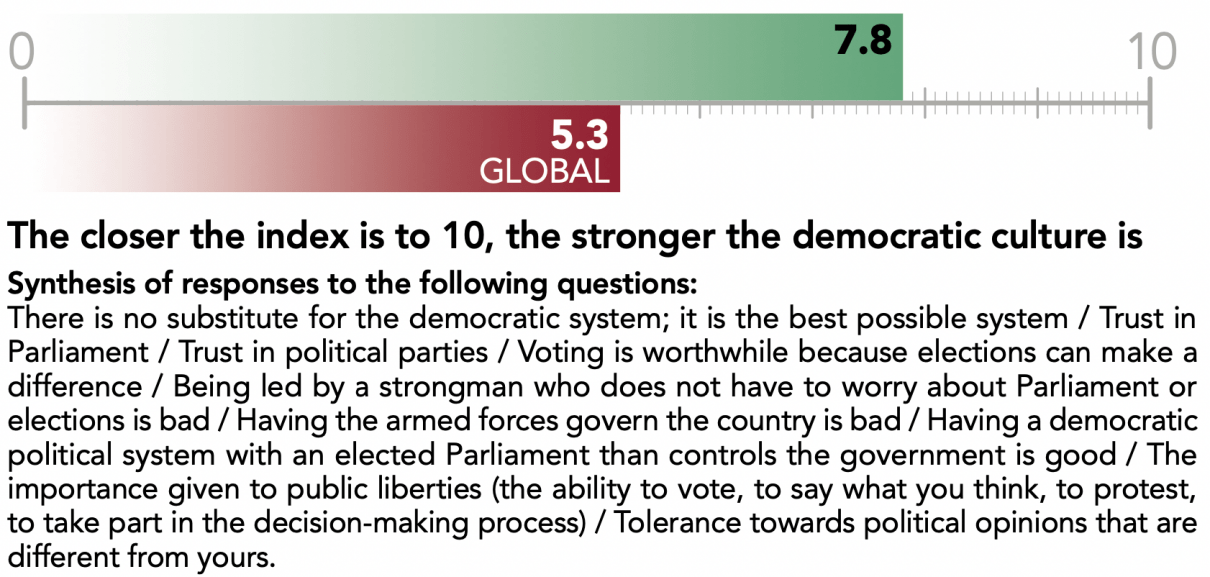
Copyright :
Fondation pour l’innovation politique/International Republican Institute – 2019
Democracy works well in my country
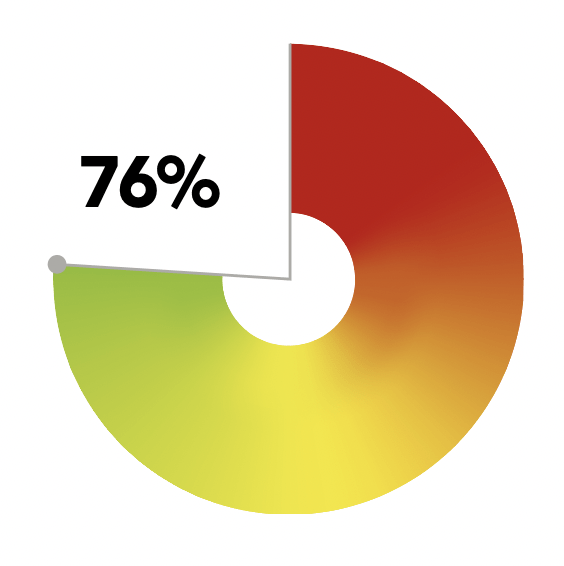

I will show you a list of characteristics people can have, and ask you if they bother you
Total responses: “yes, very” and “yes, somewhat”
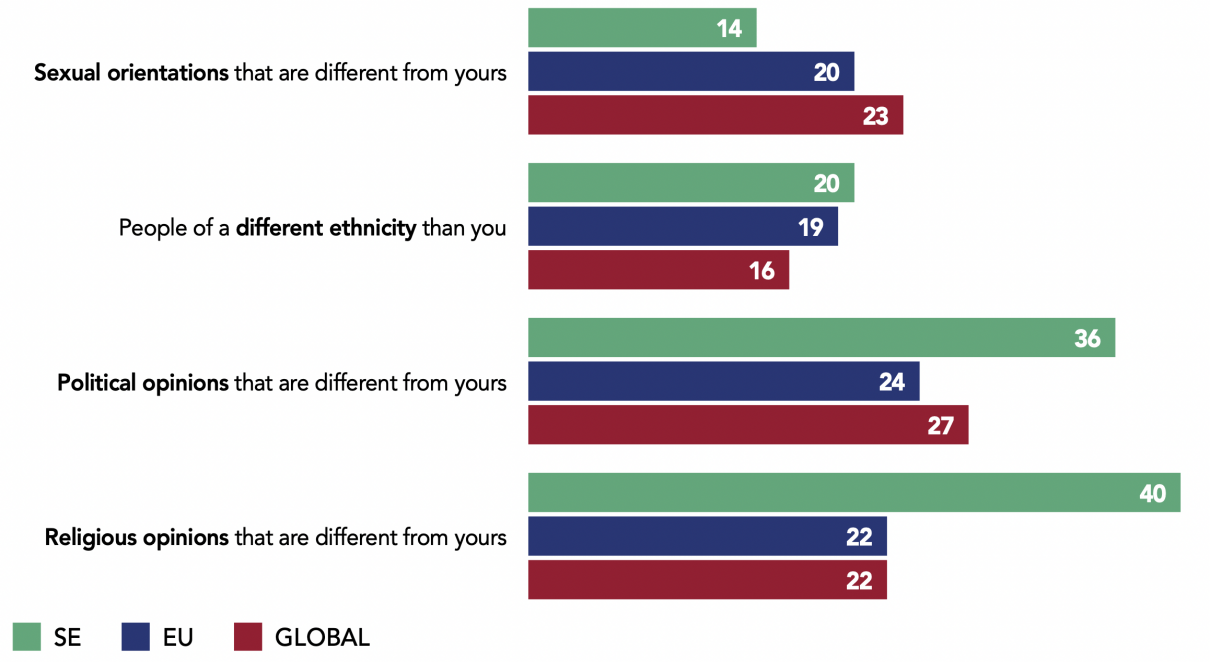
Copyright :
Fondation pour l’innovation politique/International Republican Institute – 2019

Copyright :
Fondation pour l’innovation politique/International Republican Institute – 2019
The Swedish parliamentary elections in September 2018 further highlighted the polarization of the Swedish political system. After the push of the controversial and anti-immigration Swedish Democrats, who were able to rally 17.5% of the votes, it has been harder than ever to find a Prime Minister and a government accepted by a parliamentary majority. The two extreme parties on the political spectrum, the Swedish Democrats and the Left Party, now account for more than 25% of the electorate and occupy a quarter of the seats in Parliament due to proportional representation.
Conducted a few weeks after the election but before these obstacles to the formation of the new government emerged, the survey reveals that an impressive majority (76%) of Swedes continue to believe that democracy is working well in their country. This figure is well above the European Union average (50%) and without any significant gap between men and women or age groups. However, unskilled workers and employees show lower levels of satisfaction with democracy (67%) compared to intermediary professions and skilled employees (74%) and with managers and professionals and intellectual professions (82%). Moreover, 84% of those surveyed believe that “voting is worthwhile because elections can make a difference” and 82% that the electoral system is transparent.
Regarding types of governance, the Swedes express a strong preference for parliamentary democracy (87%). They overwhelmingly reject more authoritarian forms of government. As such, 88% say that being led by “a strongman who does not have to worry about Parliament or elections” would be a bad thing and 63% reject the idea of having “experts decide what is best for the country, rather than the government”.
Would you like the European Union to form a joint army for all Member States, in addition to national armies?

Copyright :
Fondation pour l’innovation politique/International Republican Institute – 2019
Trust in political institutions such as the government and Parliament (Riksdag) is also quite high, reaching 55% and 65% respectively, compared to 34% and 40% for the European Union average. Moreover, the political institutions seem to be those that enjoy the greatest support among the Swedish people. For others, such as the police (76%) or the media (39%), trust is close to the European average (72% and 34% respectively).
Johan Martinsson
- 53% think their country’s membership of the European Union is a good thing.
- 30% consider that their country’s EU membership weakens their democracy.
- 71% oppose the death penalty.
Focus : Compared to the European Union average and despite the success of the Swedish Democrats in the elections, more Swedes support the idea of having to welcome refugees fleeing war and poverty (72% compared to 62%) and fewer are concerned about immigration (55% compared to 69%). However, among those who claim that their standard of living has deteriorated in recent years, seven out of ten are concerned about immigration (70%).
Switzerland (CH)
Index of democratic culture
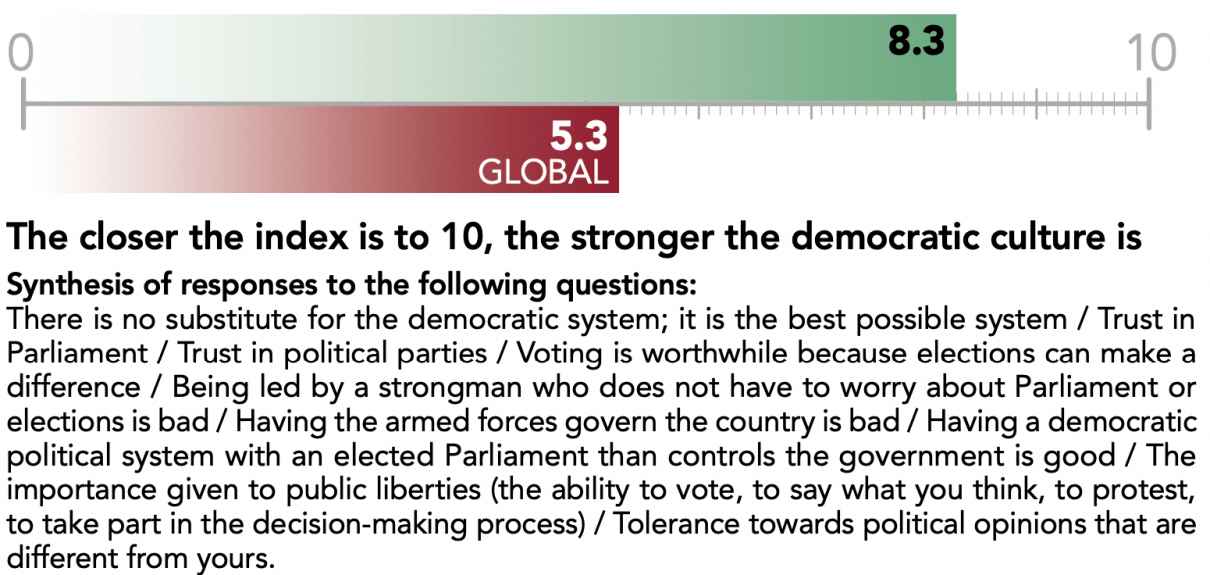
Copyright :
Fondation pour l’innovation politique/International Republican Institute – 2019
Democracy works well in my country
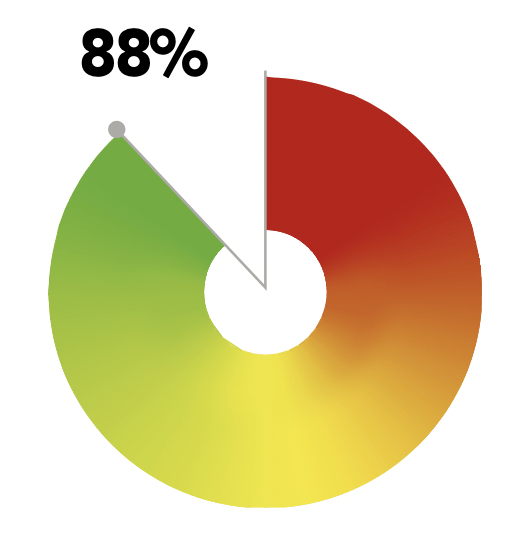

Trust in big tech companies
Total responses: “entirely trust” and “somewhat trust”
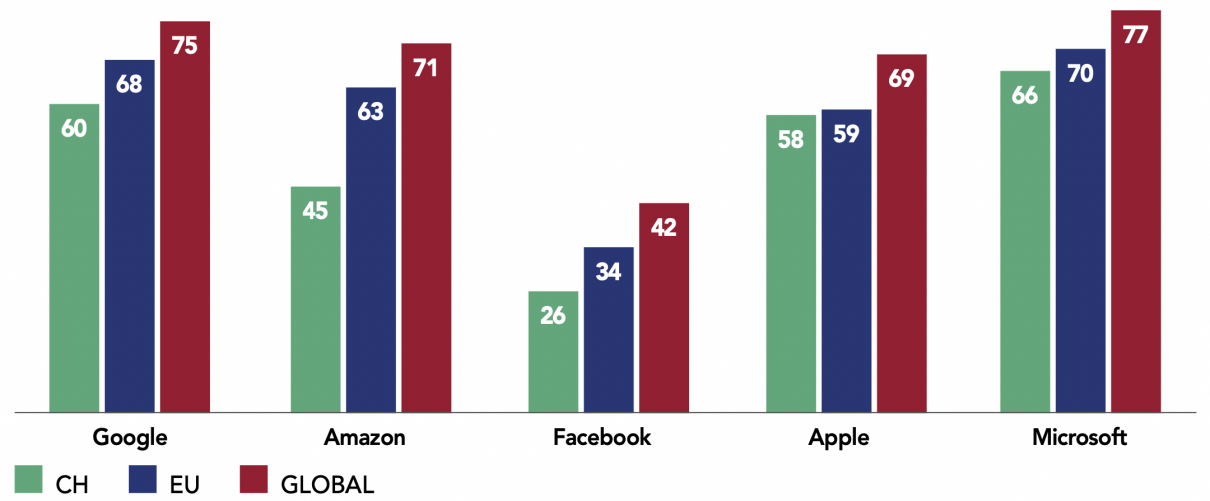
Copyright :
Fondation pour l’innovation politique/International Republican Institute – 2019
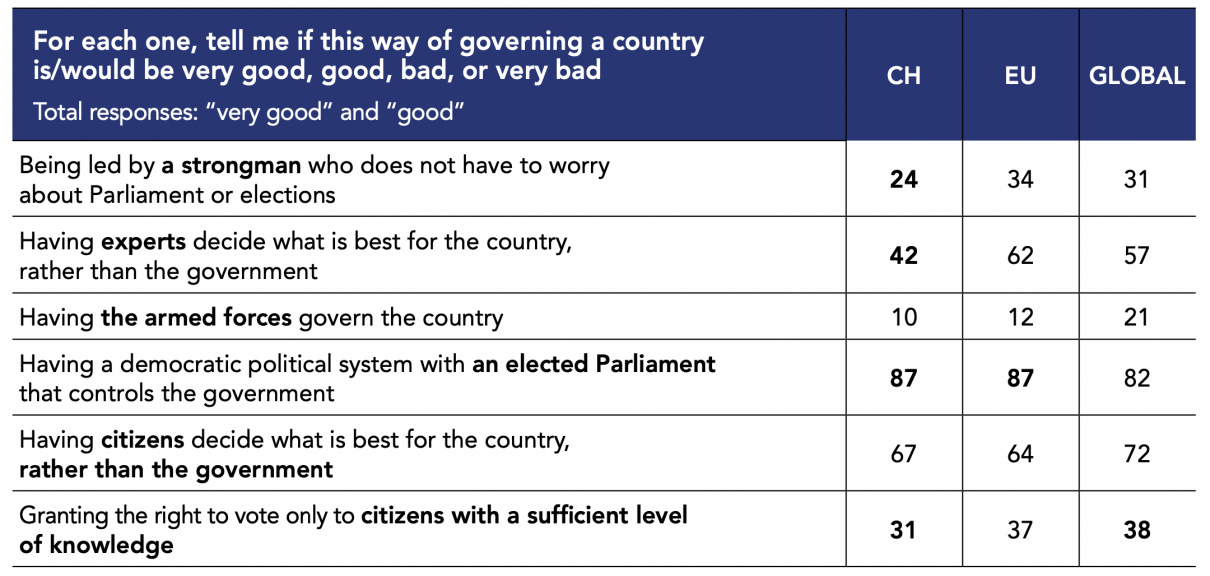
Copyright :
Fondation pour l’innovation politique/International Republican Institute – 2019
Dominique Reynié (ed.), What next for democracy? An international survey by the Fondation pour l’innovation politique, Paris, 2017, 320 pages.
Swiss politics is marked by a combination of unique features: direct democracy and a culture of consensus. This formula seems to be very successful as the Swiss exert a certain “democratic enthusiasm”. While on average 51% of the citizens of the 42 countries in the study say they are satisfied with the functioning of democracy in their country, this percentage rises to 88% in Switzerland.
Similarly, a large majority of respondents (87%) feel they can express themselves freely. This contrasts with the average level across European Union countries (63%). In this survey, the percentage of the Swiss saying they are “entirely” able to express themselves freely increased by 9 points (45%) compared to 20171 (36%). When asked who holds the most power in their country, 25% of Swiss cite “the people” first (compared to 6% of all 42 countries).
Another unique feature of Switzerland is that political service, like the armed forces, is part of a “militia” tradition: MPs generally have another remunerative occupation alongside their political position, the stated aim of which is to limit the professionalization of the political class. More than half of the respondents (58%) oppose a “technocratic” government by experts which stands out clearly from their European neighbors (38%) and could be interpreted as a support for this “militia” principle. Respondents also seem to support Switzerland’s principle of perpetual neutrality, as 63% of respondents oppose military intervention by democratic countries in order to defend democratic values (compared to 53% on average for the 42 countries).
Trust in the government
Total responses: “entirely trust” and “somewhat trust”
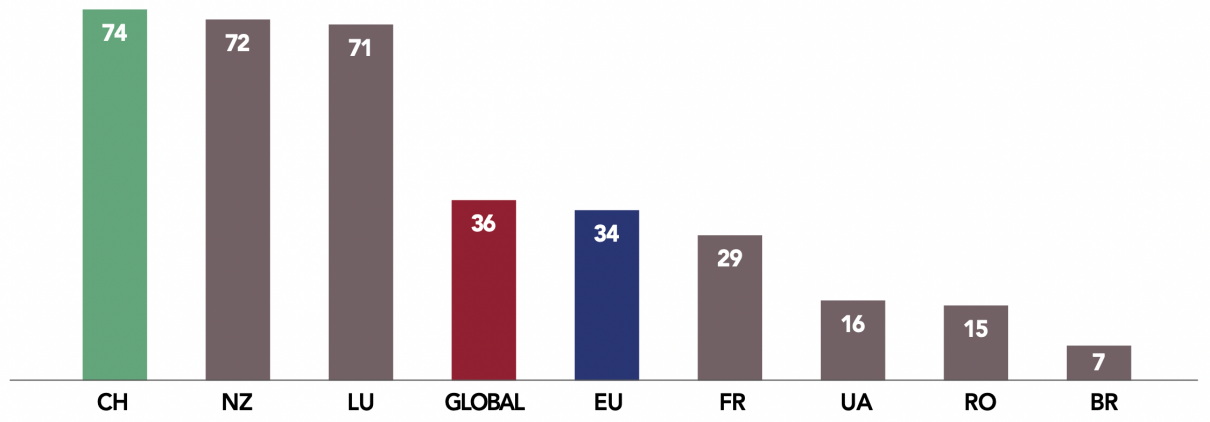
Copyright :
Fondation pour l’innovation politique/International Republican Institute – 2019
The Swiss have lower tolerance towards religion: 29% of those surveyed said they were bothered by people with different religious beliefs (compared to 22% in the European Union). This intolerance manifests itself in particular with respect to certain religions: compared to the average of the 42 countries in the sample, more Swiss say they have a negative reaction when they learn that a person is Orthodox (12% versus 6%), Jewish (13% versus 7%) or Muslim (37% versus 26%).
Madeleine Hamel
- 49% see globalization as a threat.
- 52% claim that the number of democratic countries in the world is declining.
- 85% say that the electoral process is transparent in their country.
Focus : Switzerland is known for being technologically advanced, particularly in the pharmaceutical and medical sectors. Moreover, 85% of respondents believe that scientific and technological discoveries have a positive impact on global health, 5 points higher than the average of their European neighbors (80%).
Ukraine (UA)
Index of democratic culture
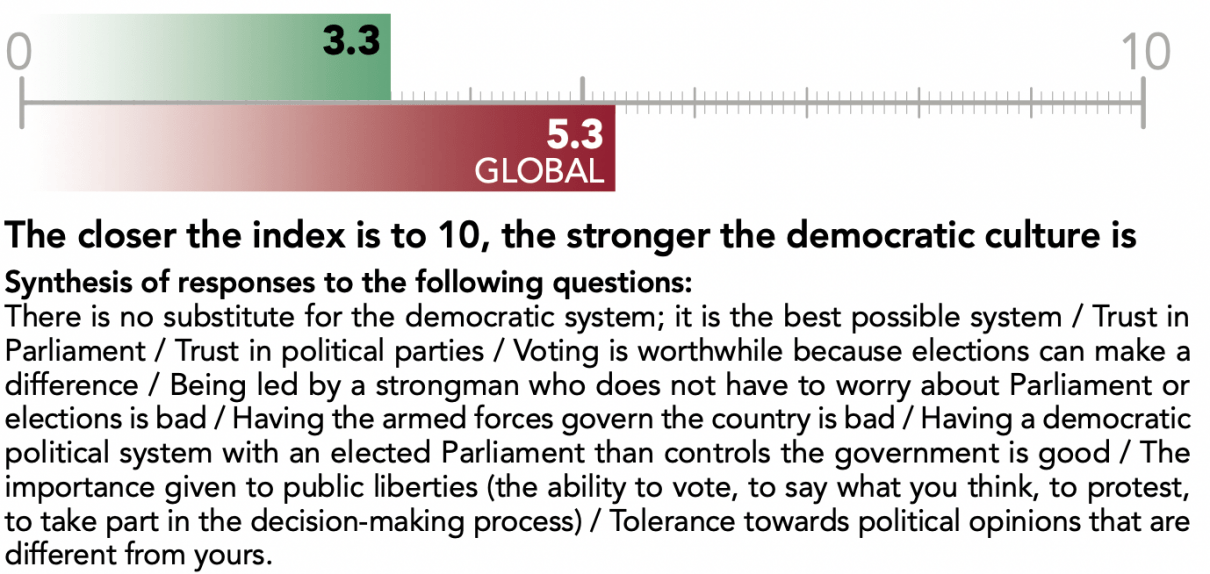
Copyright :
Fondation pour l’innovation politique/International Republican Institute – 2019
Democracy works well in my country
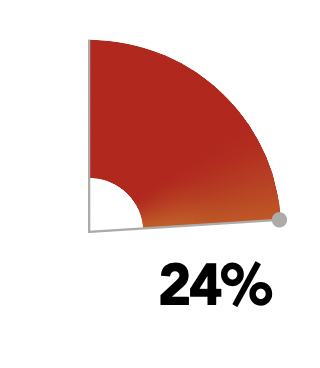

Are you in favor or against the military intervention of democratic countries in other countries in order to defend democratic values?
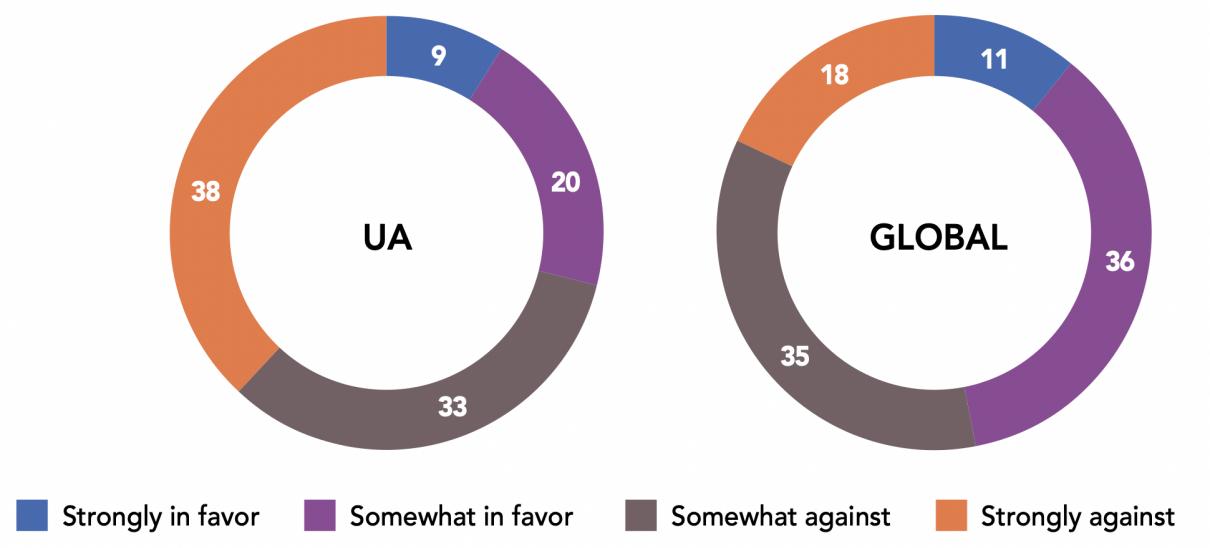
Copyright :
Fondation pour l’innovation politique/International Republican Institute – 2019

Copyright :
Fondation pour l’innovation politique/International Republican Institute – 2019
* The following countries fall into this category: Bulgaria, Croatia, Czech Republic, Estonia, Hungary, Latvia, Lithuania, Poland, Romania, Slovakia and Slovenia.
Our international survey shows that Ukrainians are deeply concerned about a number of issues primarily related to security and the economy. In terms of security, almost all Ukrainians surveyed said they were “somewhat worried” or “very worried” about war (98% vs 72% across the European Union), crime (98% vs 86%) and terrorism (91% vs 83%). Concern is also high about the economic outlook for the country, especially with regard to an economic crisis (96%), loss of purchasing power (95%), the social welfare system (95%) and unemployment (92%).
Ukrainians seem to support democratic principles and prefer democracy over other forms of government, since 88% of Ukrainians believe that having “a democratic political system with an elected Parliament that controls the government” is a good thing. But the level of trust in the institutions responsible for addressing their concerns is low. The victory in the last presidential elections of comedian Volodymyr Zelensky, devoid of any political experience, illustrates this rift between the people of Ukraine and a political class discredited by years of prevarication. Elected with about 73% of the vote, no other Ukrainian president has ever obtained such massive support.
Trust in institutions
Total responses: “entirely trust” and “somewhat trust”
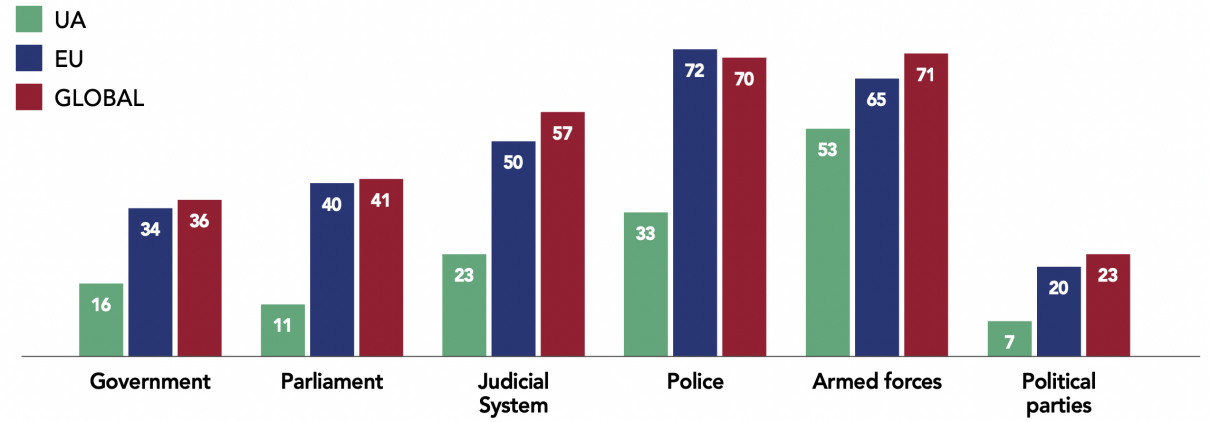
Copyright :
Fondation pour l’innovation politique/International Republican Institute – 2019
Furthermore, the survey reveals a significant split in the way in which Ukrainians perceive China, Russia, the United States and the European Union. 35% judge the European Union’s posture on the international stage to be reassuring, which is more than any other foreign power. All Ukrainians (99%) consider the United States the most influential country in the world but are divided as to whether its posture is worrying (36%), reassuring (30%) or neither (34%). While U.S. leadership is unquestionably acknowledged, the position of the U.S. is perceived as less worrying than in general across the European Union (63%). Three quarters of Ukrainians (75%) view Russia’s posture internationally as worrying, presumably because of the military conflict between the two countries. Almost five years have passed since Russia annexed the Crimean peninsula thus igniting the conflict in eastern Ukraine, but fighting continues in the Donbass. This is, moreover, the only active war in Europe. The problem is no longer in the headlines in Western countries but, as the figures indicate, it continues to be a major issue structuring Ukrainian public opinion.
Joshua Solomon and Alex Tarascio
- 70% think that their lifestyle or the way of life in their country is now threatened.
- 70% say that the electoral process is transparent in their country.
- 76% consider that democracy works poorly in their country.
Focus : A clear majority of Ukrainians believe that the rich are the most powerful in Ukraine (56%), well above the average of all countries (18%).
United Kingdom (GB)
Index of democratic culture
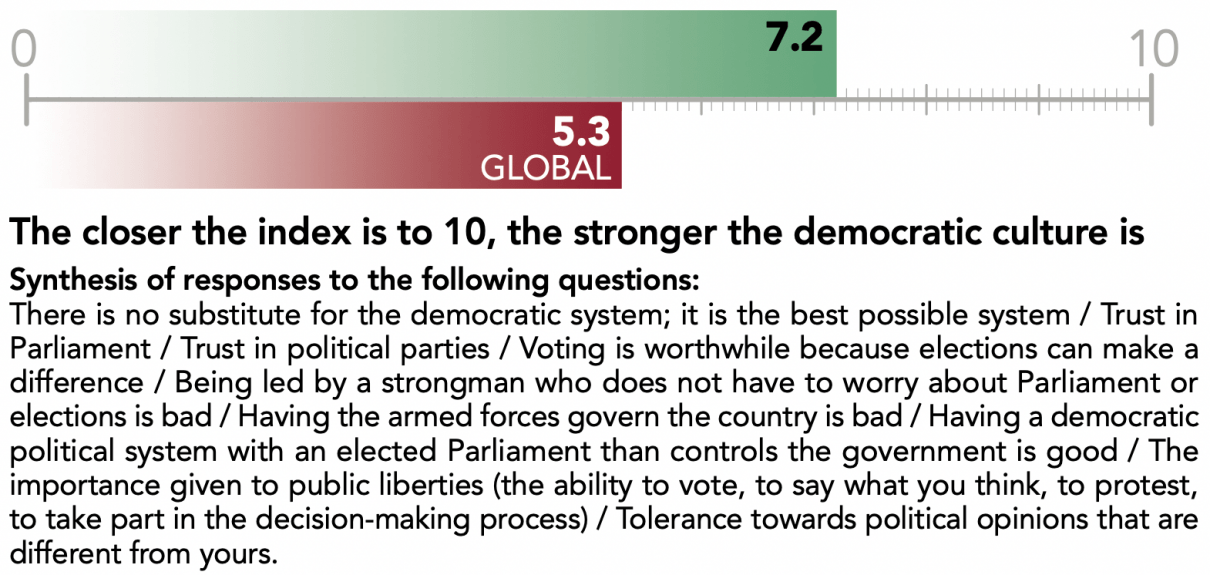
Copyright :
Fondation pour l’innovation politique/International Republican Institute – 2019
Democracy works well in my country
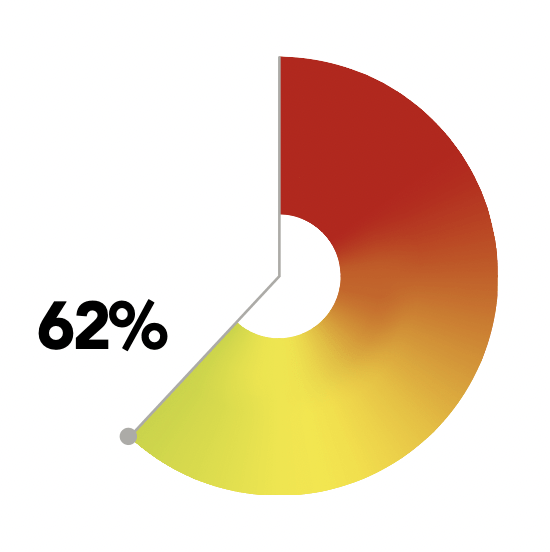

For each of the following powers, indicate if its posture on the international stage is worrying, reassuring or neither
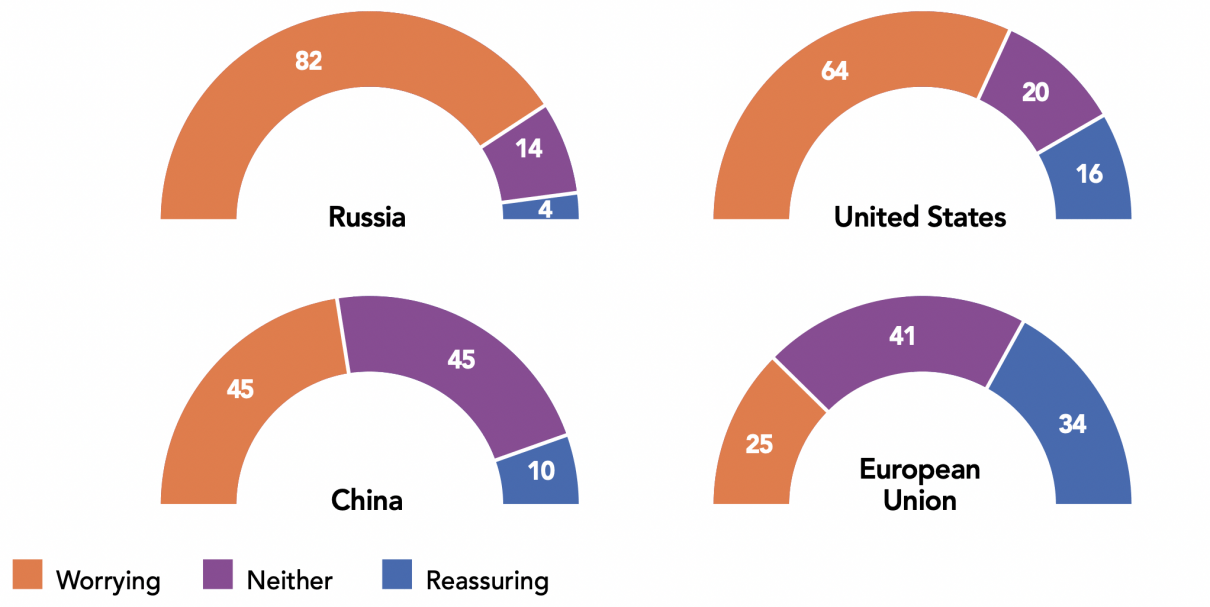
Copyright :
Fondation pour l’innovation politique/International Republican Institute – 2019

Copyright :
Fondation pour l’innovation politique/International Republican Institute – 2019
Despite the political chaos that the country is currently immersed in and the enormous pressures that the Brexit vote is exerting on the civil service and social cohesion, the functioning of institutions and democracy in Britain has solid foundations. A clear majority (62%) of citizens feel that democracy is working well in their country. Most of them feel that the electoral process is transparent (75%), that they can express themselves freely (77%) and that “voting is worthwhile because elections can make a difference” (78%). There is also a real national consensus around the importance of protecting other democratic pillars, such as the right to protest (80%) and the ability to vote for the candidates of their choosing (98%). The country’s trust in the judicial system is much higher than the EU average (76% versus 50%).
However, while 72% of Britons reject the temptation of a “strongman”, who could bypass Parliament and elections, the disenchantment caused by recent dysfunctions is beginning to be felt. For example, it is worrying that a majority of citizens say they are willing to accept less freedom to establish more order (56%). Moreover, less than half (46%) of the British express trust in the government and only one-third (35%) trust the UK’s belligerent media.
Having experts decide what is best for the country, rather than the government would be a…

Copyright :
Fondation pour l’innovation politique/International Republican Institute – 2019
Politically, the most divisive issues among British citizens relate to power structures. When it comes to assessing which categories have the most power in their country, left-wing respondents are twice as likely to point to “the rich people” (59% versus 31%), while right-wing respondents are twice as likely to answer “the intellectual elite” (17% versus 8%). By way of comparison, while only 10% of the British believe that their country will perform better tomorrow than it does today, this figure is 15% on average across the European Union, compared to 20% on average in the 42 democracies surveyed.
Because of its unique cultural context, combining moderate conservatism, attachment to individual freedoms, the absence of religion in politics and a strong welfare state, the United Kingdom sometimes thinks like other Anglo-Saxon countries, but can also reveal more European instincts. Thus, 61% of the British prefer a limited role for the state in the economy, an opinion close to that of the Americans (68%) but further from the European average (52%). However, when it comes to social liberalism, the British are much more in tune with their European neighbors, showing high levels of tolerance for people whose ethnicity (83%), sexual orientation (82%), and religious opinions (74%) differ from their own.
Sophia Gaston
- 10% think their country will be better tomorrow than it is today.
- 44% of those interested in politics think that other political systems could be just as good as the democratic system.
- 68% of respondents on the political right consider that the UK cannot welcome more refugees because it would harm the country’s economy.
Focus : The survey reveals the lasting polarization of public opinion regarding the Brexit vote: 37% of the British believe that their country will do better outside the European Union, while 45% believe that it will be worse off. Less than a fifth of the population thinks that leaving the European Union will not change anything (18%).
United States (US)
Index of democratic culture
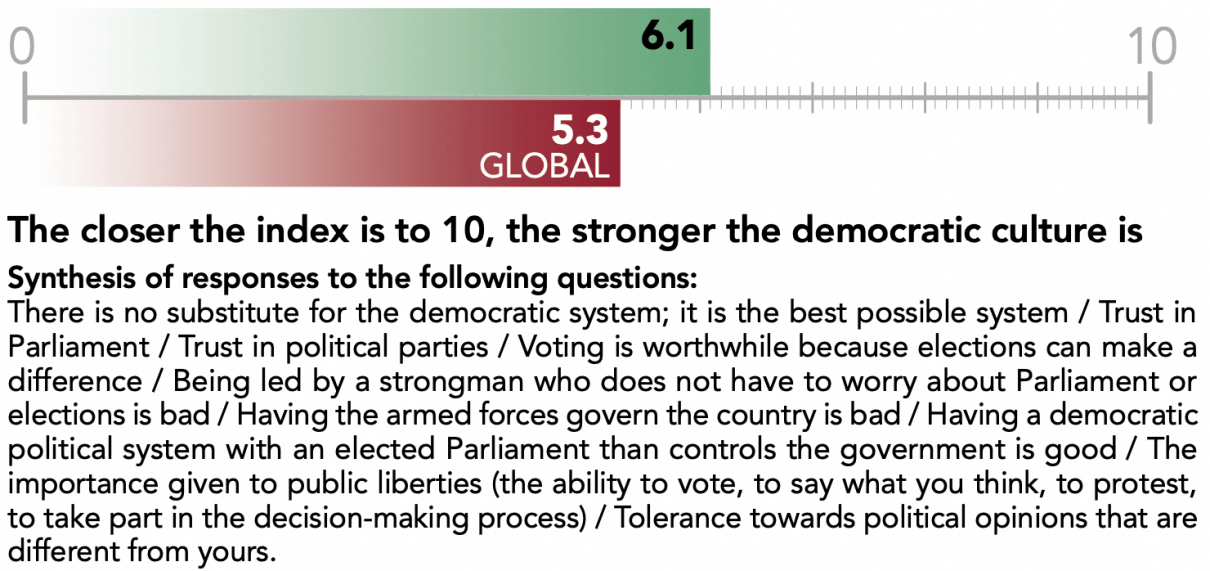
Copyright :
Fondation pour l’innovation politique/International Republican Institute – 2019
Democracy works well in my country
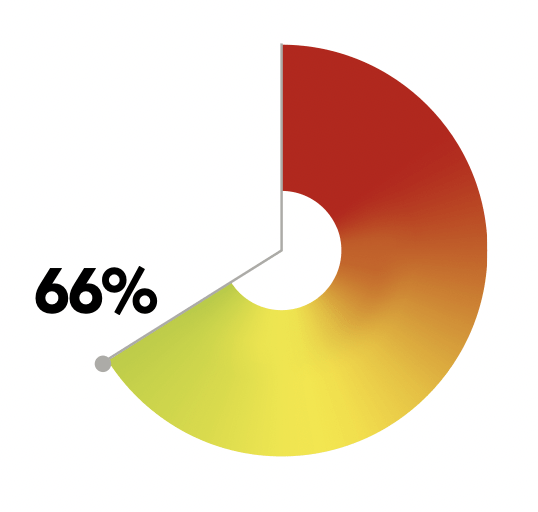

Trust in institutions: United States and European Union
Total responses: “entirely trust” and “somewhat trust”
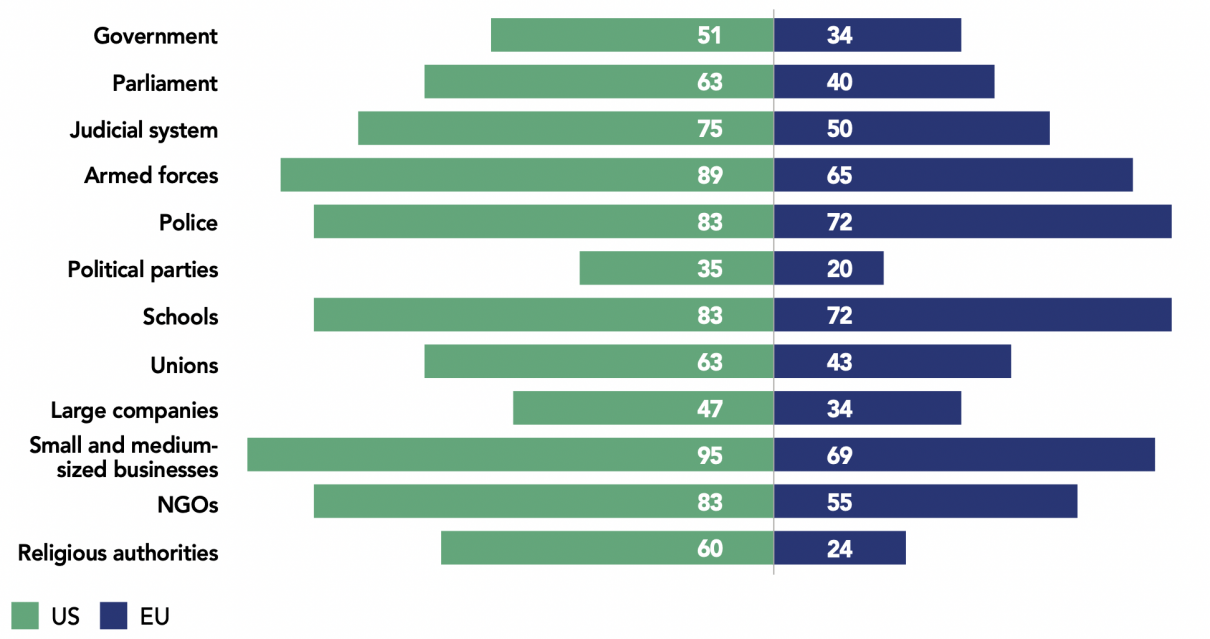
Copyright :
Fondation pour l’innovation politique/International Republican Institute – 2019
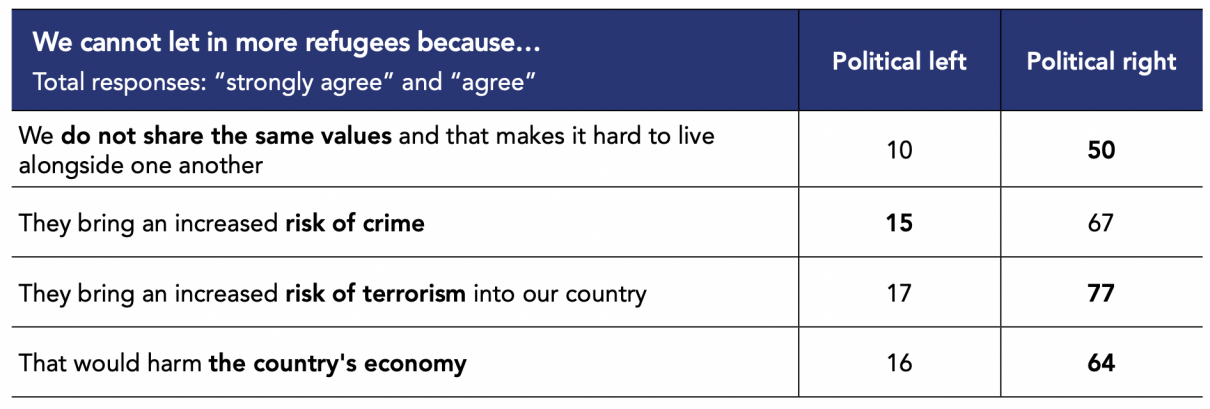
Copyright :
Fondation pour l’innovation politique/International Republican Institute – 2019
Dominique Reynié (ed.), What next for democracy? An international survey by the Fondation pour l’innovation politique, Paris, 2017, 320 pages.
Our first survey was conducted during Donald Trump’s presidential nomination period in the United States1. He had, as a candidate, mobilized constituencies hostile to representative democracy and the traditional parties. Following two years of Trump’s presidency, this new study provides an interim update on the relationship between US public opinion and its democracy.
The first observation, already made in 2017, is that of a continued transatlantic convergence in favor of democracy. But, on closer inspection, Americans remain far more optimistic about the democratic functioning of their country than the citizens of the European Union: 66% of Americans compared to just 50% of Europeans believe that their democracy works well. Moreover, the temptation of an authoritarian regime without parliamentary control led by a “strongman” remains 10 points lower in the United States (24%) than the European Union average (34%).
This clearer persistence of democratic “faith” in the United States is confirmed by the approval of those interviewed for external military interventions in the name of democratic values (55% of Americans versus 45% across the European Union). Indeed, President Trump’s recent announcement of a withdrawal from Syria and, partially, from Afghanistan deeply divides American society, which sees it as a challenge to the century-old Wilsonian premise of US global democratic responsibility.
Is being led by a strongman who does not have to worry about Parliament or elections a good or a bad way of governing?
Total responses: “very good” and “good”

Copyright :
Fondation pour l’innovation politique/International Republican Institute – 2019
However, as in 2017, this positive assessment of democracy in the United States must be qualified. On the one hand, it is worth noting the large number of Americans who see the electoral system as not transparent (39%). This is probably a direct consequence of the 2016 presidential election in which Trump was elected president despite lagging 3 million votes behind his opponent. The loss of confidence in the reliability of the elections is also the result of unproven allegations of electoral fraud against the president. In fact, 79% of respondents agree on the negative impact of the Internet and social media due to the fact that the latter facilitates the spread of false information, and provides far too much information to third parties (73%).
On the other hand, 31% of voters who identify themselves as being on the political right, consider that “being led by a strongman who does not have to worry about Parliament or elections” would be a good way to govern. This figure rises to 37% among the least educated respondents (those who left formal education before the age of 21). We can thus identify a “subcontinent” of the conservative Trump electorate, dominated by non- college-graduates, for whom representative democracy is no longer self-evident.
Corentin Sellin
- 32% are opposed to abortion rights.
- 43% think the United States’ posture on the international stage is worrying.
- 67% declare being interested in politics.
Focus : Although American President Donald Trump regularly attacks the media, 44% of Americans still trust it, compared to only one-third in the European Union (34%) and across the 42 countries studied (34%).
Questionnaire
Demographic information :
• Age
• Sex
• Region of residency
• Occupation
• Marital status
• Religion
• Number of children
• Size of the municipality of residence
• Self-positioning on a left/right political scale • View on globalization
Globalization is a threat Globalization is an opportunity
• How interested in politics are you?
Very Somewhat Not very Not at all
• Duration of studies
QUESTIONS:
1. Generally speaking, do you feel that your standard of living has gotten better or worse over the past few years?
• It has gotten better
• It has remained the same • It has gotten worse
2. Would you say that your lifestyle or the way of life in your country is now threatened?
• Very threatened
• Threatened
• Not very threatened • Not at all threatened
3. What do you think your country will be like?
• Better than it is now
• As good as it is now
• Not as good as it is now
4. Generally speaking, do you think that your country’s membership in/potential accession to the European Union is…
To the countries of the European Union and the candidate countries to the European Union
• A good thing
• A bad thing
• Neither good nor bad
5. Would you say that the United Kingdom will be:
In the United Kingdom, Australia, New Zealand, Canada, United States and European Union countries
• Better off without the European Union
• Worse off without the European Union
• Neither better nor worse off without the European Union
6. Do you feel your country’s European Union membership/joining the European Union would:
To the countries of the European Union and the candidate countries to the European Union
• Strengthens democracy in your country
• Weakens democracy in your country
• Does not impact democracy in your country
7. Regarding the euro, which of the following opinions do you agree with most?
• Your country should keep the euro as its currency
• Your country should go back to using its national currency but you do not feel that that is possible • Your country should go back to using its national currency and you think it’s possible
8. Concerning immigration, the best solution is to:
To the countries of the European Union only
• Treat the problem at the national level • Treat the problem at the European level
9. Would you like the European Union to form a joint armed forces for all Member States, in addition to national armies?
To the countries of the European Union, the Balkans, United States, Israel, Norway, United Kingdom, Switzerland
• Yes, absolutely • Yes, somewhat • Not really
• Not at all
10. Generally speaking, do you think that your country’s membership in a military alliance with the United States (NATO) is:
To NATO Member States except the United States
• A good thing
• A bad thing
• Neither good nor bad
11. Would you say that democracy in your country is functioning:
• Very well
• Well
• Poorly
• Very poorly
12. Generally speaking, in today’s society do you feel that you are free to express yourself?
• Entirely
• Mostly
• Mostly not
• Not at all
13. Of the following two opinions, which do you feel closest to:
• I prefer more freedom even if it causes less order • I prefer more order even if it means less freedom
14. For each of the following items, please indicate whether it is important for a properly functioning democracy.

15. Which of the following opinions best aligns with your views?
• Voting is worthwhile because elections can make a difference
• Voting is pointless because politicians do not care about the will of the people
16. Would you say the electoral process in your country is transparent?
• Yes, absolutely • Yes, somewhat • Not really
• Not at all
17. On the next screen I will describe different political systems and ask you what you think about how the country is being governed. For each one, please tell me if this way of governing a country is/would be very good, good, bad, or very bad:
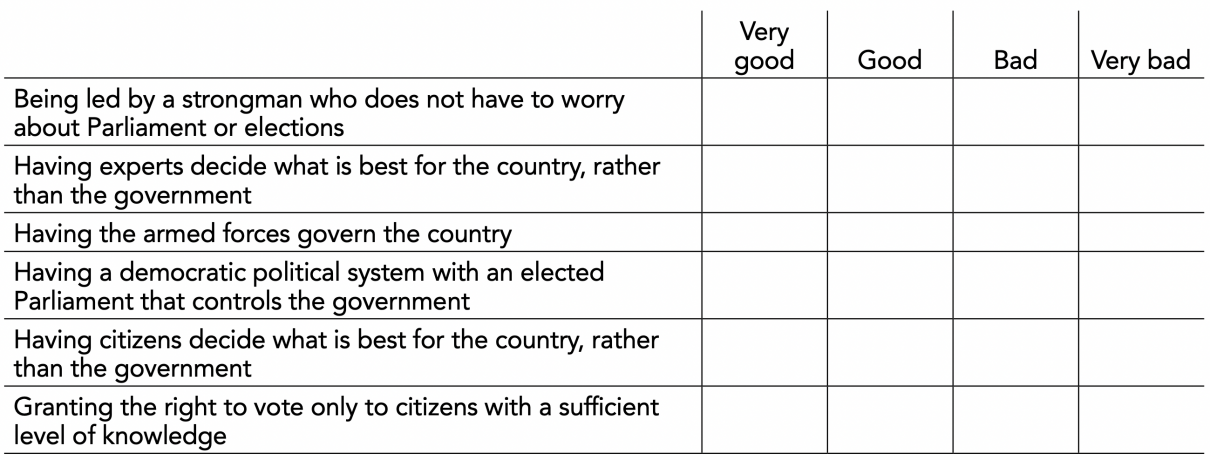
18. Which of the following categories holds the most power in your country? Firstly? Secondly? Thirdly?
• The intellectual elite
• The media
• Financial markets
• Big companies
• Elected representatives
• Politicians
• Religious authorities
• The people
• Criminal organizations (Mafia)
• International institutions
• The rich people
• The royal family (in monarchies only)
19. Generally speaking, would you say that:
• There is no substitute for the democratic system; it is the best possible system • Other political systems might be just as good as the democratic system
20. I will now show you a list of institutions and ask you how much you trust them. For each institution, please tell me if you entirely trust them, trust them, distrust them or entirely distrust them.
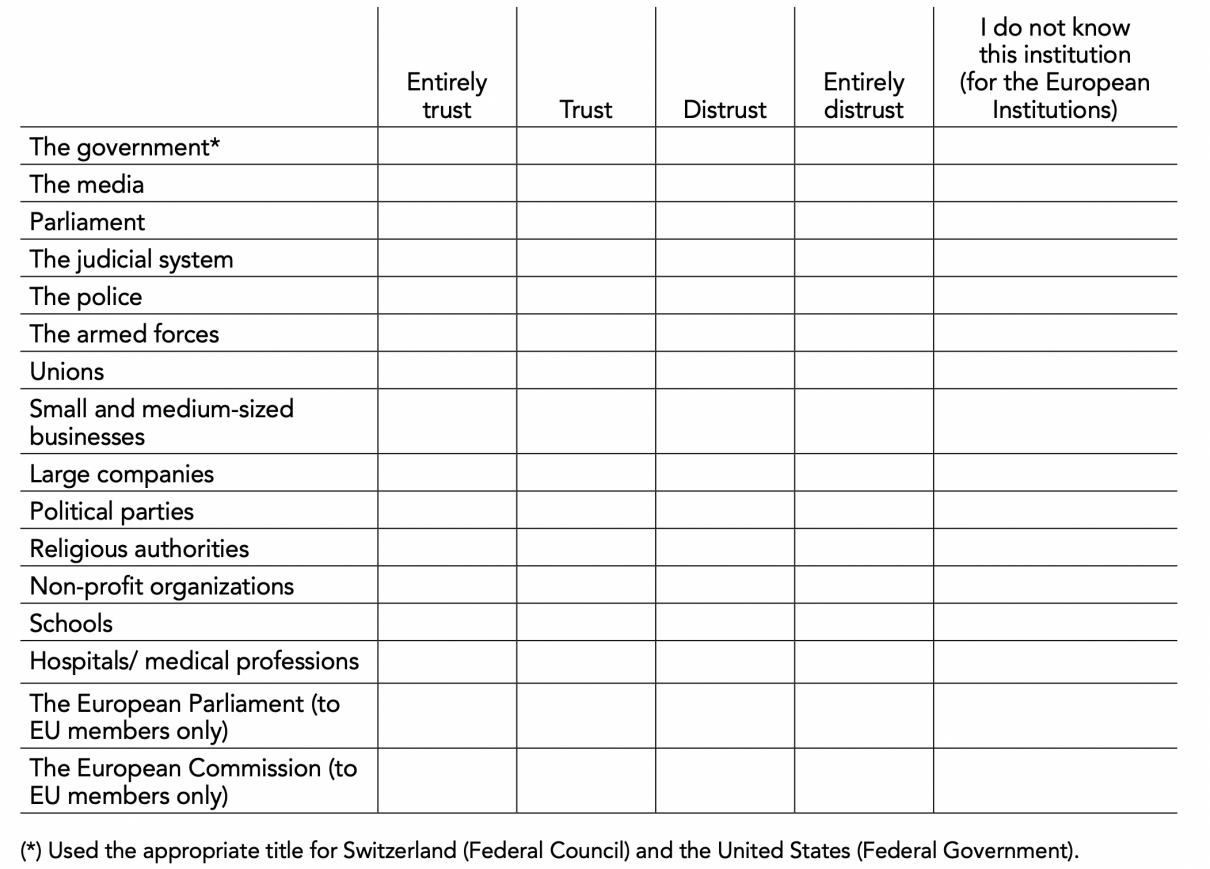
21. With regard to economic policy, would you say that…
• The role of the government in the economy should be strengthened and the freedom of enterprises should be limited
• The role of the government in the economy should be limited and the freedom of enterprises should be strengthened
22. Are you in favor or against the military intervention of democratic countries in other countries in order to defend democratic values?
• Strongly in favor
• Somewhat in favor
• Somewhat against
• Strongly against
23. Would you say the number of democratic countries in the world is…
• Expanding
• Declining
• Remaining the same
24. Do you agree or disagree with the following statement: men and women are equal and must have the same rights.
• Entirely agree
• Agree
• Disagree
• Entirely disagree
25. I will now show you a list of characteristics people can have, and then ask you if they bother you.

26. Do you support or oppose…

27. Do you agree with the following statement regarding refugees:
“It is our duty to welcome refugees fleeing war and poverty into our country.”
• Strongly agree
• Agree
• Disagree
• Strongly disagree
28. For each of the following statements, please tell me if you strongly agree, agree, disagree or strongly disagree.

29. Please indicate whether you are very worried, worried, not very worried or not at all worried about each of the following topics.
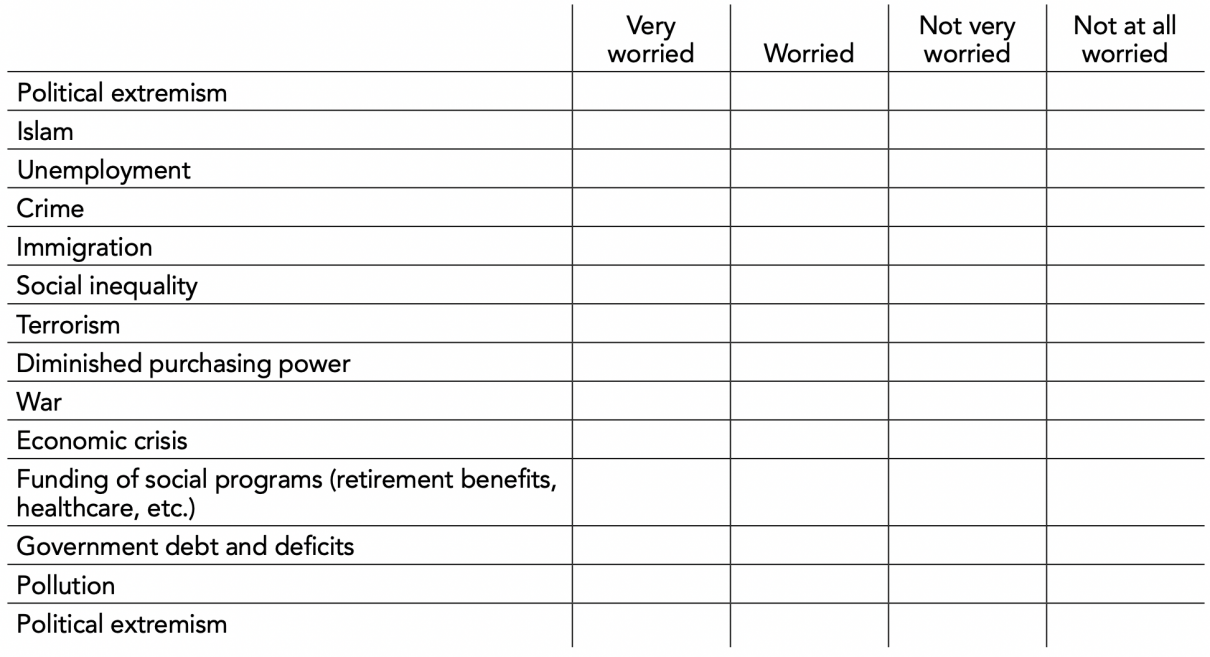
30. Most of the time, what is your reaction when you learn that a person is…

31. In your opinion, which of the following countries is the most influential, according to its level of influence in the world? And which is the second most influential? And which is the third most influential?
• China
• United States
• Russia
• European Union
32. For each of the following countries, please tell me if you think their posture on the international stage is worrying, reassuring or neither.

33. Generally-speaking, would you say that scientific and technological discoveries are:

34. For each of the following companies, please tell me if you entirely trust them, somewhat trust them, distrust them or entirely distrust them.

35. Generally speaking, what do you think of the following opinions regarding the Internet and social media: the Internet and social media… (agree/disagree)
• Are good because they help people to freely express themselves
• Are good because they help people get informed
• Are good because they help you meet new people
• Are bad because they give others (businesses, governments, friends and family) too much information about our personal lives
• Are bad because they facilitate the spread of false information
• Are bad because they encourage us to communicate exclusively with those who share our views

